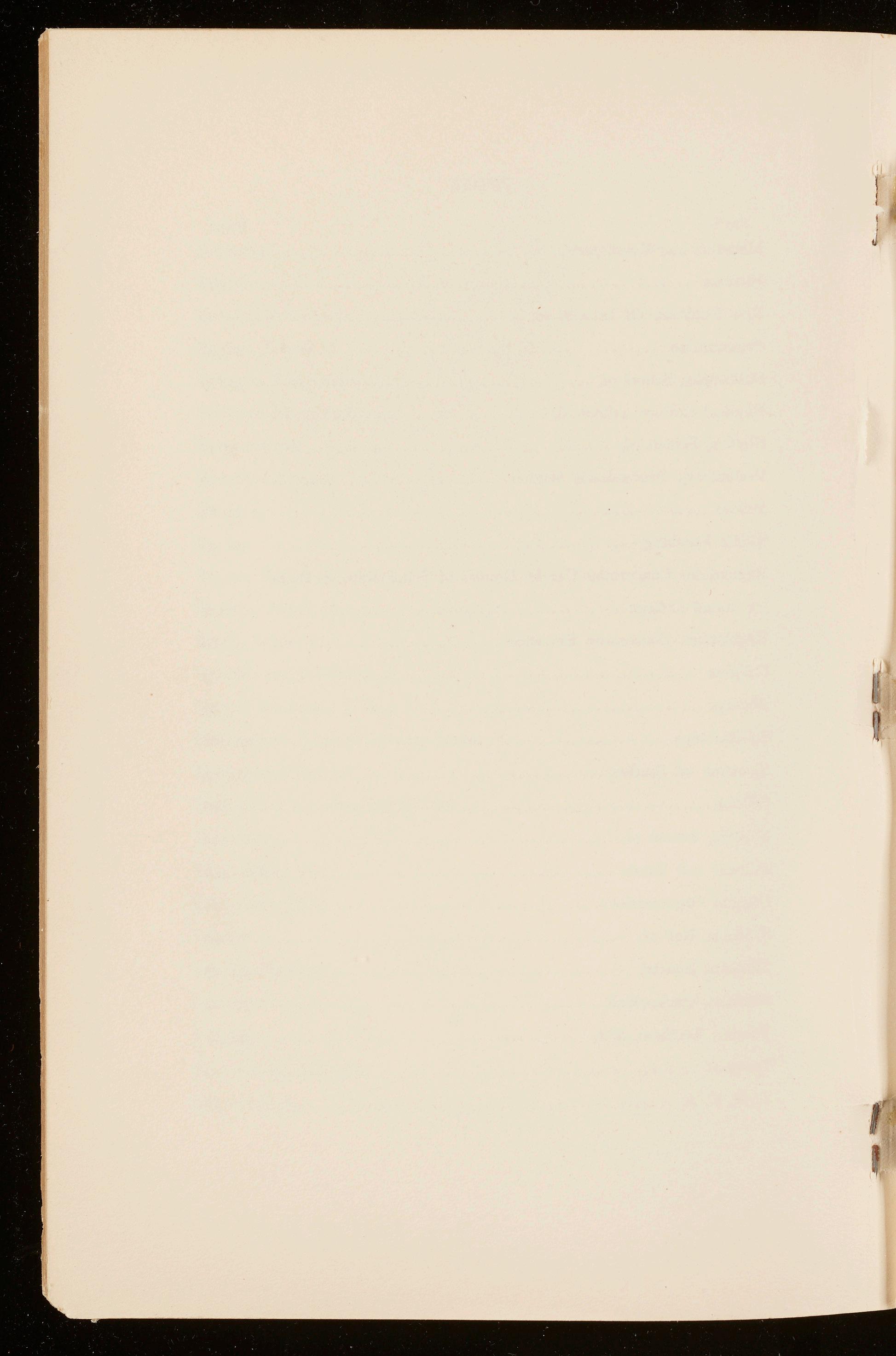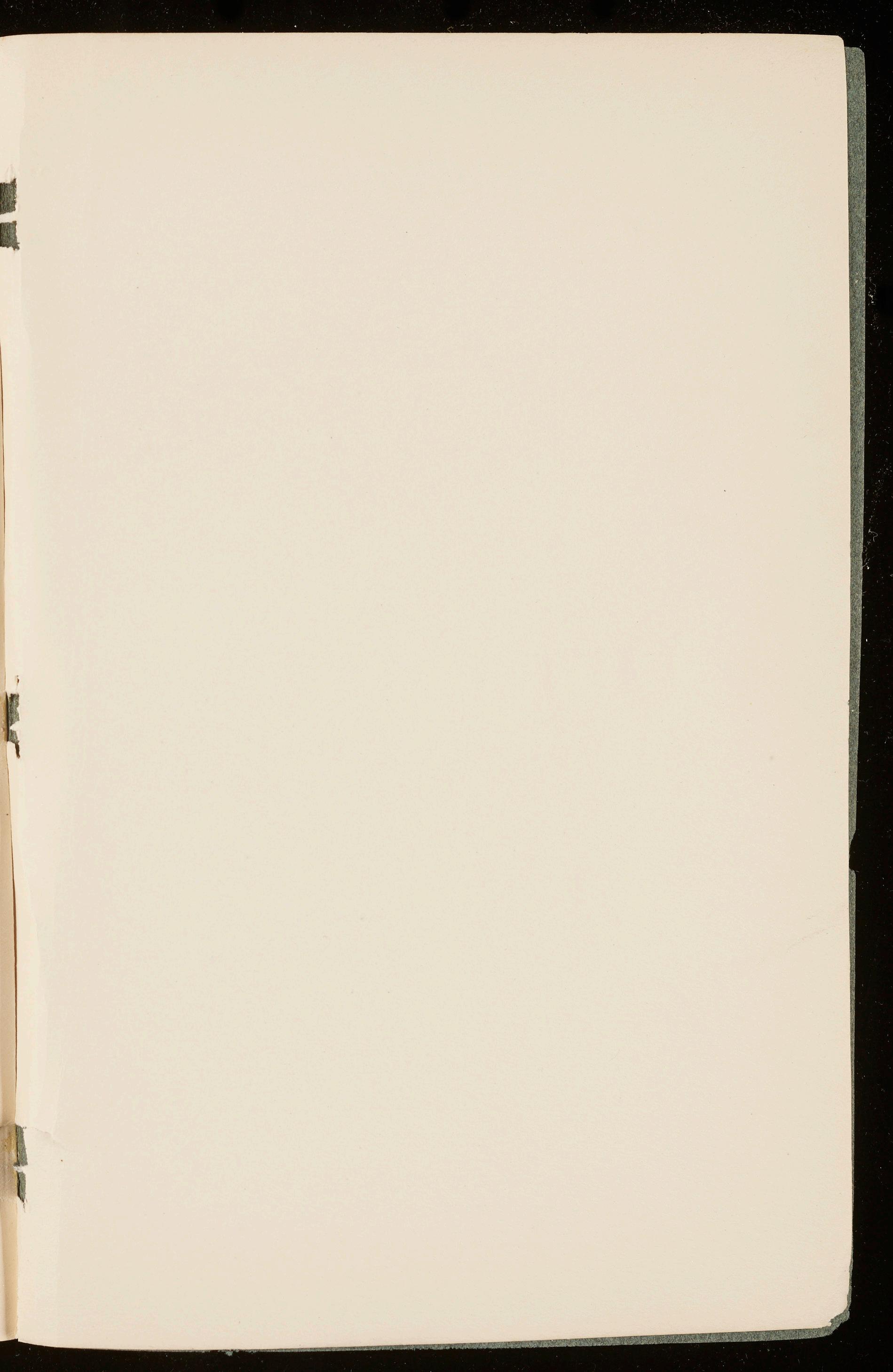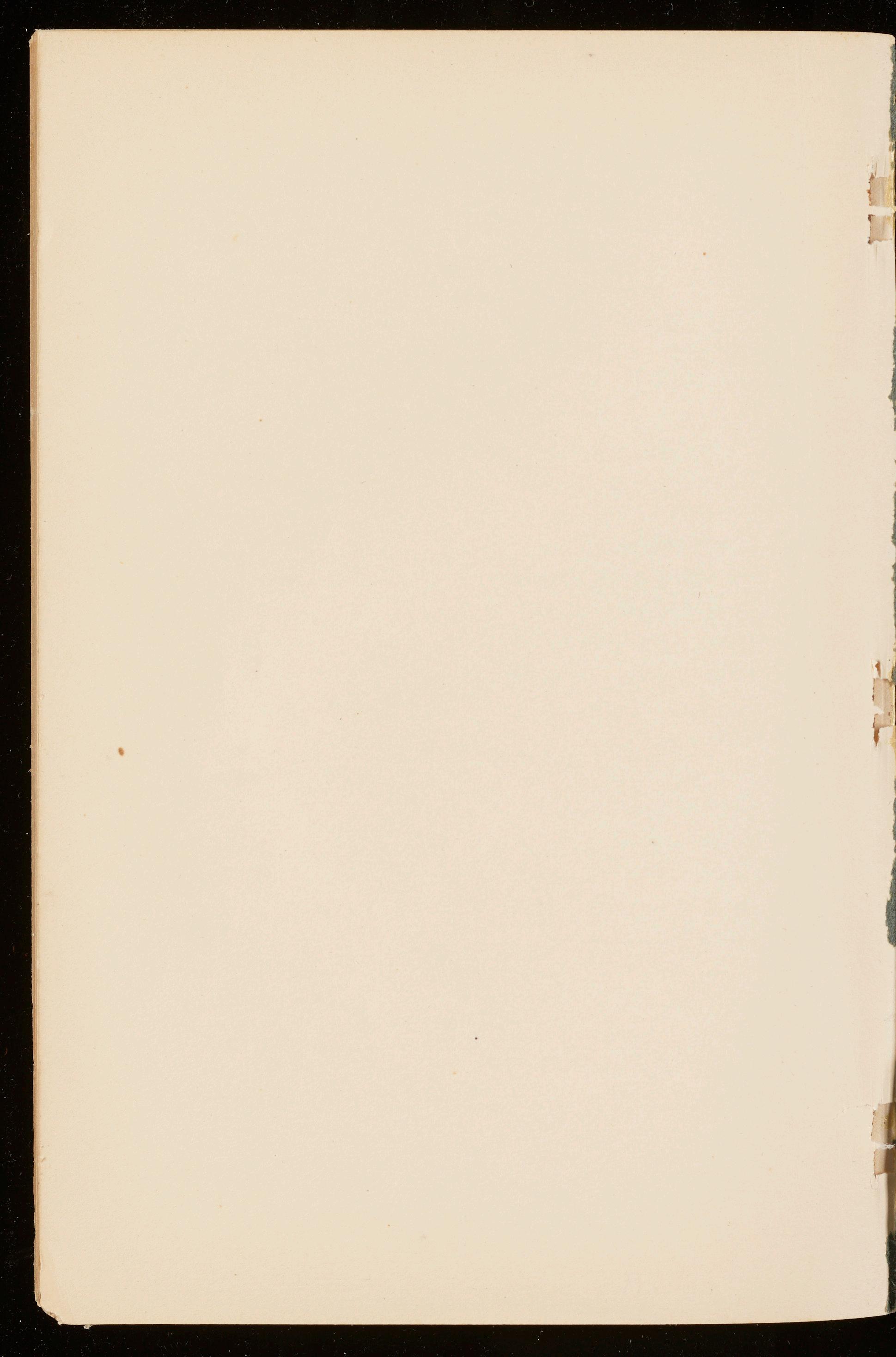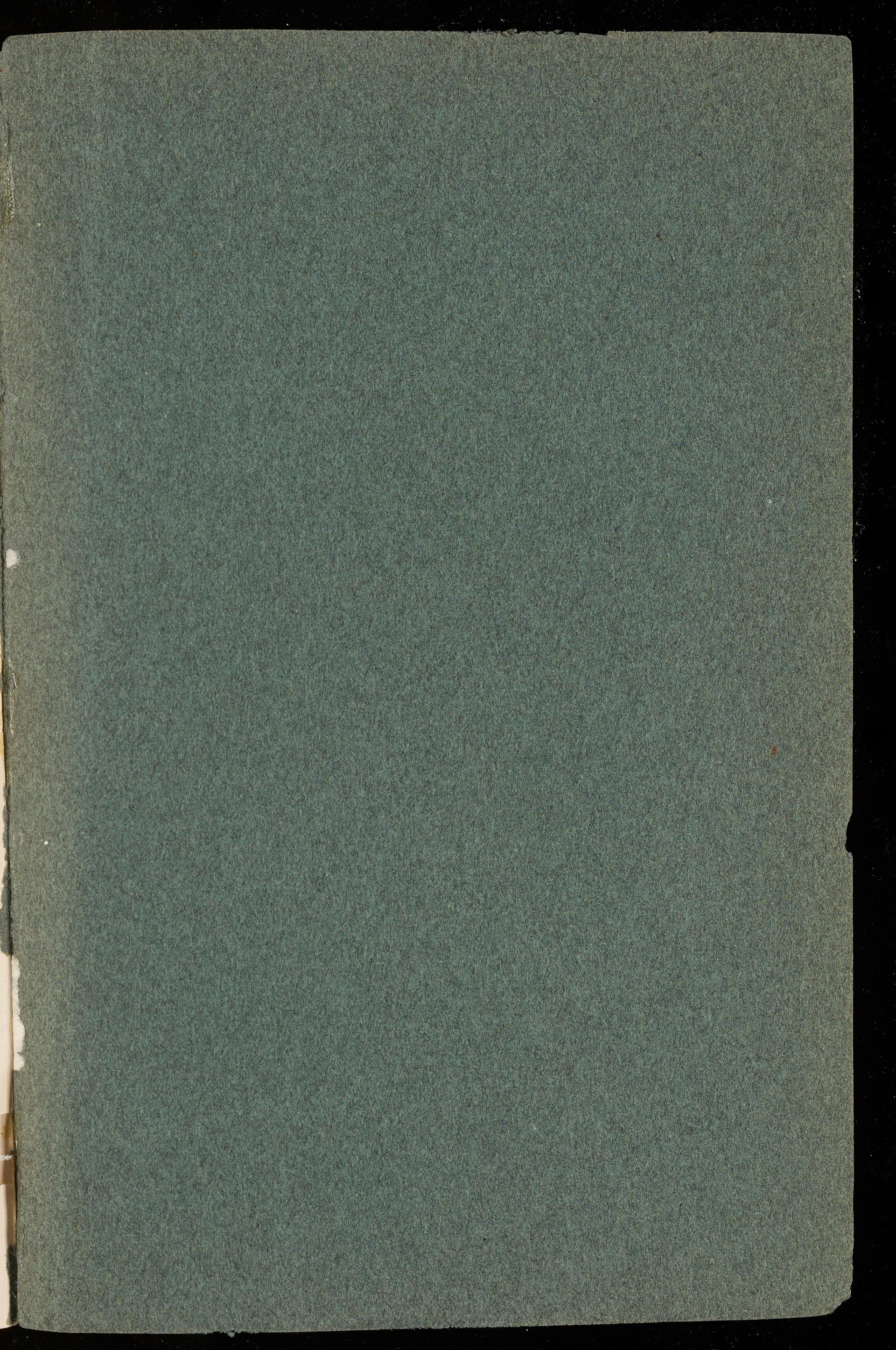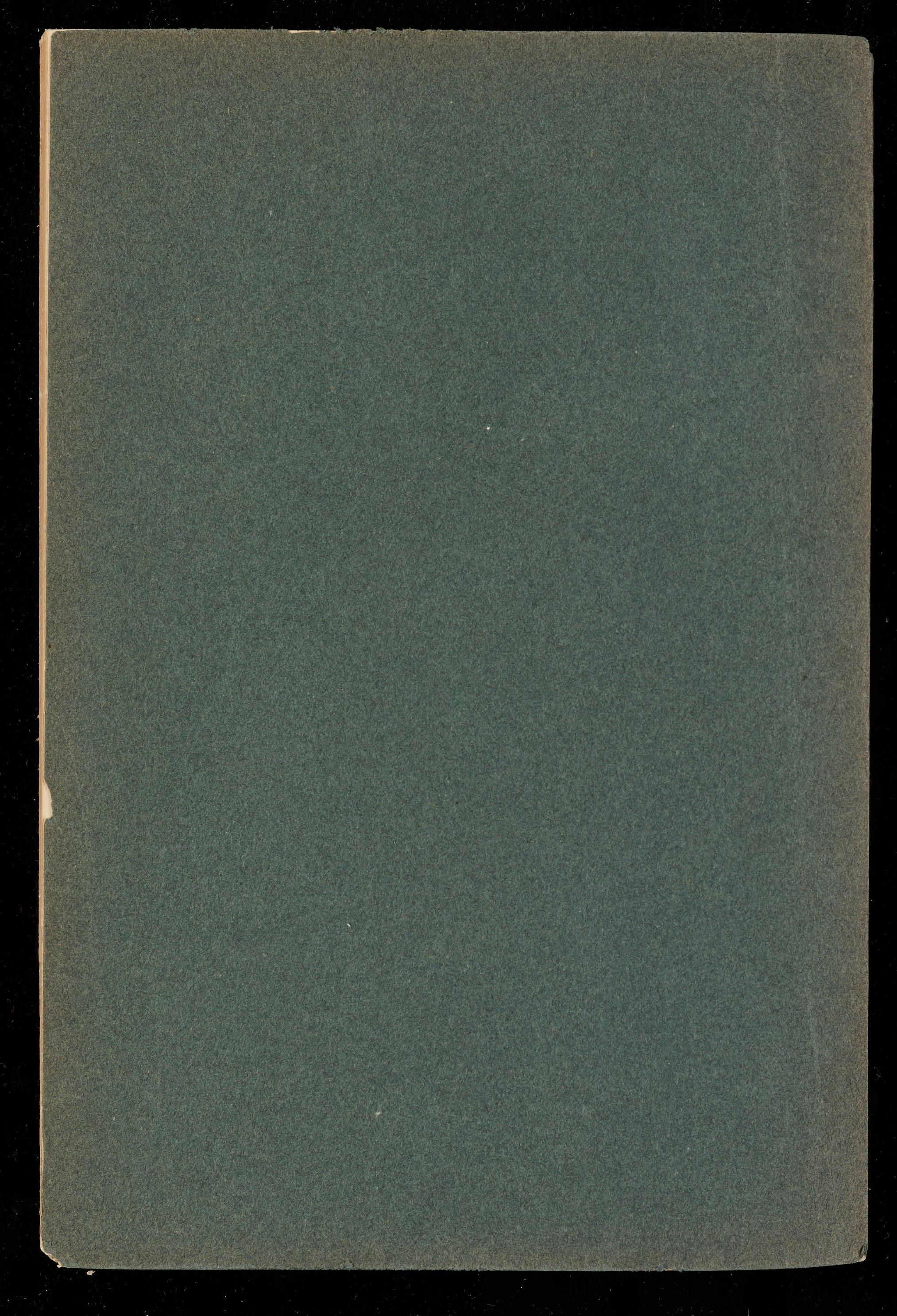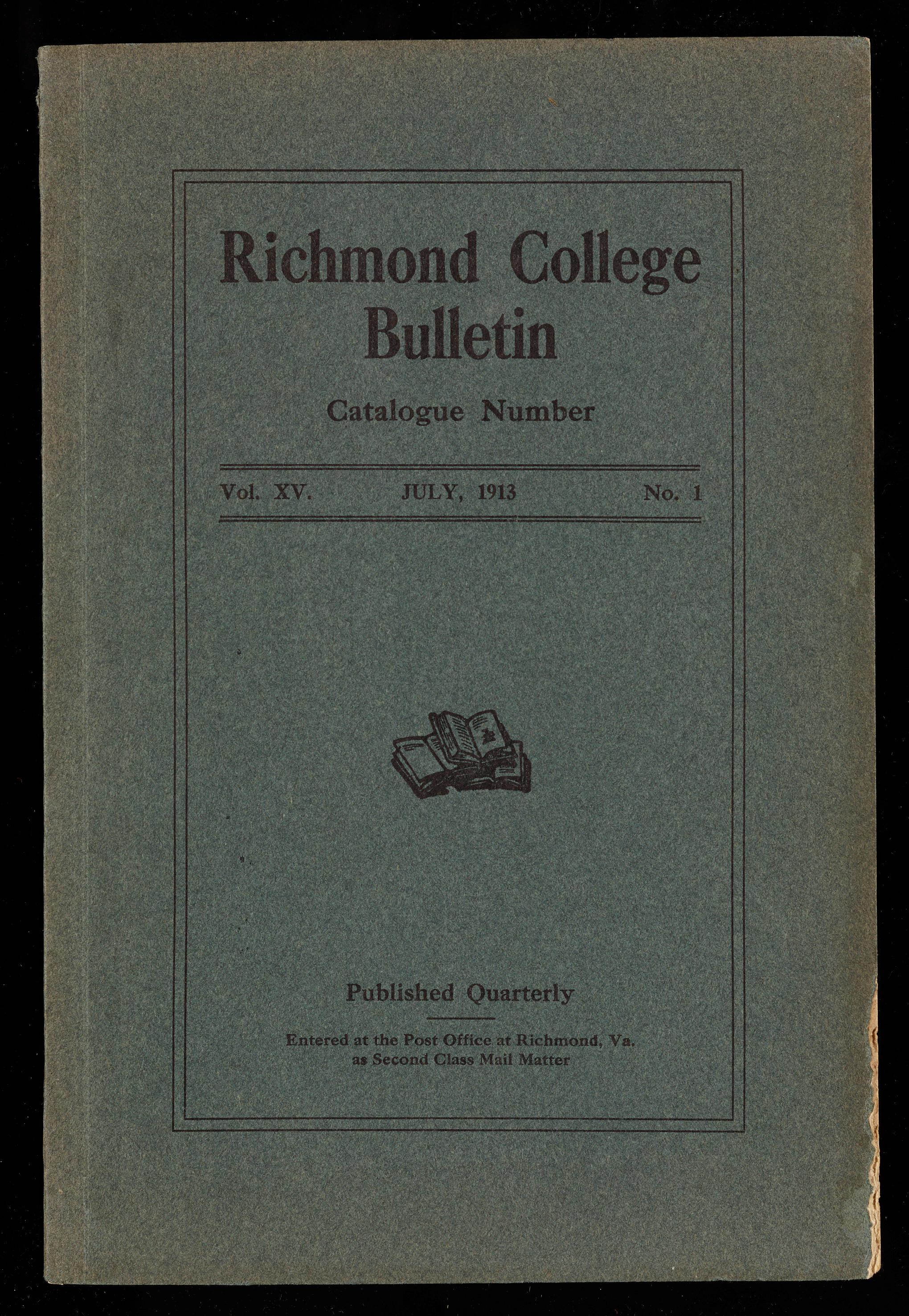
Vpt. XV. JULY, 1913
E,ntered .at the Post Office .·at Richtnortd, Va, a~ Second Glass Mail Matter No. 'l
Published ' Q!-)arterly
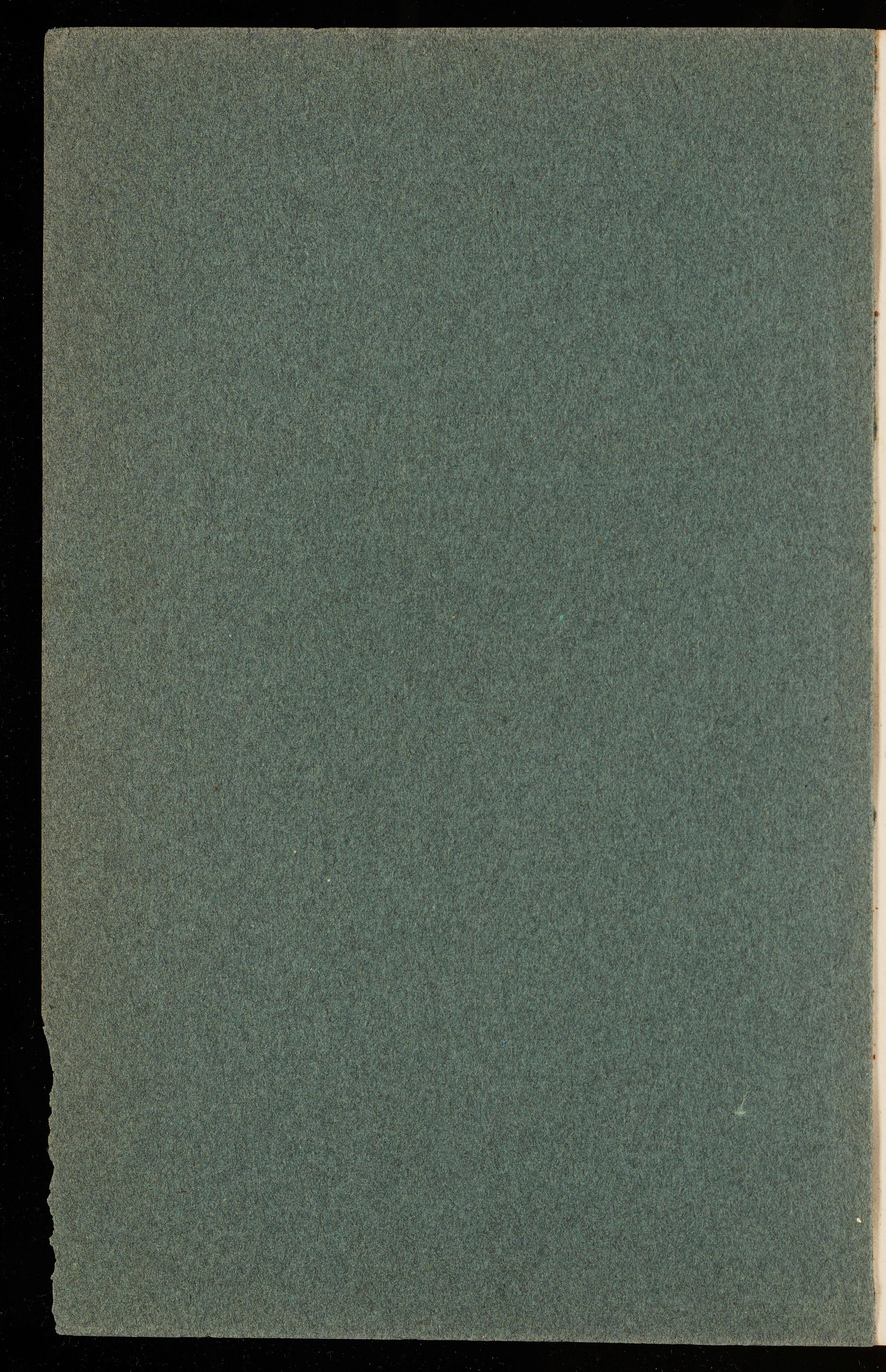


Vpt. XV. JULY, 1913
E,ntered .at the Post Office .·at Richtnortd, Va, a~ Second Glass Mail Matter No. 'l
Published ' Q!-)arterly

SESSION 1912-13
w ith Announcements for SESSION 19!3-14
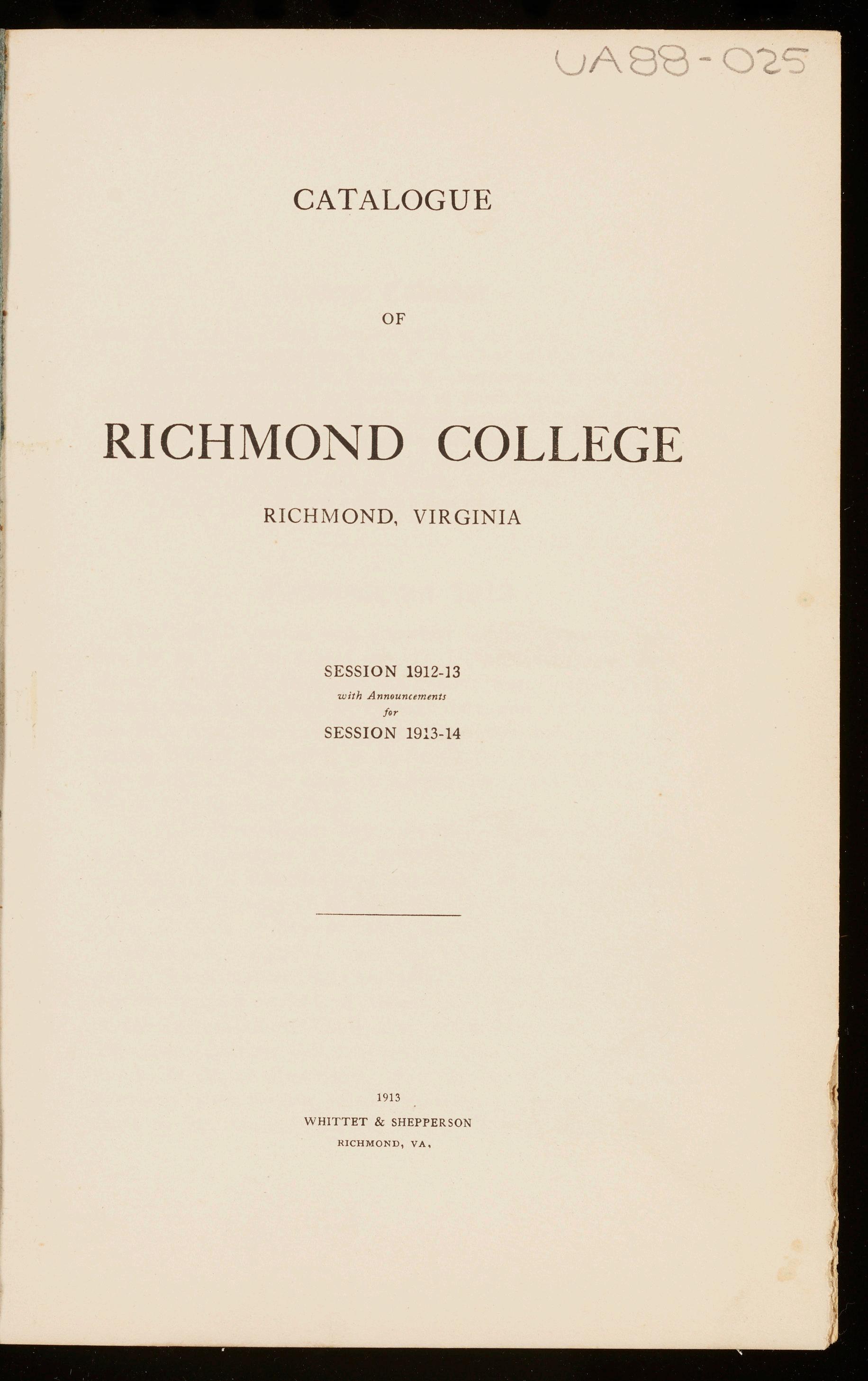
1913
WHITTET & SHEPPERSON
RJCHMOND, VA,
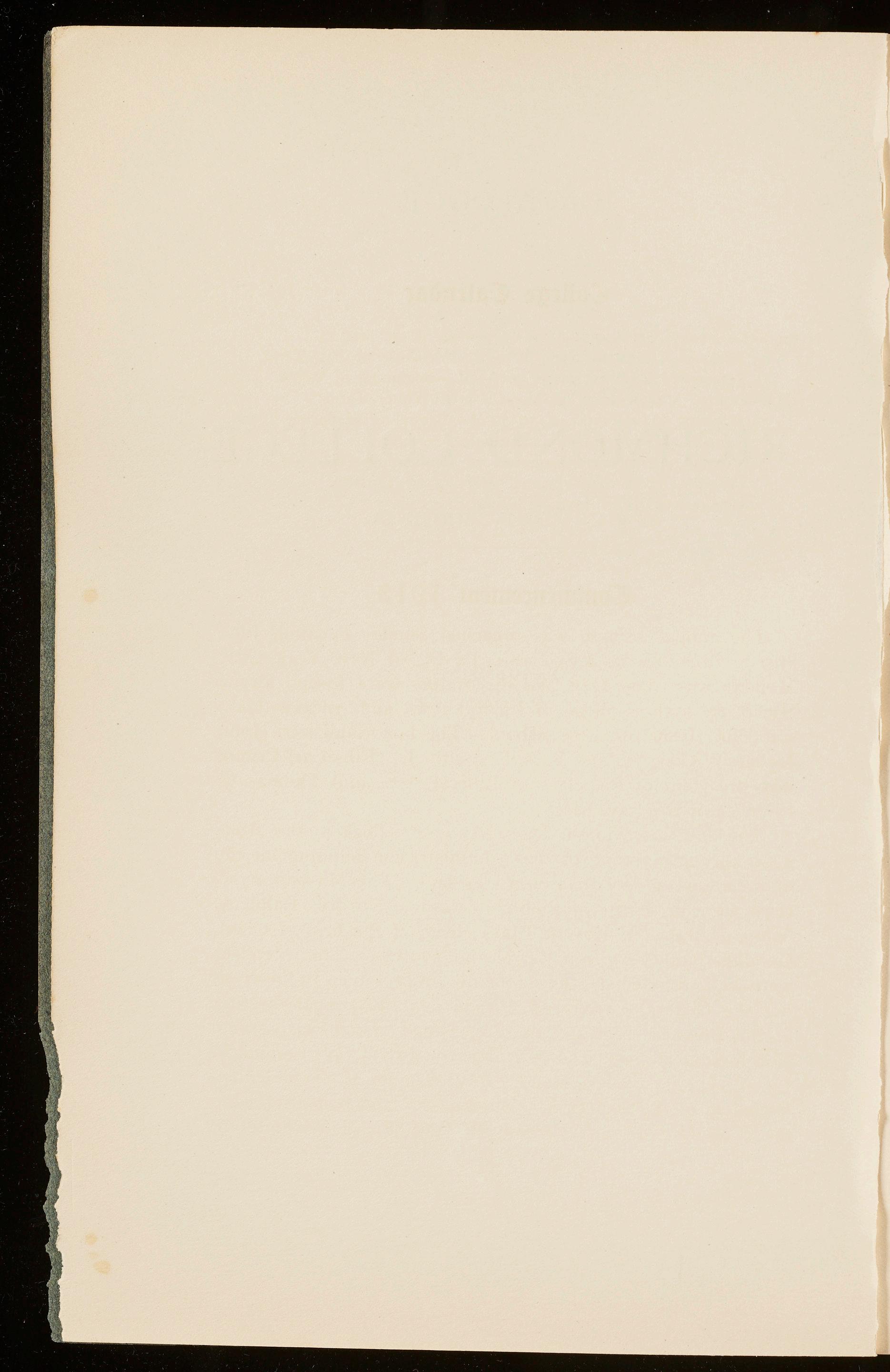
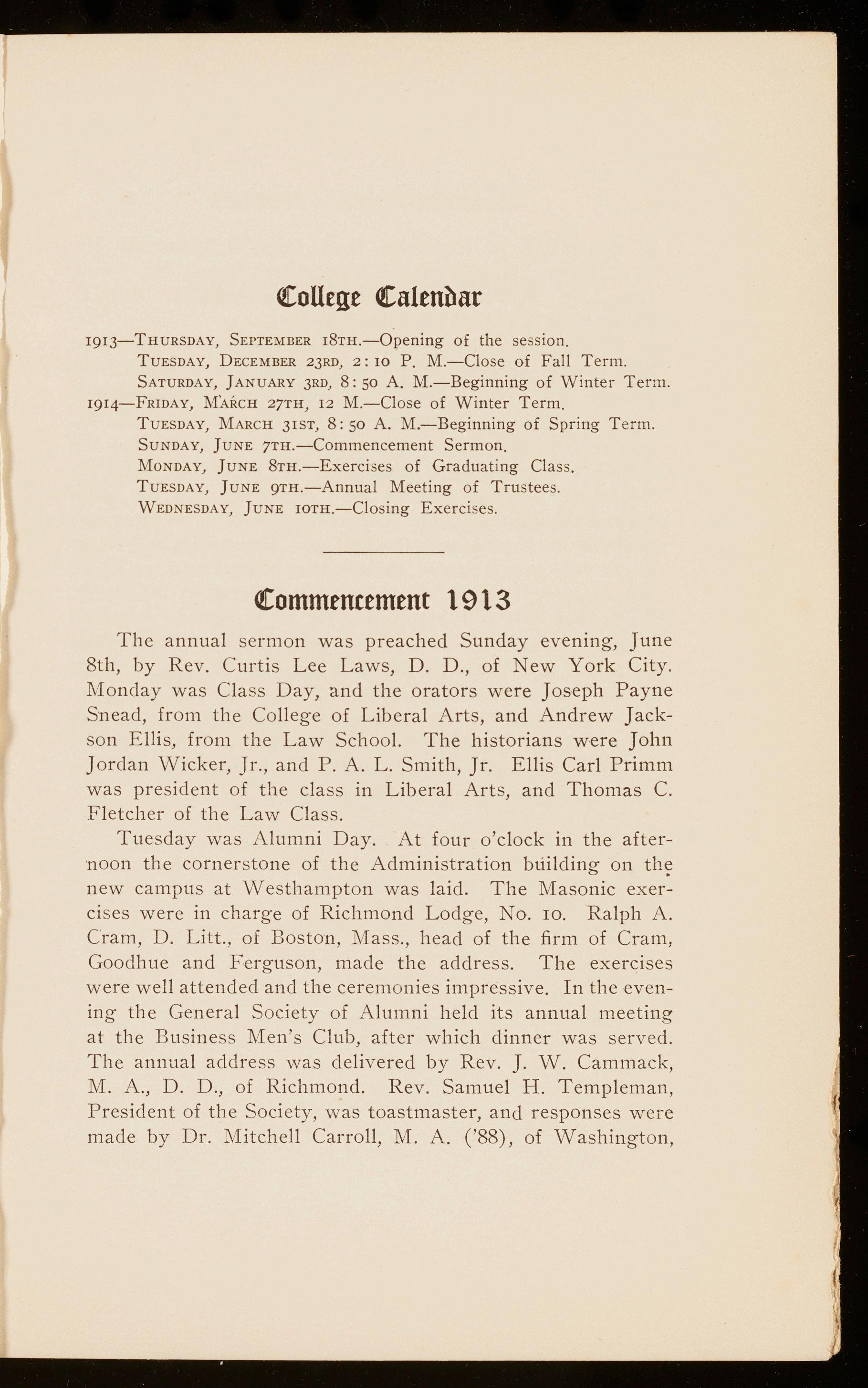
1913-THURSDAY, SEPTEMBERr8TH.-0pening of the se ssion
TUESDAY, DECEMBER23RD, 2: ro P. M.-Close of Fall Term
SATURDAY,JANUARY JRD , 8: 50 A. M.-Beginning of Winter Term .
1914-FRIDAY, MARCH 27TH, 12 M.-Close of Winter Term .
TUESDAY, MARCH 31ST, 8: 50 A. M.-Beginning of Spring T e rm.
SUNDAY, JuNE 7TH.- Commencement Sermon.
MONDAY, JUNE 8TH.-Exercises of Graduating Clas s TUESDAY, JuNE 9TH -Annual Meeting of Tru stees.
WEDNESDAY, JUNE IOTH.-Closing Exerci ses.
The annual s ermon was preached Sunday evening, June 8th, by Rev. Curtis Lee Laws, D. D., of New York City Monday was Cla s s Day, and the orators were Joseph Payne Snead, from the College of Liberal Arts, and Andrew Jackson Ellis, from the Law School. The historians were John Jordan Wicker, Jr., and P.A. L. Smith, Jr. Ellis Carl Primm was president of the class in Liberal Arts, and Thomas C. Fletcher of the Law Class.
Tuesday was Alumni Day. At four o'clock in the afternoon the corner s tone of the Administration bLiilding on th~ new campus at \,Vesthampton was laid. The Masonic exerci s es were in charge of Richmond Lodge, No. IO. Ralph A. Cram, D. Litt ., of Boston, Mass., head of the firm of Cram, Goodhue and F erguson, made the address. The exercises were well attended and the cerem o nies impressive. In the evening the General Society of Alumni held its annual meeting at the Business Men's Club, after which dinner was serv e d. The annual addre s s was del ivered by Rev. J. W. Cammack, M. A., D . D., of Richmond. Rev. Samuel H. Temp l eman, President of the Soci e ty, was toastmaster, and responses were made by Dr. Mitchell Carroll, M. A. ('88), of Washington,
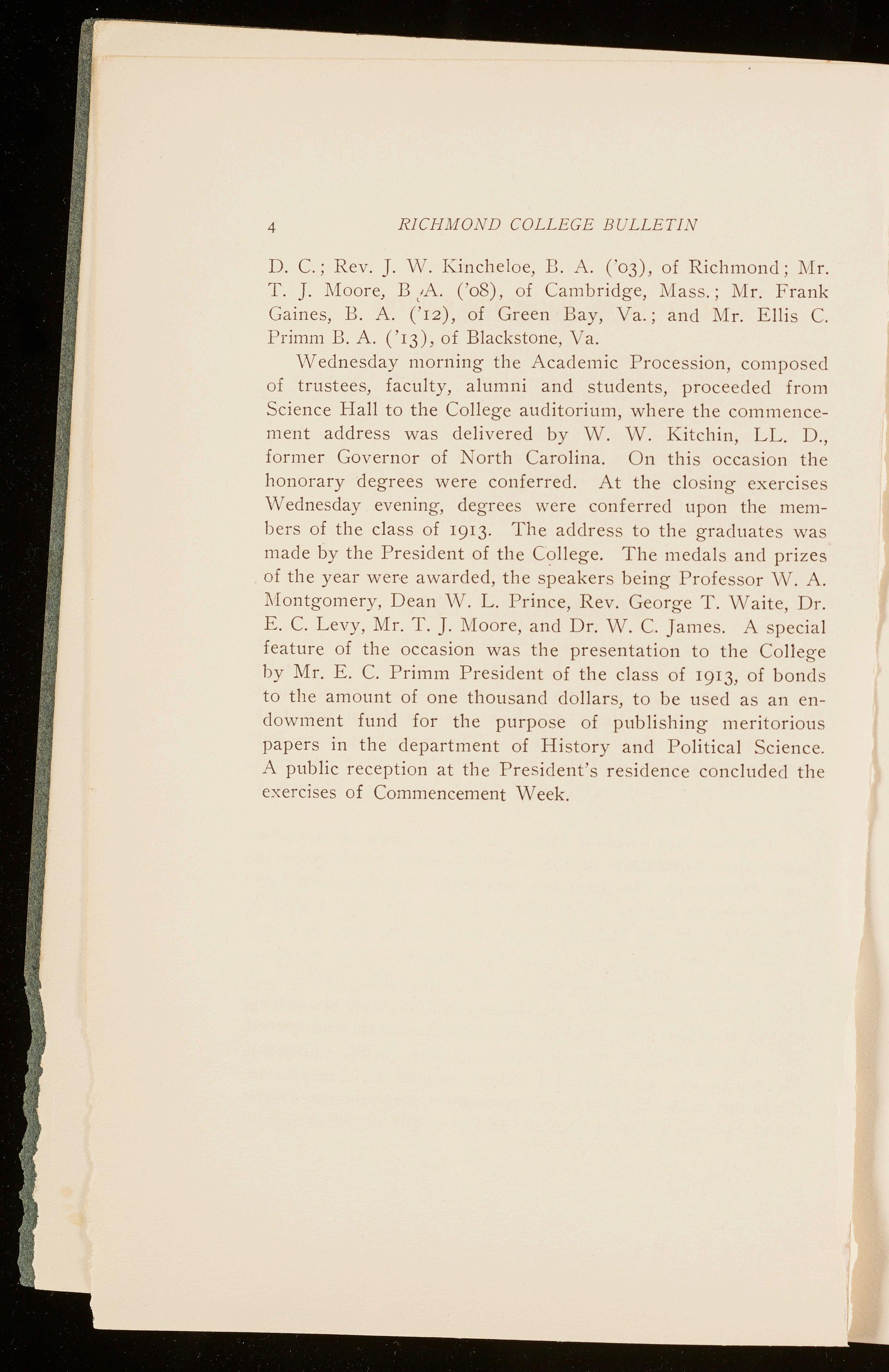
D. C.; Rev. J. \V. Kincheloe, D. A. ("03), of Richmond; l\Ir. T. J. l\Ioore, D c'A. ('08), of Cambridge, l\lass.; Mr. Frank Gaines, B. A. ('12), of Green Bay, Va.; and l\Ir. Ellis C. Primm B. A. ('13), of Blackstone, Va. \Vednesday morning the Academic Procession, composed of trustees, faculty, alumni and students, proceeded from Science Hall to the College auditorium, where the commence- ment address was delivered by vV. \V. Kitchin, LL. D., former Governor of North Carolina. On this occasion the honorary degrees were conferred. At the closing exercises vVednesclay evening, degrees were conferred upon the mem- bers of the class of 1913. The address to the graduates was made by the President of the College. The medals and prizes of the year wer •e awarded, the speakers being Professor vV. A. l\Iontgomery, Dean Vv. L. Prince, Rev. George T. \i\Taite, Dr. E. C. Levy, Mr. T. J. Moore, and Dr. \V. C. James. A special feature of the occasion was the presentation to the Coliege by Mr. E. C. Primm President of the class of 1913, of bonds to the amount of one thousand dollars, to be used as an en- dowment fund for the purpose of publishing meritorious papers in the department of History and Political Science. A public reception at the President's residence concluded the exerci es of Commencement Week.
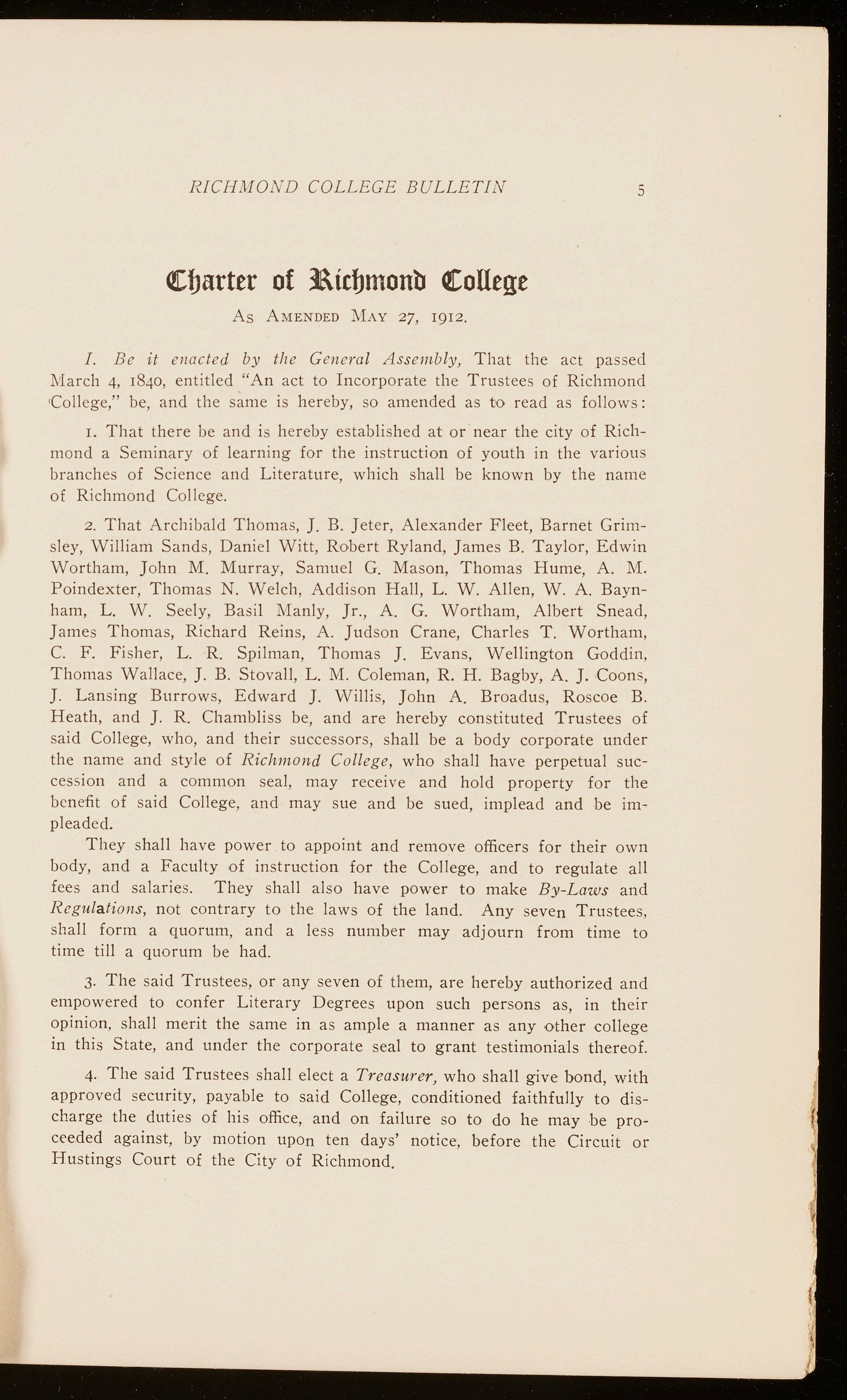
As AMENDED MAY 27, 1912.
I. B e it en acted by th e General Assembly, That the act pa ss ed Mar ch 4, 1840, ent itled "An a ct to Incorporate the Trust ee s of Richm o nd ,coll eg e," be, and th e sa me is hereby, so amended a s to read as follow s :
r. That there be and is h ereby es tabli shed at or near the city of Richmond a S e minar y o f learning for the in struction of youth in the variou s branch es of Sci en ce and Literature, which shall be known by the nam e of Richmond Coll ege
2. That Archi bald Thoma s, J. B. Jet er , Alexander Fleet, Barnet Grims ley, William Sand s, Dani e l Witt, R obert Ryland, Jame s B. Taylor, Edwin Wortham, J ohn M. Murray, Samuel G. Ma son, Thomas Hurne, A. M. Poindexter, Thoma s N. Welch, Addi son Hall, L. W. Allen , W. A. Baynham, L. W. Seely, Ba s il Manly , Jr., A. G. Wortham, Albert Snead, Jame s Thoma s, Richard Rein s, A. Jud son Crane, Charl es T. Wortham, C. F . Fi sh er, L. R Spilman , Thoma s J. Evans, Wellington Goddin, Thomas Wallace, J. B. Stovall, L. M. Coleman, R. H. Bagby, A. J. Coon s, J. Lan s ing Burrow s, Edward J. Willi s, John A. Broadu s, Ro scoe B. Heath, a nd J. R. Chambliss be, and ar e hereby constituted Trustees of said College, who, and their successor s , shall be a body corporate under the nam e and style of Richmond College, who shall have perpetual succes sion and a common seal , may receive and hold property for the benefit of said College , and may sue and be sued, implead and be impleaded.
They shall have power to appoint and remove officers for their own body, and a Faculty of instruction for the College, and to regulate all fees and salarie s. They shall also have power to make By-Laws and Regulations, not contrary to the laws of the land. Any seven Trustees, shall form a quorum, and a less number may adjourn from time to time till a quorum be had.
3. The said Trustees, or any seven of them, are hereby authorized and empowered to confer Literary Degrees upon such persons as, in their opinion, shall merit the same in as ample a manner as any other college in this State, and under the corporate seal to grant testimonials thereof.
4. The said Trustees shall elect a Treasurer, who shall give bond, with approved security, payable to said College, conditioned faithfully to discharge the duties of his office, and on failure so to do he may be proceeded against, by motion upon ten days' notice , before the Circuit or Hustings Court of the City of Richmond.
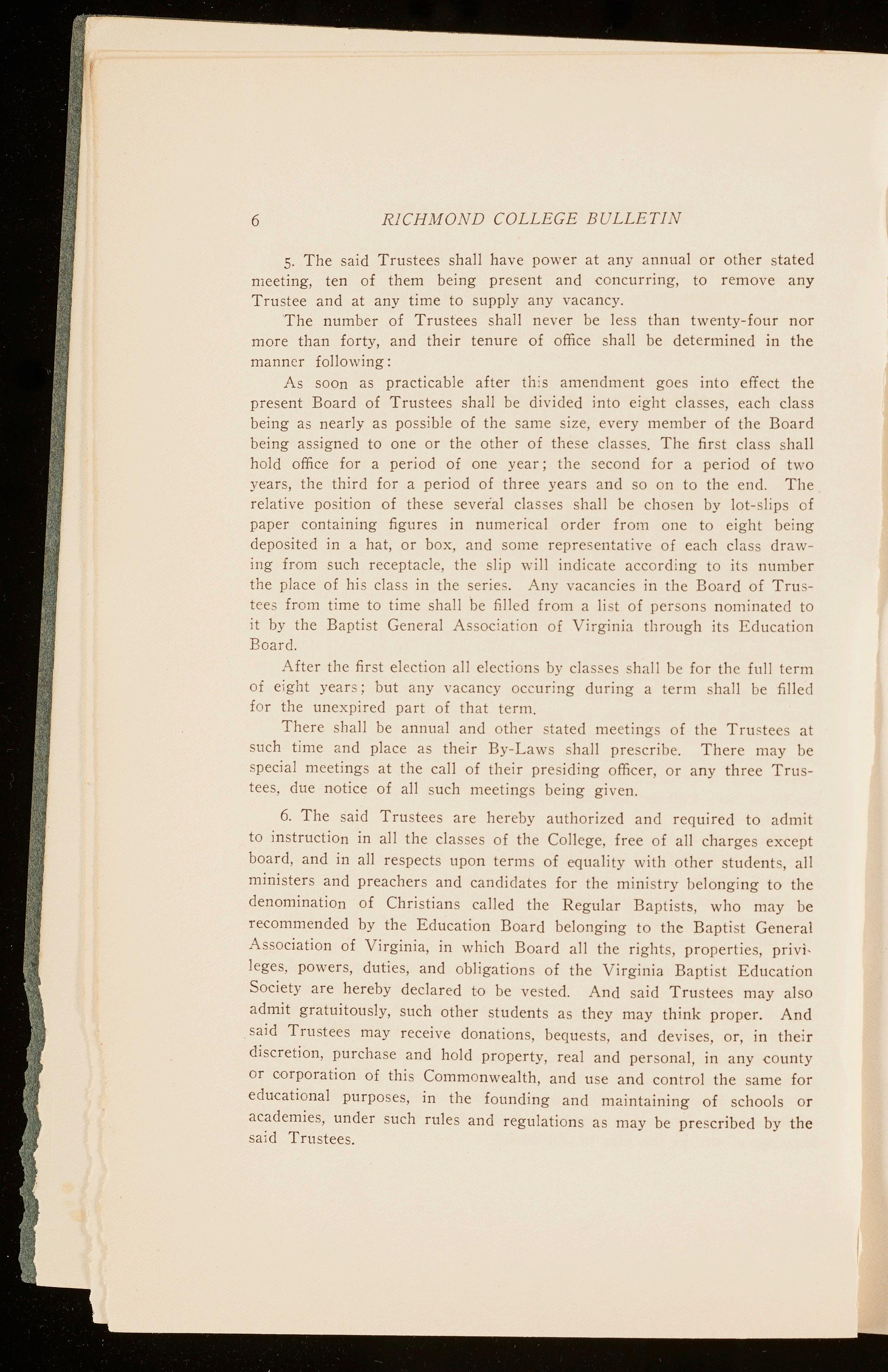
5. The said Trustees shall have power at any annual or other stated meeting, ten of them being present and concurring, to remove any Trustee and at any time to supply any vacancy.
The number of Trustees shall never be less than twenty-four nor more than forty, and their tenure of office shall be determined in the manner following:
As soon as practicable after this amendment goes into effect the present Board of Trust ees shall be divided into eight classes, each class being as nearly as possible of the same size, every member of the Board being assigned to one or the other of these classes. The fir st clas sha ll hold office for a period of one year; the second for a period of two years, the third for a period of three years a nd so on to the end. The relative position of these several classes shall be chosen by lot-slips of paper containing figures in numeri cal order from one to eight being deposited in a hat, or box, and some representative of each class drawing from such receptacle, the slip ,viii indicate according to its number the place of his class in the series Any vacancies in the Board of Tru stees from time to time shall be filled from a li st of persons nominate d to it by the Baptist General Association of Virginia through its Education Board
Afte r the first election all elections by classes shall be for the full term of eight years; but any vacancy occuring during a term shall be filled for the unexpired part of that term.
There shall be annual and other stated meetings of the Trustees at such time and place as their By-Laws shall prescribe. There may be special meetings at the call of their presiding officer, or any three Trustees, due notice of all such meetings being gi,·en.
6. The said Tru stees are hereby authorized and required to admit to instruction in all the classes of the College, free of all charges except board, and in all respects upon terms of equality with other students, all ministers and preachers and candidates for the ministry belonging to the denomination of Christians called the Regular Baptists, who may be recommended by the Education Board belonging to the Bapti st General Association of Virginia , in which Board all the right s, properties, privileges, powers, duties, and obligation s of the Virginia Baptist Education Society are hereby declared to be vested. And said Tru s tees may also admit gratuitously, such other stude nts as they may think proper. And said Truste es may receive donation s, bequests, and devises , or, in their discretion, purchase and hold property, real and personal, in any county or corporation of this Commonwealth, and u se and control the same for educational purposes, in the founding and maintaining of schools or academies, under such rule s and regulati on s as may be pre scribed by the said Trustees.
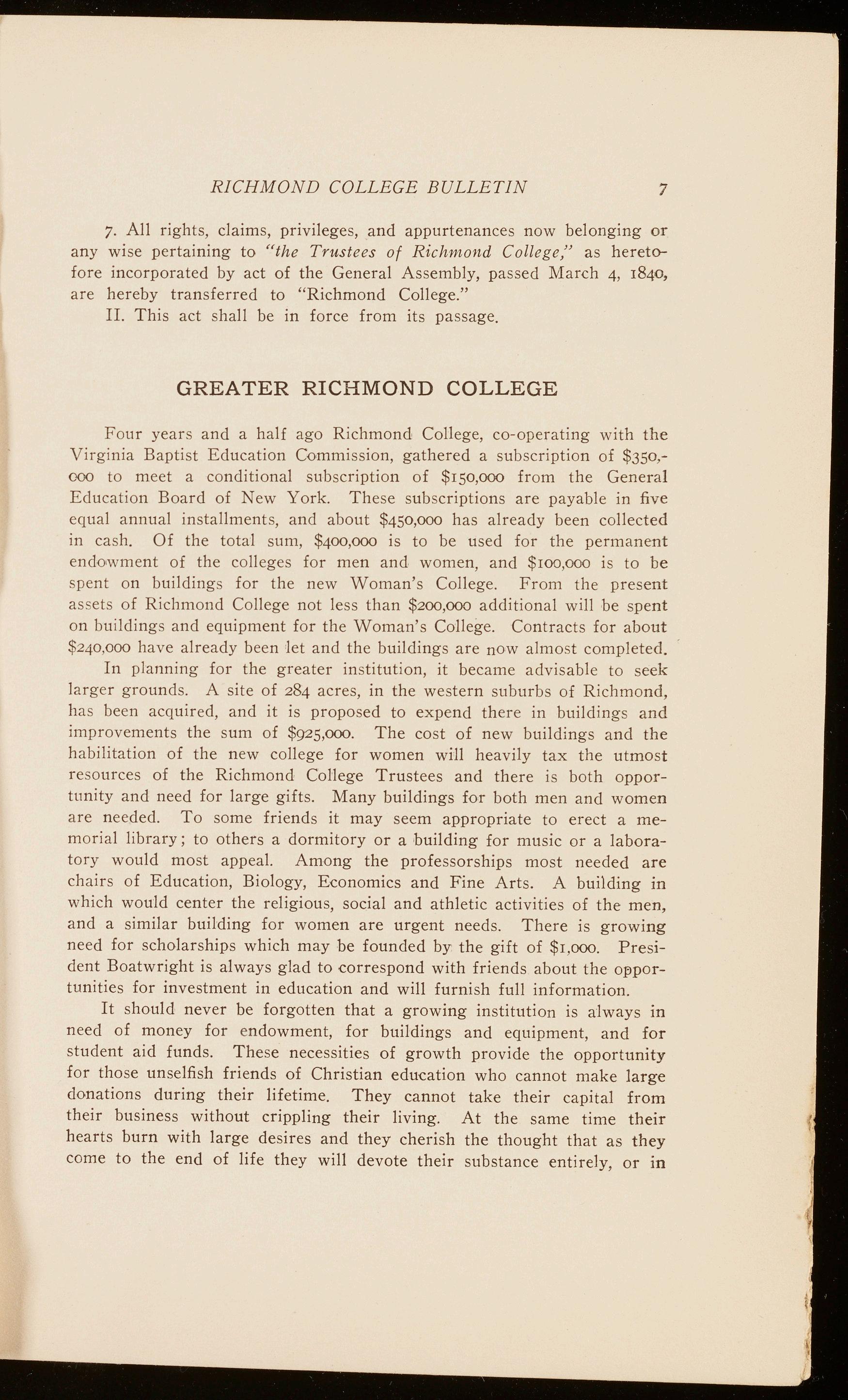
7. All rights, claims, privileges, and appurtenances now belonging or any wise pertaining to "the Trustees of Richmond College," as heretofore incorporated by act of the General Assembly, passed March 4, 1840, are hereby transferred to "Richmond College." II. This act shall be in force from its passage.
Four years and a half ago Richmond College, co-operating with the Virginia Baptist Education Commission, gathered a subscription of $350,000 to meet a conditional subscription of $150,000 from the General Education Board of New York. These subscriptions are payable in five equal annual installments, and about $450,000 has already been collected in cash. Of the total sum, $400,000 is to be used for the permanent endowment of the colleges for men and women, and $100,000 is to be spent on buildings for the new Woman's College. From the present assets of Richmond College not less than $200,000 additional will be spent on buildings and equipment for the Woman's College. Contracts for about $240,000 have already been let and the buildings are now almost completed. In planning for the greater institution, it became advisable to seek larger grounds A site of 284 acres, in the western suburbs of Richmond, ha s been acquired, and it is proposed to expend there in buildings and improvements the sum of $925,000. The cost of new buildings and the habilitation of the new college for women will heavily tax the utmo st resources of the Richmond College Trustees and there is both opportunity and ne ed for large gifts. Many buildings for both men and women are n eeded. To some friends it may seem appropriate to erect a memorial library; to others a dormitory or a ,building for music or a laboratory would most appeal. Among the profe ssorships most needed are chairs of Education, Biology, Economics and Fine Arts. A building in which would center the religious, social and athletic activities of the men, and a similar building for women are urgent needs. There is growing need for scholars hips which may be founded by the gift of $1,000. President Boatwright is always glad to correspond with friends about the opportunities for investment in education and will furnish full information. It should never be forgotten that a growing institution is always in need of money for endowment, for buildings and equipment, and for student aid funds . The se necessities of growth provide the opportunity for tho se unselfish friends of Christian education who cannot make large donations during their lifetime. They cannot take their capital from their business without crippling their living. At the same time their heart s burn with large de sires and they cherish the thought that as they come to the end of life they will devote their substance entirely, or in

part, to Christian education. There are many n ames which the friend · of Richmond College always utter with gratitude and affection-those who in dying remembered the College and gave of their fortune for its upbuilding. Their names are forever identified with the College, and will not be forgotten. Let not the tru tees of God's gifts forget t handle them carefully for the good of humanity and for the glory of God.
"I give and devise to Richmond College, located at Richmond, Va., the following real estate-to-wit (here de cribe the said real e tate a s to kind, quantity, and situation).
"I also give and bequeath to the said College the sum of dollars (J>-----), and the following bonds (or stocks)-to-wit (here describe the bonds or stocks), all of which are to be used for the following purposes-to-wit (here describe the purpo e for which it shall he applied)."
LIEUTENANT-GOVERNOR J. TAYLO~ ELLYSON, PRESIDENT.
A. W. PATTERSON, ESQ., VICE-PRESIDENT
CHARLES H. RYLAND, D. D., SECRETARY.
11!:lalSlS®nt
Term expires June, 1914.
MAJ. A. R. CouRTNEY, Richmond
H. WYTHE DAvrs, M. D., Rich ' d
C. H. RYLAND, D. D Richmond
C. T. WATKINS, EsQ Richmond
J. A. C. CHANDLER,Ph. D., Rich'd
11!:laisis~brtt
Term expires June, 1916.
]NO. R. BAGBY, D. D .... Ballsville
J. J. MONTAGUE,ESQ Richmond
J. M. PILCHER, D . D ..... Phoebu,
C. R. SANDS, EsQ ... Richmond
PROF. GEO. Sw ANN..... Powhatan
Claiss jJ'ibt
Term expires June, 1918.
B. T. GUNTER, EsQ ...... Accomac
W. C. JAMES, D. D ..... Richmond
A. R. LONG, EsQ Lynchburg
A. J. MONTAGUE,LL. D., Rich'd
R. C. WILLIAMS, EsQ Richmond
l!:laiss~tbrn
Term expires June , 1920.
REV. WM. L. BALL.... Richmond
S. C. MITCHELL, Ph. D., Rich'd
T. B. McADAMS, EsQ ... Richmond
G. W. McDANIEL, D. D ..... Rich'd
C. E. NICOL, ESQ...... Alexandria
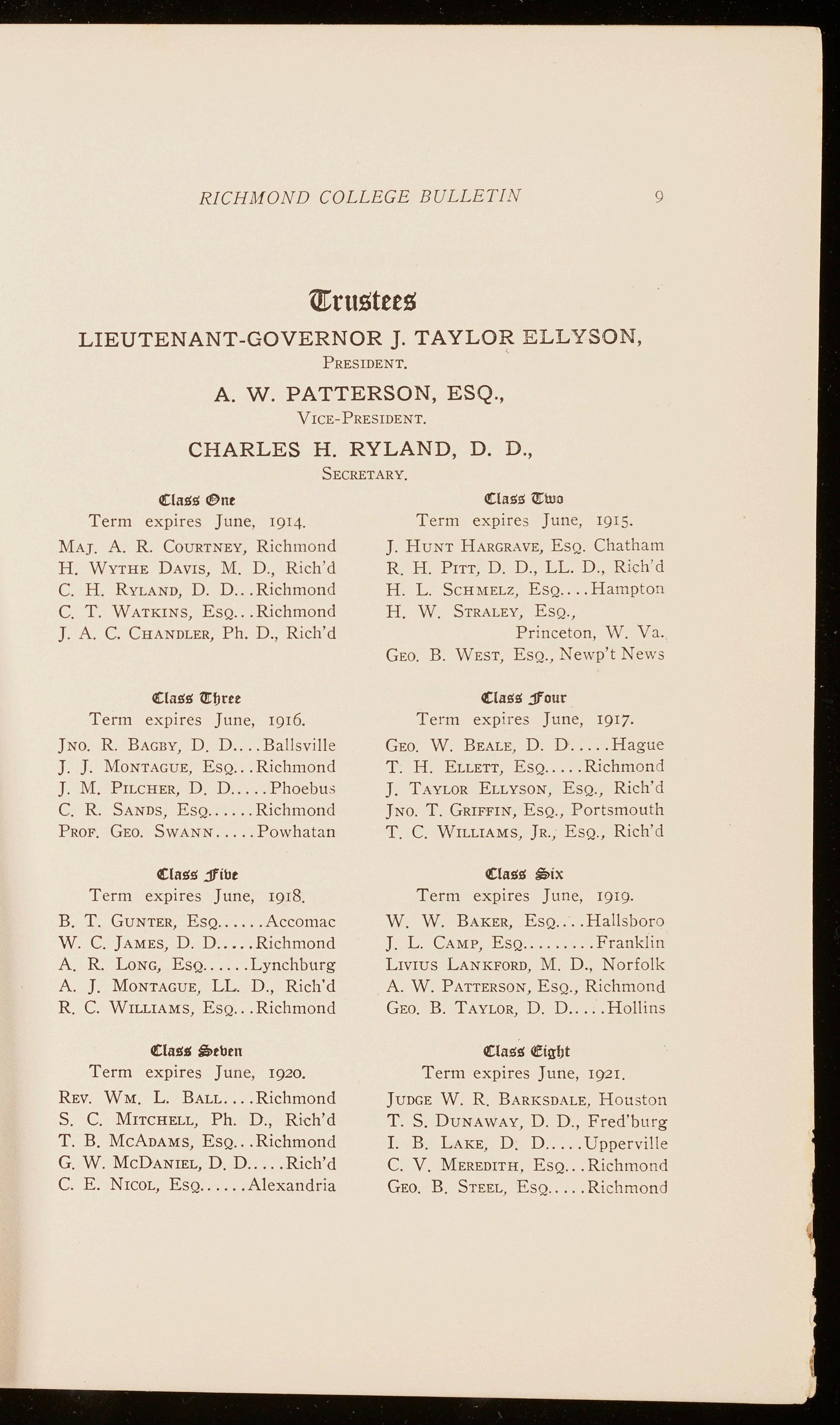
11!:las!l~llln
Term expires June, 1915.
J. HuNT HARGRAVE,EsQ. Chatham
R.H PITT, D. D., LL. D., Rich ' d
H. L. SCHMELZ, EsQ .... Hampton
H. W. STRALEY, ESQ. , Princeton, W. Va.
GEO. B. WEST, EsQ., Newp't News
ClaisisjJ'our
Term expi r es June, 1917.
GEO. W. BEALE , D. D ..... Hague
T. H. ELLETT, ESQ..... Richmond
J. TAYLOR ELLYSON, EsQ., Rich'd
JNo. T. GRIFFIN, EsQ., Portsmouth
T. C. WILLIAMS, JR., ESQ., Rich'd
l!:lalSlS~ix
Term expires June, 1919.
W. W. BAKER, EsQ .... Hallsboro
J. L. CAMP, ESQ Franklin
Lrvrus LANKFORD,M D., Norfolk
A. W. PATTERSON,EsQ., Richmond
GEO. B. TAYLOR,D. D Hollins
11!:laisisQi:igbt
Term expires June, 1921.
JUDGE W. R. BARKSDALE , Houston
T. S. DUNAWAY, D. D., Fred'burg
I. B. LAKE, D. D ..... U pperville
C. V. MEREDITH, EsQ ... Richmond
GEO. B. STEEL , ESQ..... Ri chmond
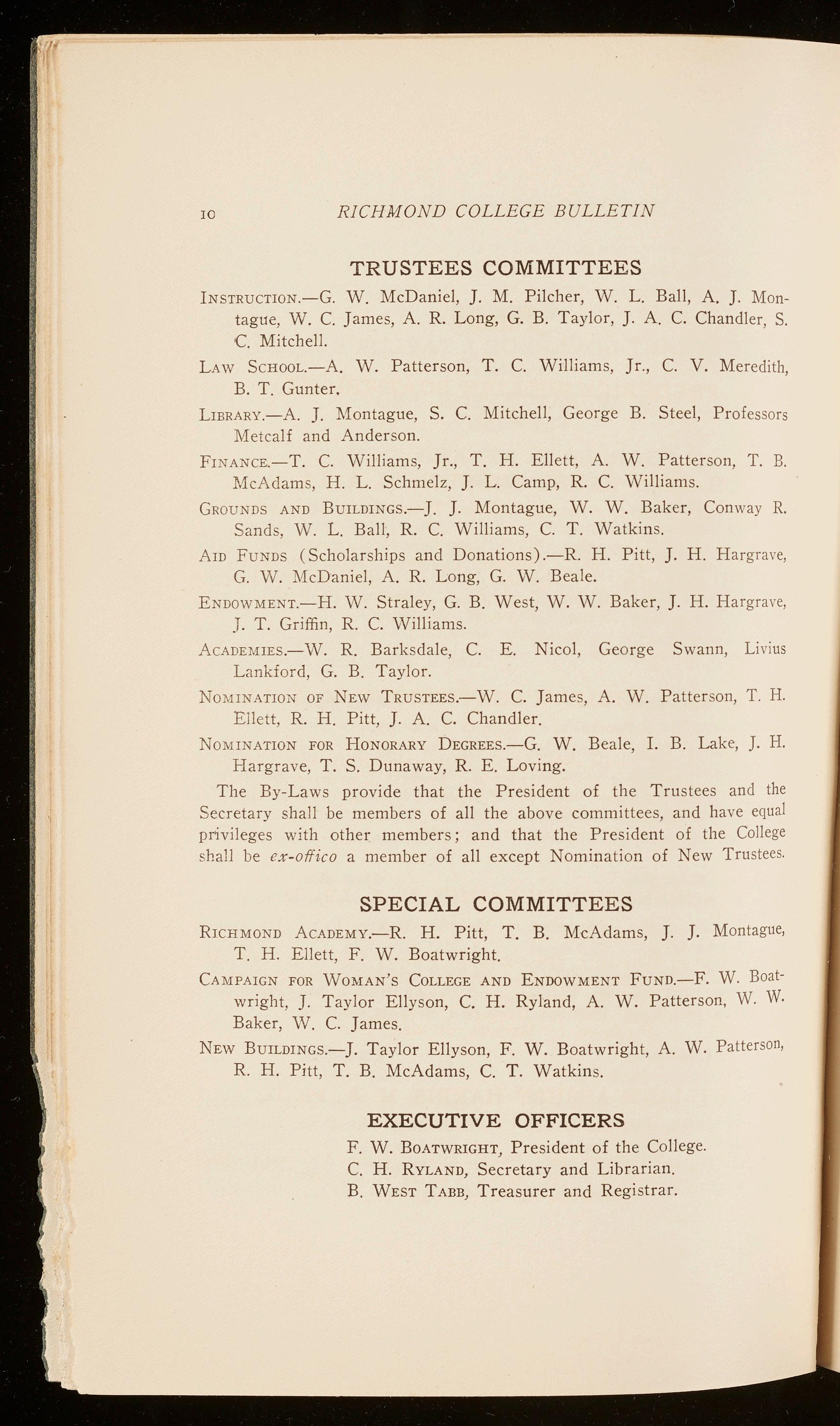
INSTRUCTION.-G W. McDaniel, J. M. Pilc h er, W. L. Ba ll, A. J. Montague, W. C. James, A. R. Long, G . B. Taylor, J, A. C. Chandler, S. C. Mitchell.
LAW ScHOOL.-A. W. Patterson, T. C. Williams, Jr., C. V. Meredith, B. T. Gunter.
LIBRARY.-A. J. Montague, S. C. MitcheJI, George B. Stee l, Professors Metcalf and Anderson.
FINANCE.-T. C. Williams, Jr., T. H. Ellett, A. W. Patterson, T. B. :McAdams, H. L. Schmelz, J. L. Camp, R. C. Wi lliams.
GROUNDSAND BUILDINGS-]. J. Montague, W. W. Baker, Conway R. Sands, W. L. Ball, R. C. Williams, C. T. Watkins.
Arn FUNDS ( Scholarships and Donations) .-R. H. Pitt, J. H. Hargrave, G. W. McDaniel, A. R. Long, G. W. Beale.
ENDOWMENT.-H. W. Straley, G. B. West, W. VI/. Baker, J. H. Hargrave, J. T. Griffin, R. C. Williams.
AcADEMIES.-W. R. Barksda le, C. E. Nicol, George Swann, Livius Lankford, G. B. Taylor.
NOMINATIONOF NEW TRUSTEES.-W. C. James, A. W. Patterson, T. H. Ellett, R. H. Pitt, J, A. C. Chand ler. NOMINATIONFOR HONORARYDEGREES.-G. W. Beale, I. B. Lake, J. H. Hargrave, T. S. Dunaway, R. E. Loving.
The By-Laws provide that the President of the Trustees and the Secretary shall be members of aII the above committees, and have equal privileges with other members; and that the P r esident of the College shall be e.r-offico a member of aII except Nomination of New Trustees.
RICHMOND AcADEMY.-R. H. Pitt, T. B. McAdams, J, J. Montague, T. H. Ellett, F. W. Boatwright. CAMPAIGNFOR WOMAN'S COLLEGEAND ENDOWMENTFuND.-F. W. Boatwright, J. Taylor Eilyson, C. H. Ryland, A. W. Patterson, W W. Baker, W. C. James.
NEW BUILDINGS.-]. Taylor Ellyson, F. W. Boatwright, A. W. Patterson, R. H. Pitt, T. B. McAdams, C. T . Watki n s.
F. W. BOATWRIGHT,Preside nt of the College. C. H. RYLAND,Secretary and Li b rarian. B. WEST TABB, Treasurer and Registrar.
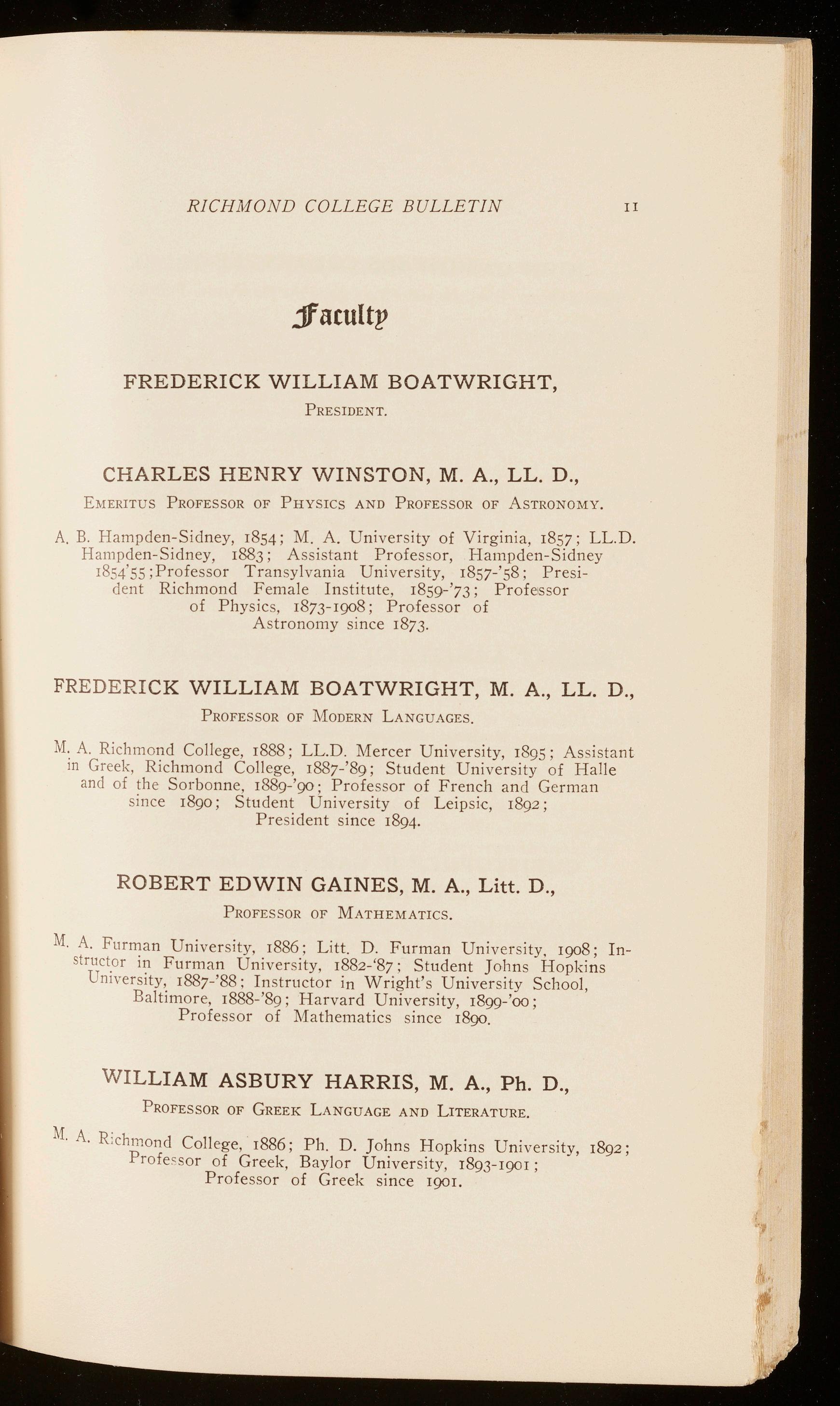
RICHMOND COLLEGE BULLETIN II
FREDERICK WILLIAM BOATWRIGHT, PRESIDENT.
EMER IT U S PROFESSOR OF PHYSICS AND PROFESSOR OF ASTRONOMY.
A. B. Ha mpden-Sidney, 1854; M.A. University of Virginia, 1857; LL.D. Hamp den-Sidney , 1883; A ssistant Profes sor, Hampden-Sidney 1854"55 ;Profe ssor Tran sylva n ia Univers ity, 1857-'58; President Richmond Female In stitute , 1859-'73; Professor of Physic s, 1873-1908; Profes sor of A stronomy since 1873.
PROFESSOR OF MODERN LANGUAGES.
M. A Rich mo nd College, 1888; LL.D. Mercer University, 1895; As sistant in Greek, Richmond College, 1887-'89; Student University of Halle and of t h e Sorb onne, 1889-'90; Profe ssor of French and Ge rman since 1890; Student University of Leipsic, 1892; Pre sident since 1894.
PROFESSOR OF MATHEMATICS.
M. A. Fur man University, 1886; Litt. D. Furman Univ e r sity , 1908; Instruct.or i:1 Furman Univer sity, 1882-'87; Student J oh n s Hopkins Un11·e r s1ty, 1887-'88; Instructor in Wright's University School, Baltimor e, 1888-'89; Harvard University, 1899-'oo; Professor of Mathematics since 1890.
PROFESSOR OF GREEK L ANGUAGE AND LITERAT URE.
M. A. R:chmond College, 1886; Ph . D. J ohns Hopkins University, 1892; Profe , sor o f Greek, B ay lor University, 1893- 190 1 ; Professor of Greek si n ce 1901.
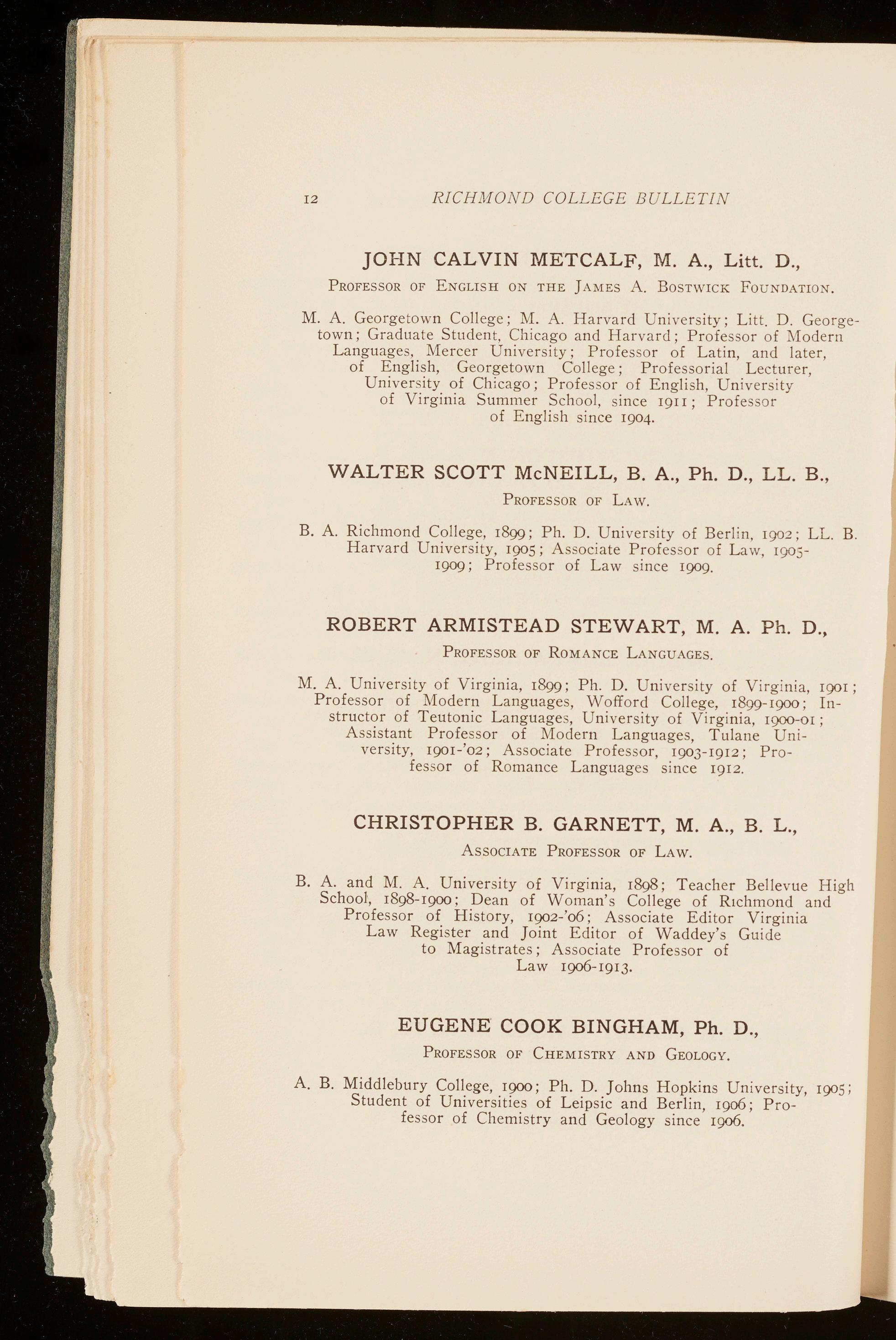
JOHN CALVIN METCALF, M . A ., Li tt. D .,
PROFESSOR OF ENGLISH ON THE JAMES A. BOSTWICK FO UNDATION
M. A. George to wn Coll ege; M. A. Harvard University; Litt. D. George- town; Graduate Student , Chicago and Harvard; Profe sso r of Modern La nguages, Mercer University; Professo r of Lati n , and later, of English, Georgetown College; Professorial Lecturer, Univer sity of Chicago; Profes so r of English, University of Virginia Summer School, since 19u; Professor of English since 1904.
SCOTT McNEILL , B . A. , Ph . D ., LL. B .,
PROFESSOR OF LAW.
B. A. Richmond College, 1899; Ph. D. University of Berlin, 1902; LL. B. Harvard University, 1905; Associate Profes so r of Law , 19051909; Profes so r of Law since 1909.
ROBERT ARMISTEAD STEW ART , M . A. Ph . D .,
PROFESSOR OF ROMANCE LANGUAGES.
M. A. University of Virginia, 1899; Ph . D. University of Virg inia, 1901; Professor of Modern Languages, Wofford College, 1899-1900; Instructor of Teutonic Language s, University of Virginia, 1900-01; Assistant Professor of Modern Languages, Tulane University, 1901-'02; Associate Professor, 1903-1912; Profes so r of Romance Languages since 1912.
B. GARNETT , M. A. , B . L .,
ASSOCIATE PROFESSOR OF LAW.
B. A. and M. A. University of Virginia, 1898; Teacher Bellevue High School, 1898- 1900: Dean of Woman's College of Richmond and Professor of History, 1902-'o6; Associate Editor Virginia Law Regis t er and J oint Editor of Waddey's Guide to Magistrates; Associate Professor of Law 1900-1913.
COOK BINGHAM , Ph . D .,
PROFESSOR OF CHEMISTRY AND GEOLOGY.
A. B. Middlebury College, 1900; Ph. D. J oh n s Hopkins University, 1905; Student of U n iversities of Leips ic a n d Berlin, r9o6; Professor of Chemistry a n d Geology since 1900.
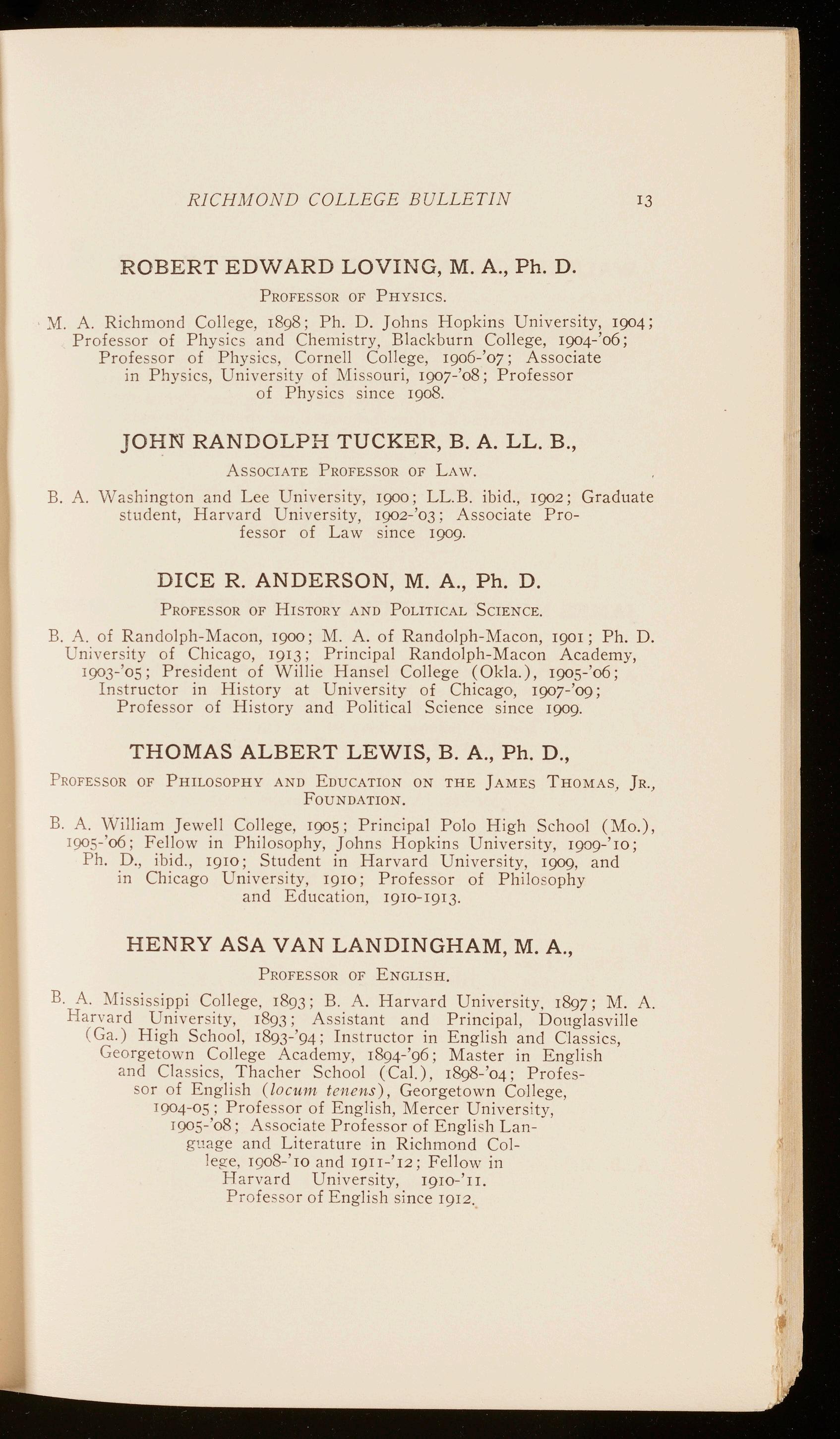
PROFE S SOR OF PHYSICS
.'.11 . A. Richmond College , 1898; P h . D. Johns Hopkins University, 1904; P ro fe ss or of Phy sics and Chemi stry, Blackburn Co llege, 1904-'06; Profe ss or of Phy sics , Cornell College, 1906-'07; Associate in Phy sics, Univer s ity of Mi ss ouri, 1907-'08; Profe ssor of Physics since 1908.
AS SOCIATE
PROFESSOR OF LAW.
B. A. W as hington and Lee Univer sity, 1900; LLB. ibid. , 1902; Graduate st udent, Harvard Unive r sity, 1902-'03; Associate Profe ss or of Law since 1909.
PROFE S SOR OF HISTORY AND POLITICAL SCIENCE.
B. A. o f Randolph-Macon, 1900; M. A. of Randolph-Macon, 1901; Ph. D. Un iv er sity of Chicago, 1913 ; Principal Rando lph-Macon Academy, 1903- ' 05; President of Willie Hansel College (Okla . ), 1905-'o6; I n structor in Hi story at U n iver sity of Ch icago, 1907-'09; Profes sor of History and Politica l Science sin ce 1909.
PROFESSO R OF PHILO SOPHY A N D EDUCATION ON THE JAMES THOMAS , JR., FOUNDATION.
B. A Willi a m Jewell College , 1905; Principal Polo High School (Mo.), r905- 'o6 ; Fellow in Philosophy, John s Hopkin s University, 1909-'ro; P h. D. , ibid , 1910; Student in Harvard University , 1909, and in Chicago U ni versity , 1910; Profes sor of Philo sophy and Education , 1910-1913.
PROFE S SOR OF ENGLISH.
B. A. M iss iss ippi Coll ege, 1893; B. A. Harvard Univer s ity. 1897; M. A Han·a rd Uni ver sity , 1893 ; A ss istant and Principal, Doug lasville (Ga ) High School , 1893-'94; In structor in E n glish and Classics, Geo rgetown College Academy , 1894-'96; Master in E n gl i sh a nd Cla ss ics, Thacher School (Ca l. ) , 18g8-'04; Professo r of Engli sh (locmn tenens), Georgetown College, 1904-05; Profe ss or of English , Mercer University , 1905-'08; A ss ociate Profes sor of Eng li sh Langua ge and Literature in Richmond Colle!re, 1908- ' ro and r9n-'12; Fellow in H a r vard University, 1910-'11. Pro fe ss or of English since 1912.
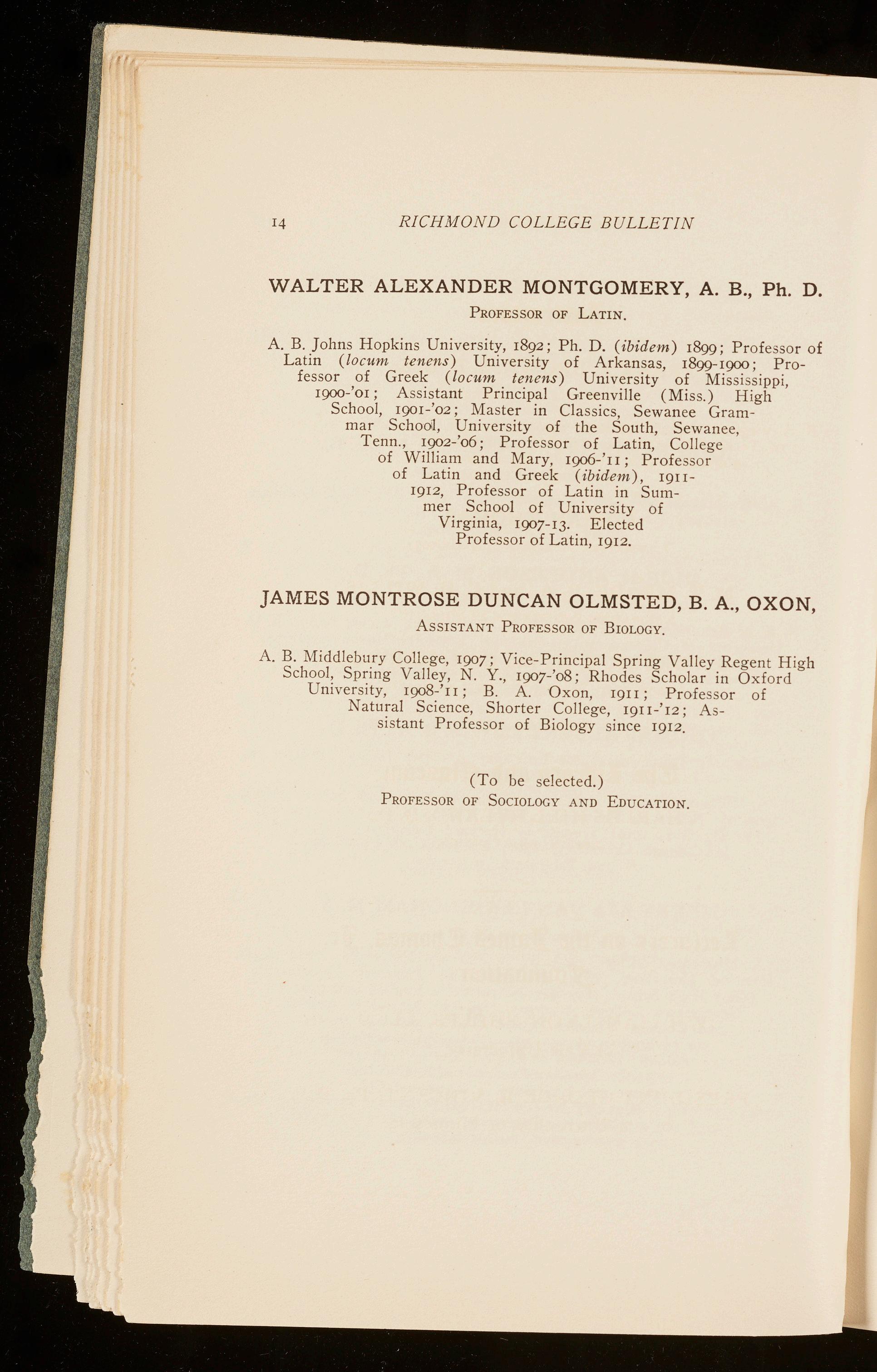
MONTGOMERY , A. B., Ph . D. PROFESSOR OF L ATIN.
A. B. Johns Hopkins University, 1892; Ph. D. (ibidem) 1899; Professor of Latin (locum tenens) University of Arkansas, 1899-1900; Pro- fessor of Greek (locwm tenens) University of Mississippi, 1900-'01; Assistant Principal Greenville (Miss.) High School, 1901-'02; Master in Classics, Sewanee Grammar School, University of the South, Sewanee, Tenn., 1902-'06; Professor of Latin, College of William and Mary, 1900-'u; Professor of Latin and Greek (ibidem), 19u1912, Professor of Latin in Summer School of University of Virginia, 1907-13. Elected Professor of Latin, 1912.
ASSISTANT PROFESSOR OF BIOLOGY.
A. B. Middlebury College, 1907; Vice-Principal Spring Valley Regent High School, Spring Valley, N. Y., 1907-'o8; Rhodes Scholar in Oxford University, 1go8-'u; B. A. Oxon, 19u; Profe sso r of Natural Science, Shorter College, 19u-'12; As- sistant Profes so r of Biology since 1912.
(To be se lected.)
PROFE SSOR OF SOCIOLOGY AND EDUCATION
RICHMO N D COLLEGE BULLETI N rs
FRANK Z. BROWN, S. B. E. E. ,
INS TRUCT OR I N DR A WIN G
B. S. V irgini a Mili t ary In s ti t ut e, 1900 ; S. B. E. E. M assac hu setts In st itute of Tec hn olog y, 1903 ; In st ru ct o r in Ph ysic s and Ele ctric ity V irg in ia Me ch a ni cs In sti t ut e s inc e 1903 ; In stru ctor in Dr a wing s ince 1904
ADRIAN THOMAS,
LABORATOR Y ASS I ST ANT I N B IO LOGY.
M. 'T. T-/lEADE, B. A., and C. H. WILLIS , L ABORATORY ASS I STAN T S I N PH YS I CS.
L . G. PORTER, B. A., and G. M. HARWOOD , L ABORATORY ASSISTANTS IN CHEMISTRY.
~be JLibrarpanbjl¾!luseum
CHARLES HILL RYLAND, D. D ., LIBRARIAN AND CURA TOR.
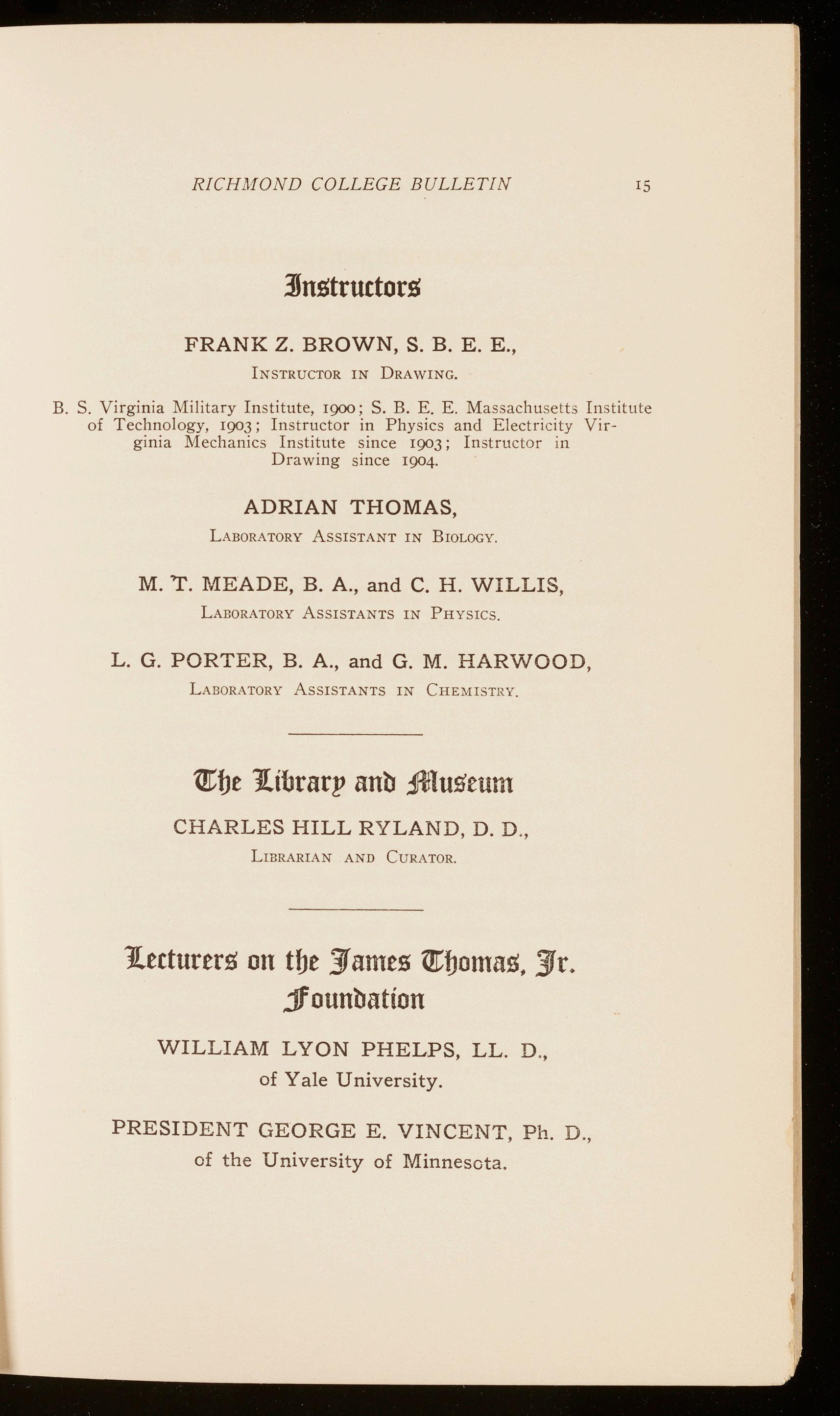
Jl.ecturerson tbe j{ ames~bomas.Jr . jf ounbatton
WILLIAM LYON PHELPS, LL. D , of Yale University.
PRESIDENT GEORGE E. VINCENT , P h . D., of the University of Minnesota
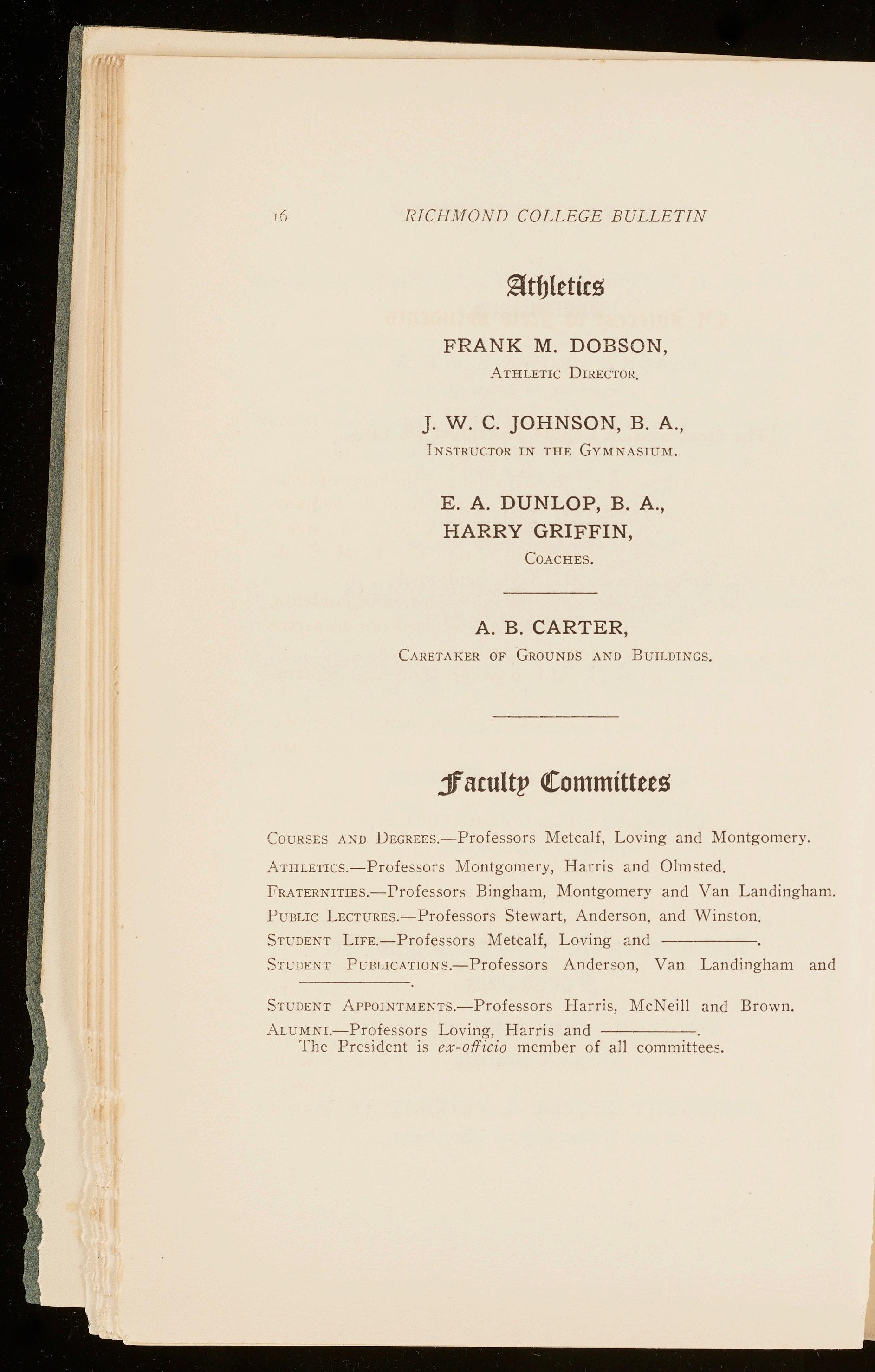
RICHMOND COLLEGE BULLETIN
FRANK M. DOBSON , ATHLETIC DIRECTOR.
J. W. C. JOHNSON, B. A., INSTRUCTORIN THE GYMNASIUM.
HARRY
Bun.DINGS.
COURSES AND DEGREES.-Professors Metcalf, Loving and Montgomery. ATHLETICS.-Pro fes so rs Mo nt gomery, Harris and Olmste d.
FRATERNITIES.- Profe sso rs Bingham, Montgomery and Van Landingham. Punuc LECTURES.-P rofessors Stewart, Ande r son, and Winston.
STUDENT LIFE.-Profes so rs Metcalf, Loving and STUDE.'lT PunLICATIONS.-P rofessors Anderso n , Van Landingham and
STUDENT APPOINTMDITS.-Professors Harris, McN eill and Brown ALUMNI.-Professors Loving, Harris and -----. The President is e.1;-officio member of all committees.
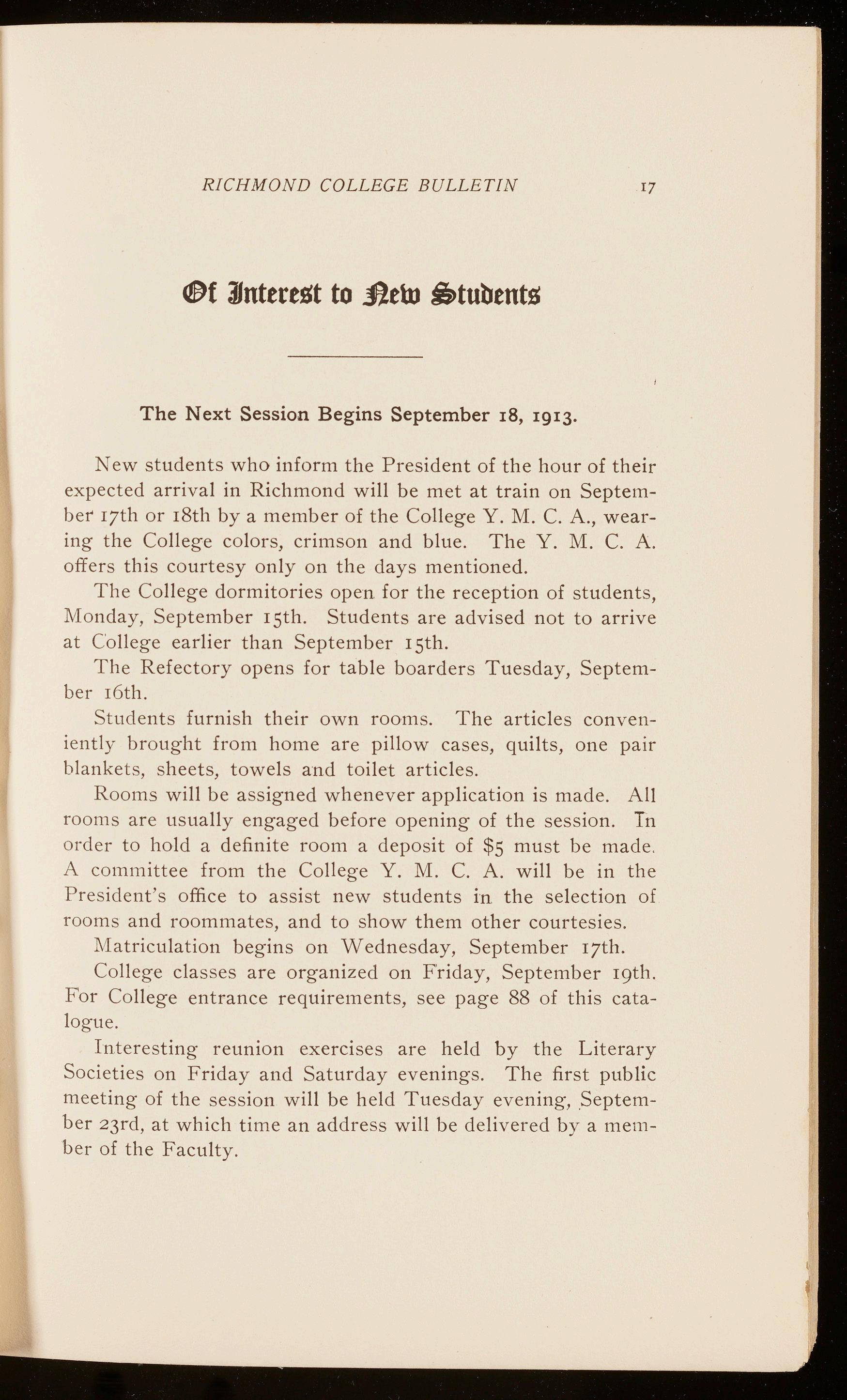
The Next Session Begins September 18, 1913.
New st ud ents who inform the President of the h our of their expected arrival in Richmond will be met at train on September' 17th or 18th by a member of the Co ll ege Y. M. C. A ., wearing the College colors, crimson and blue. The Y. M. C. A. offers this courtesy on ly on the days mentioned.
The Co ll ege dormitories open for the reception of students, Monday, September 15th . Students are advised not to arrive at College ear li er than September 15th.
The Refectory opens for table boarders Tuesday, September 16th.
Students furnish their own rooms. The articles conveniently brought from home are pillow cases, quilts, one pair blankets, sheets, towels and toilet articles.
Rooms will be assigned whenever application is made. All rooms are usually engaged before opening of the session. In o rder to hold a definite room a deposit of $5 must be made . A committee from the College Y. M. C. A. will be in the President ' s office to assist new students in the se lection of rooms and roommates, and to s h ow them other courtesies.
Matriculation begins on Wednesday, September 17th.
Co ll ege classes are organized on Friday, September 19th. For Co lle ge entrance requirements, see page 88 of this catalog·ue.
Interesting reunion exercises are held by the Literary Societies on Friday and Saturday evenings. The first public meeting of the session wi ll be held Tuesday evening·, September 23rd, at which time an address will be delivered by a member of the Faculty.

RICHMOND COLLEGE BULLETIN
ADAMS, SAMUEL LEE, JR ..................... Cluster Springs, Va. ANGELL, CHARLES ROY ........... . ............. Clifton Forge, Va. BARNES, MARY FLORENCE ......................... Diascond, Va. BLUME, GEORGE WASHINGTON JONES ............ Richmond, Va. BOLLING, THOMAS WINSTON .................... Richmond, Va. COLEMAN, JAMES JOHNSTON ..... . ... .. . . .......... Amherst, Va. COX, ELKANAH TURNER .... .......... Lone Oak, Va. CROWELL, EARL .... Manchester, N. Y. DIETZ, OWEN OSBURN .................... ........ Rupert, W. Va. DONOHUE, JAMES HENRY, JR Richmond, Va. EDMONDS, JOHN WILLIS, JR ........... Accomac, Va. ELLIOTT, JOHN WESLEY, JR . South Boston, Va. ELLIS, PIERCE SARTORIUS Pocomoke City, Md. ELLYSON, STILES HUOT ...................... , Richmond, Va. GEORGE, JOHN ALONZA ..... ................ Washington, N. C. HAISLIP, BASIL VIVIAN ..... .... .. . .............. Church view, Va. HART, ALAN LINDSAY ...... Richmond, Va HART, FRANCIS BACON . ... .. . ..... . ............ . ... Richmond, Va. HESTER, MRS. MARGARET WILLIAMS ........... Richmond, Va. JINKINS, MARY EMILY ...... . ......... . .............. Ashland, Va . JOHNSON, JOHN WALTER CARLYLE .. ,.......... Louisa, Va. KIMBALL, JAMES HENRY ........................... Richmond, Va. KING, JOSEPH LEONARD, JR Wind sor, Va LANCASTER, EDMONIA CARRINGTON ............ Richmond, Va. LEE, LENOIR VALENTINE ......................... Richmond, Va. MEADE, MARSHALL THOMAS ...................... Clintwood, Va MON SELL, MARION BREWSTER ........ . .......... Richmond, Va . MOORE, JESSE HARTWELL. Mt. Lebanon, La. PORTER, LEWIS GORDON ................... .. .. . .. R ichmond, Va .
PRIMM, ELLIS CARL. ................... ............ Blackstone, Va. RILEY, FRANK CARSON Elk Ridge, Md. SANDS, MARIE STUART ............................ Richmond, Va .
SAUNDERS, WILLIAM FRANCIS ................... Poindexter, Va. SEAY, HAYNIE HATCHETT, JR Blackstone, Va.
SNEAD, JOSEPH PAYNE Fork Union, Va. SYDNOR, MARY VIRGINIA .......................... Richmond, Va .
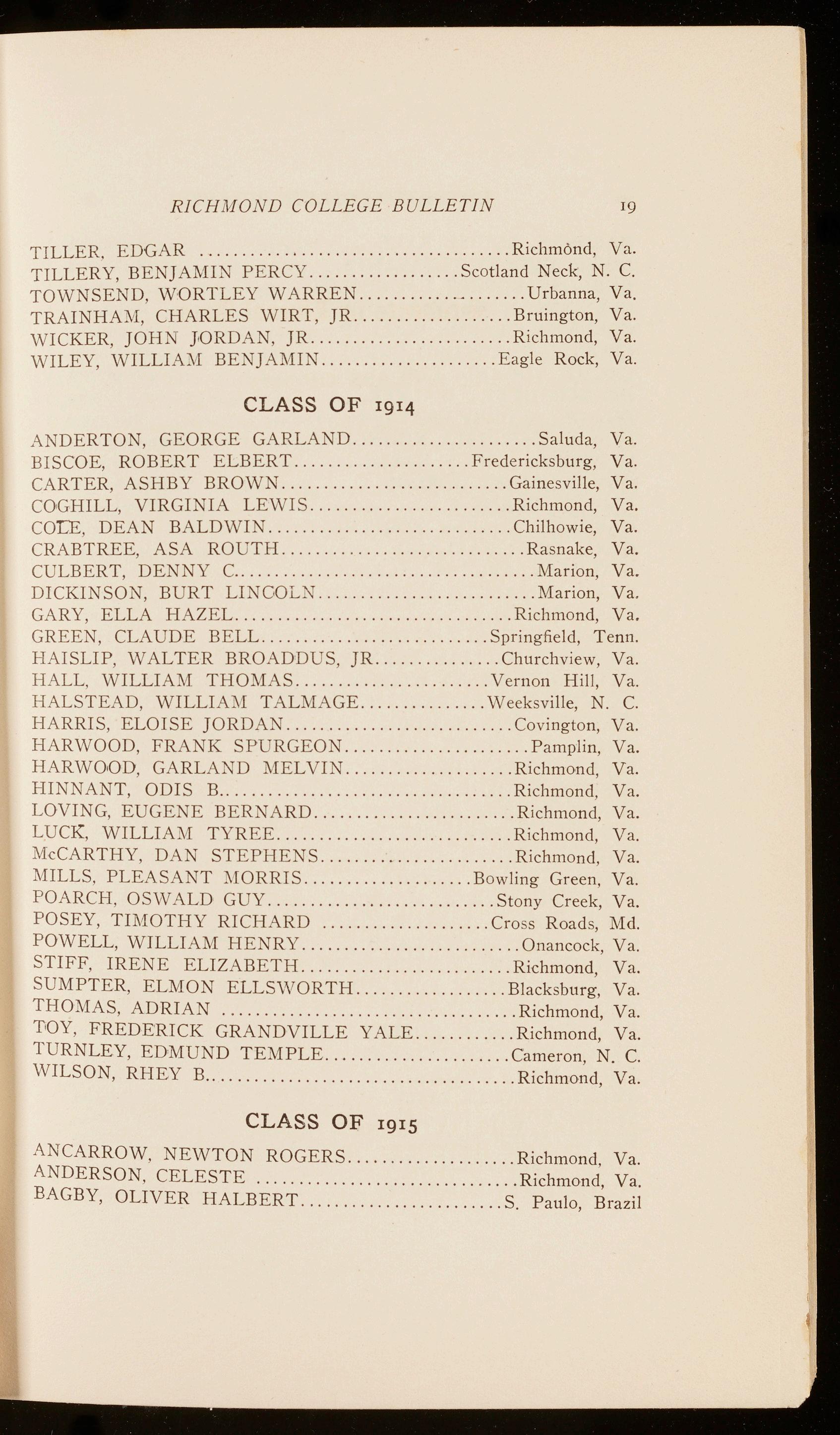
RICHMOND COLLEGE BULLETIN 19
TILLER. EDGAR .. Ric hm ond , Va. TILLERY, BENJAMIN PERCY .. . ............... Scotl an d Neck, N. C. TOWNSEND, WORTLEY WARREN U rb ann a, V a. TRAINHA~I, CHARLES WIRT, JR ......... Bru ingto n, Va. WICKER, JOHN JORDAN, JR ................ .. Ric h mond , Va. WILEY, WILLIAM BENJAMIN .... . .......... . .. ... Eagle Rock, Va.
ANDERTON, GEORGE GARLAND Saluda, Va. BISCOE, ROBERT ELBERT .............. Fredericksb ur g, Va. CARTER, ASHBY BROWN ........... . . . ... .. ........ Gainesvi lle, Va. COGH ILL, VIRGINIA LEWIS .... Richmond, Va. COI:E, DEAN BALDWIN .................. Ch ilhowie, V a. CRABTREE, ASA ROUTH ........ . ... ... . ... .......... Rasnake, Va. CULBERT, DENNY C. .................... . .............. Ma r ion, Va. DICKINSON, BURT LINCOLN ............ ............ Marion, Va. GARY, ELLA HAZEL. .... Richmond, Va. GREEN, CLAUDE BELL. .......... . ............... Springfield, Te n n. HAISLIP, WALTER BROADDUS, JR .... Churchview, Va. HA LL , WILLIAM THOMAS .. . Vernon Hill, Va HA LSTEAD, WILLIAM TALMAGE Weeksv ille, N. C. HARRIS, ELOISE JORDAN .. .. Covington, Va. HARWOOD, FRANK SPURGEON . Pamplin, Va. HARWOOD, GARLAND MELVIN ....... Richmond, Va. HINNANT, ODIS B ..... . ... . .. . ..... . .. . ............. Richmo n d, Va. LOVING, EUGENE BERNARD ................. . ...... Richmo n d, Va. LUCK, WILLIAM TYREE Richmo nd , Va. McCARTHY, DAN STEPHENS .. . ................. . .. Ric h mond, Va. MILLS, PLEASANT 110RRIS .................... Bowli ng Green, Va. POARCH, OSWALD GUY Stony Creek, Va. POSEY, TIMOTHY RICHARD . ............. . ..... Cross Roads, M d. POWELL, WILLIAM HENRY .... Ona ncock, Va. STIFF, IRENE ELIZABETH ... R ichmond, Va. SUMPTER, ELMON ELLSWORTH . . .......... . ..... Blacks bu rg, Va. THOYrAS, ADRIAN ................. . .... . ............ Ric hm ond , Va. TOY, FREDERICK GRANDVILLE YALE ... ........ Ric hm on d, Va. TURNLEY, EDMUND TEMPLE .. . .............. . .... Camero n, N. C. WILSON, RHEY B... R ichm on d, Va
ANCARROW, NEWTON ROGERS ....... Ri chm ond, V a ANDERSON, CELESTE .................... R ichm ond, Va. BAGBY, OLIVER HALBERT ........................ S. Pa ulo, B raz il
20
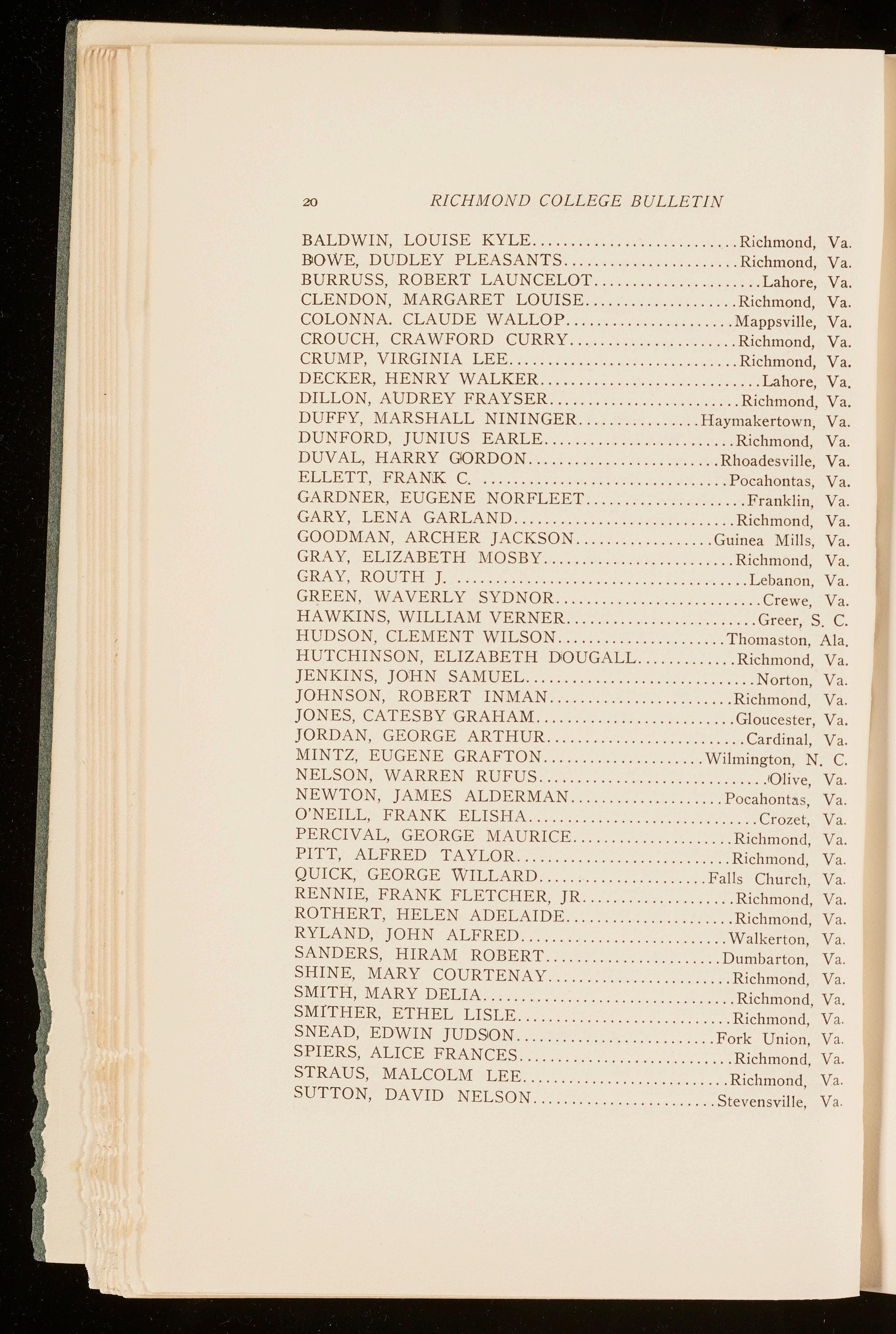
RICHMOND
BALDWIN, LOUISE KYLE ........................... Richmond, Va. BOWE, DUDLEY PLEASANTS ....................... Richmond, Va. BURRUSS, ROBERT LAUNCELOT ..... .............. Lahore, Va. CLENDON, MARGARET LOUISE ...... ... Richmond, Va. COLONNA. CLAUDE WALLOP ...................... Mappsville, Va. CROUCH, CRAWFORD CURRY ...................... Richmond, Va. CRUMP, VIRGINIA LEE .............................. Richmond, Va. DECKER, HENRY WALKER ............................. Lahore, Va. DILLON, AUDREY FRAYSER ......................... Richmond, Va. DUFFY, MARSHALL NININGER ................ Haymakertown, Va. DUNFORD, JUNIUS EARLE ........... Richmond, Va. DUVAL, HARRY GORDON ......................... Rhoadesville, Va. ELLETT, FRANK C. .. ........ . .. . . Pocahontas, Va. GARDNER, EUGENE NORFLEET ..................... Franklin, Va. GARY, LENA GARLAND ............................. Richmond, Va. GOODMAN, ARCHER JACKSON .................. Guinea Mills, Va. GRAY, ELIZABETH MOSBY .... . . ....... . . Richmond, Va. GRAY, ROUTH J ............................ . . Lebanon, Va. GREEN, WAVERLY SYDNOR ........................... Crewe, Va. HAWKINS, WILLIAM VERNER ................ Greer, S. C. HUDSON, CLEMENT WILSON ................... Thomaston, Ala. HUTCHINSON, ELIZABETH DOUGALL ............. Richmo nd, Va. JENKINS, JOHN SAMUEL ... .. ... ....... Norton, Va. JOHNSON , ROBERT INMAN ........................ Richmond , Va. JONES, CATESBY GRAHAM .......................... Gloucester, Va. JORDAN, GEORGE ARTHUR .. ............. . . Cardinal, Va. MINTZ, EUGENE GRAFTON ..................... Wilmington, N. C. NELSON, WARREN RUFUS ..... . ............ ........ Olive, Va.
NEWTON, JAMES ALDERMAN .................... Pocahont:i.s, Va. O'NEILL, FRANK ELISHA ..... .. .......... Crozet, Va. PERCIVAL, GEORGE MAURICE .............. Richmond, Va. PITT, ALFRED TAYLOR . ............... .. . . . . . .. Richmond, Va. QUICK, GEORGE WILLARD ...................... Falls Church, Va. RENNIE, FRANK FLETCHER, JR .................... Richmond, Va. ROTHERT, HELEN ADELAIDE ..... .. .... Richmond, Va. RYLAND, JOHN ALFRED . ......... . . .... Walkerton, Va. SANDERS, HIRAM ROBERT ....... ....... Dumbarton, Va. SHINE, MARY COURTENAY ....... ............... Richmond, Va. SMITH, MARY DELIA ................................. Richmond , Va. SMITHER, ETHEL LISLE ............................ Richmond, Va. SNEAD, EDWIN JUDSON ... .. ................. .. . . Fork Union, Va.
SPIERS, ALICE FRANCES ....................... ... .. Richmond , Va. STRAUS, MALCOLM LEE ........................... Richmond , Va. SUTTON, DAVID NELSON ........................ Stevensville, Va.
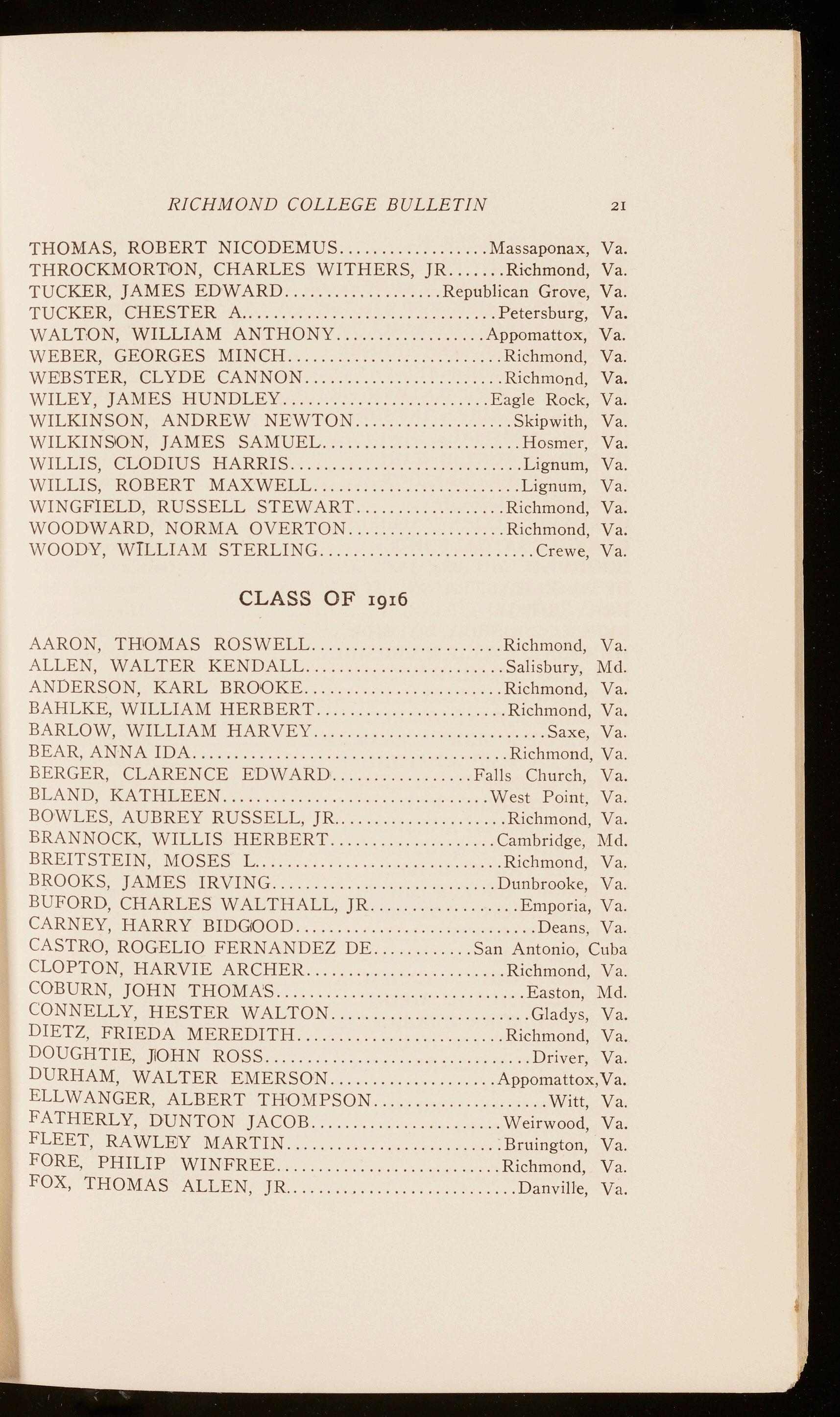
RICHMOND COLLEGE BULLETIN 21
THOMAS, ROBERT NICODEMUS .................. Massaponax, Va . THROCKMORTON, CHARLES WITHERS, JR ....... Richmond, Va. TUCKER, JAMES EDWARD .... Republican Grove, Va. TUC KER, CHESTER A. Petersburg, Va. WALTON, WILLIAM ANTHONY .................. Appomattox, Va. WEBER, GEORGES MINCH .......................... Richmond , Va. WEBSTER, CLYDE CANNON ........................ Richmond, Va. WILEY, JAMES HUNDLEY Eagle Rock, Va. WILKINSON, ANDREW NEWTON . Skipwith, Va WILKINSON, JAMES SAMUEL. ................... .... Hosmer, Va. WILLIS, CLODIUS HARRIS ............................ Lignum, Va. WILLIS, ROBERT MAXWELL. Lignum, Va. WINGFIELD, RUSSELL STEWART .................. Richmond, Va WOODWARD, NORMA OVERTON .. . ........ .. ... ... Richmond, Va . WOODY, WILLIAM STERLING Crewe, Va.
AARON, THOMAS ROSWELL Richmond, Va. ALLEN, WALTER KENDALL. . .. . ... . ......... . ..... Salisbury, Md. ANDERSON, KARL BROOKE . ............ .... . . ..... Richmond, Va. BAHLKE, WILLIAM HERBERT Richmond, Va. BARLOW, WILLIAM HARVEY ............................ Saxe, Va. BEAR, ANNA IDA ...................................... Richmond, Va. BERGER, CLARENCE EDWARD ................. Falls Church, Va. BLAND, KATHLEEN ................................ We st Point , Va. BOWLES, AUBREY RUSSELL, JR. ... .. ........... .... Richmond , Va. BRANNOCK, WILLIS HERBERT .................... Cambridge, Mel. BREITSTEIN, MOSES L. Richmond , Va. BROOKS, JAMES IRVING Dunbrooke, Va. BUFORD, CHARLES WALTHALL, JR Emporia, Va. CARNEY, HARRY BIDGOOD Deans , Va. CASTRO, ROGELIO FERNANDEZ DE ............ San Antonio, Cuba CLOPTON, HARVIE ARCHER ........................ Richmond, Va . COBURN, JOHN THOMA'S Easton, Md. CONNELLY, HESTER WALTON Gladys, Va. DIETZ, FRIEDA MEREDITH ..... .. .. .......... ...... Richmond, Va . DOUGHTIE, ]10HN ROSS ............. Driver, Va. DURHAM, WALTER EMERSON .................... Appomattox,Va. ELLWANGER, ALBERT THOYIPSON ..................... Witt, Va. FATHERLY, DUNTON JACOB Weirwood, Va. FLEET, RA WLE!Y MARTIN Bruington, Va. FORE, PHILIP WINFREE ........................... Richmond, Va . FOX, THOMAS ALLEN, JR. Danville, Va

GALESKI, WALTER S ......................... ..... Richmond, Va.
GARBER, JOHN HOWARD .. . .. ... ... Waynesboro, Va.
GARNER, CLARENCE LEON .... ..... ................ Wilson, N. C. GAY, CONSTANCE MARY ................... .... Richmond, Va.
GILMAN, JOHN STEWART .......................... Richmond, Va.
GOEPFARTH, LAURA LOUISE ...................... Richmond, Va. GWALTNEY, THOMAS OLIVER ..................... Wakefield, Va.
HAMILTON, WILLIAM WIST AR, JR .... .......... Lynchburg, Va. HARDING, LILLIAN BEATRICE ..................... Richmond, Va
HARRIS, CAMPBELL. ............. .......... Richmond, Va. HARRIS, ALBERT HARDIN ............................... Sabot, Va
HARRIS, CORN.ELIA VAN B......................... Richmond, Va
HAWKINS, BLANCHE T ... ... ....................... Richmond, Va.
HOLLAND, SALLIE WILLS . ..... ......... Wilmington, Va .
HORTON, JAMES PORTER ... ..... ... ...... Ker shaw , S. C. HOVEY, ALVAH BREWER ............... Newton Center, Mass. HUTCHINSON, FRANCIS ALBURTUS ................ Manassas, Va. IRBY, EDWARD MONCURE ......................... Blackstone, Va
JACKSON, JOSEPH MARSHALL .......... ... Lahore, Va . JINKINS, EMMA TIMBERLAKE .............. ........ Ashland, Va . KIE, EDWARD SIDNEY ...... ....................... Cartersville, Va
KING, THOMAS JOEL. ....................... ....... Windsor, Va
KOONTZ, ERNEST WILLIAM ....... .................... Luray, Va. LANCASTER, GEORGE GRAHAM ...... ...... Richmond, Va . LESLIE, JOSEPH ALEX 1ANDER ....................... Tazewell, Va.
LEWIS, KENNETH B ... . ....... ... .,.......... .. ...... Parksley, Va.
LEWIS, WARREN PATE ........... ... ................ Parksley, Va. LOKEY , GEORGE WILLIAM ....... . ..... ...... Irvington, Va.
LONG, EDWIN VARNER ..................... . Woodville, Va. LUCK, ALVAH CARLTON ..... .......... Bedford City, Va.
MARCUSE, ALICE ROSALIE ......................... Richmond, Va.
MARTIN, MARIE LOUISE ....... . ......... Toano, Va.
MARTIN, REUBEN ]. ....... ........... .............. Richmond, Va.
MASSIE, JOHN WALKER ........... .. ... ...... Bryant, Va.
MERCER, ROGER WALKER ......................... Richmond, Va.
METCALF, VICTOR SHARP ......................... Richmond, Va.
MILLS, MORGAN REAGAN, JR. ..................... Richmond, Va
MONSELL, HELEN ALBEE ........................... Richmond, Va.
MONTEIRO, MARGARET KEAN ...................... Richmond, Va.
MONTGOMERY, CHARLES MESMER ............... Richmond, Va.
MOSS, THOMAS OVERTON, JR .......... ..... Beaver Dam , Va.
McDANEL, RALPH C . ............ .... Alderson, W. Va.
McKEE, JOHN LLOYD ...................... ... Richmond , Va
OWEN, SANDY CLAY ............. . .... Republican Grove, Va.

RICHMOND COLLEGE BULLETIN 23
PEAKE, EDWARD EVERETT ....................... Churchland, Va. PERDUE, PAUL G .... ..... .. . . ..... .. Richmond, Va. PERKINS, CHARLES SHELTON ..................... Richmond, Va. PITTS, LEWIS GEORGE ... ........ ...... ...... ... Smoots, Va. PORTER, MATTHEW BRANCH, JR ................... Richmond, Va. RICHARDSON, JOHN KIRK ...... ....... Crewe, Va. SAUNDERS, LEWIS LUNSFORD . .. ... . ..... Poindexter, Va. SAVEDGE, JAMES A ....... ............... . Littleton, Va.
SNEAD, E DLOE BRYAN ............ . . . .. ..... Richmond, Va. SPRATLEY, ELIZABETH PAGE . .................... Richmond, Va. STARKE, THOMAS JEFFERSON ..................... Richmond, Va. TAYLOR, GEORGE CABELL. ...... .. . ..... ..... ..... Hollins, Va. TAYLOR, LORIMER BLAND .......... . .. ... Harmony Village, Va. TAYLOR, HOWARD WINSTON .... .......... Hanover, Va. THORPE, HERBERT WILSON .................... . Dumbarton, Va. TREVVETT, JOHN ERNEST . .......... ....... . Glen Allen, Va. UNDE RWOOD, WILLIS BOYKIN Smithfield, Va. WALLERSTEIN, CLEMENCE MAY .......... . ........ Richmond, Va. WARINNER, HENRY GRANT ................... . Richmond, Va. WILLINGHAM, HARRIS E .............. ... Richmond, Va. WILLIS, EDWARD TURPIN ............................ Lignum, Va. WILSON, WILLIAM ROBERT ......................... Keysville, Va . WRIG HT , ELBERT JOSEPH ......................... Lynchburg, Va. WRIGHT, JAMES RAYMOND ........................ Richmond, Va. WYATT, HENRY OSWELL. .......................... Montague, Va. YANCEY , LOUIS CAMPBELL. ........... .... .. Forest Depot, Va.
BARNETT , EDWARD SCOTT .... . .. ..... Roxboro , N . C. BASS, SAMUEL ALFRED ..................... .. ... ... .... Paces, Va CADWELL, JAMES L ................................. Richmond, Va. CALE, WILLIAM FRANKLIN ........ . Rio Vista, Va. COGHILL, HARVIE DEJARNETTE . ... Richmond, Va. COMBS, MORGAN LAFAYETTE . ..... .. . . ...... Council, Va. 1COVINGTON, WILLIAM BYRON ...... New Church, Va. COX, BENJAMIN FRANKLIN ....... ......... ... Lone Oak, Va DALTON, GROVER CLEVELAND ...... .. ..... ....... . Gilkey, N. C.
DEWLING, WALTER FRANKLIN .................... Baltimore, Md. DIXON, JAMES WILLIAM .......... ....... Hewlett, Va.
24
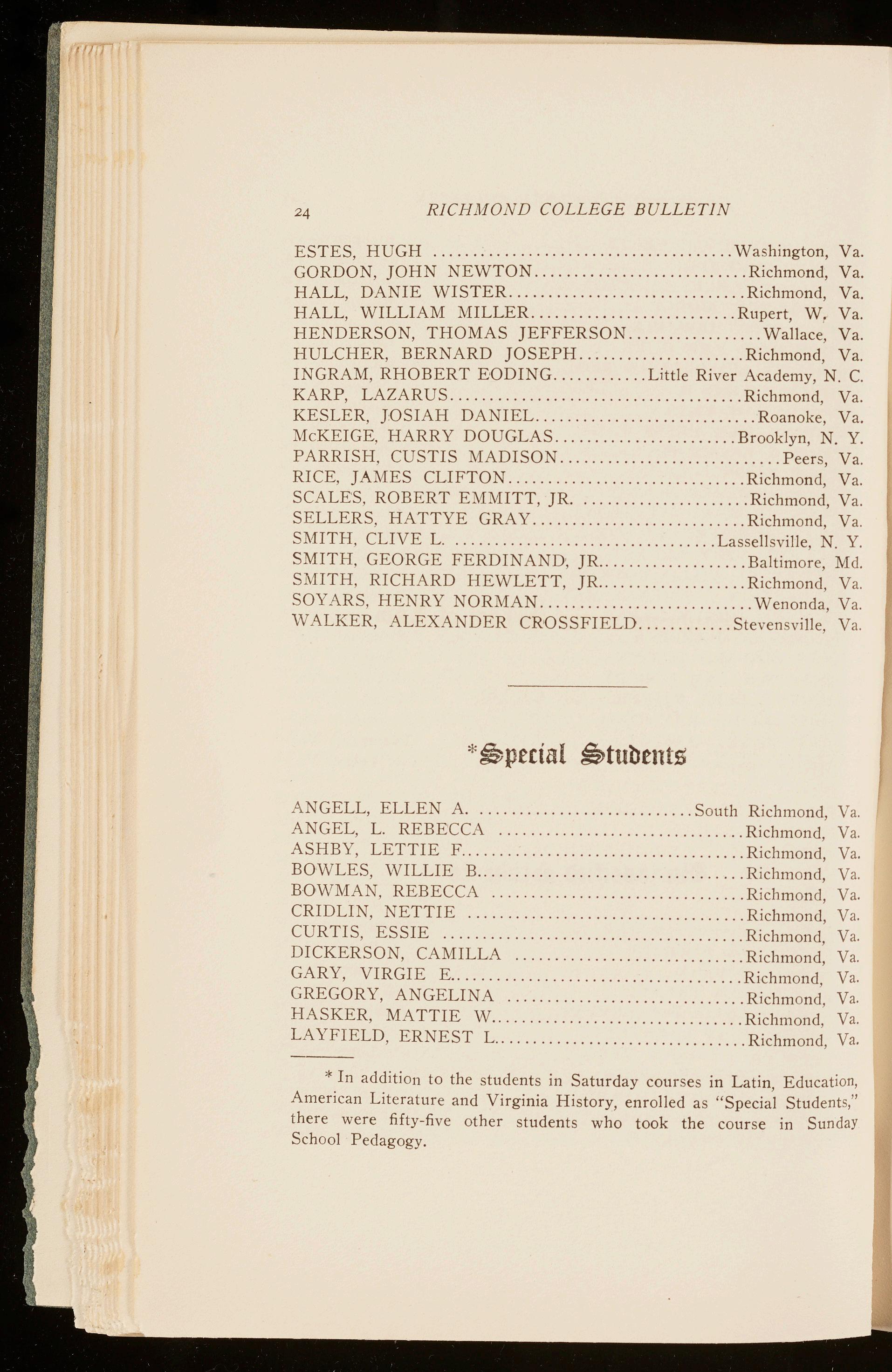
RICHMOND COLLEGE BULLETIN
ESTES, HUGH ... ................ .... Washington, Va. GORDON, JOHN NEWTON . ..... Richmond, Va. HALL, DANIE WISTER .............................. Richmond, Va. HALL, WILLIAM MILLER .......................... Rupert, W. Va. HENDERSON, THOMAS JEFFERSON ................. Wallace, Va . HULCHER, BERNARD JOSEPH ..................... Richmond, Va. INGRAM, RHOBERT EODING ............ Little River Academy, N. C. KARP, LAZARUS ............. .. . ... Richmond, Va. KESLER, JOSIAH DANIEL. ........................... Roanoke, Va. McKEIGE, HARRY DOUGLAS ....................... Brooklyn, N. Y. PARRISH, CUSTIS MADISON ............................ Peers, Va. RICE, JAMES CLIFTON .... ..... ... ......... Richmond , Va. SCALES, ROBERT E:YCV[ITT, JR. .......... .. Richmond, Va. SELLERS, HATTYE GRAY ........................... Richmond, Va. SMITH, CLIVE L. .......................... Lassellsville, N. Y. SMITH, GEORGE FERDINAND, JR. .................. Baltimore, Md. SMITH, RICHARD HEWLETT, JR. ................. . Richmond, Va. SOYARS, HENRY NORMAN ........................... Wenonda, Va. WALKER, ALEXANDER CROSSFIELD Stevensville, Va.
ANGELL, ELLEN A ............................ South Richmond, Va. ANGEL, L. REBECCA ............... .......... Richmond, Va. ASHBY, LETTIE F . . .... . ..................... Richmond, Va. BOWLES, WILLIE B.................................. Richmond, Va. BOWMAN. REBECCA . .. . . ......... ................. Richmond, Va. CRIDLIN, NETTIE ............................. Richmond, Va. CURTIS, ESSIE ...................................... Richmond, Va. DICKERSON, CAMILLA ...... ... ....... .. Richmond, Va. GARY, VIRGIE E. .. ...................... Richmond, Va. GREGORY, ANGELINA .............................. Richmond, Va. HASKER, MATTIE W ................................ Richmond, Va. LAYFIELD, ERNEST L. ............................... Richmond, Va.
* In addition to the students in Saturday courses in Latin, Education, American Literature and Virginia History, enrolled as "Special Students," there were fifty-five other students who took the course in Sunday School Pedagogy.
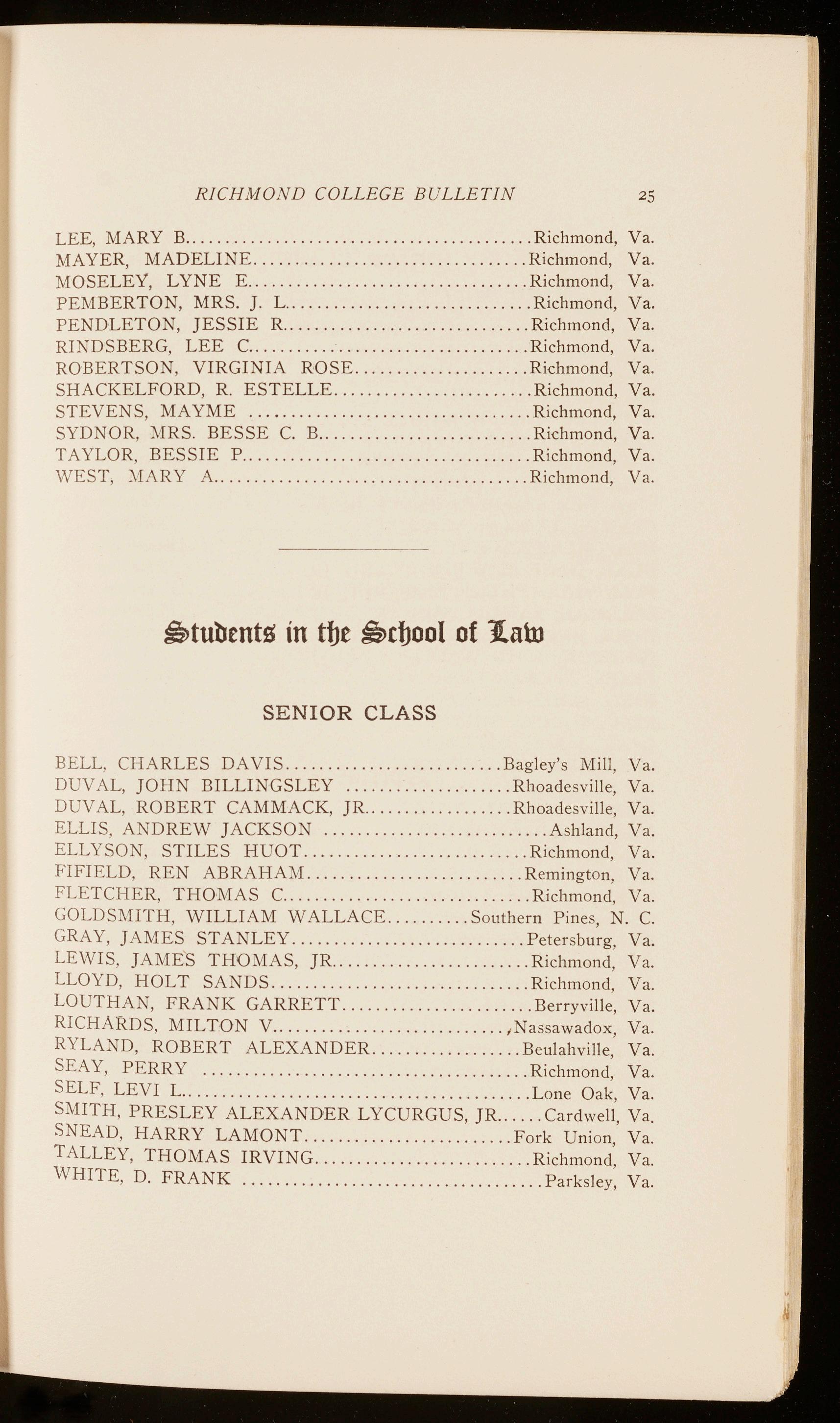
LEE, MARY B .. ... Richmond, Va.
MAYER, MADELINE ................................. Richmond, Va.
MOSELEY, LYNE E .................................. Richmond, Va.
PEMBERTON, MRS. J. L.. Richmond, Va.
PENDLETON, JESSIE R. ...... . Richmond, Va.
RINDSBERG, LEE C. ................................. Richmond, Va.
ROBERTSON, VIRGINIA ROSE Richmond, Va.
SHACKELFORD, R. ESTELLE ........................ Richmond, Va.
STEVENS, MAYME .................................. Richmond, Va
SYDNOR, MRS. BESSE C. B Richmond, Va
TAYLOR, BESSIE P .... Richmond , Va. WEST, :-'!ARY A ........... Richmond, Va.
SENIOR CLASS
BELL, CHARLES DAVIS .......................... Bagley's Mill, Va.
DUVAL, JOHN BILLINGSLEY .................... Rhoadesville, Va.
DUVAL, ROBERT CAMMACK, JR. Rhoadesville, Va.
ELLIS, ANDREW JACKSON Ashland, Va.
ELLYSON, STILES HUOT . ........ .............. Richmond, Va.
FIFIELD, REN ABRAHA:-I ................. Remington, Va.
FLE TCHER, THOMAS C. ............................. Richmond , Va.
GOLDS1HTH, WILLIAM WALLACE .......... Southern Pines, N. C.
GRAY, JAMES STANLEY .... Petersburg, Va.
LEWIS, JAMES THOMAS, JR. ....................... Richmond , Va.
LLOYD, HOLT SANDS . ....... .................... Richmond, Va.
LOUTHAN, FRANK GARRETT ....................... Berryville, Va.
RICHARDS, MILTON V ................... ... ..... . ;Nassawadox, Va.
RYLAND, ROBERT ALEXANDER .................. Beulahville, Va.
SEAY, PERRY Richmond, Va.
SELF, LEVI L. ......................................... Lone Oak, Va.
SMITH, PRESLEY ALEXANDER LYCURGUS, JR. ..... Cardwell, Va.
SNEAD, HARRY LAMONT ......................... Fork Union, Va.
TALLEY, THOMAS IRVING .................. Richmond, Va.
WHITE, D. FRANK ... . . Parksley, Va.
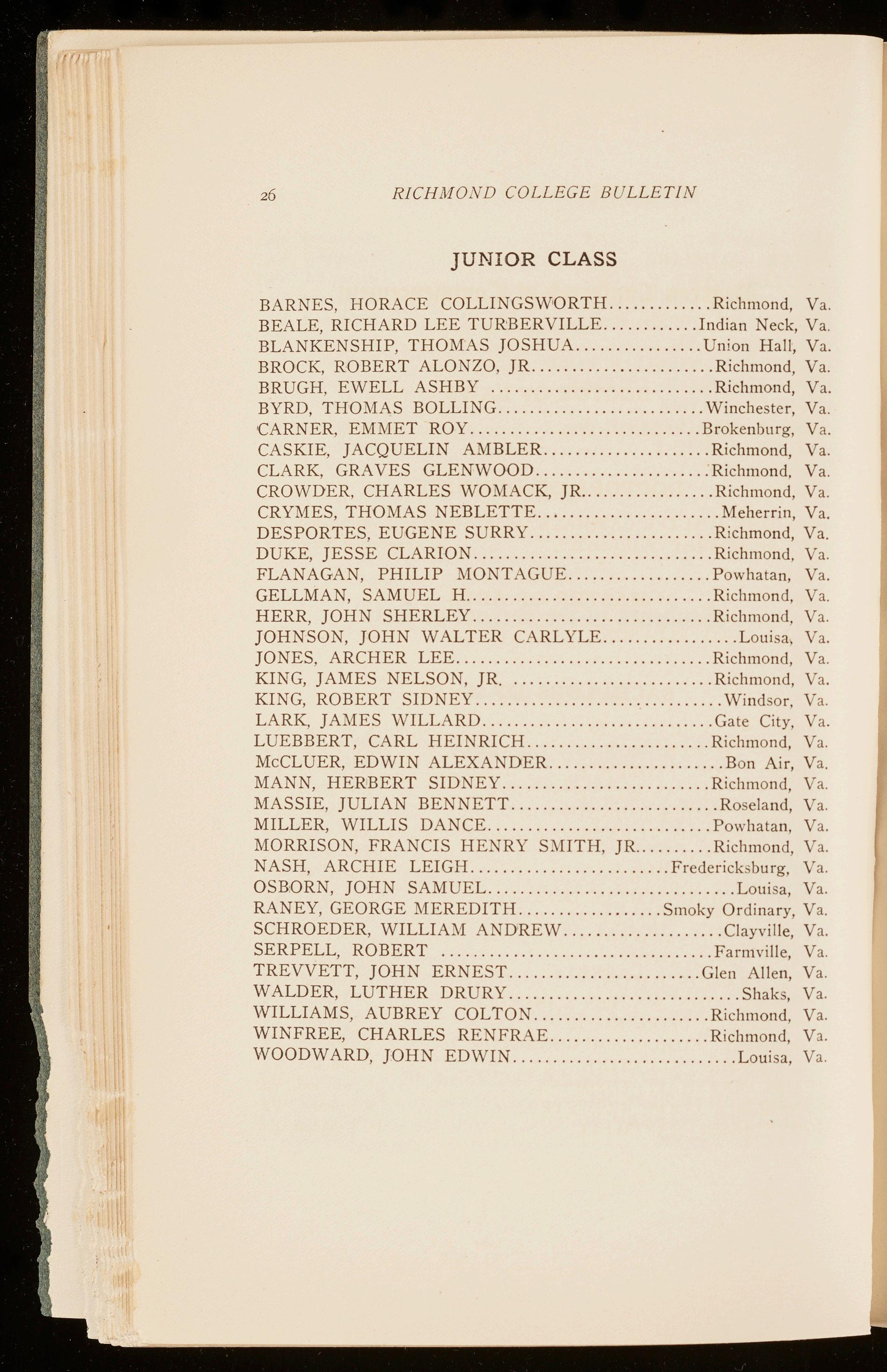
RICHMOND COLLEGE BULLETIN
BARNES , HORACE COLLINGSWORTH ............. Richmond, Va. BEALE, RICHARD LEE TURBERVILLE ............ Indian Neck, Va .
BLANKENSHIP, THOMAS JOSHUA Union Hall, Va.
BROCK, ROBERT ALONZO, JR Richmond, Va.
BRUGH, EWELL ASHBY ............................ Richmond, Va.
BYRD, THOMAS BOLLING .......................... Winchester, Va
CARNER, EMMET ROY Brokenburg, V a.
CASKIE, JACQUELIN AMBLER ..................... Richmond, Va. CLARK, GRAVES GLENWOOD ........... ... .... . ... Richmond, Va .
CROWDER, CHARLES WOMACK, JR .... Richmond, Va. CRYMES, THOMAS NEBLETTE Meherrin, Va. DESPORTES, EUGENE SURRY ....................... Richmond, Va.
DUKE, JESSE CLARION .............................. Richmond, Va.
FLANAGAN, PHILIP MONTAGUE .................. Powhatan, Va.
GELLMAN, SAMUEL H ............................... Richmond, V a.
HERR, JOHN SHERLEY .............................. Richmond , Va
JOHNSON, JOHN WALTER CARLYLE Louisa , Va
JONES , ARCHER LEE ................................ Richmond, Va .
KING, JAMES NELSON, JR. Richmond, Va.
KING, ROBERT SIDNEY Wind so r, V a.
LARK, JAMES WILLARD Gate City, V a.
LUEBBERT, CARL HEINRICH .. ... ......... .... .. ... Richmond, Va .
McCLUER, EDWIN ALEXANDER . ..... .... .... . ....... Bon Air, V a.
MANN, HERBERT SIDNEY ........... .. ............. Richmond, V a.
MASSIE, JULIAN BENNETT .......................... Ro seland, Va.
MILLER, WILLIS DANCE Powhatan , V a MORRISON, FRANCIS HENRY S:.\HTH, JR. . ........ Richmond, Va .
NASH, ARCHIE LEIGH ......................... Frederick sburg, Va
OSBORN, JOHN SAMUEL. .............................. Loui sa, Va
RANEY, GEORGE MEREDITH .................. Smoky Ordinary, V a. SCHROEDER, WILLIAM ANDREW Clayville, V a.
SERPELL, ROBERT .................................. Farmville, Va
TREVVETT, JOHN ERNEST ........................ Glen Allen, Va. WALDER, LUTHER DRURY ....... Shaks, Va
Vv'JLLIAMS, AUBREY COLTON ...................... Richmond, Va
WINFREE, CHARLES RENFRAE ... .... ............. Richmond, V a. WOODWARD, JOHN EDWIN Louisa, Va
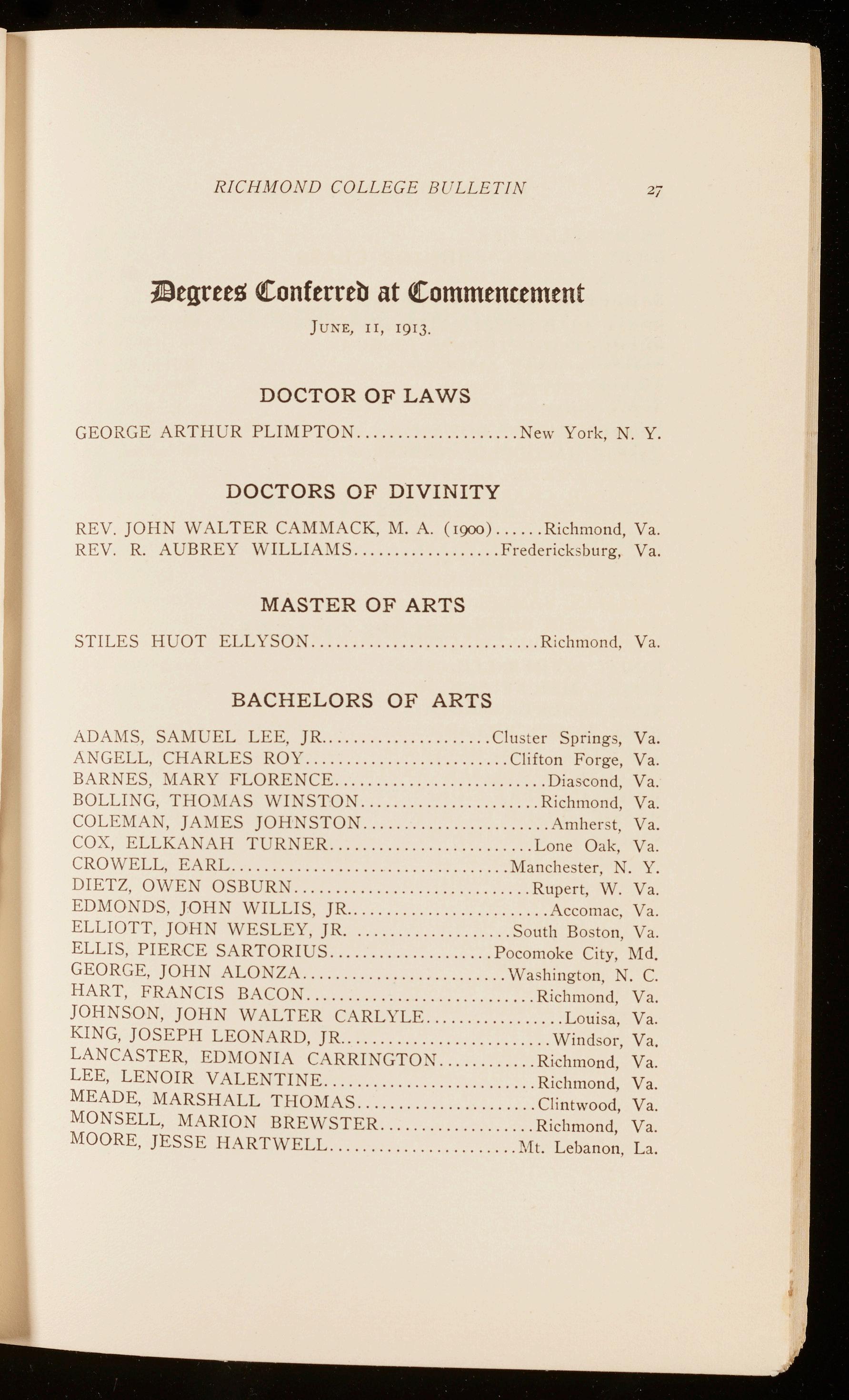
l)egrees <d:onftrrtbat <d:ommtnctmtn t
Jurrn, II, 1913.
GEORGE ARTHUR PLIMPTON .. ................ New York, N. Y.
REV. JOHN WALTER CAMMACK, M.A (1900) ...... Richmond, Va. REV. R. AUBREY WILLIA11S .............. . ... Frederick sburg, Va.
STILES HUOT ELLYSON ............................ Richm ond , Va.
ADAMS, SAMUEL LEE, JR. .................... Cluster Springs, Va. ANGELL, CHARLES ROY ......................... Clifton Forge, Va. BARNES, MARY FLORENCE .............. . ........... Diascond, Va. BOLLING, THOMAS WINSTON . .................. Richmond, Va. COLEMAN, JAMES JOHNSTO r ............ . .......... Amherst, Va. COX, ELLKANAH TURNER .............. ........ Lone Oak, Va. CROWE LL, EARL. ..... . .............. . ... . Manchester, N. Y. DIETZ, OWEN OSBURN ..... . .......... . .... . Rupert, W. Va. EDMONDS, JOHN WILLIS, JR. . ..... ... ......... Accomac, Va . ELLIOTT, JOHN WESLEY, JR. ......... . ..... South Bosto n, Va. ELLIS, PIERCE SARTORIUS .................... Pocomoke City, Md. GEORGE, JOHN ALONZA ......... ......... ..... Washington, N. C. HART, FRANCIS BACON .......................... . Richmond, Va. JOHNSON, JOHN WALTER CARLYLE ............ . Louisa, Va. KING, JOSEPH LEONARD, JR. ........................ Windsor, Va. LANCASTER, EDMONIA CARRINGTON ............ Richmond, Va. LEE, LENOIR VALENTINE ................... .. Richmond, Va. MEADE, MARSHALL THOMAS ............ ......... Clintwood, Va. MON SELL, MARION BREWSTER . ...... . Richmond, Va. MOORE, JESSE HARTWELL ....................... Mt. Lebanon , La.
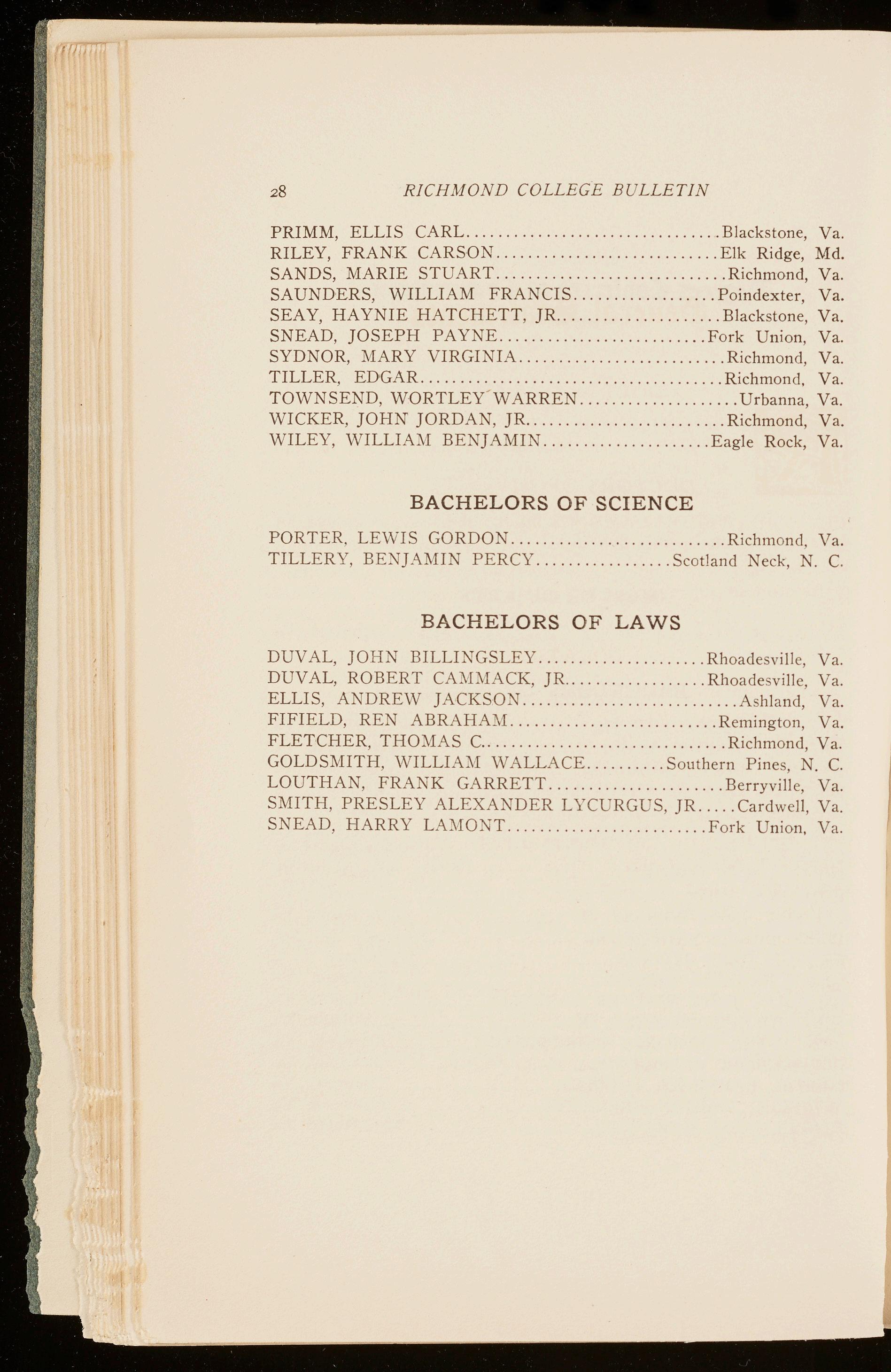
PRIMM , ELLIS CA RL. .. ............... . Blackstone, V a. R I L EY, FR ANK CARSON ....... . .. ... E lk R idge, M d. SANDS, MA R IE STUART ...... . R ichm ond, Va. SAUNDE R S, W I LLIAM F R ANCIS ......... . Poindexter, Va. SEAY, HAYNIE HATCHET T , J R. .... .. ....... . ... Blackstone, Va SNEAD, J OSEPH PAYNE ......... .. ....... . ....... Fo r k U n ion , V a SYDNOR, MARY VIRG I N I A .... . R ichmo nd, V a. TILLER, EDGAR ....... . .......... ..... R ich mond, Va. T OWNSEND, WORTLEY WARREN .................... Urbanna, Va. WICKER, JOHN JORDAN, JR. .................... Richmond, Va. WILEY, WILLIAM BENJAMIN . . ................... Eagle R ock, Va.
PORTER. LEWIS GORDON ........................... Richmond , Va TILLERY , BE:-JJAMIN PERCY . ......... Scotland Neck, N. C.
DUVAL, JOHN BILLINGSLEY Rhoadesville, Va. DUVAL, ROBERT CA:-D.IACK, JR. ....... ... ....... Rhoade sv ille, Va ELLIS, ANDREW JACKSON ........... .. .............. A shland, Va. FIFIELD, REN ABRAHA:M ..... ............ Remington, Va. FLETCHER, THOMAS C. ............ Richmond, Va. GOLDSMITH , WILLIAilI WALLACE ..... Southern Pines, N. C. LOUTHAN, FRANK GARRETT ..... . Berryville, Va. SMITH, PRESLEY ALEXANDER LYCURGUS, JR . .... Cardwell, Va. SNEAD, HARRY LA~1ONT ...... . ..... . . . .......... Fork Union. Va.
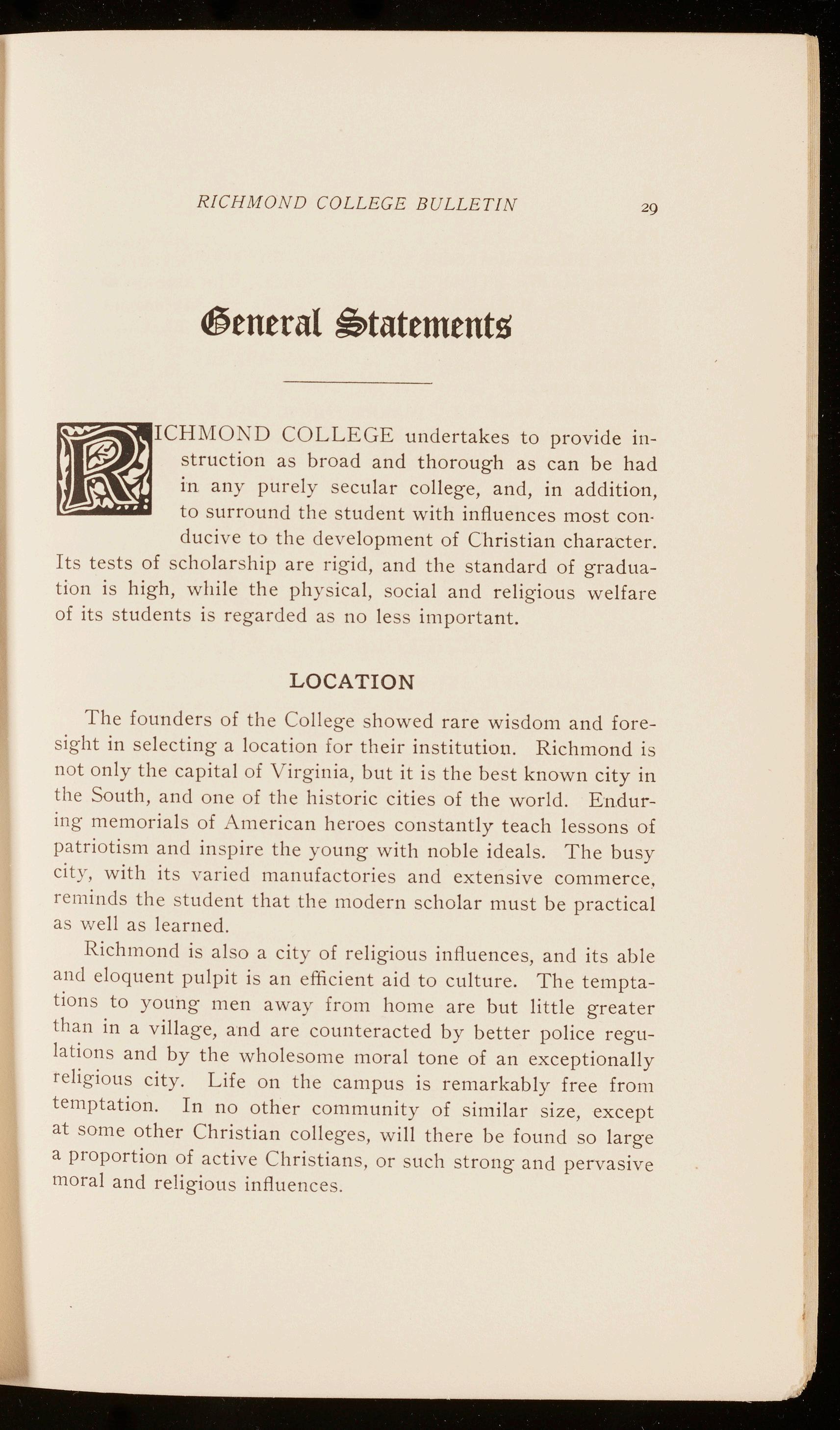
RICHMOND COLLEGE undertakes to provide instruction as broad and thorough as can be had in any purely secular college, and, in addition, to surround the student with influences most conducive to the development of Ch r istian character. Its tests of scholarship are rigid, and the standard of graduation is high, while the physical, social and religious welfare of its students is regarded as no less important.
The founders of the College showed rare wisdom and foresight in selecting a location for their institution. Richmond is not only the capital of Virginia, but it is the best known city in the South, and one of the historic cities of the world. Enduring memorials of American heroes constantly teach lessons of patriotism and inspire the young with noble ideals. The busy city, with its varied manufactories and extensive commerce, reminds the student that the modern scholar must be practical as well as learned.
Richmond is also a city of religious influences, and its able and eloquent pulpit is an efficient aid to culture. The temptations to young men away from home are but little greater than in a village, and are counteracted by better police regulations and by the wholesome moral tone of an exceptionally religious city. Life on the campus is remarkably free from temptation. In no other community of similar size, except at some other Christian colleges, will there be found so large a proportion of active Christians, or such strong and pervasive moral and religious influences.
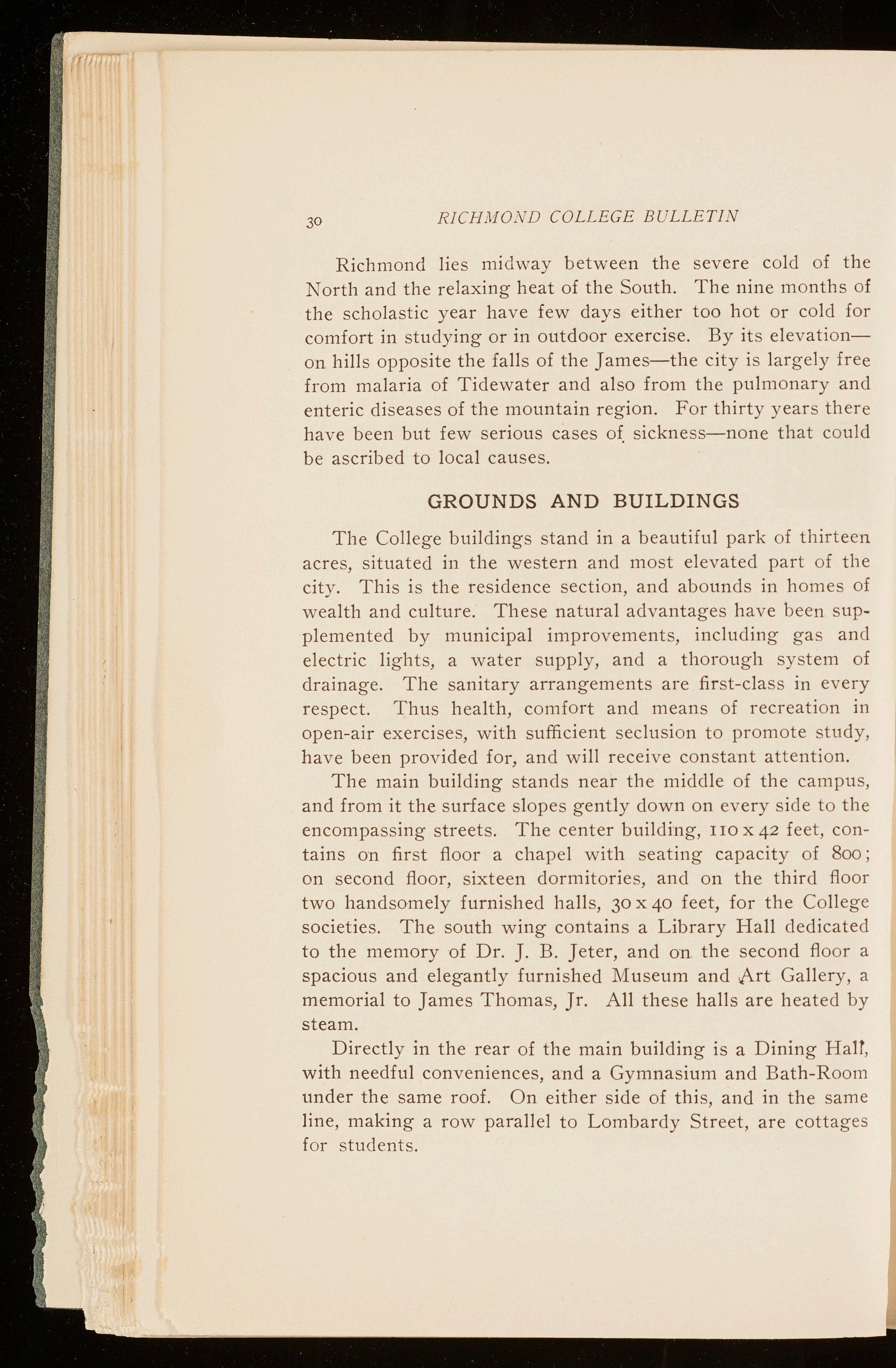
Richmond lies midway between the severe cold of the North and the relaxing heat of the South. The nine months of the scholastic year have few days either too hot or cold for comfort in studying or in outdoor exercise. By its elevationon hills opposite the falls of the Jam es-the city is largely free from malaria of Tidewater and also from the pulmonary and enteric diseases of the mountain region. For thirty years there have been but few serious cases of. sickness-none that could be ascribed to local causes.
The College buildings stand in a beautiful park of thirteen acres, situated in the western and most elevated part of the city. This is the residence section, and abounds in homes of wealth and culture. These natural advantages ha ve been supplemented by municipal improvements , including gas and electric lights, a water supply, and a thorough system of drainage. The sanitary arrangements are first-clas s in every respect. Thus health, comfort and means of recreation in open-air exercises, with sufficient seclusion to promote study, have been provided for, and will receive constant attention. The main building stands near the middle of the campus, and from it the surface slopes gently clown on every side to the encompassing streets. The center building, I IO x 42 feet, contains on fir st floor a chapel with seating capacity of 800; on second floor, sixteen dormitories, and on the third floor two handsomely furnished halls, 30 x 40 feet, for the College societies. The south wing contains a Library Hall dedicated to the memory of Dr. J. B. Jeter, and on. the second floor a spacious and elegantly furnished Museum and ,Art Gallery, a memorial to James Thomas, Jr. All these halls are heated by steam.
Directly in the rear of the main building is a Dining Halt, with needful conveniences, and a Gymnasium and Bath-Room under the same roof. On either side of this, and in the same line, making a row parallel to Lombardy Street, are cottages for students.
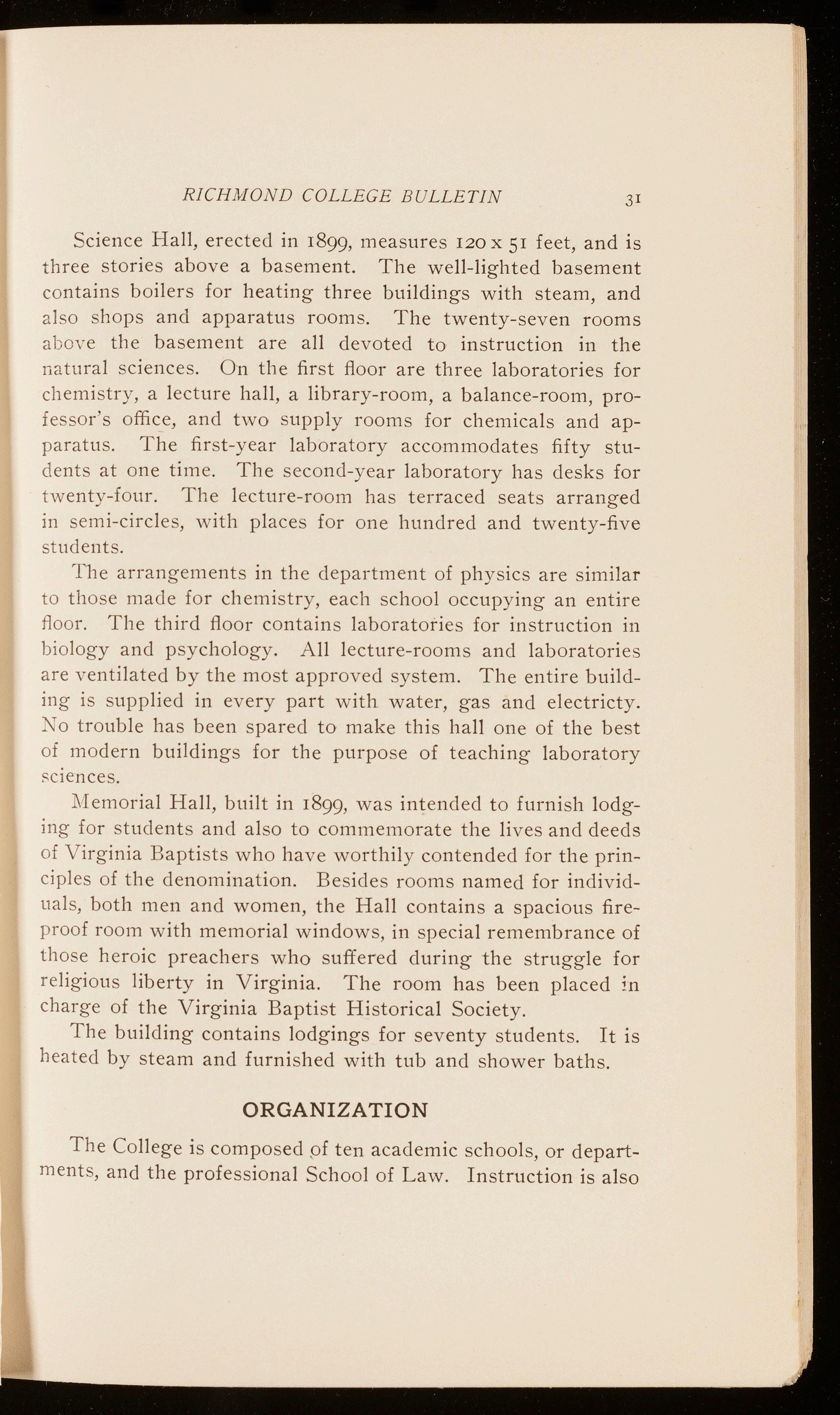
Science Hall, erected in 1899, measures 120 x 51 feet, and is three stories above a basement. The well-lighted basement co ntains boilers for heating three buildings with steam, and a lso shops and apparatus rooms. The twenty-seven rooms abov e the basement are all devoted to instruction in the natural sciences. On the first floor are three laboratories for chemistry, a lecture hall, a library-room, a balance-room, professor's office, and two supply rooms for chemicals and apparatus. The first-year laboratory accommodates fifty stud ents at one time. The second-year laboratory has desks for t wenty-four. The lecture-room has terraced seats arranged in semi-circles, with places for one hundred and twenty-five students.
]11e arrangements in the department of physics are similar to those made for chemistry, each school occupying an entire floo r. The third floor contains laboratories for instruction in b iology and psychology. All lecture-rooms and laboratories a re ventilated by the most approved system. The entire building is supplied in every part with water, gas and electricty. ~ o trouble has been spared to make this hall one of the best of modern buildings for the purpose of teaching laboratory sc iences.
l\Iemorial Hall, built in 1899, was intended to furnish lodgin g for students and also to commemorate the lives and deeds of Virginia Baptists who have worthily contended for the principles of the denomination.
Besides rooms named for individual s, both men and women, the Hall contains a spacious firep r oo f room with memorial windows, in special remembrance of t ho s e heroic preachers who suffered during the struggle for r eligious liberty in Virginia. The room has been placed in charge of the Virginia Baptist Historical Society.
The building contains lodgings for seventy students. It is h eated by steam and furnished with tub and shower baths.
The College is composed pf ten academic schools, or department s, and the professional School of Law. Instruction is also
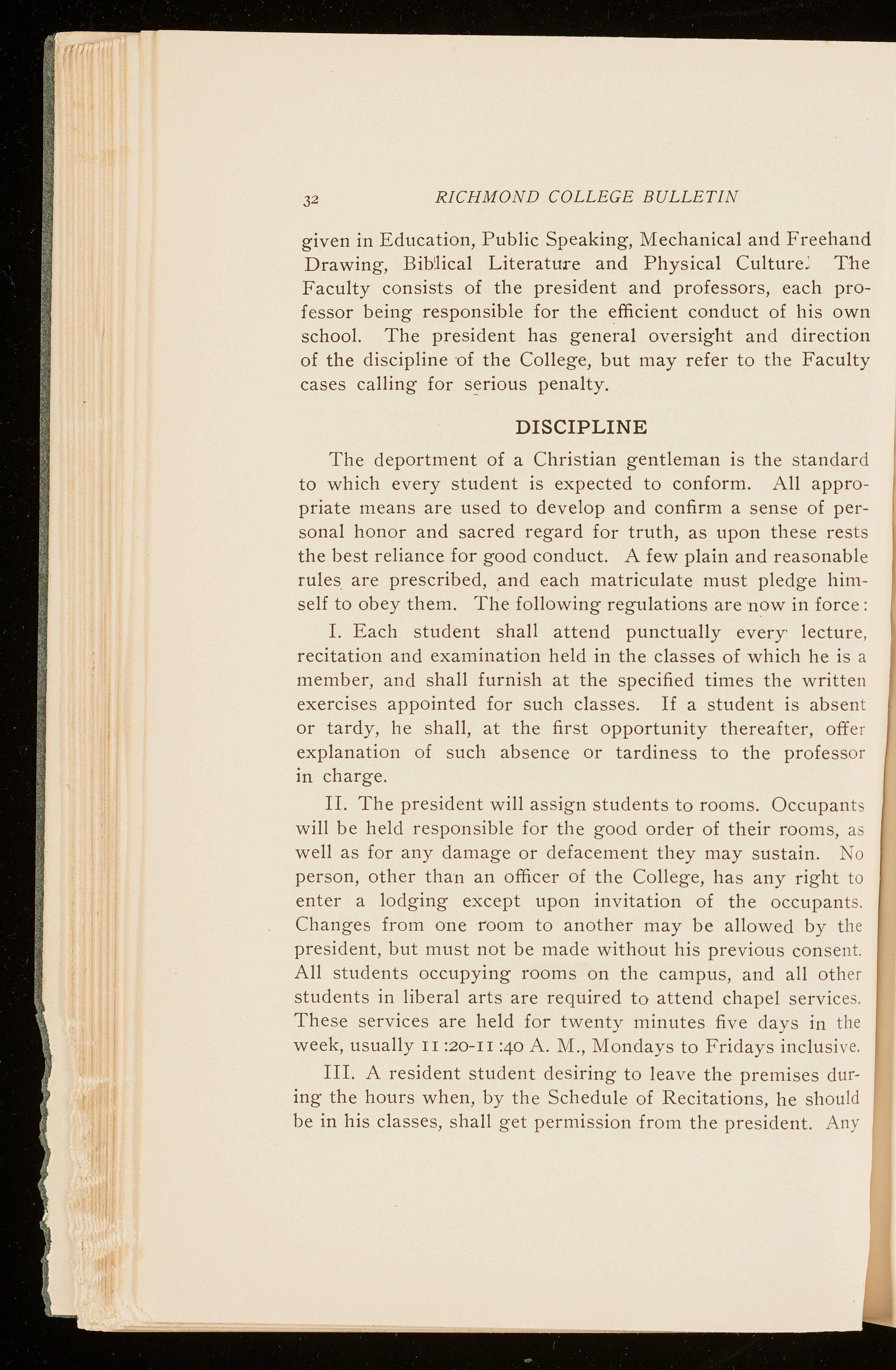
given in Education, Public Speaking, Mechanical and Freehand Drawing, Bib1ical Literature and Physical Culture; The Faculty consists of the president and professors, each professor being responsible for the efficient conduct of his own school. The president has general oversight and direction of the discipline -of the College, but may refer to the Faculty cases calling for s~rious penalty.
The deportment of a Christian gentleman is the standard to which every student is expected to conform. All appropriate means are used to develop and confirm a sense of personal honor and sacred regard for truth, as upon these rest s the best reliance for good conduct. A few plain and reasonable rules are prescribed, and each matriculate must pledge himself to obey them. The following regulations are now in force :
I. Each student shall attend punctually every lectur e, recitation and examination held in the classes of which he is a member, and shall furnish at the specified times the written exercises appointed for such classes. If a student is absen t or tardy, he shall, at the first opportunity thereafter, off er explanation of such absence or tardiness to the professo r in charge.
II. The president will assign students to rooms. Occupant s will be held responsible for the good order of their rooms, as well as for any damage or defacement they may sustain. No person, other than an officer of the College, has any rig·ht t o enter a lodging except upon invitation of the occupant s Changes from one room to another may be allowed by th e president, but must not be made without his previous consen t. All students occupying rooms on the campus, and all oth er students in liberal arts are required to attend chapel servic es. These services are held for twenty minutes five days in the week, usually I I :20-II :40 A. M., Mondays to Fridays inclusi ve.
III. A resident student desiring to leave the premises during the hours when, by the Schedule of Recitations, he should be in his classes, shall get permission from the president. An y
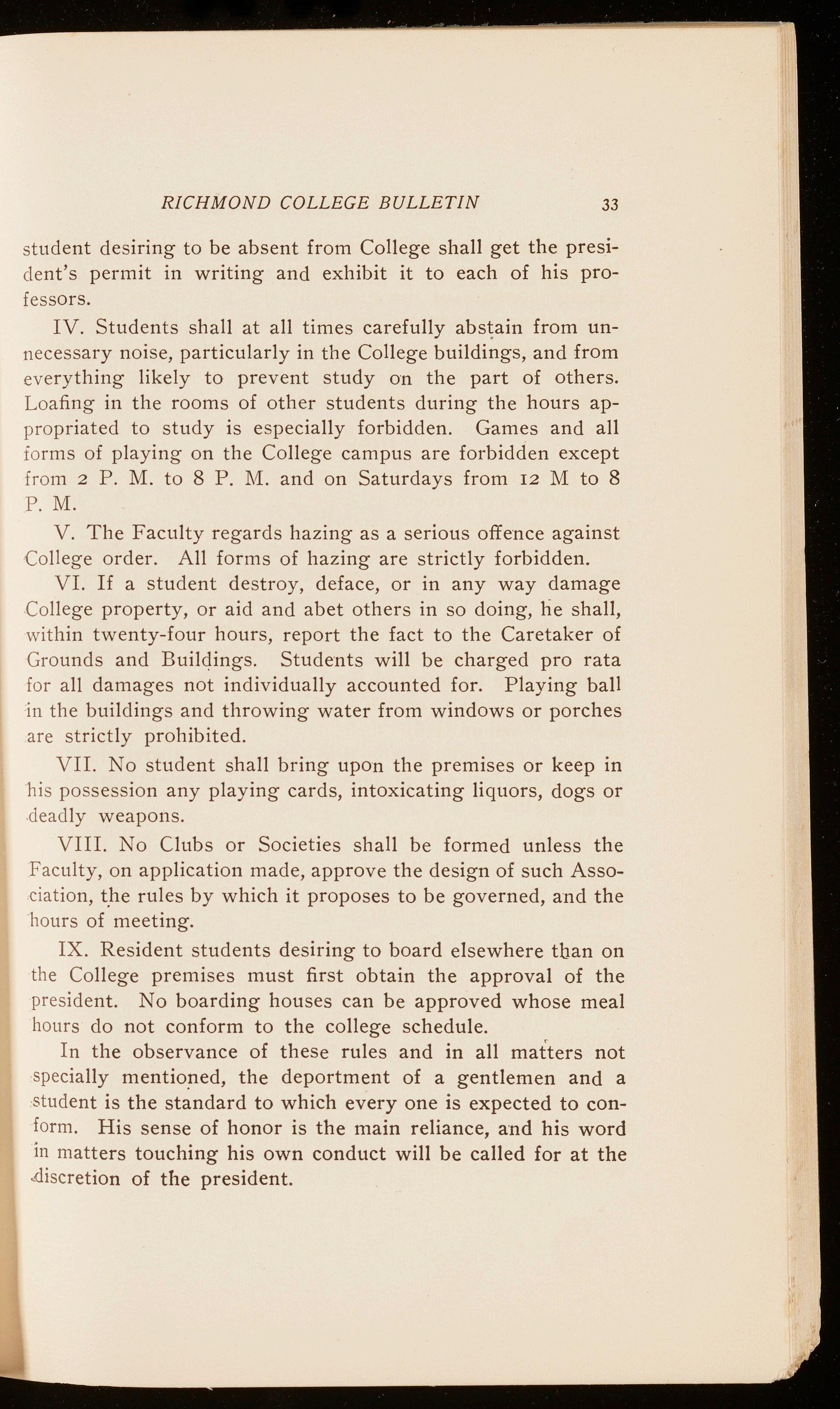
student desiring to be absent from College shall get the preside nt's permit in writing and exhibit it to each of his profess ors.
IV. Students shall at all times carefully abs~ain from unnec ess ary noise, particularly in the College buildings, and from eve rythin g likely to prevent study on the part of others. Loa fin g in the rooms of other students during the hours approp riated to study is e specially forbidden . Games and all for m s o f playing o n the College campus are forbidden except from 2 P . M. to 8 P. M. and on Saturdays from 12 M to 8 P. M
V . The Faculty r egard s hazing as a serious offence against College order. All form s of hazing are strictly forbidden.
V I. If a s tudent de stroy, deface, or in any way damage Colleg e property, o r aid and abet others in so doing, he shall, with in twenty-four hours, report the fact to the Caretaker of Grounds and Building s . Students will be charged pro rata for a ll damages n ot individually accounted for Playing ball in the buildings and throwing water from windows or porches are s trictl y prohibited
V II No student shall bring upon the premises or keep in "his pos se ss io n any playing cards, intoxicating liquors, dogs or dead ly weap o n s.
VII I. No Clubs or Societies shall be formed unless the Facu lty , o n application made, approve the design of such Associatio n , t he rules by which it proposes to be governed, and the hours o f meeting.
IX . Resident students desiring to board elsewhere tban on the Co llege premises must first obtain the approval of the preside nt . No boarding houses can be approved whose meal hours d o not conform to the college schedule.
In the observance of these rules and in all matters not specia lly mentioned, the deportment of a gentlemen and a ,stude nt is the standard to which every one is expected to conform. His sense of honor is the main reliance, and his word in ma tters touching his own conduct will be called for at the ,<liscretion of the president.
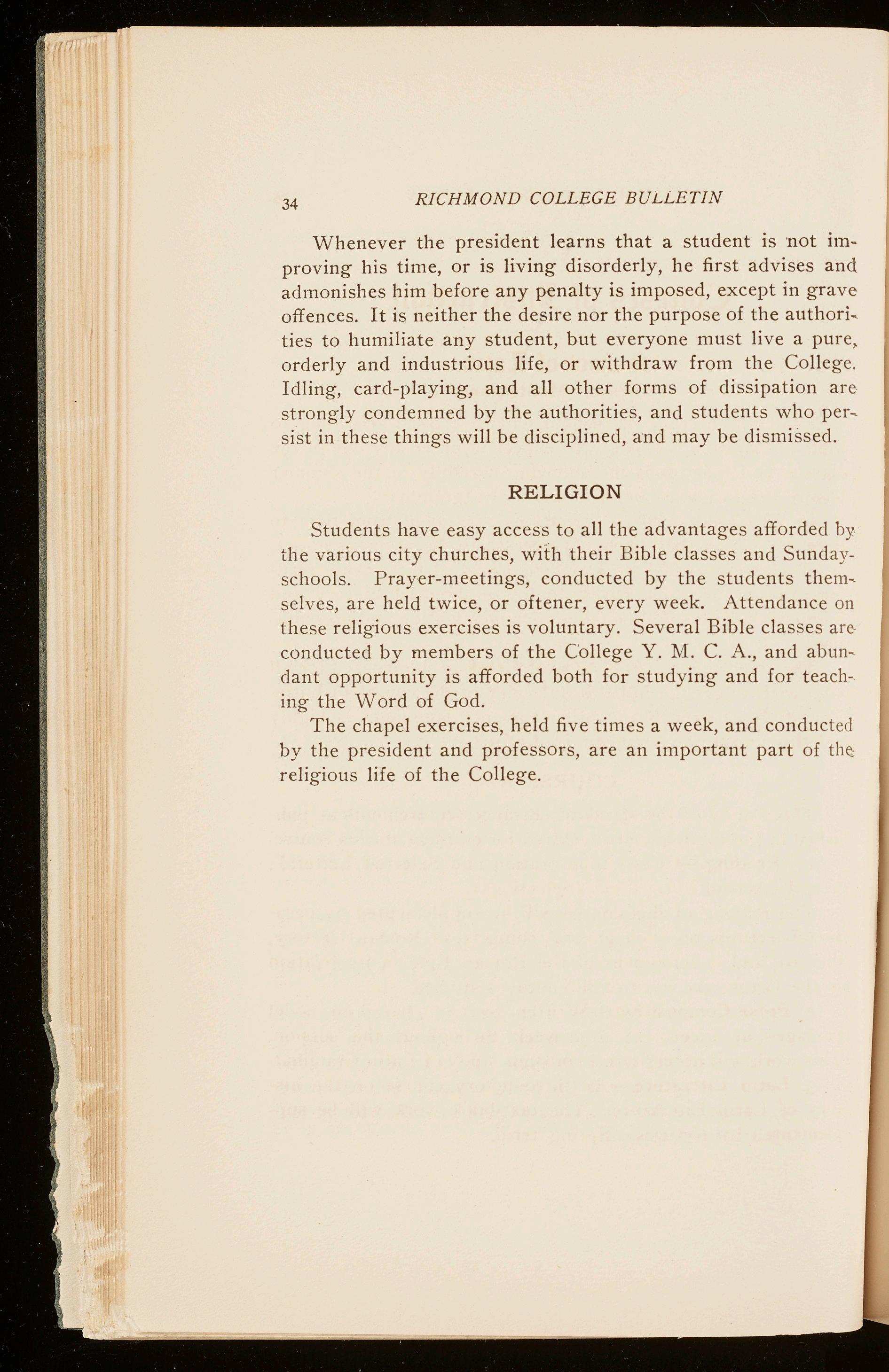
Whenever the president learns that a student is not improving his time, or is living disorderly, he first advises and admonishes him before any penalty is imposed, except in grave offences. It is neither the desire nor the purpose of the authorities to humiliate any student, but everyone must live a pure , orderly and industrious life, or withdraw from the College. Idling, card-playing, and all other forms of dissipation are strongly condemned by the authorities, and st ud ents who persist in these things will be disciplined, and may be dismissed.
Students have easy access to all the advantages afforded by the various city churches, with their Bible classes and Sund ayschools. Prayer-meetings, conducted by the students themselves, are held twice, or oftener, every week. Attendance on these religious exercises is voluntary. Several Bible classes areconducted by members of the College Y. M. C. A., and abundant opportunity is afforded both for studying and for teaching the Word of God.
The chapel exercises, held five times a week, and conduct ed by the president and professors, are an important part of th e: religious life of the College.
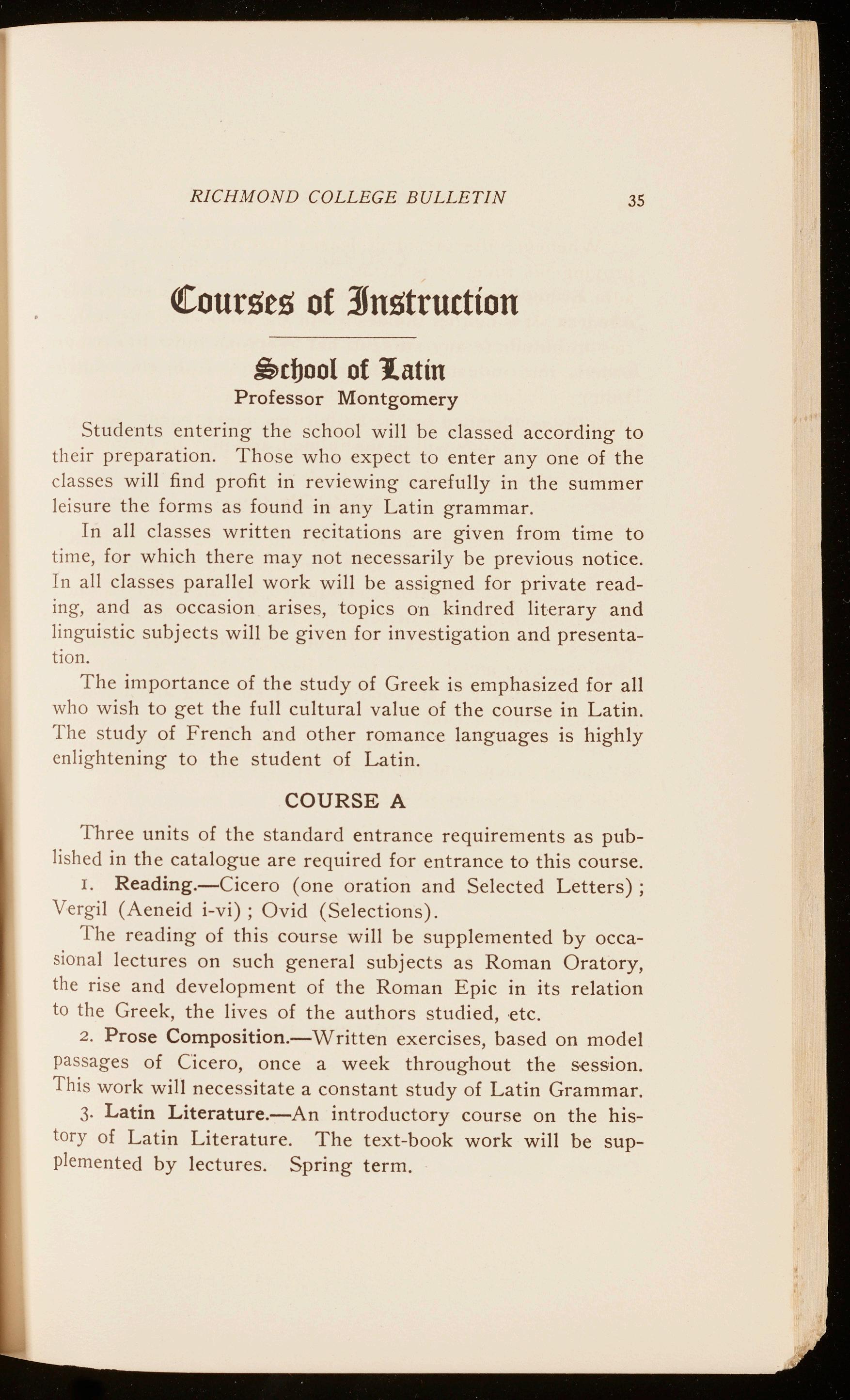
Professor Montgomery
Students entering the school will be classed according to the ir pr eparation. Tho s e who expect to enter any one of the classes will find profit in reviewing carefully in the summer leisure the forms as found in any Latin grammar.
In all classes written recitations are given from time to time, for which there may not necessarily be previous notice. In a ll classes parallel work will be assigned for private reading, and as occasion arise s, topics on kindred literary and ling ui stic subjects will be given for investigation and presentatio n.
The importance of the study of Greek is emphasized for all who w ish to get the full cultural value of the course in Latin. T h e study of French and other romance languages is highly enli g htening to the student of Latin.
Three units of the standard entrance requirements as publishe d in the catalogue are required for entrance to this course .
1. Reading.-Cicero ( one oration and Selected Letters) ; Verg il (Aeneid i-vi); Ovid (Selections).
T he reading of this course will be supplemented by occasiona l lectures on such general subjects as Roman Oratory, th e ri se and development of the Roman Epic in its relation t o t he Greek, the lives of the authors studied, etc.
2. Prose Composition.-Written exercises, based on model passag es of Cicero, once a week throughout the s•ession. T his work will necessitate a constant study of Latin Grammar.
3. Latin Literature.-An introductory course on the hist ory of Latin Literature. The text-book work will be supplemented by lectures. Spring term.
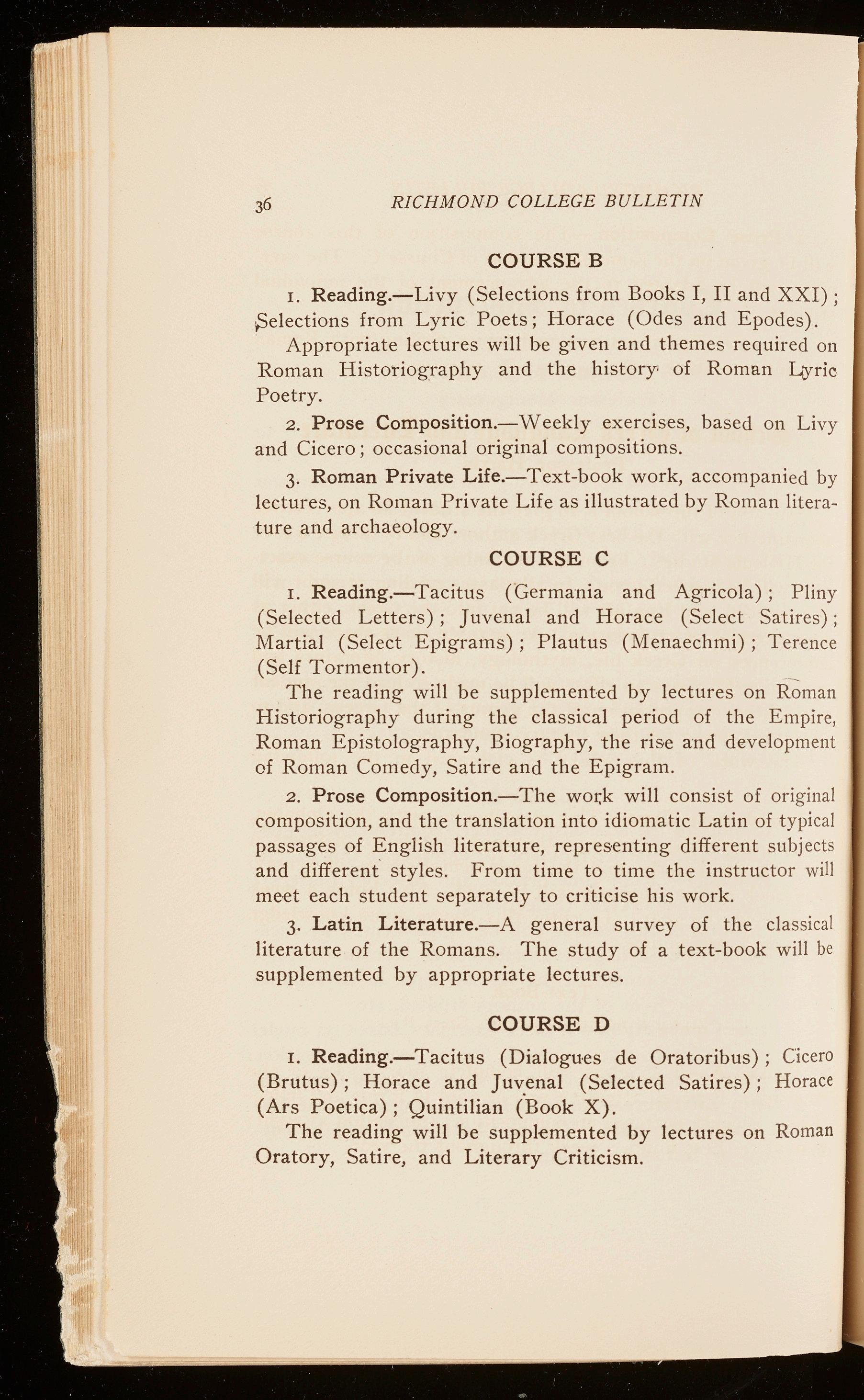
1. Reading.-Livy (Selections from Books I, II and XXI) ; ,Selections from Lyric Poets; Horace (Odes and Epode s) Appropriate lectures will be given and theme s required on Roman Historiography and the history ' of Roman Ly ri c. Poetry .
2. Prose Composition.-W eekly exerci s es, based on Li vy and Cicero; occasional original compositions.
3. Roman Private Life.-Text-book work, accompani ed by lectures, on Roman Private Life as illustrated by R o m a n lit er ature and archaeology.
1. Reading.-Tacitus (Germania and Agricola) ; P liny (Selected Letters) ; Juvenal and Horace (Select Sa tir es); Martial (Select Epigrams); Plautus (Menaechmi) ; Terence (Self Tormentor) .
The reading will be supplemented by lecture s o n R--;;man Historiography during the classical period of the Em pire, Roman Epistolography, Biography, the ri s-e and dev elopment of Roman Comedy, Satire and the Epigram .
2 Prose Composition.-The wor,k will con sist of or iginal composition, and the translation into idiomatic Latin o f t ypical passage s of English literature, repres ·enting different su bjects and different styles. From time to time the in s truct or will meet each student s eparately to criticise his work.
3 Latin Literature.-A general survey of the classical literature of the Romans The study of a text-book will be supplemented by appropriate lectures.
I. Reading.-Tacitus (Dialogues de Oratoribus) ; Cicero (Brutus); Horace and Juvenal (Selected Satires) ; Horac e (Ars Poetica); Quintilian (Book X).
The reading will be supplemented by lectures on Roman Oratory, Satire, and Literary Criticism .
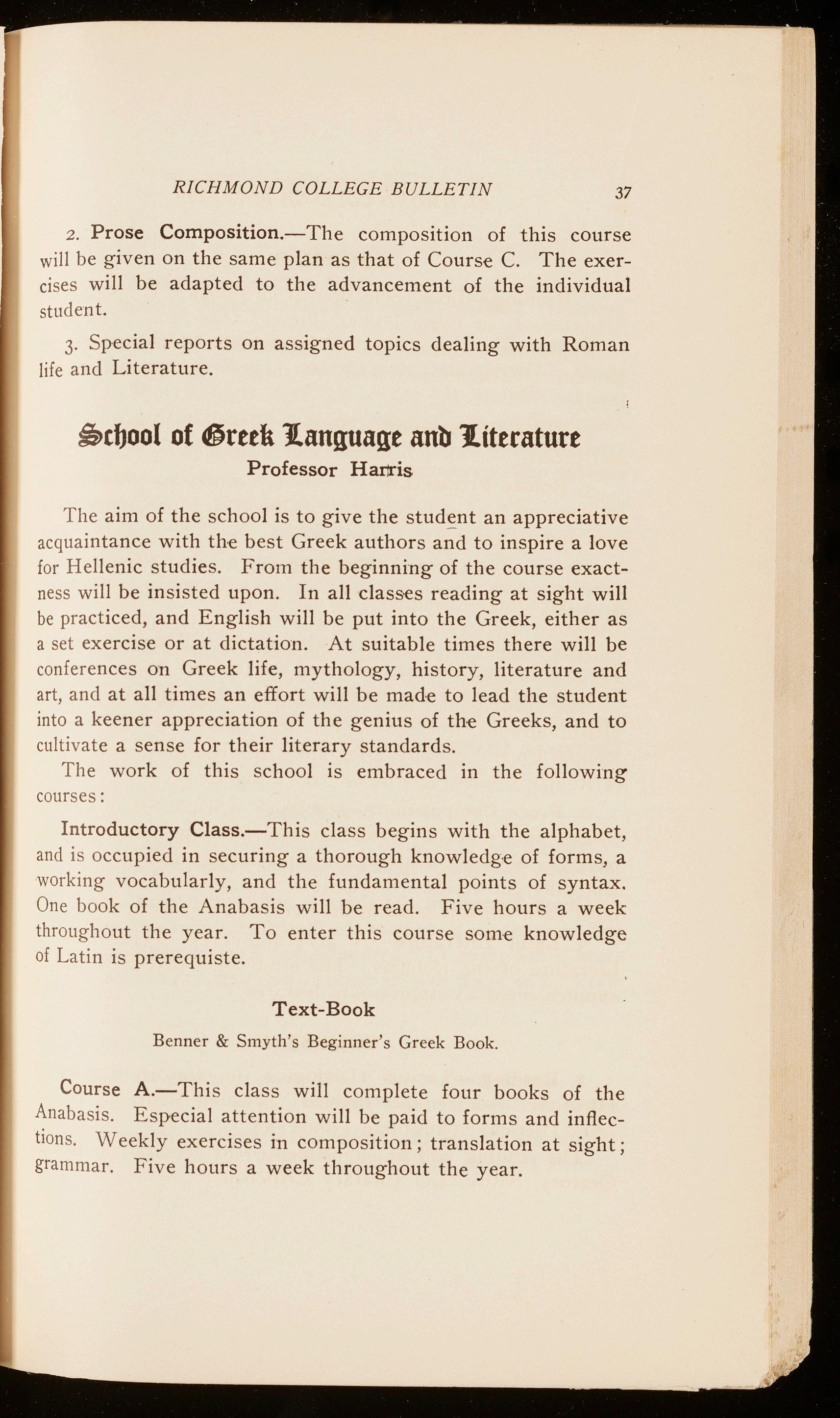
2. Prose Composition.-The composition of this course will b e given on the same plan as that of Course C. The exercises will be adapted to the advancement of the individual st udent.
3- Special reports on assigned topics dealing with Roman life and Literature.
Professor Hartris
The aim of the school is to give the stud~nt an appreciative acquaintance with the best Greek authors and to inspire a love for He llenic studies. From the beginning of the course exactness w ill be insisted upon . In all class ·es reading at sight will be pra cticed, and English will be put into the Greek, either as a set exercise or at dictation. At suitable times there will be conferences on Greek life, mythology, history, literature and art, and at all times an effort will be made to lead the student into a keener appreciation of the genius of the Greeks, and to cultivate a sense for their literary standards.
The work of this school is embraced in the following courses:
I ntroductory Class.-This class begins with the alphabet, and is occupied in securing a thorough knowledge of forms, a working vocabularly, and the fundamental points of syntax. One boo k of the Anabasis will be read. Five hours a week througho ut the year. To enter this course some knowledge of Latin is prerequiste.
Benner & Smyth's Beginner's Gr eek Book.
Course A.-This class will complete four books of the Anabasis. Especial attention will be paid to forms and inflections. W eekly exercises in composition; translation at sight; grammar . Five hours a week throughout the year.
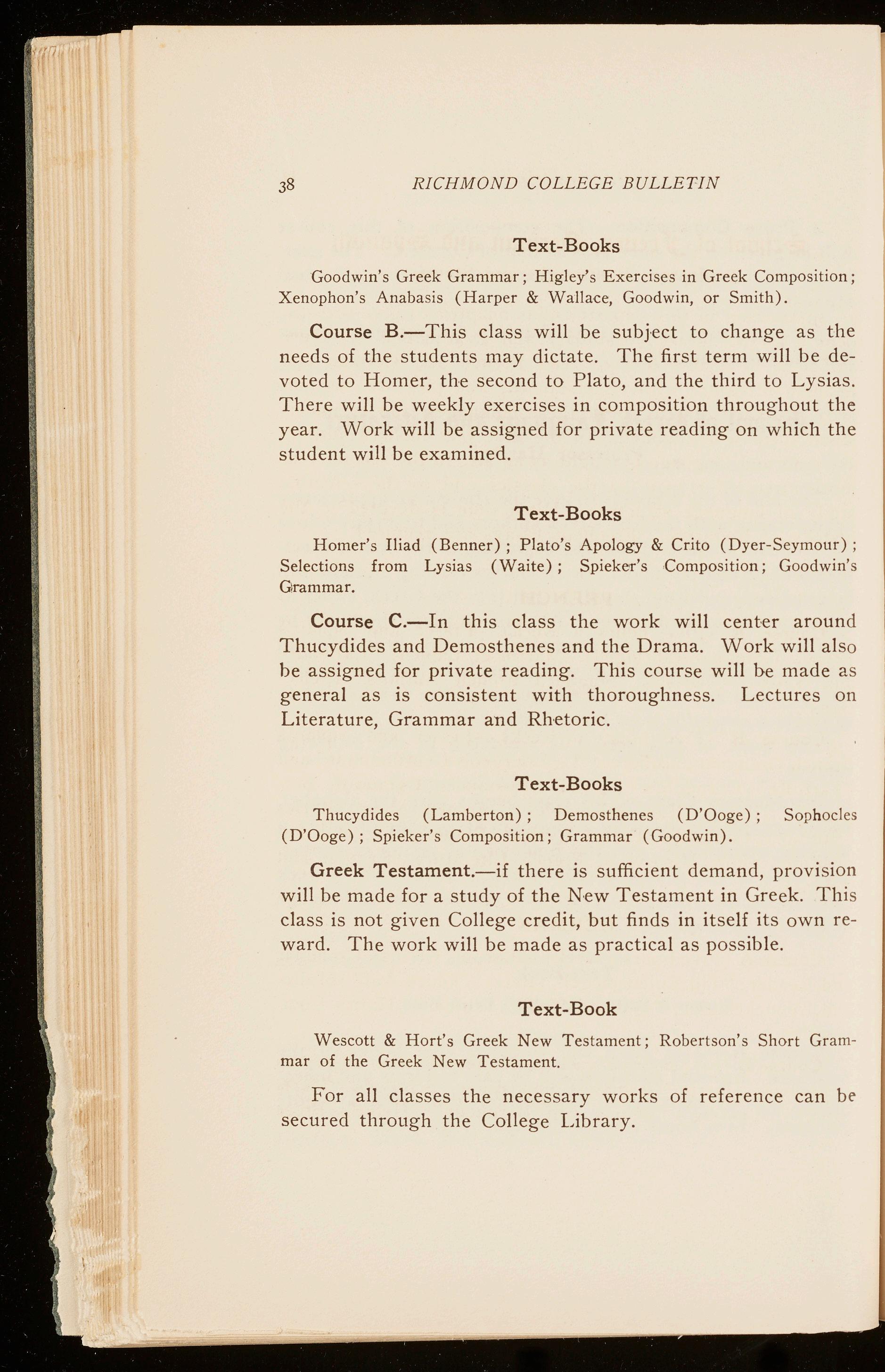
Text-Books
Goodwin's Greek Grammar; Higley's Exercises in Greek Composition; Xenophon's Anabasis (Harper & Wallace, Goodwin, or Smith).
Course B.-This class will be subject to change as the needs of the students may dictate. The first term will be devoted to Homer, the second to Plato, and the third to Lysias. There will be weekly exercises in composition throughout the year. Work will be assigned for private reading on which the student will be examined.
Text-Books
Homer's Iliad (Benner); Plato's Apology & Crito (Dyer-Seymour); Selections from Lysias (Waite); Spieker's ,Composition; Goodwin' s G:rammar.
Course C.-In this class the work will center around Thucydides and Demosthenes and the Drama. Work will also be assigned for private reading. This course will be made as general as is consistent with thoroughness. Lectures on Literature, Grammar and Rhetoric.
Text-Books
Thucydides (Lamberton); Demosthenes (D'Ooge); Sophocle s (D'Ooge); Spieker's Composition; Grammar (Goodwin).
Greek Testament.-if there is sufficient demand, prov1s10n will be made for a study of the New Testament in Greek. Thi s class is not given College credit, but finds in itself its own reward. The work will be made as practical as possible.
Text-Book
Wescott & Hort's Greek New Testament; Robertson's Short Grammar of the Greek New Testament.
For all classes the necessary works of reference can be secured through the College Library.
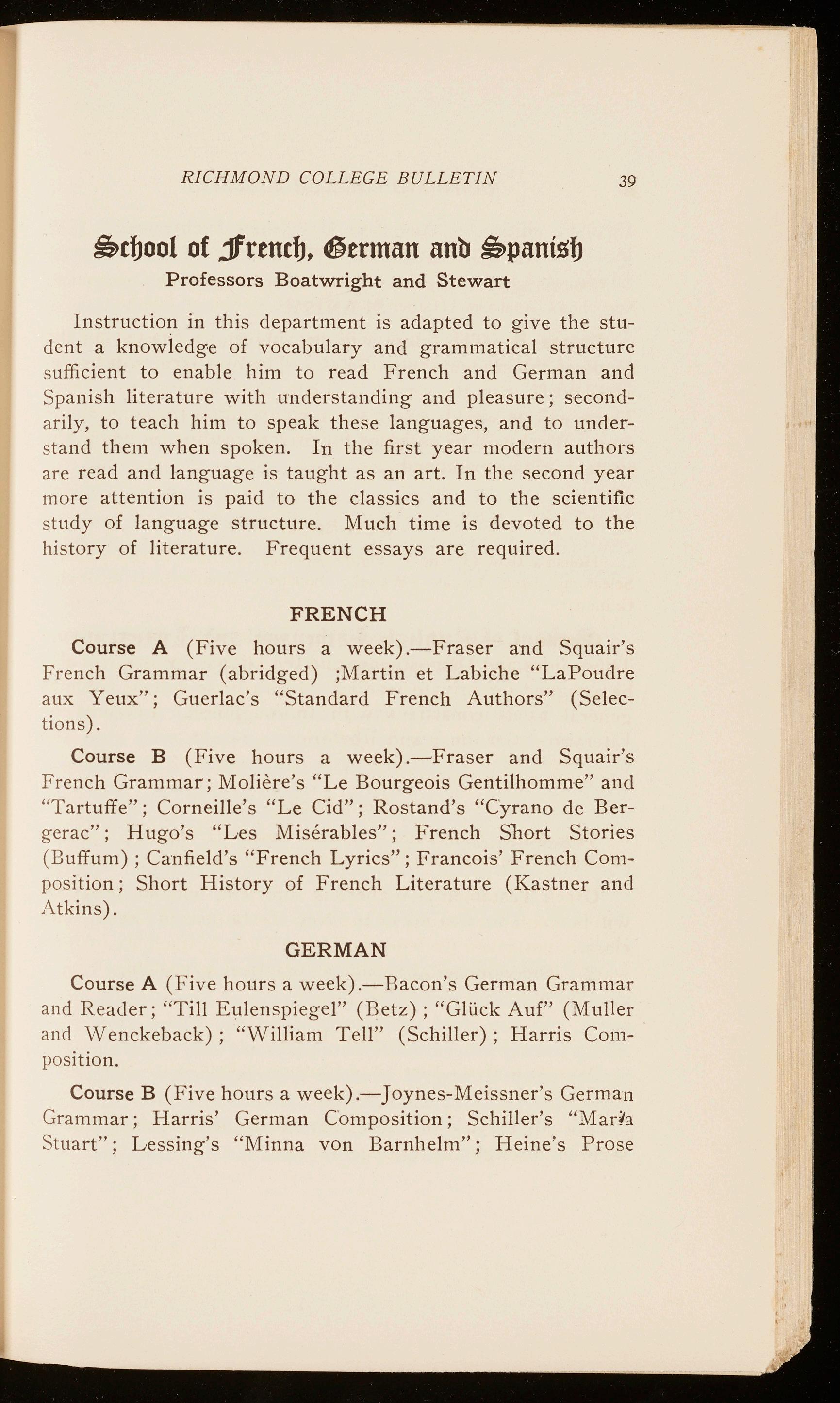
Professors Boatwright and Stewart
Instruction in this department is adapted to give the stud ent a knowledge of vocabulary and grammatical structure s ufficient to enable him to read French and German and Spanish literature with understanding and pleasure; secondarily, to teach him to speak these languages, and to understand them when spoken. In the first year modern authors are read and language is taught as an art. In the second year more attention is paid to the classics and to the scientific st udy of language structure. Much time is devoted to the h istory of literature. Frequent essays are required.
Course A (Five hours a week) .-Fraser and Squair's Fre nch Grammar (abridged) ;Martin et Labiche "LaPoudre a ux Yeux"; Guerlac ' s "Standard French Authors" (Selectio n s ).
Course B (Five hours a week).-Fraser and Squair's Fre nch Grammar; Moliere's "Le Bourgeois Gentilhomme" and "Ta rtuffe"; Corneille's "Le Cid"; Rostand's "Cyrano de Berge rac"; Hugo's "Les Miserables"; French Snort Stories (B uffum); Canfield's "French Lyrics"; Francois' French Compos ition; Short History of French Literature (Kastner and Atkins) .
Course A (Five hours a week).-Bacon ' s German Grammar an d Reader; " Till Eulen s piegel" (Betz); "Gliick Auf" (Muller and Wenckeback); "William Tell" (Schiller); Harris Compos ition
Course B (Five hours a week).-Joynes-Meissner 's German Gra mmar; Harris' German Composition; Schiller's "Mada Stua rt " ; Lessing's "Minna von Barnhelm"; Heine's Prose
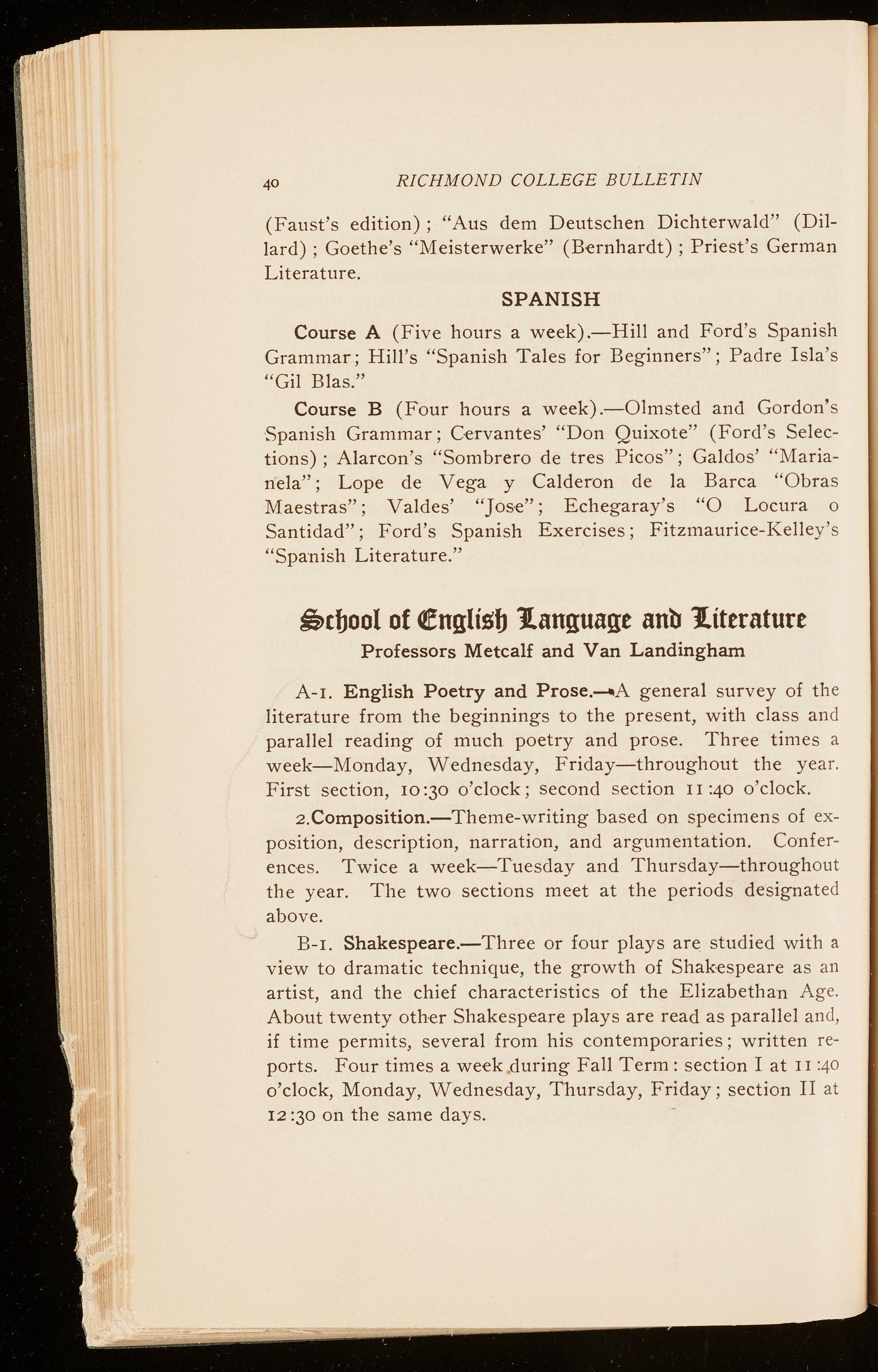
(Faust's edition); "Aus dem Deutschen Dichterwald " (Dillard); Goethe's "Meisterwerke" (Bernhardt); Priest's German Literature.
Course A (Five hours a week).-Hill and Ford ' s Spanish Grammar; Hill's "Spanish Tales for Beginners"; Padre Isla's "Gil Blas."
Course B (Four hours a week) .-Olm sted and Go rdon' s Spanish Grammar; Cervantes' "Don Quixote" (F o rd 's Selections); Alarcon's "Sombrero de tres Ficos " ; Galdos' " Marianela"; Lope de Vega y Calderon de la Barca " Obra s Maestras"; Valdes' "Jos-e"; Echegaray ' s "O Locura o Santidad"; Ford's Spanish Exercises; Fitzmaurice-Kelle y's "Spanish Literature."
Professors Metcalf and Van Landingham
A-1. English Poetry and Prose.-A general survey of th e literature from the beginnings to the pre sent, with class an d parallel reading of much poetry and prose. Thr -ee time s a week-Monday, Wednesday, Friday-throughout the ye ar . First section, 10 :30 o'clock ; second section 11 :40 o ' clock.
2.Composition.-Theme-writing ba s ed on specimen s of exposition, description, narration, and ar g umentation. Confe rence s . Twice a week-Tue sday and Thursday-through out the year. The two secti o ns meet at the periods designat ed above.
B-1. Shakespeare.-Three or four plays are studied with a view to dramatic technique, the growth of Shakespeare a s an artist, and the chief characteristics of the Elizabethan Age. About twenty other Shakespeare play s are read as parall e l and, if time permit s, several from his contemporaries; written reports. Four times a week during Fall Term: section I at 11 :40 o'clock, Monday, Wednesday, Thursday, Friday; section II at 12 :30 on the same days.
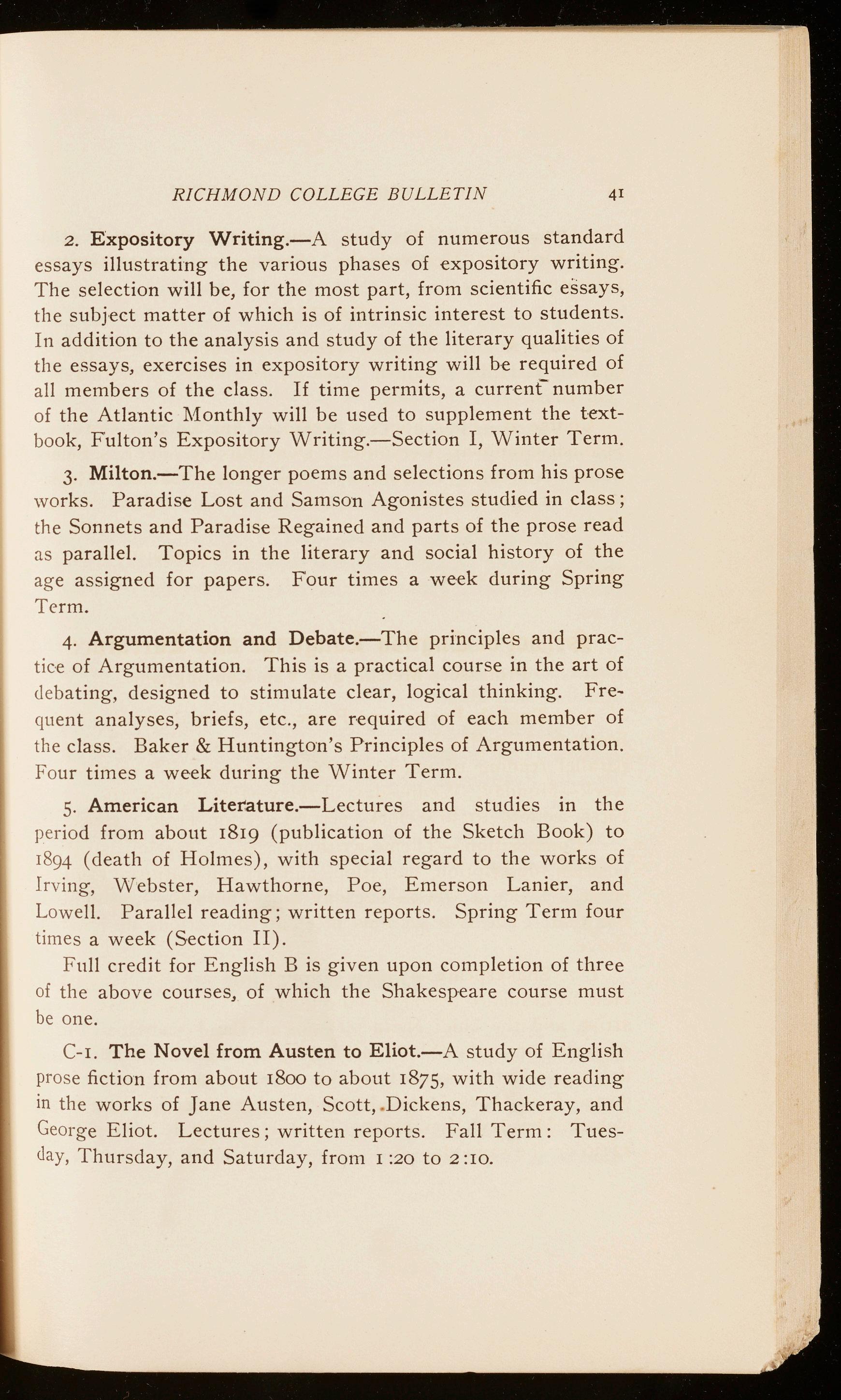
2 Expository Writing.-A study of numerous standard es says illustrating the various phases of expository writing. The selection will be, for the most part, from scientific essays, t he subj -ect matter of which is of intrinsic interest to students. In addition to the analysis and study of the literary qualities of t he essays, exercises in expository writing will be required of all members of the class. If time permits, a current number of the Atlantic Monthly will be used to supplement the textboo k, Fulton's Expository Writing.-Section I, Winter Term.
3 Milton.-The longer poems and selections from his prose wo rks. Paradise Lost and Samson Agonistes studied in class; the Sonnets and Paradise Regained and parts of the prose read as parallel. Topics in the literary and social history of the ag e assigned for papers. Four times a week during Spring Te rm.
4. Argumentation and Debate.-The principles and practice o f Argumentation. This is a practical course in the art of deba ting , designed to stimulate clear, logical thinking. Fre~ que nt analyses, briefs, etc., are r-equired of each member of the class. Baker & Huntington's Principles of Argumentation. Fou r times a week during the Winter Term.
5. American Literature.-Lectures and studies in the per io d from about 1819 (publication of the Sketch Book) to 1894 (death of Holmes), with special regard to the works of Irvi n g , Webster, Hawthorne, Poe, Emerson Lanier, and Lowe ll. Parallel reading; written reports. Spring Term four times a week (Secti o n II) .
F ull credit for English B is given upon completion of three of t h e above courses, of which the Shakespeare course must be one.
C-1. The Novel from Austen to Eliot.-A study of English prose fiction from about 1800 to about 1875, with wide reading in the works of Jane Austen, Scott, Dickens, Thackeray, and George Eliot. Lectures; written reports. Fall Term: Tuesday, Thursday, and Saturday, from 1 :20 to 2 :10.
2. The Romantic Poets.-Studies in the works of Wordsworth, Byron and Shelley. Lectures, conferences, written reports. Winter Term. (Not offered in 1913-14.)
3. Victorian Poetry.-Representative poems and dramas of Tennyson, and Browning will be studied in class, while others will be read as parallel. Lectures; written reports on th e social and other conditions of the time. Winter Term.
4. Victorian Prose: The Essay and the Letter.-A few of the principal prose writers of the middle and later nineteenth century will be studied through their essays and letters. Lectures, written reports, parallel reading. Spring Term.
D-1. Anglo-Saxon Prose.-Old English Grammar and Reader (Smith's), with collateral reading of selections from the prose literature. Fall term: Monday, Wednesday, Friday at I :IO.
D-2. Anglo-Saxon Poetry.-Beowulf (Wyatt's edition) re ad entire, and a few hundred lines critically studied. Parallel Reading and Reports.-Winter Term.
3. Middle English.-Selections from Middle English Literature (1200 to 1500). Emerson's Middle English Reader. Parallel Reading in Chaucer.-Spring Term.
4. Chaucer.-A careful study of several of the Canterbury Tales, with wide reading in the others and in the shorter peoms.-Spring Term.
Courses 3 and 4 will be given in alternate years. For 1913'14 Course 4 will be given.
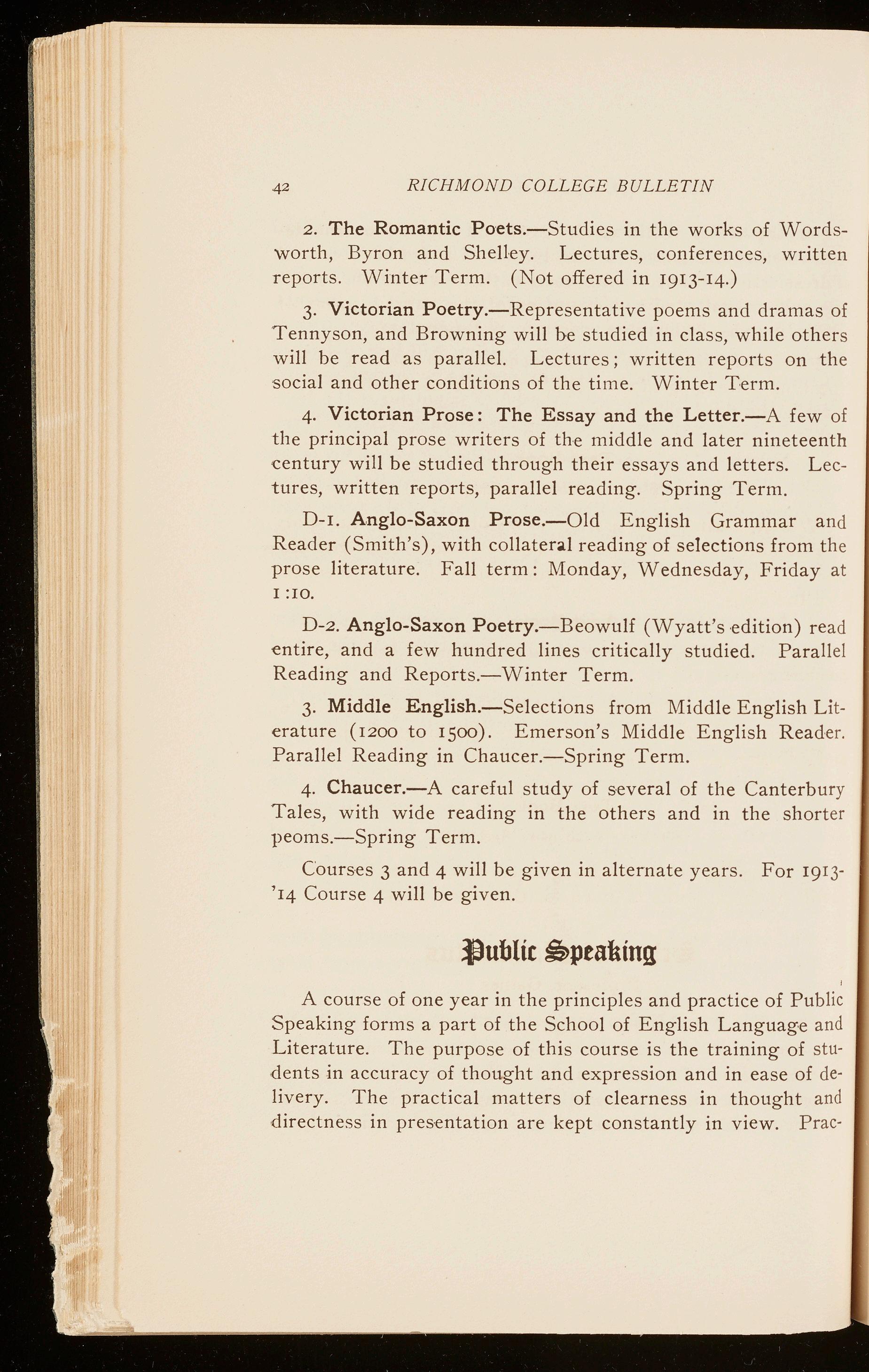
A course of one year in the principles and practice of Public Speaking forms a part of the School of English Language and Literature. The purpose of this course is the training of students in accuracy of thought and expression and in ease of delivery. The practical matters of clearness in thought and directness in presentation are kept constantly in view. Prac·

tice in the art of public speaking will be afforded by the delivery before the class of original orations and other forms of add ress. In addition to oral practice, there will be wide reading and critical study of examples of the various forms of pub lic speech-deliberative, forensic, occasional, etc.
Fall Term.-A study of the general principles of Public Spe aking. Reading aloud. Daily practice in the delivery of sho rt memorized selections.
Text-Book
Winter's Public Speaking
Winter Term.-The oration as a Form. Analytical study of a number of modern orations as to structure, style and diction. Writing of two original orations and delivery of them before the class.
Text-Books
Denney's American Public Addresses; McConnell's Selections from Southern orators.
Spring Term.-Other forms of Public Address, such as deliberative, occasional, etc. Extempore Speaking. Preparation and delivery of short speeches on current topics.
Text-Book
Shurter's Extempore Speaking.
The class in Public Speaking meets three times a week. A credit of three points is given for the year's work.
Professor Gaines
T he aim of the course of st udy in this department is to increase the student ' s power of independent, honest inquiry, and to cultivate in him the habit of stating with exactness and clearness his convictions, and of giving logically his reasons for them. Throughout the entire course, and particularly in
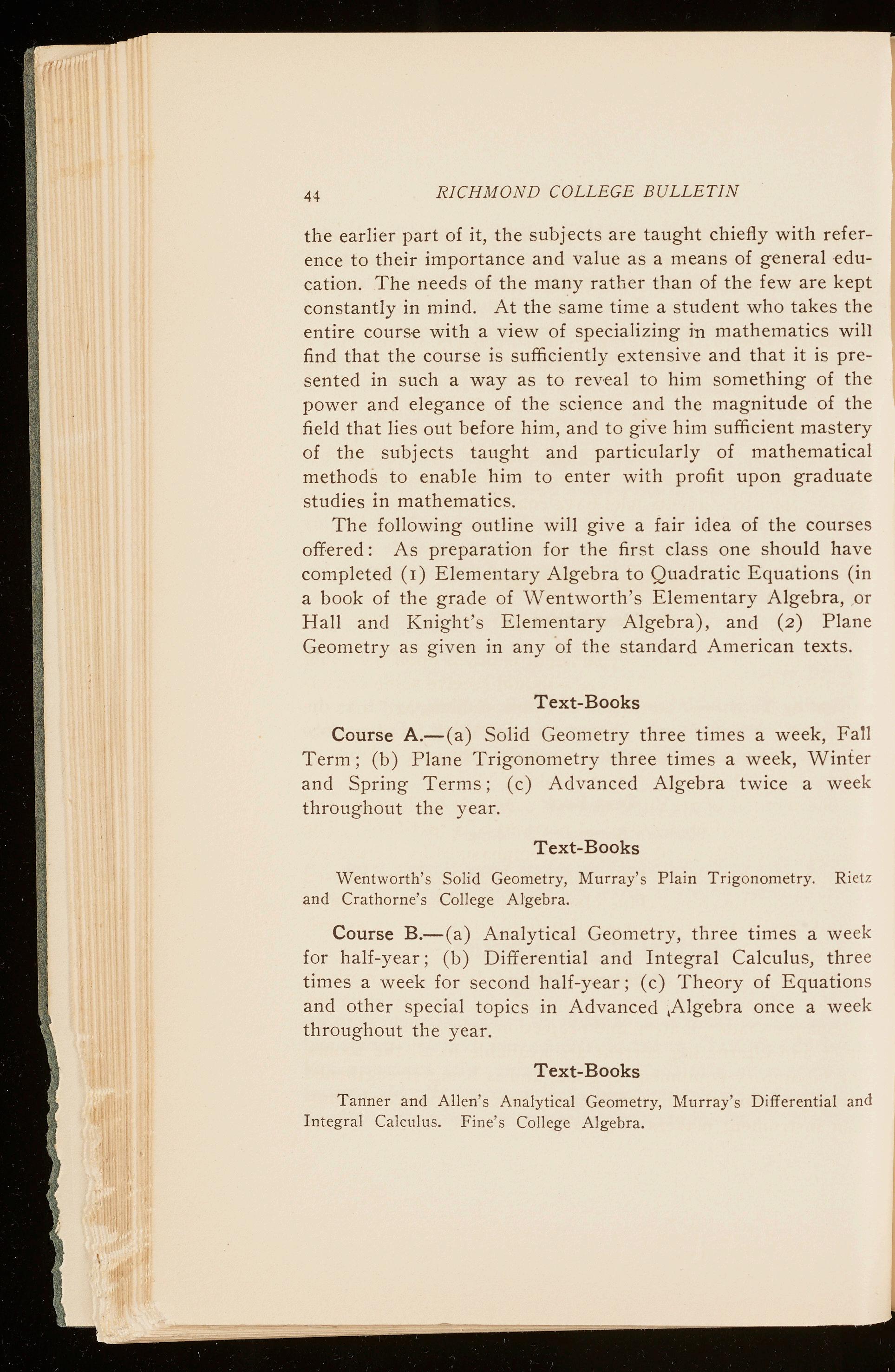
the earlier part of it, the subjects are taught chiefly with reference to their importance and value as a means of general ·education. The needs of the many rather than of the few are kept constantly in mind. At the same time a student who takes the entire course with a view of specializing in mathematics will find that the course is sufficiently extensive and that it is presented in such a way as to rev ·eal to him something of the power and elegance of the science and the magnitude of the field that lies out before him, and to give him sufficient mastery of the subjects taught and particularly of mathematical methods to enable him to enter with profit upon graduate studies in mathematics.
The following outline will give a fair idea of the courses offered: As preparation for the first class one should have completed (1) Elementary Algebra to Quadratic Equations (in a book of the grade of vVentworth's Elementary Algebra, or Hall and Knight's Elementary Algebra), and (2) Plane Geometry as given in any of the standard American texts.
Course A.-(a) Solid Geometry three times a week, Fall Term; (b) Plane Trigonometry three times a week, Winter and Spring Terms; ( c) Advanced Algebra twice a week throughout the year.
Wentworth ' s Solid Geometry, Murray's Plain Trigonometry. Ri et z and Crathorne's College Algebra.
Course B.-(a) Analytical Geometry, three times a week for half-year; (b) Differential and Integral Calculus, thre e times a week for second half-year; ( c) Theory of Equation s and other special topics in Advanced ,Algebra once a week throughout the year.
Tanner and Allen's Analytical Geometry, Murray's Differential and Integral Calculus. Fine's College Algebra.
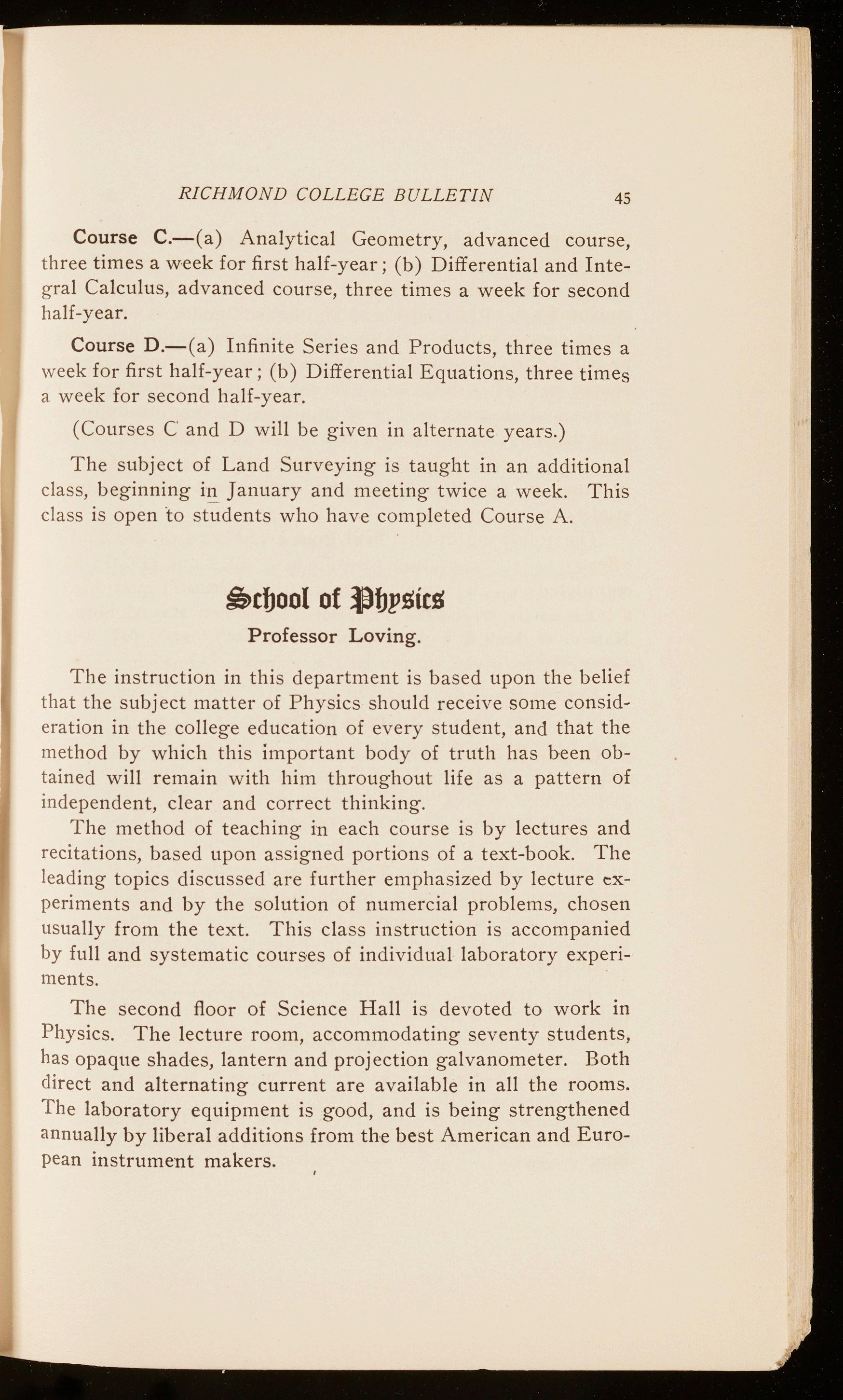
Course C.-(a) Analytical Geometry, advanced course, thre e times a week for first half-year ; (b) Differential and Integra l Calculus, advanced course, three times a week for second ha lf-year .
Course D.-(a) Infinite Series and Products, three times a we ek for first half-year; (b) Differential Equations, three times a wee k for second half-year
(C ourse s C and D will be given in alternate years.)
The subject of Land Surveying is taught in an additional class , beginning i~ January and meeting twice a week. This class is o p en to s tudents who have co mpleted Course A. Professor Loving.
The instruction in thi s department is ba s ed upon the belief tha t the subject matter of Physic s should receive some considera ti o n in the college education of every student, and that the met hod by which this important body of truth ha s been obtai n ed will remain with him throughout life as a pattern of inde pendent, clear and correct thinking.
T he method of teaching in each course is by lectures and rec it a tions, bas ed upon a ss igned portions of a text-book. The lead ing topics discus sed are further emphasiz -ed by lecture experi ments and by the solution of numercial problems, chosen usu ally from the text. This class instruction is accompanied by full and systematic courses of individual laboratory experiments.
The second floor of Science Hall is devoted to work in Phys ics. The lecture room, accommodating seventy students, has o paque shades, lantern and projection galvanometer. Both dire ct and alternating current are available in all the rooms. The laboratory equipment is good, and is being strengthened ann ually by liberal additions from the best American and Europea n instrument makers.
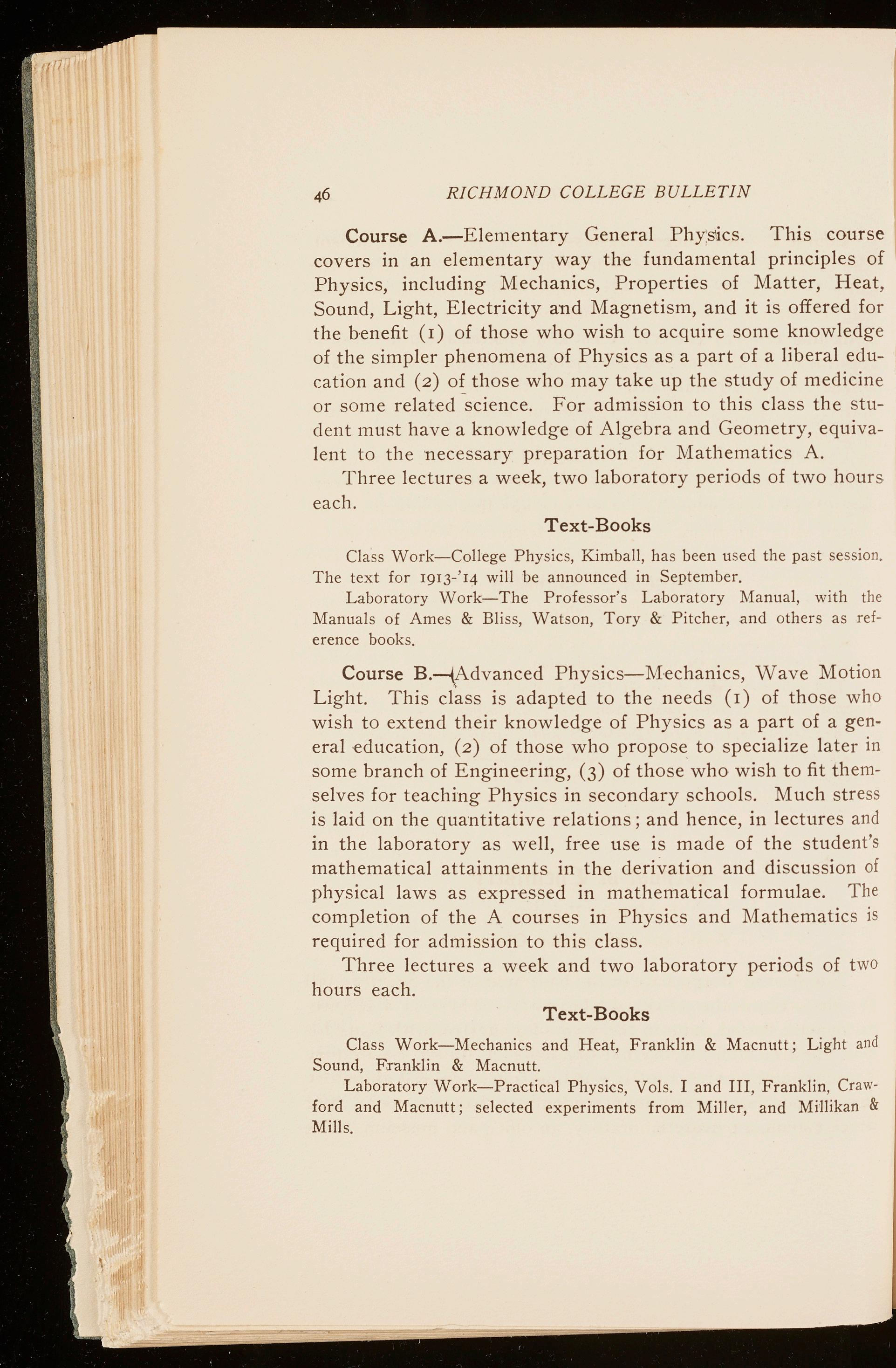
Course A.-Elementary General Phys\ics. This course covers in an elementary way the fundamental principles of Physics, including Mechanics, Properties of Matter, Heat, Sound, Light, Electricity and Magnetism, and it is offered for the benefit (I) of those who wish to acquire some knowledge of the simpler phenomena of Physics as a part of a lib eral education and (2) O! those who may take up the study of medicine or some related science. For admission to this class the student must have a knowledge of Algebra and Geometry, equivalent to the necessary preparation for Mathematics A.
Three lectures a week, two laboratory periods of two hours each.
Class Work-College Physics, Kimball, has been used the pa st se ssion The text for 1913-'14 will be announced in September.
Laboratory Work-The Professor's Laboratory Manual, with the Manuals of Ames & Bliss, Watson, Tory & Pitcher, and others as reference books.
Course B.-(,_Advanced Physics-Mechanics, Wave Motion Light. This class is adapted to the needs (I) of those who wish to extend their knowledge of Physics as a part of a general •education, (2) of those who propose _ to specialize later in some branch of Engineering, (3) of those who wish to fit themselves for teaching Physics in secondary schools. Much stress is laid on the quantitative relations; and hence, in lecture s and in the laboratory as well, free use is made of the student's mathematical attainments in the derivation and discussion of physical laws as expressed in mathematical formulae. The completion of the A courses in Physics and Mathematics is required for admission to this class.
Three lectures a week and two laboratory periods of two hours each.
Class Work-Mechanics and Heat, Franklin & Macnutt; Light and Sound, Franklin & Macnutt.
Laboratory Work-Practical Physics, Vols. I and III, Franklin, Crawford and Macnutt; selected experiments from Miller, and Millikan & Mills.
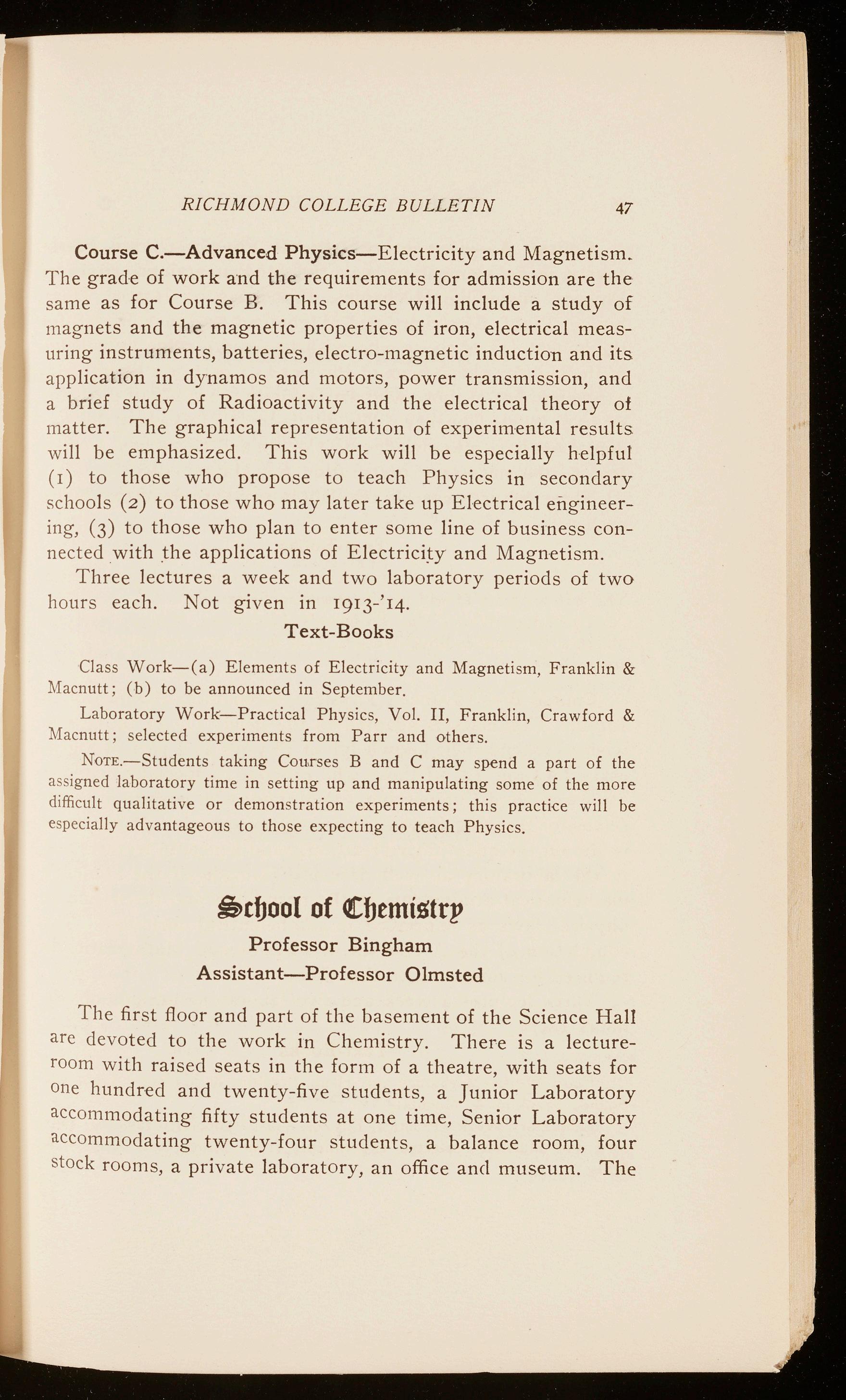
Course C.-Advanced Physics-Electricity and Magnetism. The grade of work and the requirements for admission are the sa me as for Course B. This course will include a study of magnets and the magnetic properties of iron, electrical measuring instruments, batteries, electro-magnetic induction and its app lication in dynamos and motors, power transmission, and a brief study of Radioactivity and the electrical theory of matte r. The graphical representation of experimental results wi ll be emphasized. This work will be especially helpful (1) to those who propose to teach Physics in secondary schoo ls (2) to those who may later take up Electrical engineering, (3) to those who plan to enter some line of business connected with the applications of Electricity and Magnetism. Three lectures a week and two laboratory periods of two hours each. Not given in 1913-'14.
Class Work-(a) Element s of Electricity and Magneti sm, Franklin & Macnutt; (b) to be announced in September.
Laboratory Work-Practical Physics, Vol. II, Franklin, Crawford & Macnutt; se lected experiments from Parr and others.
NoTE.-Students taking Courses B and C may spend a part of the assigned laboratory time in setting up and manipulating some of the more difficult qualitative or demon stration experiments; this practice will be especially advantageous to those expecting to teach Physics.
~cbool
The first floor and part of the basement of the Science Ha!I are devoted to the work in Chemistry. There is a lectureroom with raised seats in the form of a theatre, with seats for one hundred and twenty-five students, a Junior Laboratory accommodating fifty students at one time, Senior Laboratory accommodating twenty-four students, a balance room, four stock rooms, a private laboratory, an office and museum. The
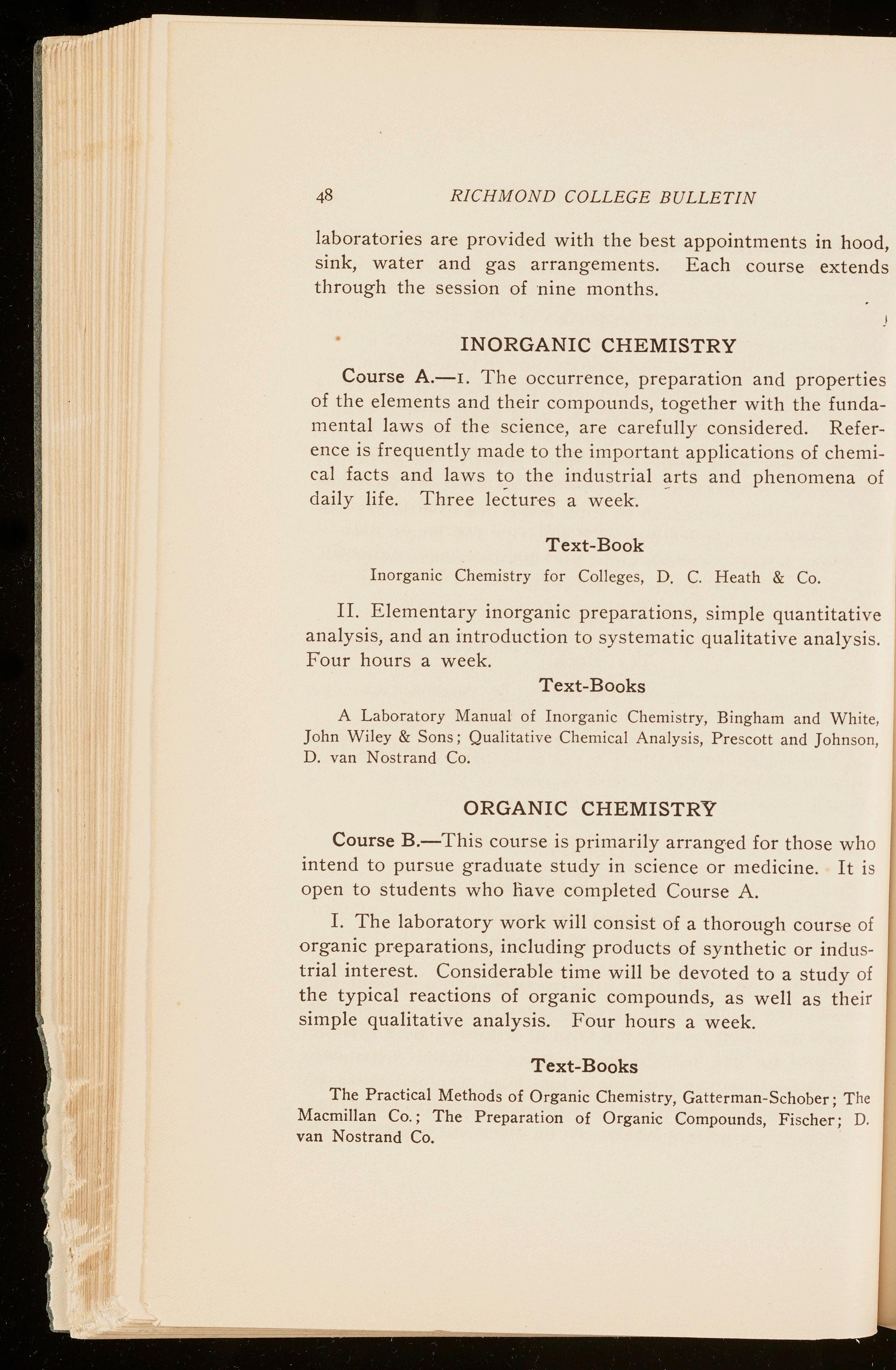
laboratories are provided with the best appointments in hood, sink, water and gas arrangements. Each course extends through the session of nine months.
Course A.-1. The occurrence, preparation and properties of the elements and their compounds, together with the fundamental laws of the science, are carefully considered. Reference is frequently made to the important applications of chemical facts and laws to the industrial arts and phenomena of daily life. Three lectures a week. -
Text-Book
Inorganic Chemistry for College s, D. C. Heath & Co.
II. Elementary inorganic preparations, simple quantitative analysis, and an introduction to systematic qualitative analysis. Four hours a week.
Text-Books
A Laboratory Manual of Inorganic Chemistry, Bingham and White , John Wiley & Sons; Qualitative Chemical Analysis, Pre scott and John son, D. van Nostrand Co.
Course B.-This course is primarily arranged for those who intend to pursue graduate study in science or medicine. It is open to students who Rave completed Course A.
I. The laboratory work will consist of a thorough course of organic preparations, including products of synthetic or indu strial interest. Considerable time will be devoted to a study of the typical reactions of organic compounds, as well as their simple qualitative analysis. Four hours a week.
Text-Books
The Practical Methods of Organic Chemistry, Gatterman-Schober; The Macmillan Co.; The Preparation of Organic Compounds, Fischer; D van Nostrand Co.
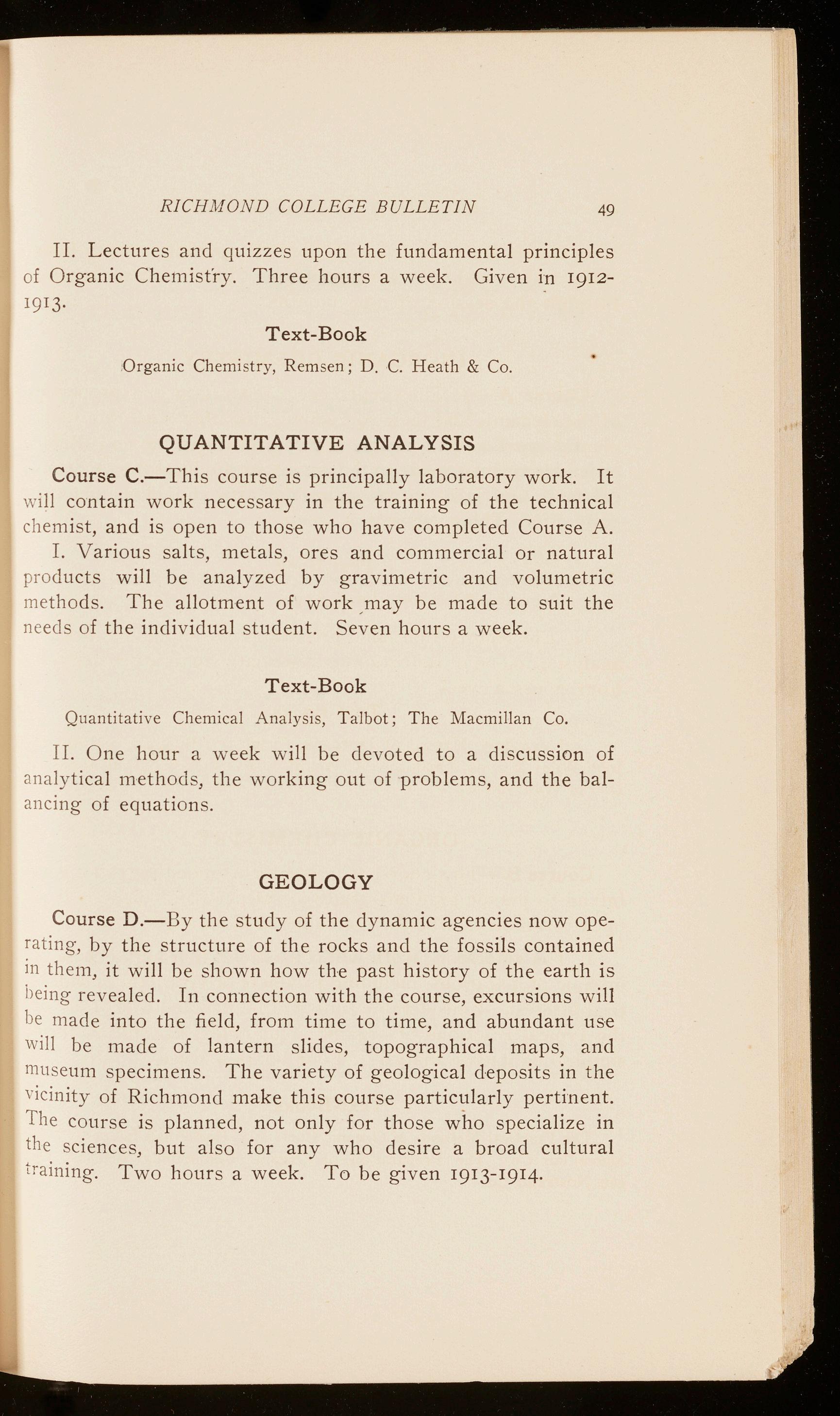
II. Lectures and quizzes upon the fundamental principles of Organic Chemisfry. Three hours a week. Given rn 19121913.
Text-Book
Organic Chemi stry, R emsen; D C. Heath & Co.
Course C.-This course is principally laboratory work. It will contain work necessary in the training of the technical chem ist, and is open to those who have completed Course A. I. Various salts, metals, ores and commercial or natural prod ucts will be analyzed by gravimetric and volumetric methods. The allotment of work may be made to suit the needs of the individual student. Seven hours a week.
Text-Book
Qua nti ta ti ve Chemical Analysis, Talbot; The Macmillan Co. II. One hour a week will be devoted to a discussion of analy tical method s , the working out of problems, and the balancin g of equati o ns.
Course D.-By the study of the dynamic agencies now operating, by the structure of the rocks and the fossils contained in the m, it will be shown how the past history of the earth is being revealed. In connection with the course, excursions will be made into the field, from time to time, and abundant use will be made of lantern slides, topographical maps, and museum specimens. The variety of geological deposits in the vicinity of Richmond make this course particularly pertinent. The course is planned, not only for those who specialize in the scie nces, but also for any who desire a broad cultural training. Two hours a week. To be given 1913-1914.
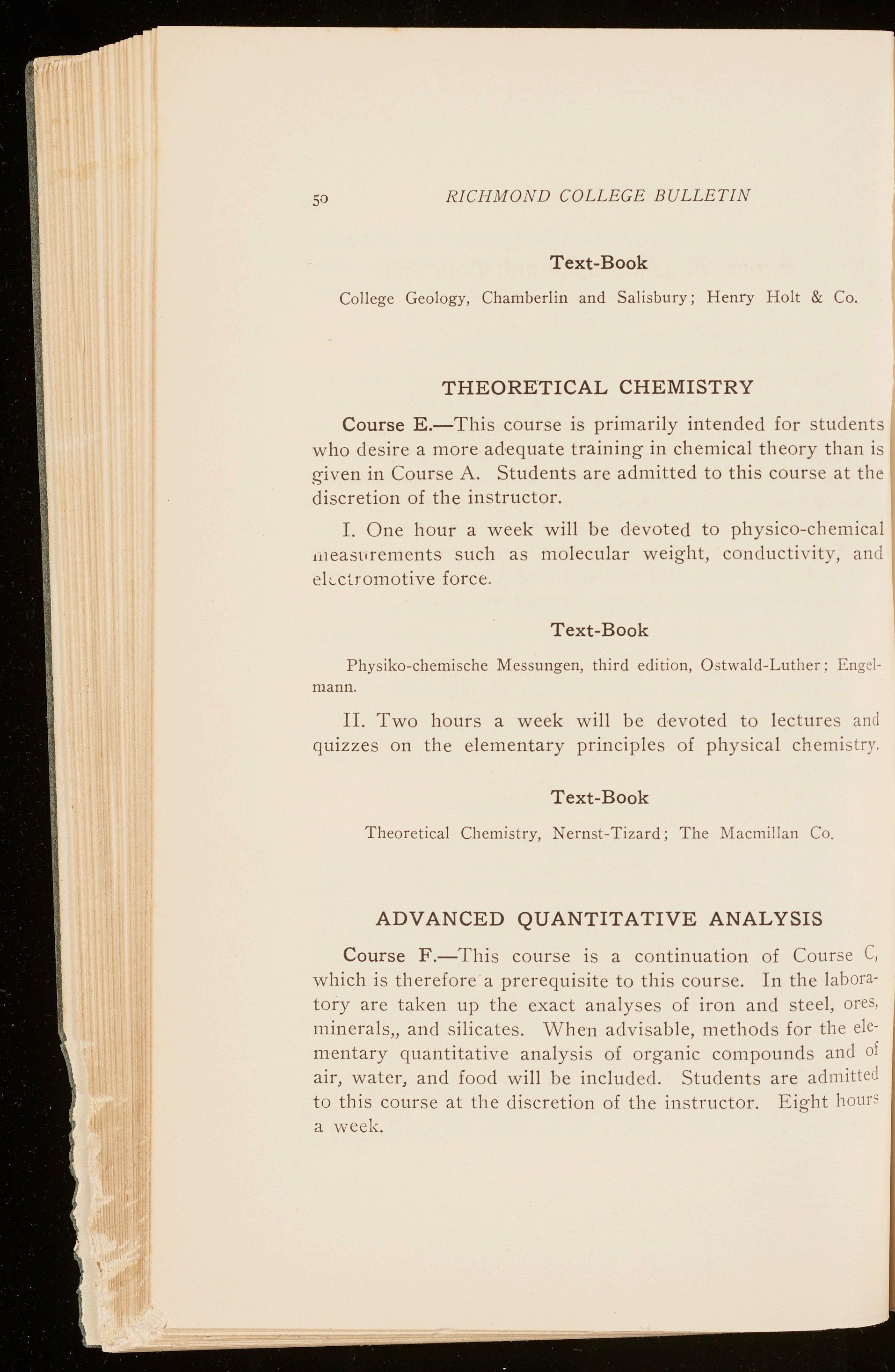
Text-Book
College Geology, Chamberlin and Salisbury; Henry Holt & Co.
Course E.-Thi s course is primarily intended for st ud ents who desire a more adequate training in chemical theor y th an is given in Co urse A. Students are admitted to this course at th e discretion of the in structor.
I. One h o ur a week will be devoted to physico-chemical 1i1easr,rements suc h as molecular weight, conductivity, and ekctromotive force.
Text-Book
Physiko-chemi sche Messungen, third edition, O stwald-Luthe r; Eng elmann.
II. Two hours a wee k will be devoted to lectures and quizzes on the elementary principles of physica l chemistry.
Text-Book
Theoretical Chemi stry , N ernst- Tizard; The Macmillan Co.
Course F.- This course is a co ntinu atio n of Course C, which is therefore a prerequisite to this course. In the la boratory are taken up the exact ana lyses of iron and steel, ores, minerals,, and si li cates. When advisab le, methods for the elementary quantitative analysis of organic compounds and of air, water, and food will be included Students are admitted to this course at the discretion of the in s tructor. Eight hours a week.
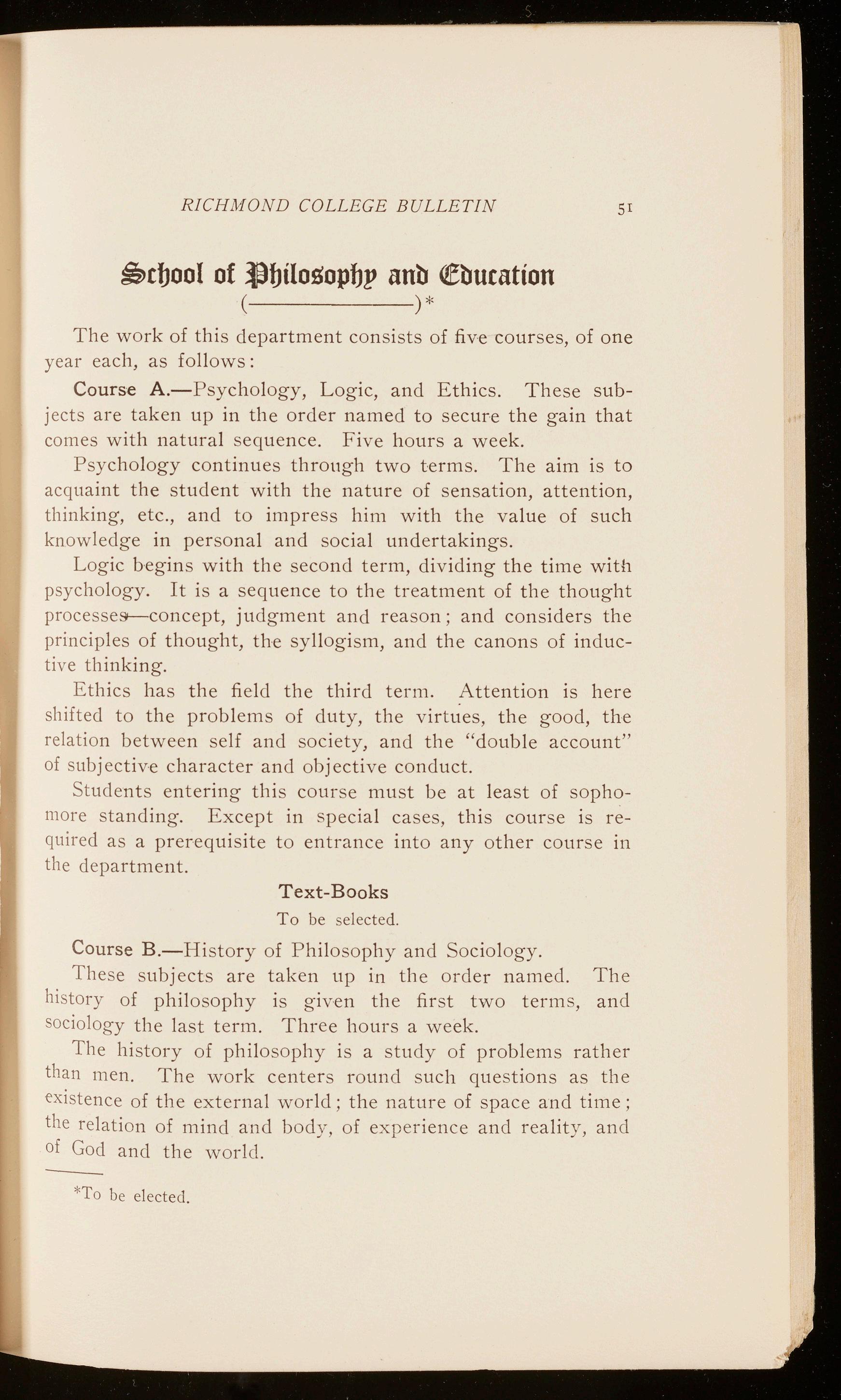
RICHMOND COLLEGE BULLETIN
The work of this department consists of five courses, of one year eac h , as follows:
Course A.- Psyc h o logy, Logic, and E thics. These subjects are taken up in th e o rder named to sec ur e the gain that comes wit h n at ur a l seque nce . F ive h ours a week.
Psycho logy continues through two terms. The aim is to acqua int the s tud e nt with the nature of sensat io n, attention, thinking, etc., and to impr ess him with the va lue of s uch know ledge in personal and socia l undertakings.
Logic begins with th e second term, dividing the tim e with psycho logy. It is a seq u ence to the treatment of th e thought processe9-- concept, ju dgment and reason; and considers the princ iples of thought, the sy ll ogism, and the canons of indu ctive thinking.
Et hics has th e field the third term. Atte nti on is here shifted to the problems of duty, the virt u es, the good, the relation between self and society, and the "doub le account" of subjec tive character and objective conduct.
Studen ts entering this course must be at least of sophomore sta nding. Except in s pecial cases, this course is required as a prerequisite to entrance into any other course in the department.
To be selec ted.
Course B.-History of Phi losop h y and Sociology. These subjects are taken up in the order named. The history of ph il osophy is given the first two terms, and sociology the last term. Three hours a week.
The history of phi losophy is a study of prob l ems rather than men. The work centers round such questions as the existence of the external world; the nature of space and t im e; the relation of mind and bod y, of experience and realit y, and of God and the world. -
*To be elected.
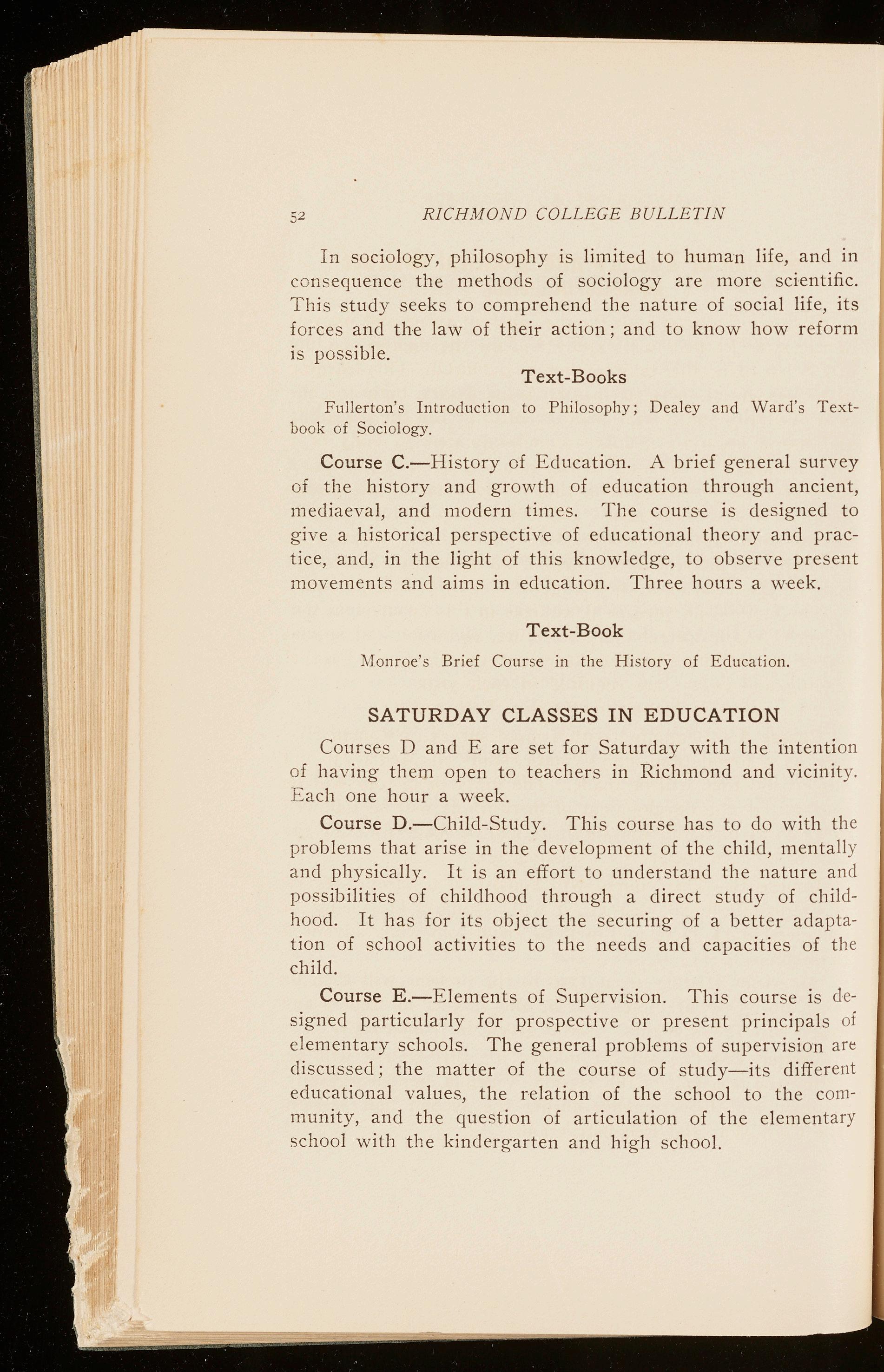
In sociology, philosophy is limited to human life, and in consequence the methods of sociology are more scientific. This study seeks to comprehend the nature of social life, its forces and the law of their action; and to know how reform 1s possible.
Text-Books
Fullerton's Introduction to Philosophy; Dealey and Ward's Textbook of Sociology.
Course C.-History of Education. A brief general survey of the history and growth of education through ancient, mediaeval, and modern times. The course is designed to give a historical perspective of educational theory and practice, and, in the light of this knowledge, to observe present movements and aims in education. Three hours a week.
Text-Book
Monroe's Brief Course in the History of Education.
Courses D and E are set for Saturday with the intenti on o f having them open to teachers in Richmond and vicinity. Each one hour a week.
Course D.-Child-Study. This course has to do with the problems that arise in the development of the child, mentall y and physically. It is an effort to understand the nature and possibilities of childhood through a direct study of childhood. It has for its object the securing of a better adaptation of school activities to the needs and capacities of the child.
Course E.-Elements of Supervision. This course is designed particularly for prospective or present principals of elementary schools. The general problems of supervision are discussed; the matter of the course of study-its differ ent educational values, the relation of the school to the community, and the question of articulation of the elementar y school with the kindergarten and high school.
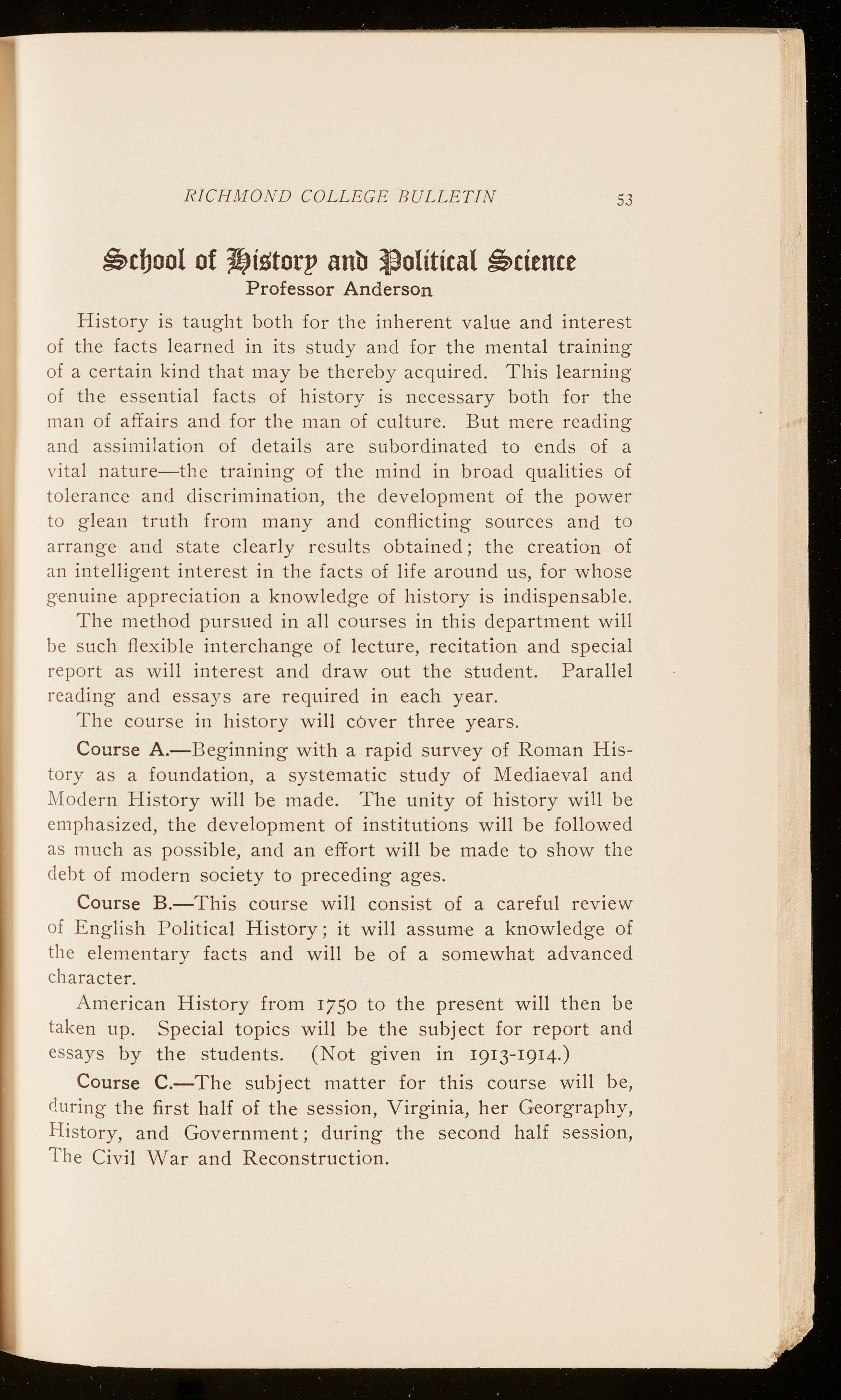
Professor Anderson
Hist o ry is taught both for the inherent value and interest of the facts learned in its study and for the mental training of a cert a in kind that may be thereby acquired. This learning of the essential facts of hi s tory is necessary both for the man o f affairs and for the man of culture. But mere reading and assimilation of detail s are subordinated to ends of a vita l nature-the training of the mind in broad qualities of tolerance and discrimination, the development of the powe r to glean truth from many and conflicting sources and t o arra nge and state clearly result s obtained; the creation of an intelligent interest in the facts of life around us, for whose genu ine appreciation a knowledge of hi s tory is indispensable .
The method pur s ued in all courses in this department will be s uch flexible interchange of lecture, recitation and special repo rt as will int erest and draw out the student. Parallel read ing and essa ys are required in each year.
The course in hi s tory will c6ver three years.
Course A.-Beginning with a rapid survey of Roman History as a foundation, a systematic study of Mediaeval and Mode rn History will be made. The unity of history will be emp hasized, the development of institutions will be followed as much as possible, and an effort will be made to show the deb t of modern society to preceding ages .
Course B.-This course will consist of a careful review of Eng lish Political History; it will assume a knowledge of the elementary facts and will be of a somewhat advanced characte r.
American History from 1750 to the present will then be take n up. Special topics will be the subject for report and essays by the students. (Not given in 1913-1914.)
Course C.-The subject matter for this course will be, duri ng the first half of the session, Virginia, her Georgraphy, Histo ry, and Government; during the second half session, The Civil Vvar and Reconstruction.
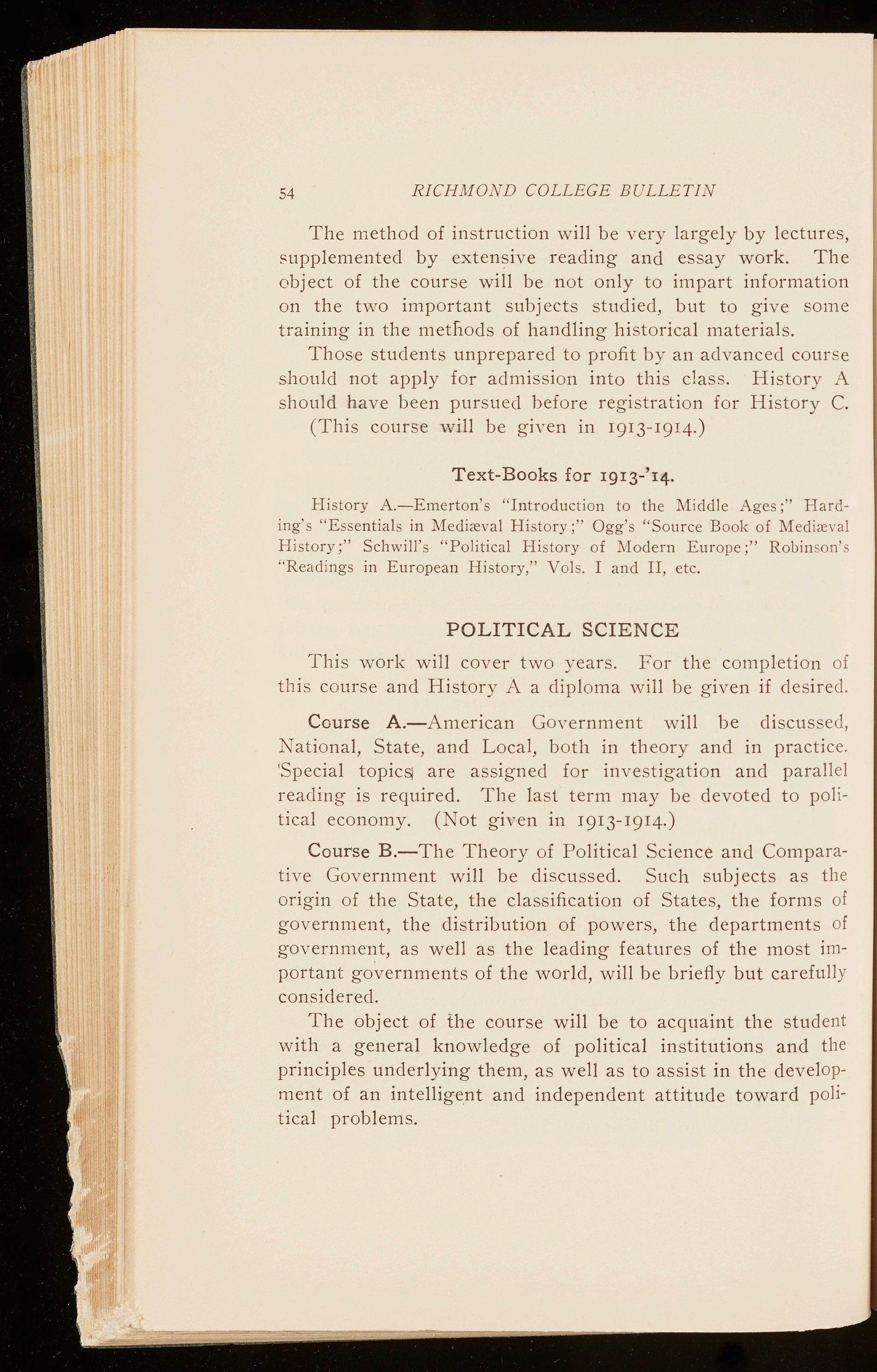
The method of instruction will be very largely by lectures, supplemented by extensive reading and essay work. The object of the course will be not only to impart information on the two important subjects studied, but to give some training in the metf10ds of handling hi sto rical materials. Those students unprepared to profit by an advanced course should not apply for admission into thi s class. History A shou ld have been pursued before registration for History C. (This course wjll be given in 1913-1914.)
Text-Books for 1913-'14.
History A.-Emerton's " Introduc tion to the Middle Ages;" Harding's "Essentials in Medi;:eval History;" Ogg's "Source Book of Medi;:eya) History;" Schwill's "Political History of Modern Europe;" Robin son's ''Readings in European History," Vol s. I and II, etc
This work will cover two years. For the completion of this course and History A a diploma will be given if desired.
Course A.-American Government will be discussed , National, State, and Local, both in theory and in practice 'Specia l topicsi are assigned for investigation and parallel reading is required. The la st term may be devoted to political economy. (Not given in 1913-1914.)
Course B.-The Theory of Political Science and Comparative Government will be discussed. Such subjects as the origin of the State, the classification of States, the forms of government, the distribution of powers, the departments of government, as well as the leading features of the most important governments of the world, will be briefly but carefully considered.
The object of the course will be to acquaint the student with a general knowledge of political institutions and the principles underlying them, as welI as to assist in the devel opment of an intelligent and independent attitude toward political problems.
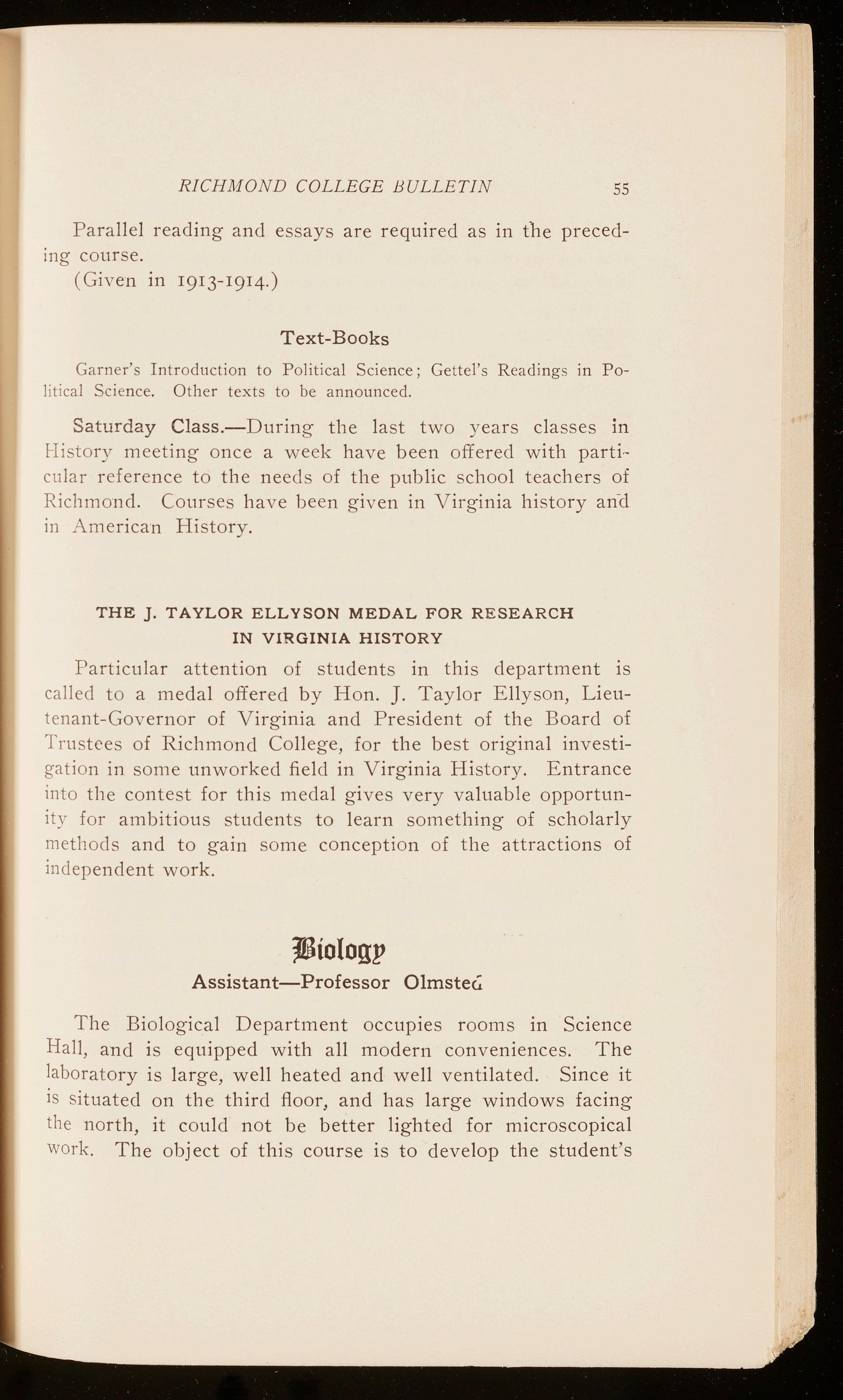
Parallel reading and essays are required as in the preceding course.
(Give n in 1913-1914.)
Garner's In troduction to Political Science; Gettel's Reading s in Politica l Scie n ce. Other text s to be announced.
Saturday Class.-During the last two yea rs classes in Histo r y meeting once a week ha ve been offered with particu lar reference to the need s of the public school teachers of Rich mond. Courses have been given in Virginia history an -cl in Ame rican History.
Partic ular attention of students in this department is called to a medal offered by Hon. J. Taylor Ellyson, Lieutena nt-Governor of Virginia and President of the Board of Trustees of Richmond College, for the best original investigat io n in some unwork e d field in Virginia History. Entrance into tl1e contest for thi s medal gives very valuable opportunity for ambitious students to learn something of scholarly methods and to gain so me conception of the attractions of independe nt work.
Assistant-Professor Olmstel
T he Biological Department occupies rooms in Science Hall, and is equipped with all modern conveniences The laboratory is large, well heated and well ventilated. Since it is situated on the third floor, and has large windows facing the north, it could not be better lighted for microscopical work. The object of this course is to develop the student's
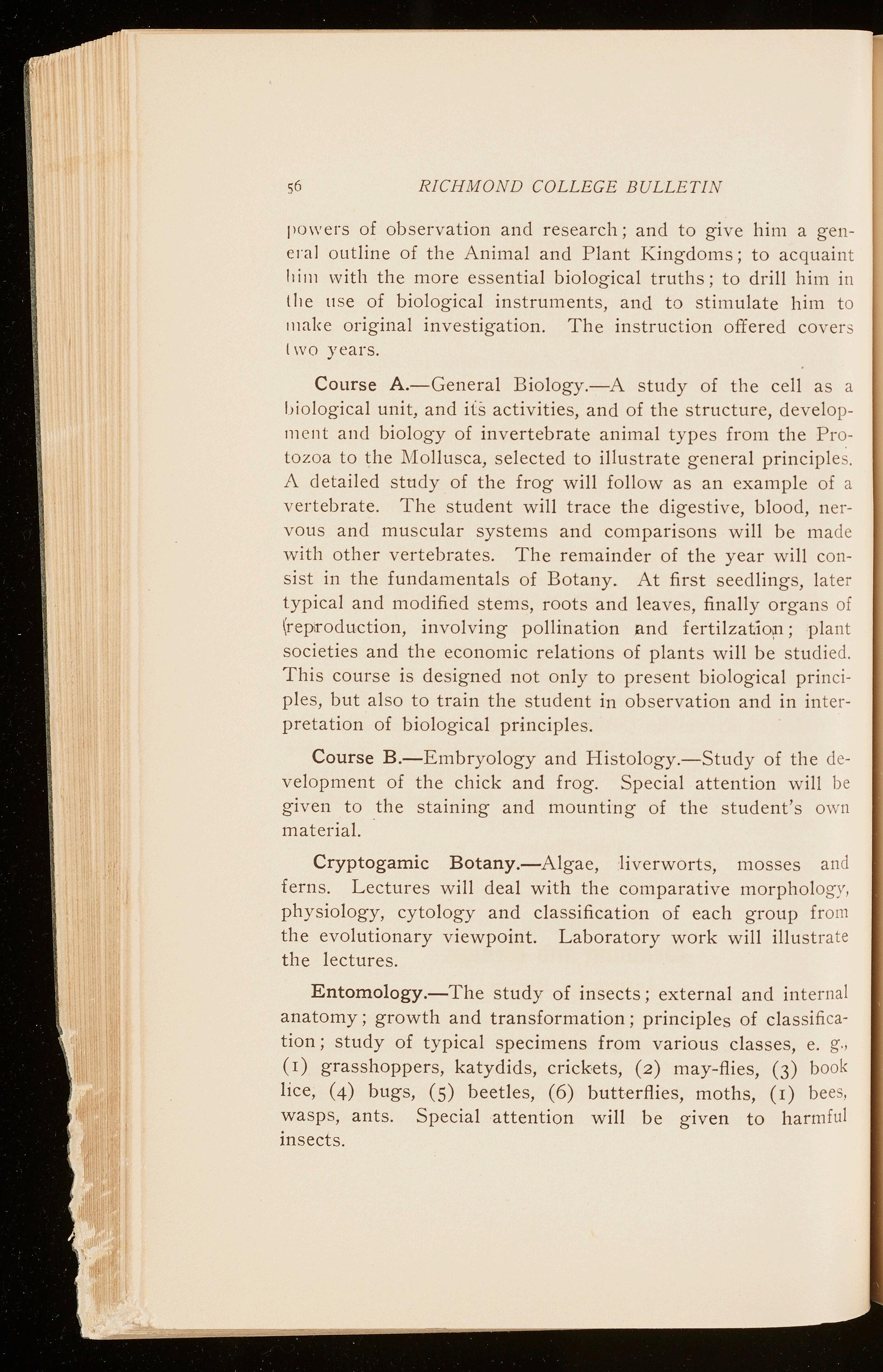
powers of observation and research; and to give him a g eneral outline of the Animal and Plant Kingdoms; to acquai nt l1illl with the more essential biological truths; to drill him in lite u se of biological instruments, and to stimulate him t o 111akeoriginal investigation. The instruction offered co ye rs I wo years.
Course A.-General Biology.-A study of the cell a s a liio logical unit, and its activities, and of the structure, devel opm e nt and biology of invertebrate animal types from the Pr otoz o a to the Mollusca, selected to illustrate general principl es. A detailed study of the frog will follow as an example of a vertebrate. The student will trace the digestive, blood, n ervous and mu s cular systems and comparisons will be ma de with other vertebrates. The remainder of the year will consi st in the fundamentals of Botany. At first seedlings, later typical and modified stems, roots and leaves, finally organ s of (rep,r o duction, involving pollination and fertilzatio:n; pl ant societies and the economic relations of plants will be studi ed. This course is designed not only to present biological prin ciples, but al so to train the student in observation and in in terpretation of biological principles.
Course B.-Embryology and Histology.-Study of the development of the chick and frog. Special attention will be given to the staining and mounting of the student's own material.
Cryptogamic Botany.-Algae, liverworts, mosses and ferns. Lectures will deal with the comparative morphol ogy, physiology, cytology and classification of each group fr om the evolutionary viewpoint. Laboratory work will illustr ate the lectures.
Entomology.-The study of insects; external and int ern al anatomy; growth and transformation; principles of clas sification; study of typical specimens from various classes, e. g., (1) grasshoppers, katydids, crickets, (2) may-flies, (3) b ook lice, (4) bugs, (5) beetles, (6) butterflies, moths, (1) b ees, wasps, ants. Special attention will be given to harm ful insects.
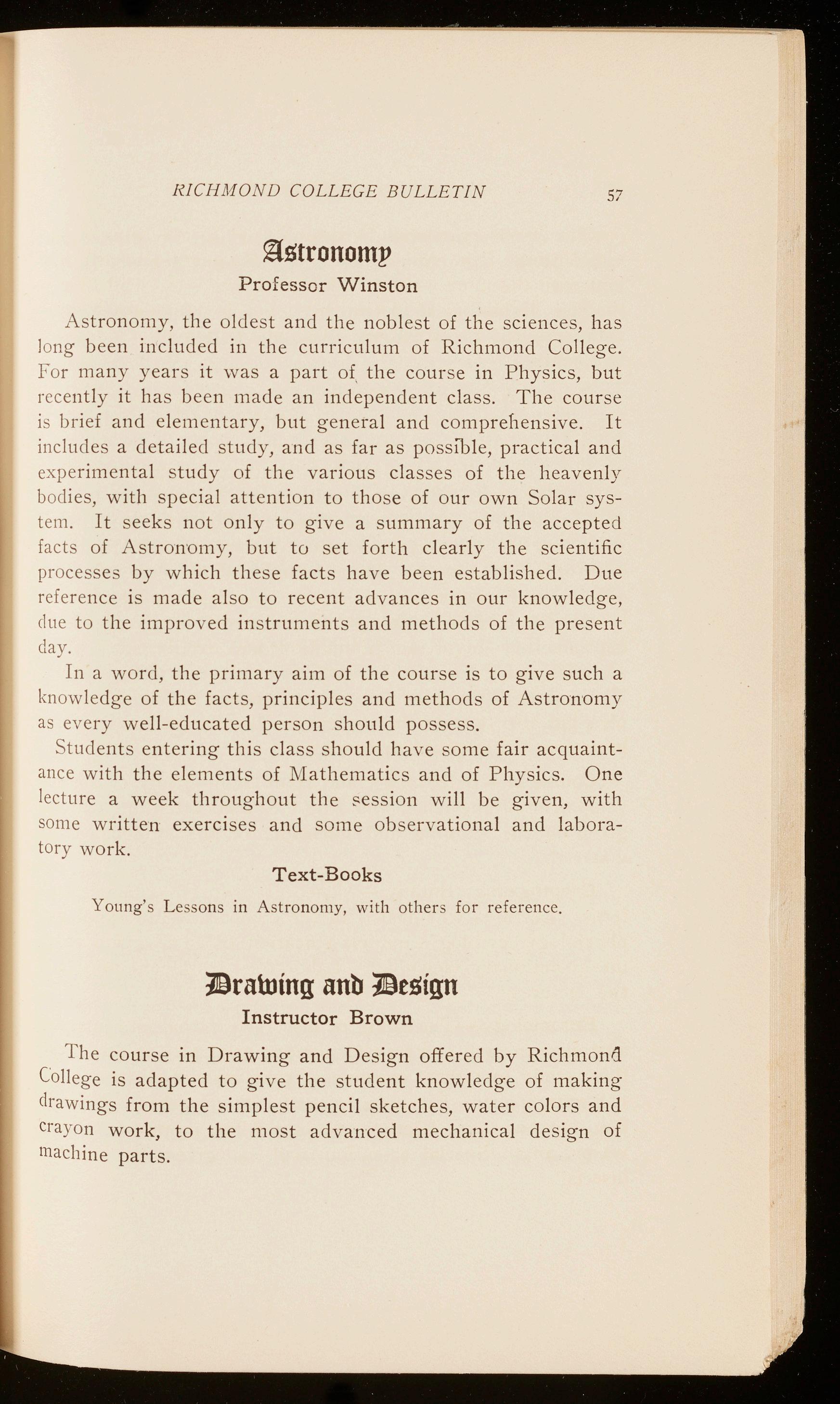
Professor Winston
Astronomy, the oldest and the noblest of the sciences, has long been included in the curriculum of Richmond College. For many years it was a part of the course in Physics, but recently it has been made an independent class. The course is brief and elementary, but general and comprehensive. It includes a detailed study, and as far as possible, practical and expe rimental study of the various clas ses of the heavenly bodies, with special attention to those of our own Solar system. It seeks not only to give a summary of the accepted facts of Astronomy, but to set forth clearly the scientific processes by which these facts have been established. Due reference is made also to recent advances in our knowledge, due to the improved instruments and methods of the present clay.
In a word, the primary aim of the course is to give such a knowledge of the facts, principles and methods of Astronomy as every well-educated person should possess.
Students entering this class should have some fair acquaintance with the elements of Mathematics and of Physics. One lecture a week throughout the session will be given, with some written exercises and some observational and laboratory work.
Young's Lessons in Astronomy, with others for reference.
Instructor Brown
The course in Drawing and Design offered by Richmond College is adapted to give the student knowledge of making drawings from the simplest pencil sketches, water colors and crayon work, to the most advanced mechanical design of machine parts.
The work completed in this department is granted full value at all the universities and technical schools in the country.
The Drawing Department occupies three rooms on the third floor of the main building. are equipped with modern drawing desks, each individual locker for the students.
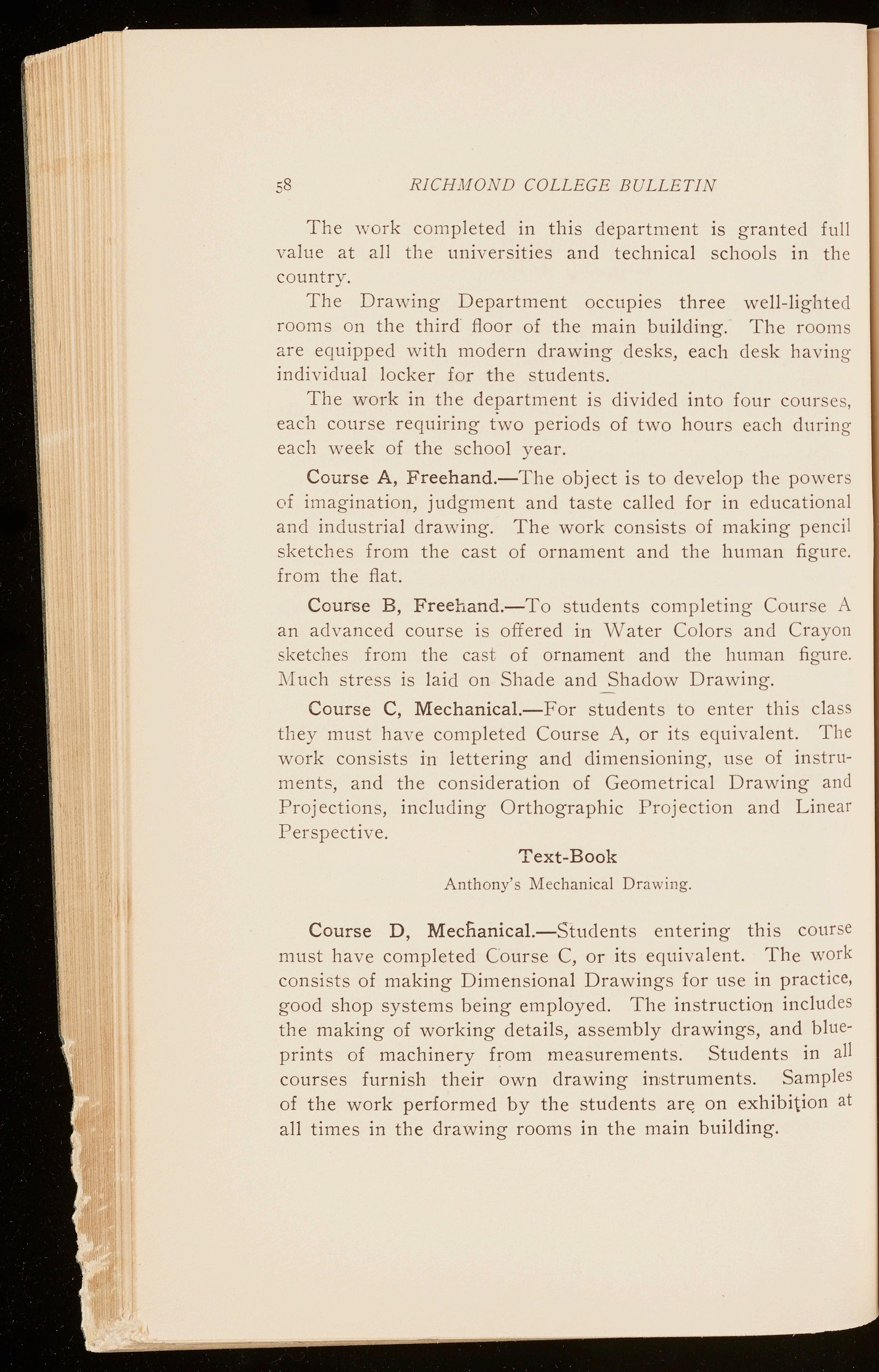
well-lighted The rooms desk having
The work in the department is divided into four course s, each course requiring t·wo periods of two hours each during each week of the school year.
Course A, Freehand.-The object is to develop the powers of imagination, judgment and taste called for in educational and industrial drawing. The work consists of making pencil sketches from the cast of ornament and the human figure. from the flat.
Course B, Freehand.-To students completing Course A an advanced course is offered in Water Colors and Crayon sketches from the cast of ornament and the human figure. l\Iuch stress is laid on Shade and _§hadow Drawing.
Course C, Mechanical.-For students to enter this class they must haYe completed Course A, or its equivalent. The work consists in lettering and dimensioning, use of instruments, and the consideration of Geometrical Drawing and Projections, including Orthographic Projection and Linear Perspective.
Text-Book
Anthony's Mechanical Drawing.
Course D, Mecfianical.-Students entering this cour se must have completed Course C, or its equivalent. The work consists of making Dimensional Drawings for use in practice, good shop systems being employed. The instruction includes the making of working details, assembly drawings, and blueprints of machinery from measurements. Students in all courses furnish their own drawing instruments. Samples of the work performed by the students an: on exhibition at all times in the drawing rooms in the main building.
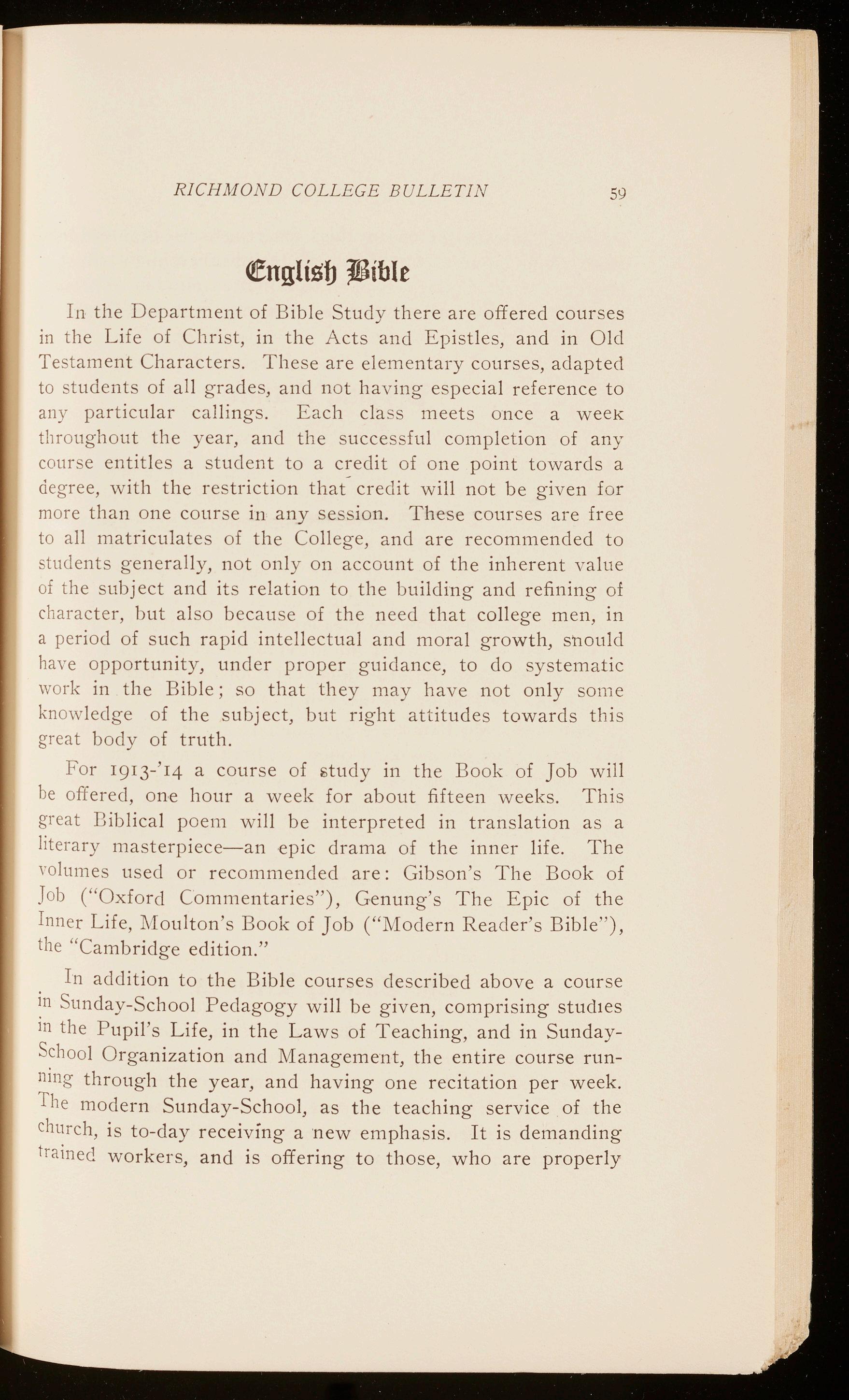
In the Departme nt of B ibl e Study there a re offered courses in the Life of Christ, in the Acts and Ep i st le s, and in Old Testament Characters. These are elementary courses, adapted to stude nts of a ll gra de s, and n o t ha ving espec ial ref ere nce to any particu lar callings. Each cla ss meets once a week throug hout the year, and the successfu l completion of any course ent it l es a studen t to a credit of one point towa rds a degree, with the restriction that - credit will not be given for more than one course in any sess io n. These cour ses are free to all mat ric ulates of th e Co ll ege, and are recommended to students gene r a ll y, not o nl y on accoun t of the inherent Yalue of the subject and it s rel atio n t o the building and refinin g of character, but also b ecause of the n eed that college men, in a perio d of s uch rapid intellectual and moral growth, shou ld have oppo rtunit y, under prope r guidance, to do systemat ic work in the Bible; so tha t they may have n ot only some knowledge of the subject, but right attit ude s towards this great body of truth.
For 1913-'14 a course of study in the Book of J ob will be offe red, one hour a week for about fifteen wee k s. This great Bibl ical poem will be int e rpr eted in translation as a literary masterpiece-an ep ic drama of th e inner life The Yolumes u sed o r rec ommended are: Gib so n 's The Book of Job ("Oxford Co mmentari es"), Genung's The Epic of the Inner Life, Moul t on's Book of J ob ("Modern Reader's Bible"), the "Ca mbridge edition."
In addition to the Bible courses described above a course in Sun da y -School Pedagogy will be given, comprising studies in the P upil's Life, in the Law s of Teaching, and in SundaySchool Orga nization and Management, the entire course running through the year, and having one recitation per week. The modern Sunday-School, as the teaching service of the church, is to-day receiving a new emphasis. It is demanding trained wo rk ers , and is offering to tho se, who are properly
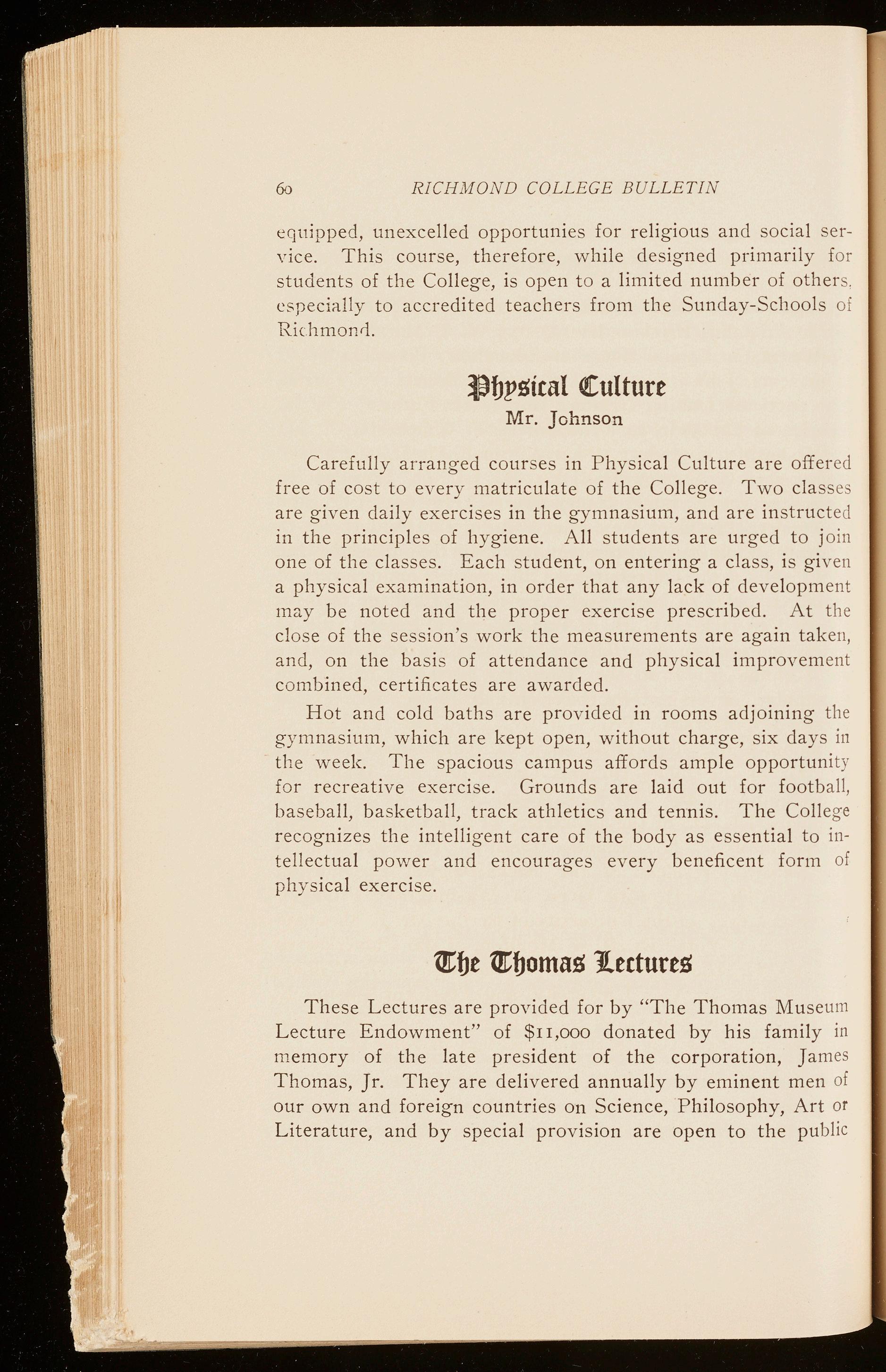
eqnipped, unexcelled opportunies for religious and social s erYice. This course, therefore, while designed primarily for students of the College, is open to a limited number of other s. especially to accredited teachers from the Sunday-Schools of Richmonrl.
Mr. Johnson
Carefully arranged cour s es in Physical Culture are offer ed free of cost to every matriculate of the College Two cla sses are given daily exercises in the gymnasium, and are instruct ed in the principles of hygiene. All students are urged to j oin one of the classes . Each student, on entering a class, is giv en a physical examination, in order that any lack of developme nt may be noted and the proper exercise prescribed. At t he cl o se of the session ' s work the measurements are again take n, and, on the basi s of attendance and physical improvem ent co mbined, certificates are awarded.
Hot and cold baths are provided in rooms adjoining t he gymnasium, which are kept open, without charge, six days in the week. The spacious campus affords ample opportuni ty for recreative exercise. Grounds are laid out for footb all, baseball, basketball, track athletics and tennis. The Colle ge recognizes the intelligent care of the body as essential to intellectual power and encourages every beneficent form of physical exercise.
These Lectures are provided for by "The Thomas Muse um Lecture Endowment" of $u,ooo donated by his family in memory of the late president of the corporation, J arn es Thomas, Jr. They are delivered annually by eminent men of our own and foreign countries on Science, Philosophy, Art or Literature, and by special provision are open to the publi c

6r
without charge. The following distinguished schol,us have delighted large audiences and greatly stimulated literary· and scientific research:
Charles A. Young, Ph. D., of Princeton; H. Newell Martin, Ph . D., of Johns Hopkins University; W. T. Harris, LL. D., Un ited States Commissioner of Education; President D. C. Gilman, of Johns Hopkins University; Robert Y. Tyrrell, Cn iv ersity of Dublin, Ireland; Horace H. Furness, Ph. D., LL. D., of Philadelphia; Professor C. T. ·winchester, A. M., of Wesleyan University; Albion W. Small, Ph.D., of Chicago Un iv ersity; G. Stanley Hall, Ph. D., LL. D., President of Cla rk University; James Henry Breasted, Ph. D., of Chicago Un iv ersity; President Woodrow Wilson, Ph. D., LL. D., of Pri nceton University; Pre s ident Benjamin Ide Wheeler, Ph. D. LL. D., of the University of California; Hamilton Wright Mabie, LL. D., of New York; Sir Robert Ball, of Oxford; He nry Van Dyke, LL. D., of Princeton; Mr. Lorado Taft, of Chicago; Professor Arlo Bates, of the Massachusetts Institute of Technology; Professor John B. Clarke, LL. D., o f Columbia University; Professor Josiah Royce, LL. D., of Ha rvard University; Professbr 'vV. P. Trent, Ph. D., ,of Columbia University; Professor B. L. Gildersleeve, Ph. D., LL. D., of the Johns Hopkins Univer sity; Mr. \i\/alter H. Page , editor of the "World's Work"; Professor H. Morse Step h e ns, LL. D., of the University of California; Dr. Bliss Pe rry, editor of "The Atlantic Monthly"; Professor Francis W. Kelsey, President of the Archaeological Institute cif America; Dr. J. Howard Gore, of 'vVashington; Professor Edo uard Meyer, of the University of Berlin; Mr. F. NI. Chapman, of New York; Dr. R. G. Moulton, of the University of Chicago; Dr. Harvey W. Wiley, of Washington; Dr. William Lyon Phelps, of Yale University, and President George E. Vince nt, of the University of Minnesota. Two courses of lecture s will be given on this foundation in 1913-'14.

W. S
.
McNEILL
Ph. D ., LL. D ., Professor of Law
,
JOHN RANDOLPH TUCKER, A B. , LL. B.
C M . CHICHEST E R , A. B. , LL. B.
A. B. , LL. B.
JOHN GARLAND POLLARD , LL B.
Lecturer on t he Vir g inia Code
The Law school, established in 187 , and continued with slight interruption till 1882, was in 1R90 firmly re-ec;tabli ·hcd. The location is eminently suited for combining practical with theoretical instruction, by reason of easy acce s to the numerous Courts-Federal, tate, ::\1unicipal-held in the city of Richmond, and the large and well-selected libraries-law and rniscellaneous--of the State and of th allege.
The aim of the school ic; to ground the student thoroughly in the fundamental principles of .\nglo- ,\mcrican Law, and, ::it the ame time, to train the mind in correct methods of le ~al reasoning. To these ends, all approved methods of instru ction are in use. Each teacher has the privilege of followin gthe bent of his own per;:,onality, so that some cour;;cs arc
*A special law catalog-uc i,; i,sucd in \ugu,t. Copic, will lie m~i i upon reque st.
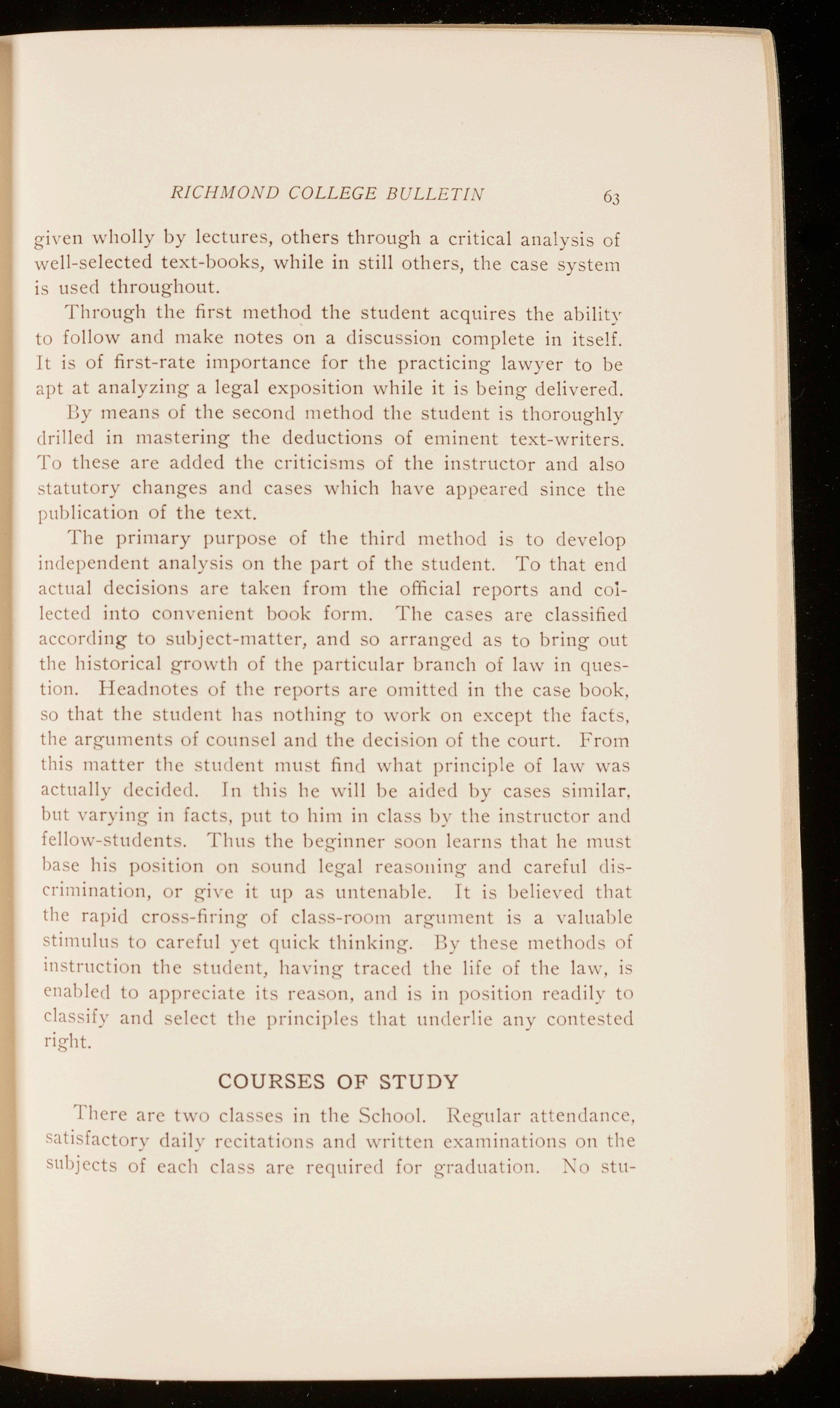
give n wholly by lecture s, others through a critical analysis of we ll-se lected text-book s, while in still others, the case system is used throughout.
Through the first method the student acquires the ability to follow and make notes o n a discus ion complete in it se lf. It is of first-rate importance for the practicing lawyer to be apt at analyzing a legal exposition while it is being delivered. By means of the second method the student is thoroughly drilled in mastering the deductions of eminent text-writers. To these arc acl<lcd the criticism of the in structor and also statuto ry change and cases which have ap1)eare<l since the publicat ion of the text.
The primary purpose of the third method is to develop independent analysis on the part of the tudent. To that encl actual cleci ions are taken from the officia l reports and coilcclcd into com·cnient book form. The cases are cla sified according lo subject-matter, and so arranged as to bring out the historical growth of the particular branch of law in question. IIcaclnolcs of the reports are omitted in the case book, so that the student has nothing to work on except the facts, the arguments of cou n se l and the decision of the court From this matter the student must find what principle of law was actually decided. In this he will be aided by cases similar, but varying in facts, put lo him in class by the in ·tructor ancl fellow-students. Thus the beginner soon learns that he must base his position on sound legal reaso11ing and carefu l discrimination, or gin it up as untenable. It is bclie\·ecl that the rapid cros-;-firing of class-room argument is a valuable , timulus to careful yet quick thinking. By these methods of instruction th student, ha\·ing traced the lif e of the law, is enablccl to appreciate its reason, and is in position readily to classify ancl select the principles that underlie any contested right.
There arc two classes in the chool. Regular attendance, satisfactory daily recitations and written examinations on the subject of each class arc required for gradualin11. :'.\o stu-
RJCHJIO.\'D COLLEGE BULLETI.
den t w ill be permitted t o e n te r t he e n io r la ·s w h o h a n ot completed sat isfactori ly t h e ,vor k of the Juni o r la , o r it equiyalent. Xo tu<lent may t a k e t h e wo rk o f bot h cla e · in one year. Each app licant for a<lm i - io n mu t g iYe evidence of fair genera l education.
The courses, diYided according to cla - e., are a - fo ll ow-;:
Junior Cla ss
I. Personal Property, including \\'ills and _.\dmini~tration, Bailment and Carrier,.
2 Domestic Relati o n,.
3. Criminal Law.
4. Contract,.
5. Tort
6. Xegotiable ln,trumen, .
<teour.~
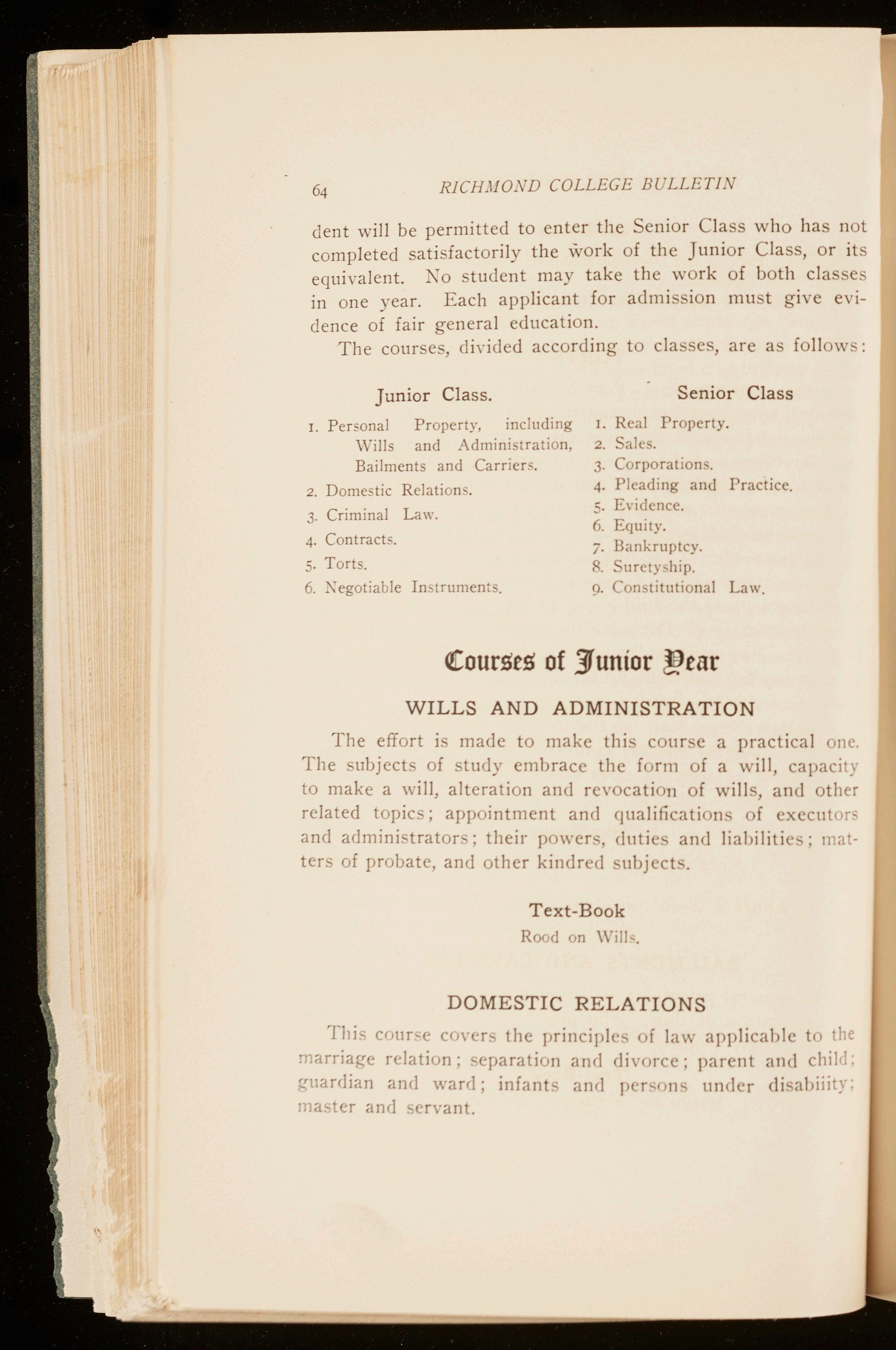
Senior C las s
I. Real Property.
2. Saks.
3. Corporation ..
4. Plc:ading and Practice.
5. E, idcncc.
6. Equity.
7. Bankruptcy.
R urcty,hip.
!:). Con titutional Law.
The effort i made to make this cour e a pract ical one. The subjects of tudy embrace the form of a w il l, capaci y to make a will, alteration and reYocat ion of wills, and other related topic:,; appointment and qualifications of ·xccutorand admini. trator:-; their powers, duties and lial,ilitie-;; ma· ters of probate, and other kindred subjects.
Te x t -Bo ok
Ro od ,,n \\'ill
Thi- cr1ur,e UJ\ Lr'-' the principks of law applical>l tn he marriage relatiCJn; '-eparatirm and di,·circc; par nt and child; ,!Uardian and ward; infants and pn-.,m under disaliiiit y; ma ter and c:rvant.
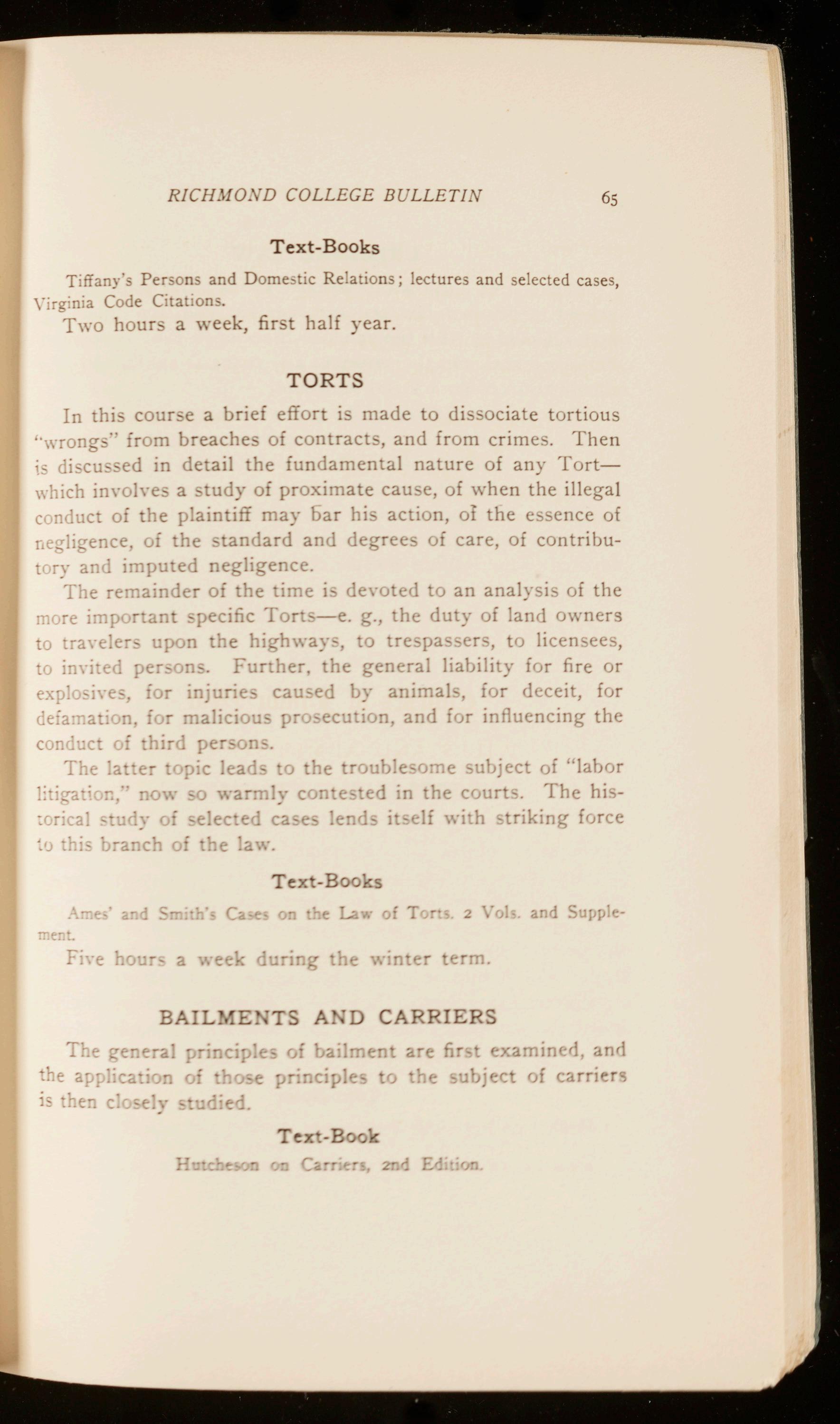
Tiffany'· Person· and D ome, tic Re ations; lectures and selec ted case s, \'irgima Code Citat on ..
Two hour a week, fir t half year.
In thi · cour e a brief effort i made to di oc iate tortious "wron,,.::," ir m b reache - oi contract::,, and from crime·. Then l' di CU::,::,edin deta il the fundamen al nature o f any Tortwhich im·olve::, a _tudy of proximate cau e, of when the ill ega l conduc oi he p aintiff may ba r hi action, of the c cncc of ne'.!ii~ence, oi ·he , andar<l and de• 1 ree of care, oi contrilmt ry an · impu·ed nerrli,,.ence.
The re nain er oi he ·ime i de\·O d to an analy i of the m< • · · - • r -e. "'·, he duty of land owners
ex ne < ei iou con ·uc· way,, ·o re,pa er,, t o liccn cc , 1er, the en ral liabili y for fire or cau ed uy animal , for deceit, for • ro ecu ion, and for intluencing the me t of "labor he . The hiiking force :aw.
a d of T 2 "ol a d Sup..,le-
Fi ·e hou - a ee vin r erm.
TeT.t-Boo
Ca· ; , d Ed o examm d, and of carrii-r
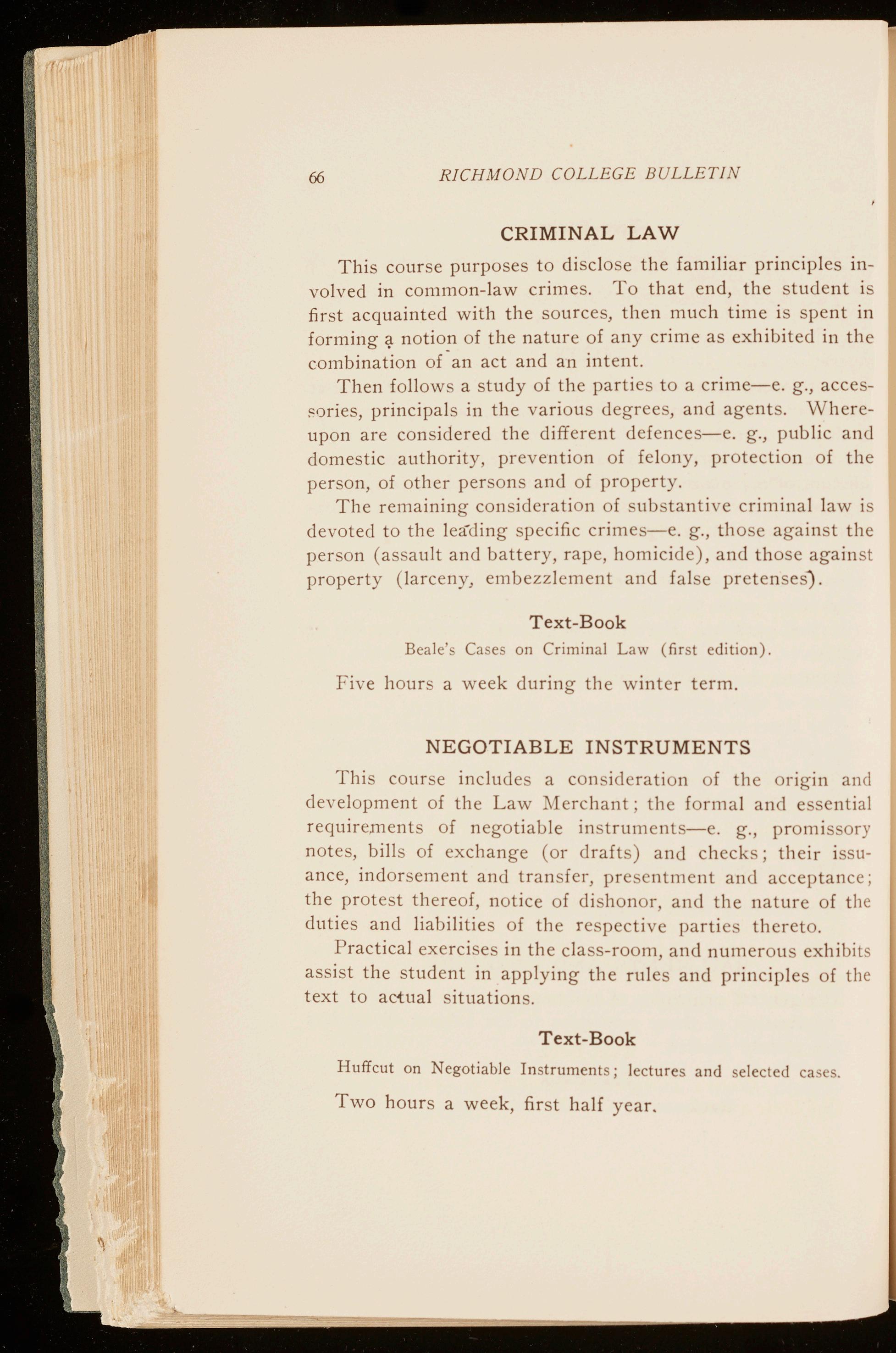
T h is course purposes to disclo e t h e fam ili a r p rin cip les involved in common- law crimes. To that end, the student is first acquainted with the sources, then much time i spent in forming c/.notion of the nature of any crime as exh i bited in the comb ination o(an act and an intent.
Then follows a study of the partie to a crime-e. g., acce~•)ries, principals in the variou degree , and agent . \Vhereupon are con ide r ed the different defences-e. g., pub lic and domestic authority, prevention of fe lony, protect ion of the person, of other person and of property.
The remaining con ideration of ubstantiYe crimina l law i devoted to the leading pecific crime ·-e. g., tho e again t the person (a ault and battery, rape, homicide), and those again t property (larceny, embezzlement and fa! e pre ten es").
Text -Book
Beal e' Ca e on Criminal Law (first edition)
Five hours a week during the winter term.
Thi cour e include a consideration of the origin and cleYelopment of the Law l\1erchant; the formal and e ential requirements of negotiable instruments-e. g., promi ory note , bill of exchange (or drafts) and checks; their is uance, inclorsement and transfer, pr entment and acceptance ; the protest thereof, notice of di honor, and the nature of the d u ties and liabi lities of the r e pective parties thereto.
Practica l exercises in the cla -room, and numer u exhibit assist the student in applying the rules and principle of the text to actual situations.
Text-Book
Huffcut on Negotiable Instrument ; lectures and selected cases
Two hours a week, first half year.
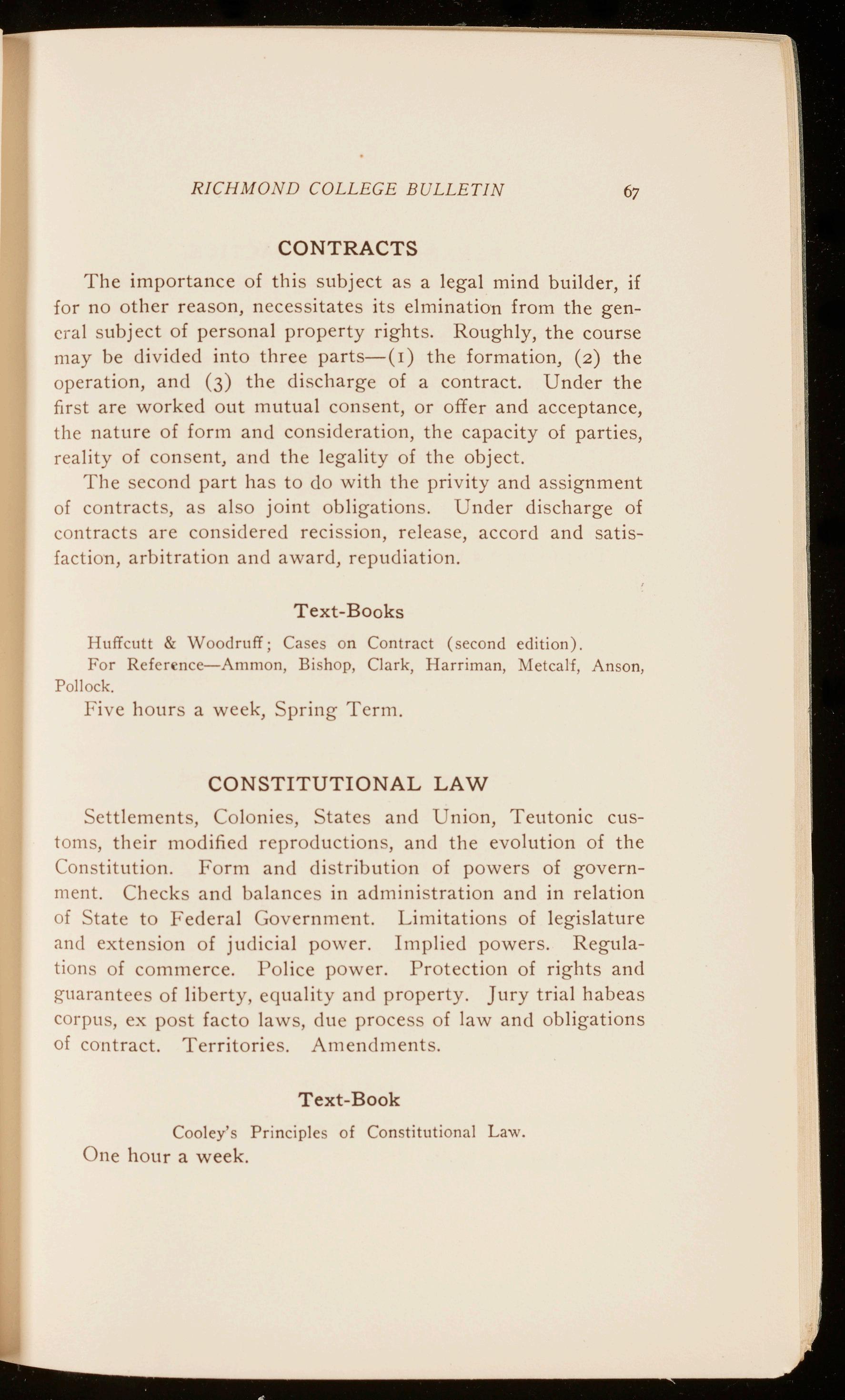
The importance of th is subject as a legal mind builder, if for no other reason, necessitates its el mination from the general subject of persona l property rights. Roughly, the course may be divided into three parts-(1) the formation, (2) the ope ration, and (3) the discharge of a contract. Under the first are worked out mutua l consent, or offer and acceptance, the nature of form and consideration, the capacity of parties, reality of consent, and the legality of the object.
The second part has to do with the privity and assignment of contracts, as also joint obligations. Under discharge of contracts are considered recission, release, accord and satisfaction, arbitration and award, repudiation.
Te xt- Bo oks
Huffcutt & Woodruff; Cases on Contract (second edition). For Reference-Ammon , Bish op, Clark, Harriman , Metcalf, Anson, Pollock.
Five hours a week, Spring Term.
Settlements, Colonies, States and Union, Teutonic customs, their modified reproductions, and the evolution of the Cons titution. Form and distribution of powers of government. Checks and balances in administration and in relation of State to Federa l Government. Limitations of legislature and extension of judicial power . Implied powers. Regulations of commerce . Police power. Protection of rights and guara ntees of liberty, equality and property. Jury trial habeas corpus, ex post facto laws, due process of law and obligations of contract. Territories. Amendments.
Te x t -Book
Cooley's Principles of Constitutional Law. One hour a week.
Complaints, parties, jurisdiction, form and institution of suit. Issues, pleadings and trial, exceptions, instruction s, judgment its arrest and suspension. Writs of error and p erfection of record for appellate review . Execution, Forthco ming and delivery bonds. Mandamus, prohibition, que w arranto, h abeas corpus , commin-law practice and statutory mo dification s. Form s and practical example s.
Text-Book
Shipman 's Comm on L aw Pl eading
Thr ee hours a week.

Thi s cour s e b egin s with an introduct o ry study of th e nature of real property and an examination of th e feudal sy st em, so far as it ha s affected the law of real property The ri ghts a rising fr o m the o wnership of land are th o roughly devel oped by a study of the text and selected case s . Emph as is is pl aced on the fact that the law is an expre ss ion of the will of hu man s o ciety, and changes t o meet it s needs; and an attempt is made to enable the s tudent not merely to appreciate the hist orical <levelopment of a doctrine, but, also, from practical exam ples to learn the human need calling for the change. Thi s course embraces the nature and origin of real property, the th eoty of estates, their classification and development, the equit able ownership of land, the rights of enjoyment incident to o wne rship, the rights to dispose of Tand not based on ownershi p, t he transfer of rights in land, both inter vivos, and by will and the subject of liens.
Text-Book
Minor on Real Property, 2 Vols.
Two hours a week.
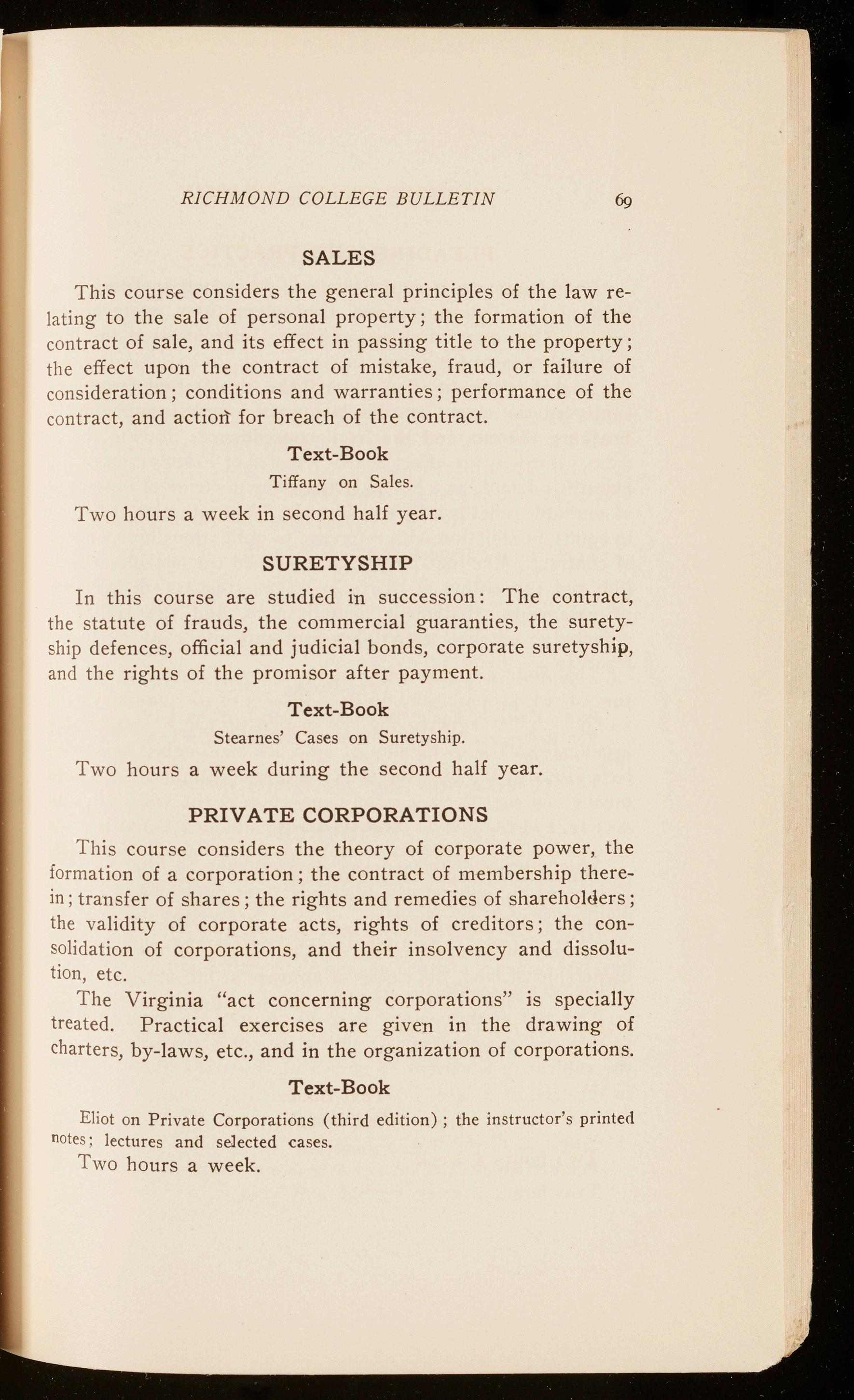
T his course co nsiders the general principles of the law relating to the sale of personal property; the formation of the cont ract of sale, and its effect in passing title to the property; the effect upon the contract of mistake, fraud, or failure of consid eration; conditions and warranties; performance of the cont r a ct, and actiotl for breach of the contract.
Text-Book
Tiffany on Sales.
Two h ours a week in second half year.
In thi s course are studied in succession: The contract, the sta tute of frauds, the commercial guaranties, the suretyship de fences, official and judicial bonds, corporate suretyship, and th e rights of the promisor after payment .
Text-Book
Stearne s' Cases on Suretyship.
Two h ours a week during the second half year.
Th i s cour s e considers the theory of corporate power, the format ion of a corporation; the contract of membership therein; trans fer of shares; the rights and remedies of shareholders; the val idit y of corporate acts, rights of creditors; the consolidatio n of corporations, and their insolvency and dissolution, et c.
The Virginia "act concerning corporations" is specially treated. Practical exercises are given in the drawing of charters, by-laws, etc , and in the organization of corporations.
Text-Book
Eliot on Private Corporations (third edition); the in struct or 's printed notes; lecture s and selected cases.
Two hours a week.
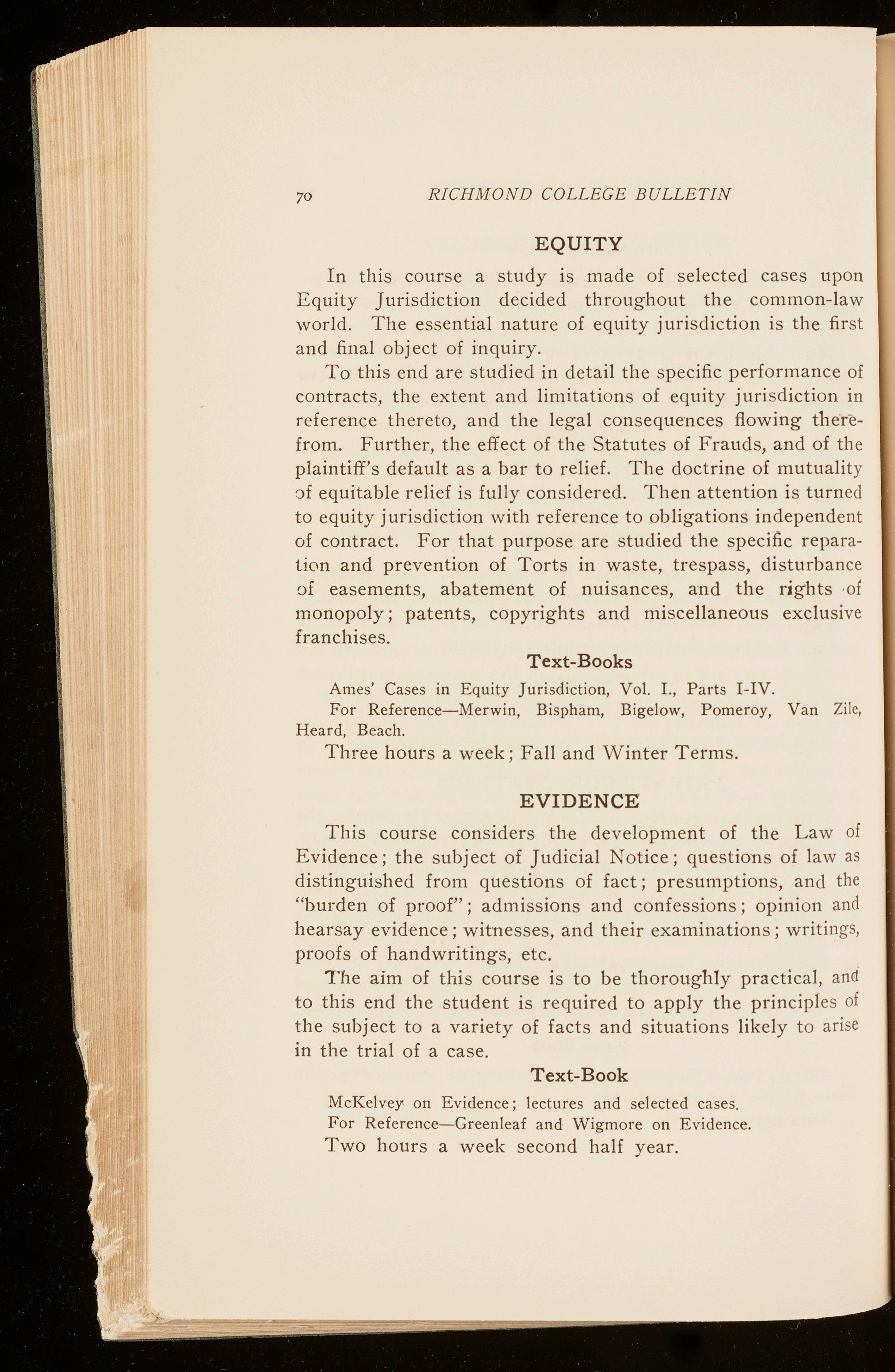
In this course a study is made of selected cases upon Equity Jurisdiction decided throughout the common-law world. The essential nature of equity jurisdiction is the first and final object of inquiry.
To this end are studied in detail the specific performance of contracts, the extent and limitations of equity jurisdiction in reference thereto, and the legal consequences flowing therefrom. Further, the effect of the Statutes of Frauds, and of the plaintiff's default as a bar to relief. The doctrine of mutuality 81 equitable relief is fully considered. Then attention is turned to equity jurisdiction with reference to obligations independent of contract. For that purpose are studied the specific reparation and prevention of Torts in waste, trespass, disturbance of easements, abatement of nuisances, and the rights •of monopoly; patents, copyrights and miscellaneous exclusive franchises.
Text-Books
Ames' Cases in Equity Jurisdiction, Vol. I., Parts I-IV.
For Reference-Merwin, Bispham, Bigelow, Pomeroy, Van Zile, Heard, Beach.
Three hours a week; Fall and Winter Terms.
This course considers the development of the Law of Evidence; the subject of Judicial Notice; questions of law as distinguished from questions of fact; presumptions, and the "burden of proof"; admissions and confessions; opinion and hearsay evidence; witnesses, and their examinations; writin gs, proofs of handwritings, etc.
The aim of this course is to be thoroughly practical, and to this end the student is required to apply the principl es of the subject to a variety of facts and situations likely to arise in the trial of a case.
Text-Book
McKelvey, on Evidence; lectures and selected cases.
For Reference-Greenleaf and Wigmore on Evidence.
Two hours a week second half year.

First, a brief review is made of all the statutes of bankruptcy in England and the United States, showing the gradual evolution from insolvency to bankruptcy conceptions.
Then the American act of 1898, with subsequent amendments, is taken up in detail. The various provisions are worke d out in the light of actual decisions, with especial reference to the respective jurisdictions of the United States and the seve ral States; what are acts of bankruptcy ; what property passes to the trustee; who may be a bankrupt; how he is protected, exempted and discharged.
Willisto n' s Cases on Bankruptcy.
For Reference-Brandenburg, Ea st man, Collier, Loveland. Th ree hours a week, Spring Term.
The Faculty reserves the right to rearrange subjects between classes, and to change text-books, as may be deemed beneficial to the school.
Every student is expected to attend all sessions of the class of whic h he is a member, and to be prepared whenever called upon to rcite upon the matter assigned. A record of such attenda nce and class recitation is kept, and is taken into consideratio n in awarding prizes and diplomas.
Stude nts are advised personally to take notes of all lectures, and carefully to study the authorities and important cases, to which frequent reference is made during the course of instruct ion. Such investigations may be made either in the law library of the school, or in the Supreme Court Library, to whic h students have full access.
The Professional Degree of Bachelor of Laws (LL. B.) is conferred by the Trustees on recommendation from the Facu lty. This degree cannot be given either in course or as an honorary degree.
For Bachelor of Laws is required graduation on all subjects included in the Law School, with proficiency in gener al education.
Students who complete the required work in any subje ct are awarded certificates of proficiency in that subject, and a re not required to study the subject again in order to win th e degree of Bachelor of Laws.
All candidates for degree s are expected to present themselve s at the closing exercises of the College Commencemen t, at which time degree s are conferred. It is the custom of t he graduating class to wear the Oxford cap and gown on th is occasion
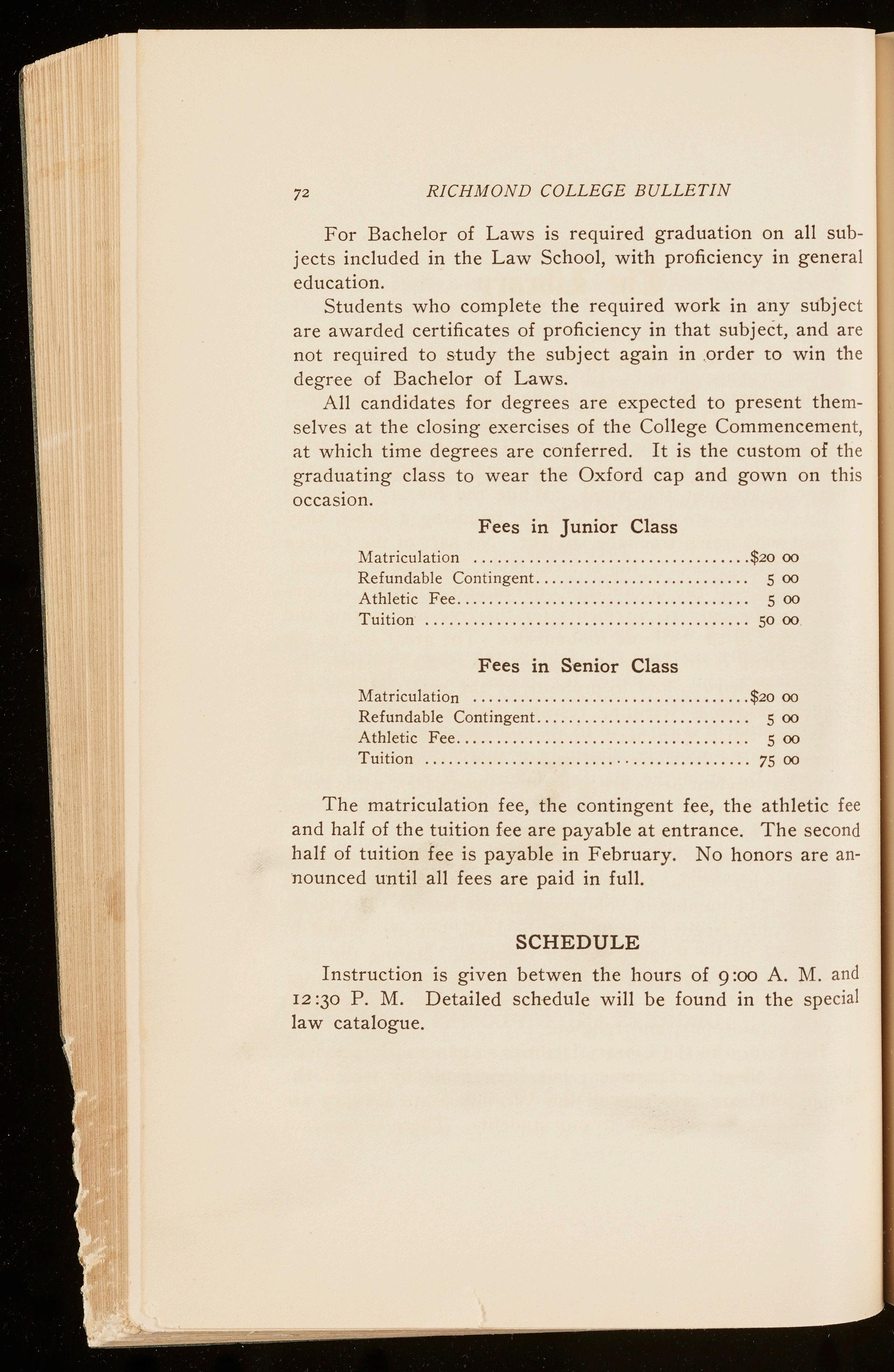
Matriculation
Refundable Contingent.
The matriculation fee, the contingent fee, the athletic fee and half of the tuition fee are payable at entrance. The sec ond half of tuition fee is payable in February. No honors are ann o unced until all fees are paid in full.
Instruction is given betwen the hours of 9 :oo A. M. and 12 :30 P. M. Detailed schedule will be found in the sp ecial law catalogue.
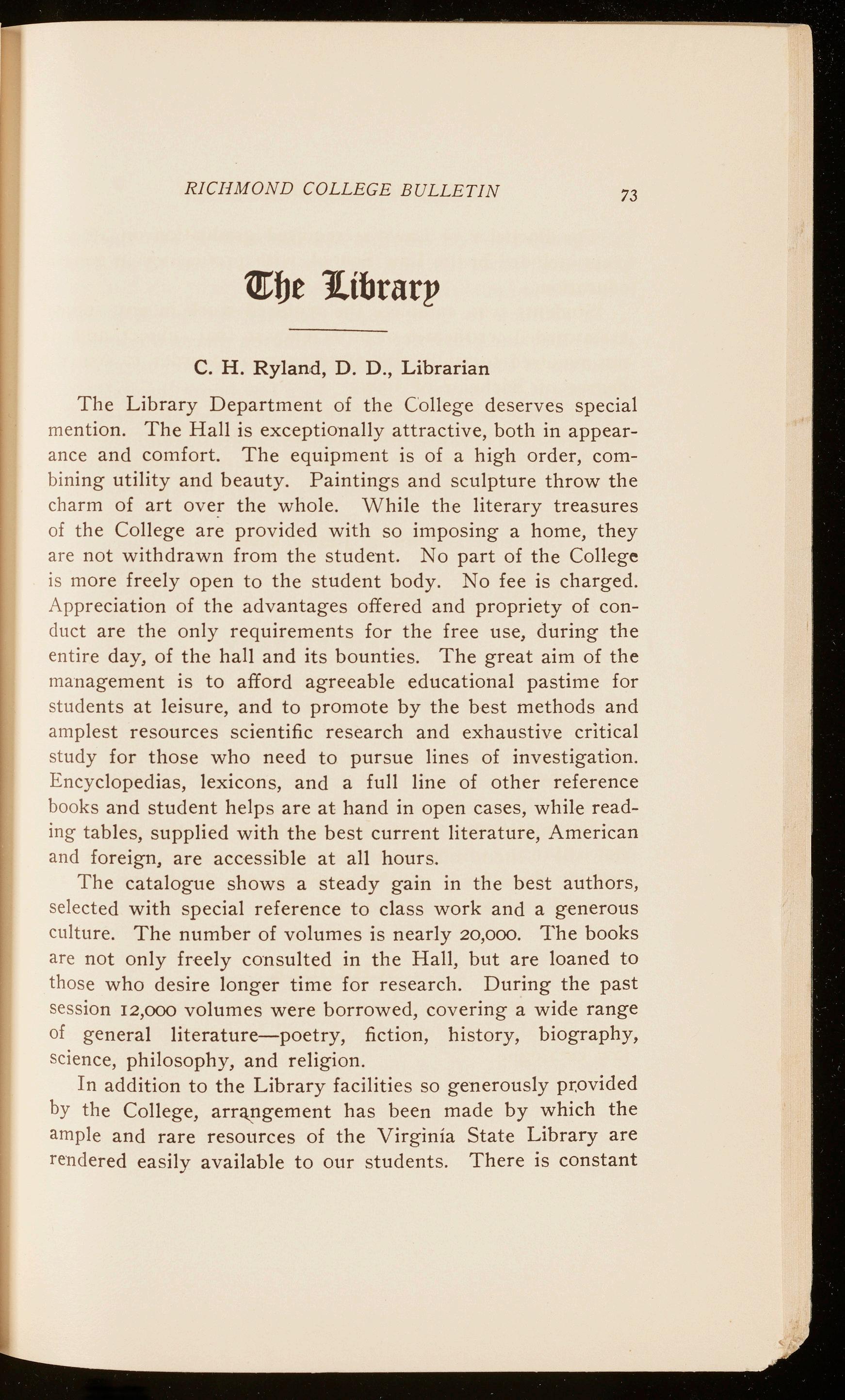
The Library Department of the College deserves special mention. The Hall is exceptionally attractive, both in appearance and comfort. The equipment is of a high order, combini ng utility and beauty. Paintings and sculpture throw the cha rm of art over the whole. While the literary treasures of t he College are provided with so imposing a home, they are not withdrawn from the student . No part of the College is more freely open to the student body. No fee is charged . Appre ciation of the advantages offered and propriety of conduct are the only requirements for the free use, during the entire day, of the hal! and its bounties . The great aim of the manag ement is to afford agreeable educational pastime for stude nts at leisure, and to promote by the best methods and amp lest resources scientific research and exhaustive critical study for those who need to pursue lines of investigation. Ency clopedias, lexicons, and a full line of other reference books and student helps are at hand in open cases, while reading tables, supplied with the best current literature, American and foreign, are accessible at all hours.
The catalogue shows a steady gain in the best authors, selecte d with special reference to class work and a generous cultu re. The number of volumes is nearly 20,000. The books are not only freely consulted in the Hall, but are loaned to those who desire longer time for research. During the past sessio n 12,000 volumes were borrowed, covering a wide range of general literature-poetry, fiction, history, biography, science , philosophy, and religion.
In addition to the Library facilities so generously pr,ovided by the College, arr~gement has been made by which the ample and rare resources of the Virginia State Library are rende red easily available to our students. There is constant

corre·pondence between the two institution , and the tate Librarian, Dr. . Icllwaine, ha- proYed a iriend to all young men who are pur·uing line- oi research.
In addition to these ample iacilities, it· ·hould be mentioned that ou r proximity to \\·a hington place - the immen e resources of the Congre ional Library at he command of t e student oi Richmond College. In a few hour· the Reierence Librarian can ecure book- that can be found no where el·e. For these and debate-, thi adYantage i- inYaiuable.
The Library i clas ified and catalogued according to the Dewey sy·tem. The catalogue wa made by an expert and afford easy acces to enry YOiume upon tlie sheh·e-.
Th Librarian and hi- a -i tant- are in attendance from 9 :oo o'clock A . . I. to 9 :oo P. ;\1. to in truct the -tudent in the use of the catal ogue and to afford him e,·ery help in reading and resea r ch.
The Law Library occupie- a room to i self adjoining the main lecture room of the Law Department. The Library c ntains the Yaluable collection of law book owned by the late Hon. Henry Heaton, of Loudoun county and donated to the College by his i ter, ;\Ir-. Harriet I. Purcell. On thi- ioundation of the mo t appro,·ed and Yalua61e work- on law, the College is building by yearly acce -ion of Yaiuable Report · from the General and tate GoYernmenL, and all nece--ary Current ;,,lagazine . tudent in the Law Department are giYen free acce to the Law Library of the Colleg-e and the Library of the tate of \-iro-inia, and oi the ta e Court- .
The College Library and Readino- Room are no only cientific and literary in their equipment, but contribute freely to the religi ou life of the Colleo-e. ix reiio-iou: monthlies and quarterlies, with tweiYe of the be-t weeklie-, are laid eYery day before the tudent. A fine line of book- on the Yanous pha e of missionary life and work ha- been catalogued.
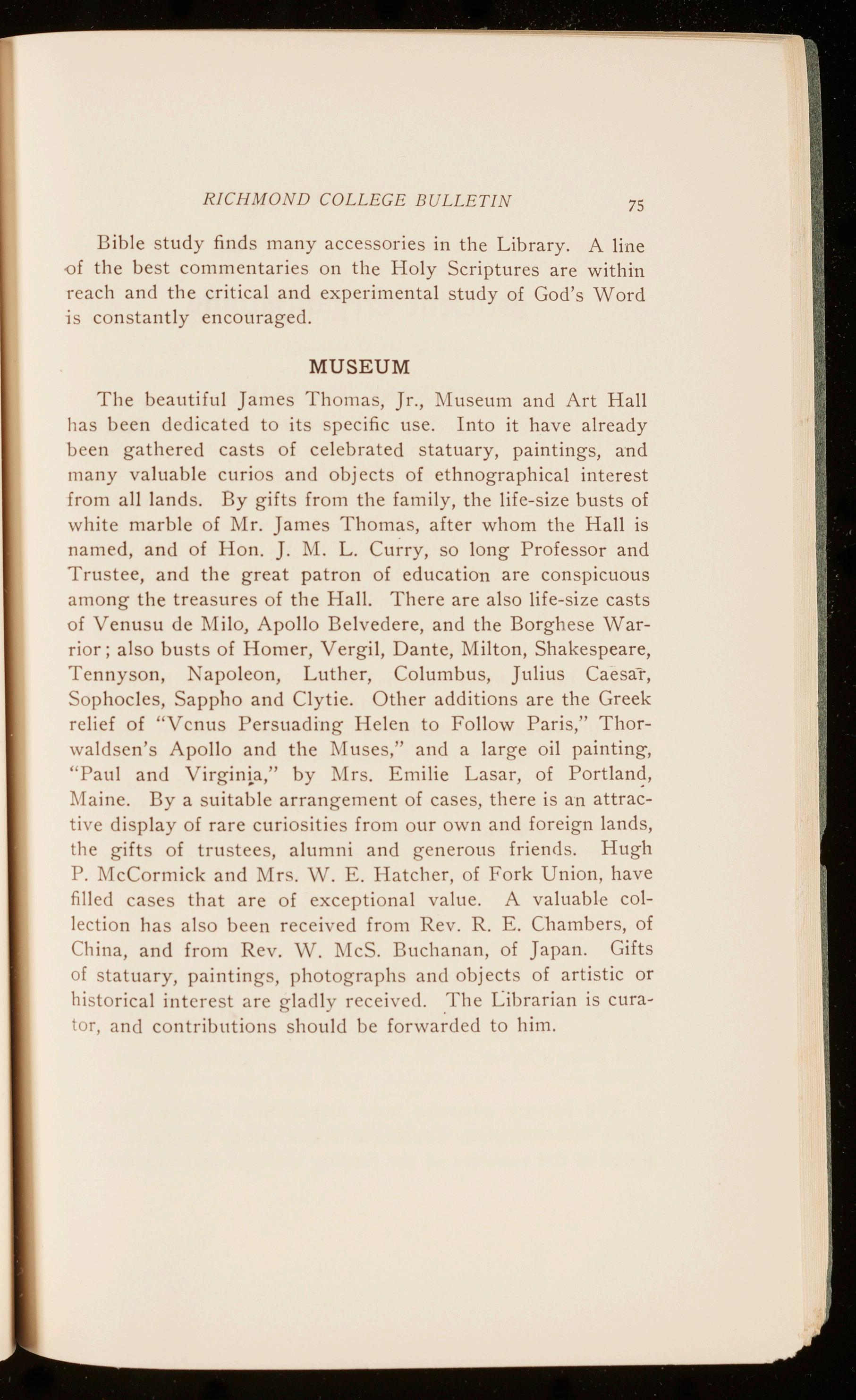
Bible study finds many accessories in the Library. A line {)f the best commentaries on the Holy Scriptures are within reach and the critical and experimental study of God's Word is constantly encouraged.
The beautiful James Thomas, Jr., Museum and Art Hall has been dedicated to its specific use. Into it have already been gathered casts of celebrated statuary, paintings, and many valuab le curios and objects of ethnographical interest from all lands. By gifts from the family, the life-size busts of white marble of Mr. James Thomas, after whom the Hall is named, and of Hon. J. M. L. Curry, so long Professor and Trustee, and the great patron of education are conspicuous among the treasures of the Hall. There are also life-size casts of Venusu de Milo, Apollo Belvedere, and the Borghese Warrior; also busts of Homer, Vergil, Dante, Milton, Shakespeare, Tennyson, Tapoleon, Luther, Columbus, Julius Caesar, Sophocles, Sappho and Clytie. Other additions are the Greek relief of "V cnus Persuading Helen to Follow Paris," Thorwaldscn's Apollo and the l\1 uses," and a large oil painting, " Paul and Virginia," by Mrs. Emilie Lasar, of Portlan1, Maine. By a suitable arrangement of cases, there is an attracti v e display of rare curiosities from our own and foreign lands, the gifts of trustees, alumni and generous friends. Hugh P. McCormick and Mrs. W. E. Hatcher, of Fork Union, have filled cases that are of exceptional value. A valuable collection has also been received from Rev. R. E. Chambers, of China, and from Rev. W. McS. Buchanan, of Japan. Gifts o f statuary, paintings, photographs and objects of artistic or hi storical interest are gladly received. The Librarian is curato r , and contributions should be forwa~clecl to him.
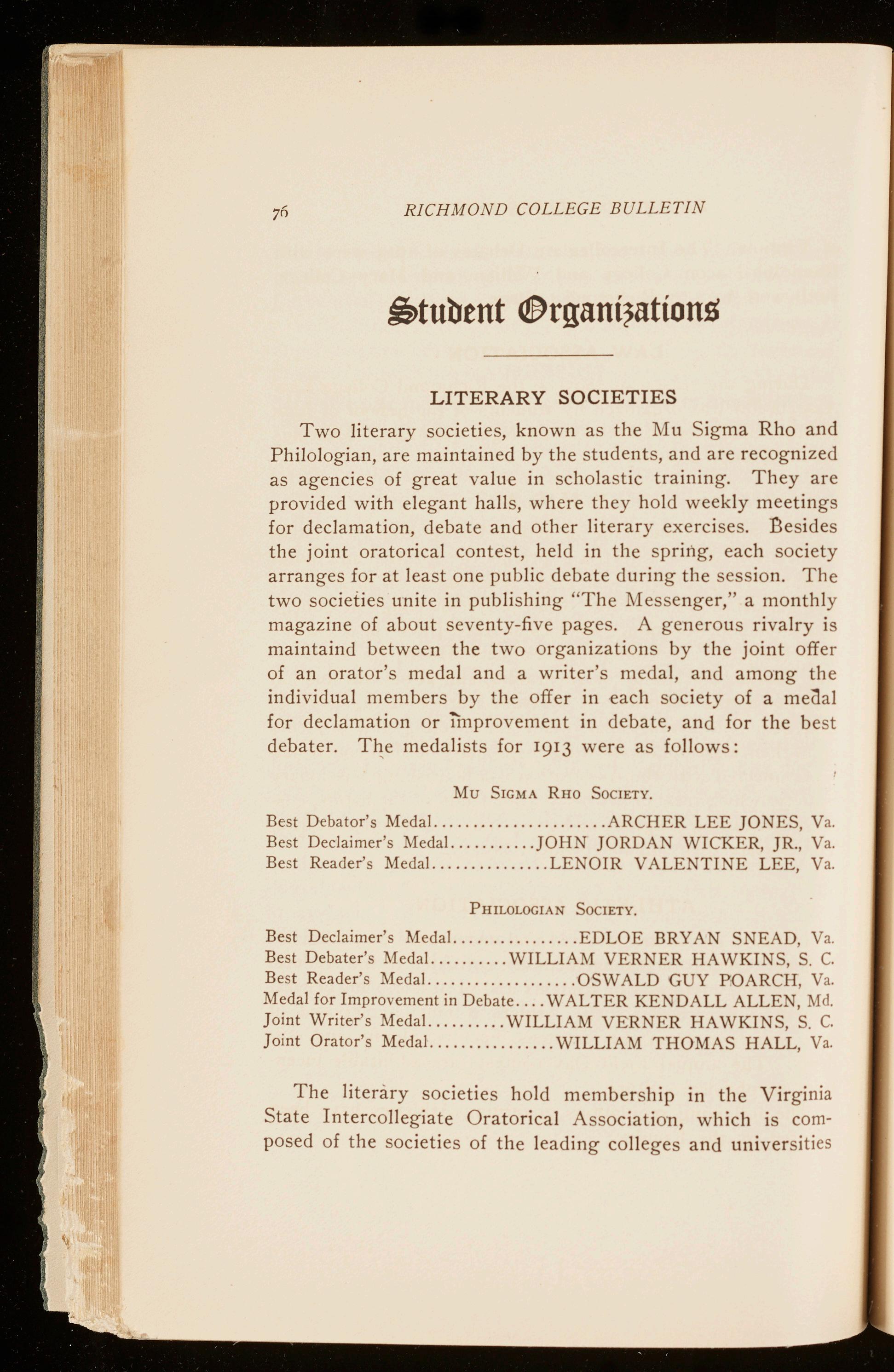
Two literary societies, known as the Mu Sigma Rho and Philologian, are maintained by the students, and are recognized as agencies of great value in scholastic training. They are provided with elegant halls, where they hold weekly meetings for declamation, debate and other literary exercises. Besides the joint oratorical contest, held in the spring, each society arranges for at least one public debate during the ses ion. The two societies unite in publishing "The Mes enger," a monthly magazine of about seventy-five pages. A generous rivalry is maintaind between the two organizations by the joint offer of an orator's medal and a writer's medal, and among the individual members by the offer in each society of a meaal for declamation or irnprovement in debate, and for the best debater. T~e medalists for 1913 were as follows:
Mu SIGMA RHO SOCIETY.
Best Debator's Medal. .... .. ............... ARCHER LEE JONES, V a.
Best Declaimer's Medal. . . ........ JOHN JORDA WICKER, JR., Va.
Best Reader's Medal .............. . LENOIR VALENTINE LEE, Va.
PHILOLOGIAN SOCIETY.
Best Declaimer's Medal ................ ED LOE BRYAN SNEAD, Va.
Best Debater's Medal .......... WILLIAM VERNER HAWKINS, S. C.
Best Reader's Medal ................... OSWALD GUY POARCH, Va. Medal for Improvement in Debate .... WALTER KE DALL ALLEN, Md.
Joint Writer's Medal. WILLIAM VERNER HAWKINS, S. C.
Joint Orator's Medal. WILLIAM THOMAS HALL, Va.
The literary societies hold membership in the Virginia State Intercollegiate Oratorical Association, which is composed of the societies of the leading colleges and univer sities
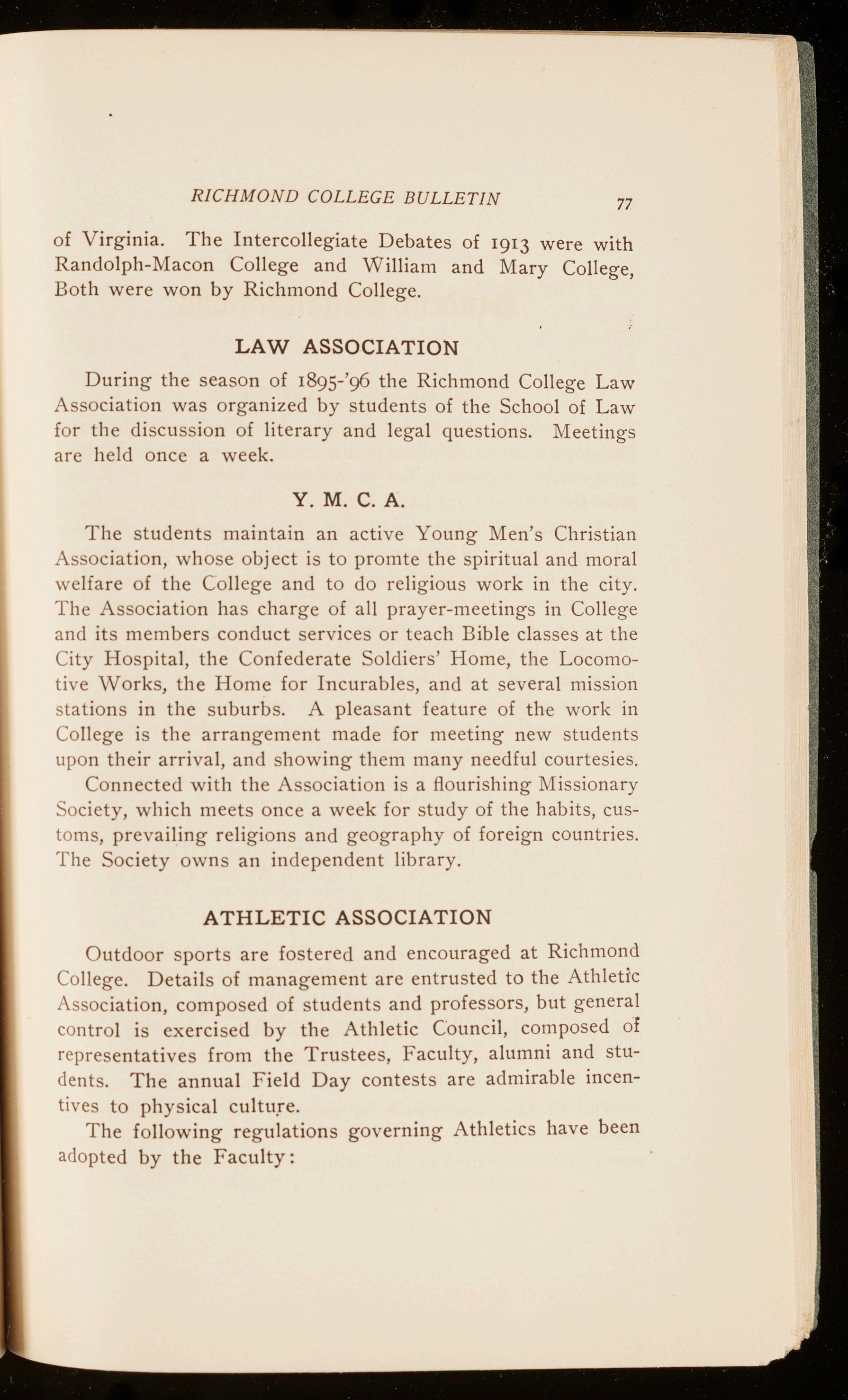
of V irginia. The Intercollegiate Debates of 1913 were with Rando lph-Macon College and Wi ll iam and Mary College, Both were won by Richmond College.
During the season of 1895-'96 the Richmond College Law Association was organized by students of the School of Law for the discussion of literary and legal questions. Meetings are held once a week.
The students maintain an active Young Men's Christian Assoc iation, whose object is to promte the spiritual and moral we lfare of the College and to do religious work in the city. The Association has charge of all prayer-meetings in College and its members conduct services or teach Bible classes at the City Hospital, the Confederate Soldiers' Home, the Locomotive Works, the Home for Incurables, and at several mission stat ions in the suburbs. A pleasant feature of the work in College is the arrangement made for meeting new students upon their arrival, and showing them many needful courtesies.
Connected with the Association is a flourishing Missionary Society, which meets once a week for study of the habits, customs, prevai l ing religions and geography of foreign countries. The Society owns an independent library.
Outdoor sports are fostered and encouraged at Richmond College. Details of management are entrusted to the Athletic Assoc iation, composed of students and professors, but general contro l is exercised by the Athletic Council, composed 0£ representatives from the Trustees, Faculty, alumni and students . The annua l Fie ld Day contests are admirable incentives to physical cu l tu,re .
The fo ll owing regulations governing Athletics have been adopted by the Faculty:
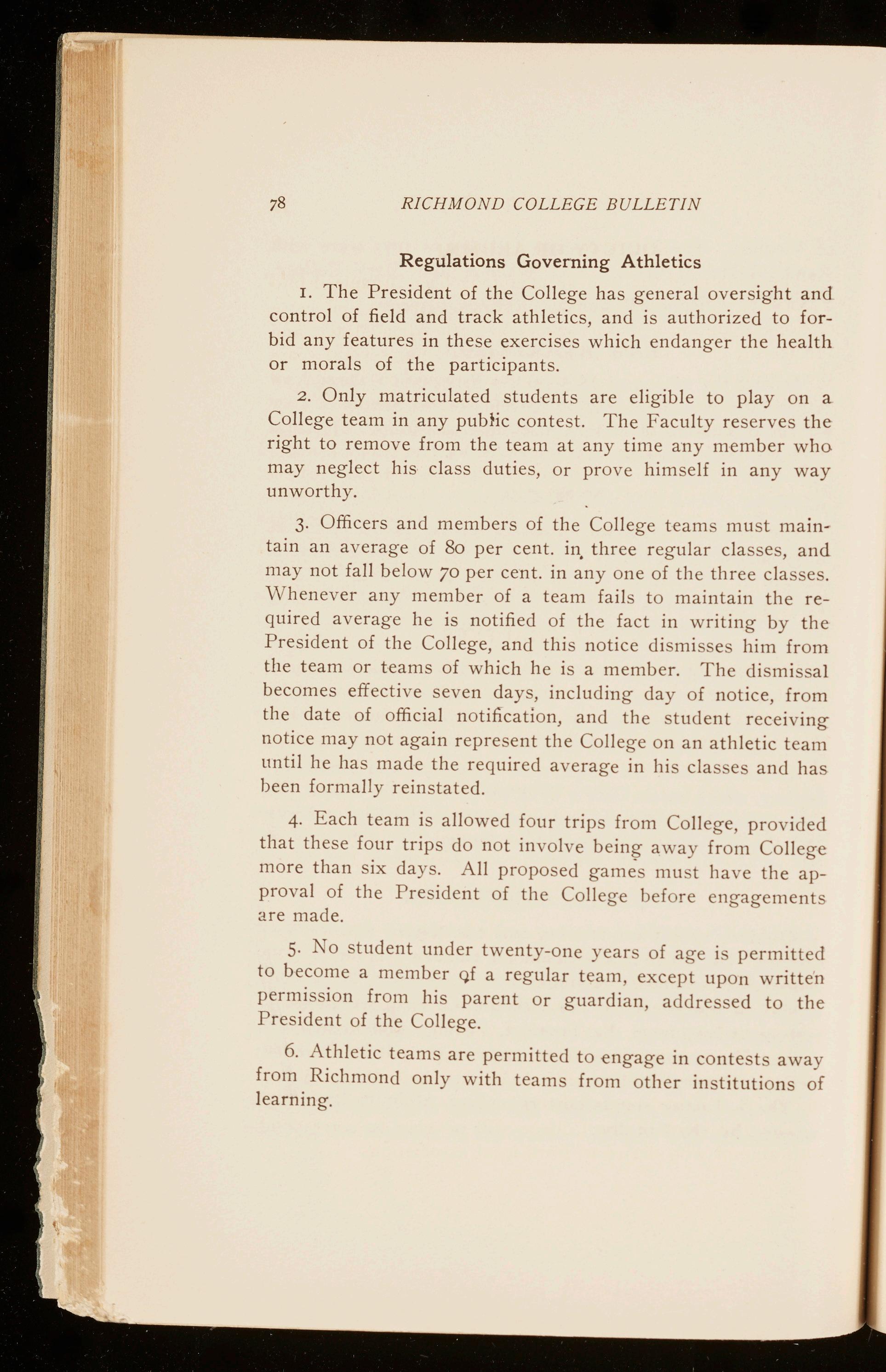
1. T h e P r esident of the Co ll ege has genera l oversight a n d contro l of field and t r ack athletics, and is authorized to fo rbid any feat u res in these exercises wh ich endanger the health or mo r a l s of t h e participants
2. On ly matriculated students are eligib le to play on a Co ll ege team in any puMic contest. The Faculty reserves the right to remove from the team at any time any member who may neg lect his class duties, or prove h imself in any way unworthy.
3. Officers and members of the College teams must ma intain an average of 80 per cent. in. three regular classes, and may not fa ll below 70 per cent. in any one of the three classes. vVhenever any member of a team fails to maintain the required average he is notified of the fact in writing by the President of the College, and this notice dismisses him from the team or teams of which he is a member. The dismissal becomes effective seven days, including day of notice, from the date of official notification, and the student receiving notice may not again represent the College on an athletic team until he has made the required average in his classes and has been formally reinstated.
4. Each team is allowed four trips from College, provided that these four trips do not involve being away from College more than six days. All proposed games mu t have the approval of the President of the College before engagements are made.
5. No student under twenty-one years of age is permitted to become a member Qf a regular team, except upon written permission from his parent or guardian, addressed to the President of the College.
6. Athletic teams are permitted to engage in conte ts away from Richmond only with teams from other in titutions of learning.

The Alumni of the College have long been organized into a Society, which holds annual meetings to renew old associations, maintain a cfose connection with Alma Mater, and further the cause of education and letters. For several years the custom has been to have an annual banquet on Tuesday of commencement week. The officers of the Society are:
REV. S. H. TEMPLEMAN, M. A. ('05), Richmond Va ........ President HILL MONTAGUE, LL. B. ('94), Richmond, Va .... First Vice-President R. N. POLLARD, LL. B. ('02), Richmond, Va Second Vice-President
DR. LIVIUS LANKFORD, Norfolk, Va ........... Third Vice-Pre sident
PROF W. A. HARRIS, M A. ('86), Richmond, Va ......... Secretary J. AUBREY SAUNDERS, E sq., Richmond Va ................ Trea surer
Degree men are members of the Society without election, and all former students are eligible for election. The annual fee is $1.00.
In May, 1898, there was organized in Louisville a Chapter of the General Society of Alumni, which is known as the "Kentucky Association of Richmond College Alumni." The present officers are Dr. S. E. Woody, Louisville, President~ Dr. \V. 0. Carver, Louisville, Secretary and Treasurer.
In February, 1899, the alumni resident in Norfolk, Va., and vicinity organized a " orfolk Chapter of Richmond College Alumni." The chapter holds annual meetings in February. The present officers are : S. T. Dickinson, Esq., Norfolk, President; C. 'vV. Coleman, Esq., Churchland, Secretary and Trcasu rer.
In April, 1903, there was organized in Newport News, Va., a "Peninsula Chapter of Richmond College Alumni." The chapter holds annual meetings.
During the session of 1905-'o6 alumni chapters were organized in Richmond, Baltimore, Lynchburg and Roanoke.
The West Virginia Chapter was organized in October. 19n, at Hinton, W. Va., with J. W. Mitchell, M. L. Wood, and W. L. Richardson as officers.
The President of the College will be glad to correspond with alumni who desire to form local associations.
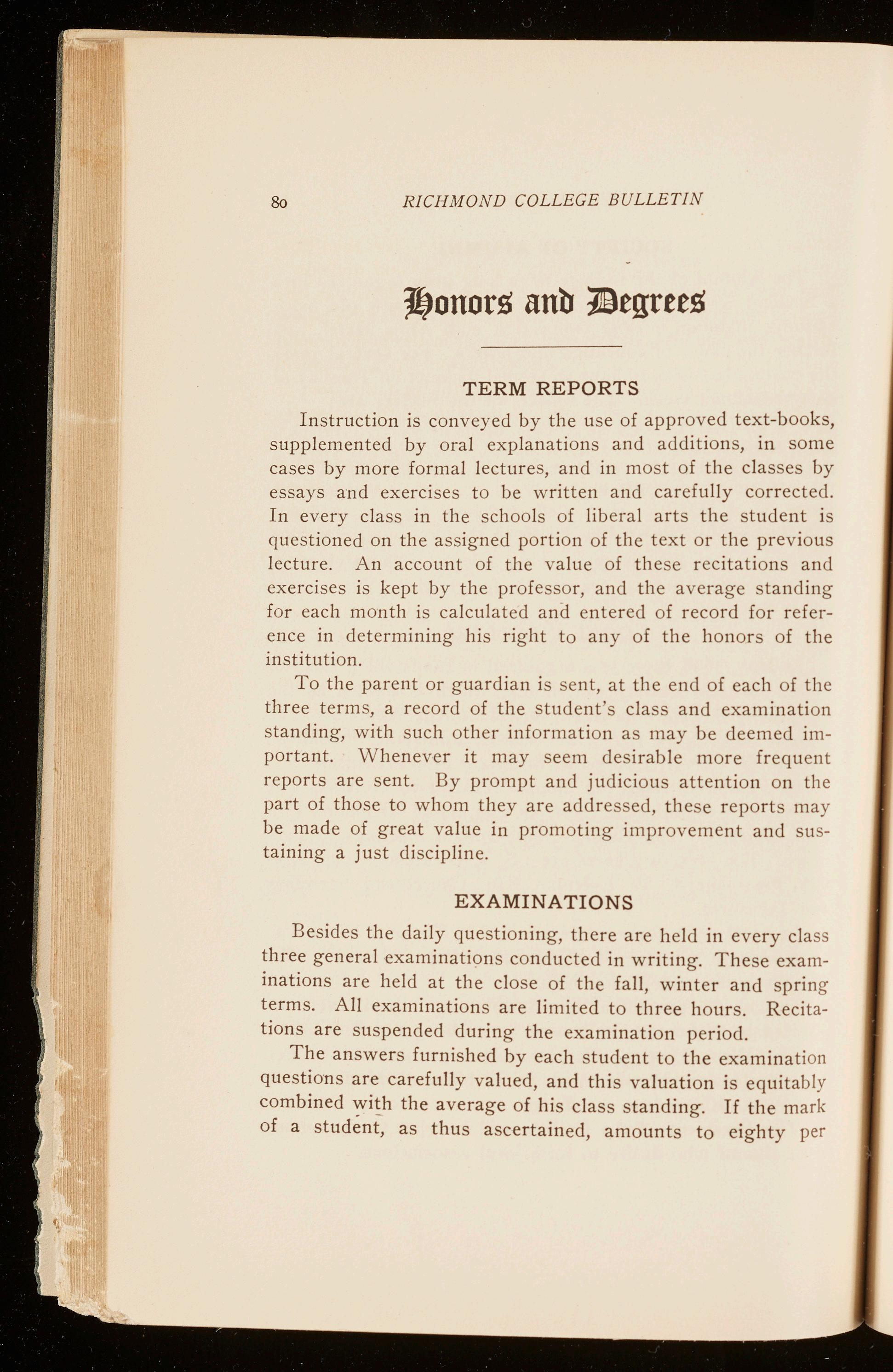
Instruction is conveyed by the use of approved text-books, supplemented by ora l explanations and additions, in some cases by more formal lectures, and in most of the classes by essays and exercises to be written and carefully corrected. In every class in the schools of liberal arts the student is questioned on the assigned portion of the text or the previous lectur e. An account of the value of these recitations and exercises is kept by the professor, and the average stand in g for each month is calculated and entered of record for reference in determining his right to any of the honors of the institution.
To the parent or guardian is sent, at the end of each of the three terms, a record of the student's class and examination standing, with such other informati o n as may be deemed important. Whenever it may seem desirable more frequent reports are sent. By prompt and judicious attention on the part of those to whom they are addre sse d, these reports ma y be made of great va lue in promoting improvement and sustaining a just discipline.
Besides the daily questioning, there are held in every cla ss three general examinations conducted in writing. These examinations are held at the close of the fall, winter and spring terms. All examinations are limit ed to three hours. Recitations are suspended during the examination period.
The answers furnished by each student to the examinati on questions are carefully valued, and this valuation is equitabl y combined ~i~h the average of his class standing. If the mark of a student, as thus ascertained, amounts to eighty per
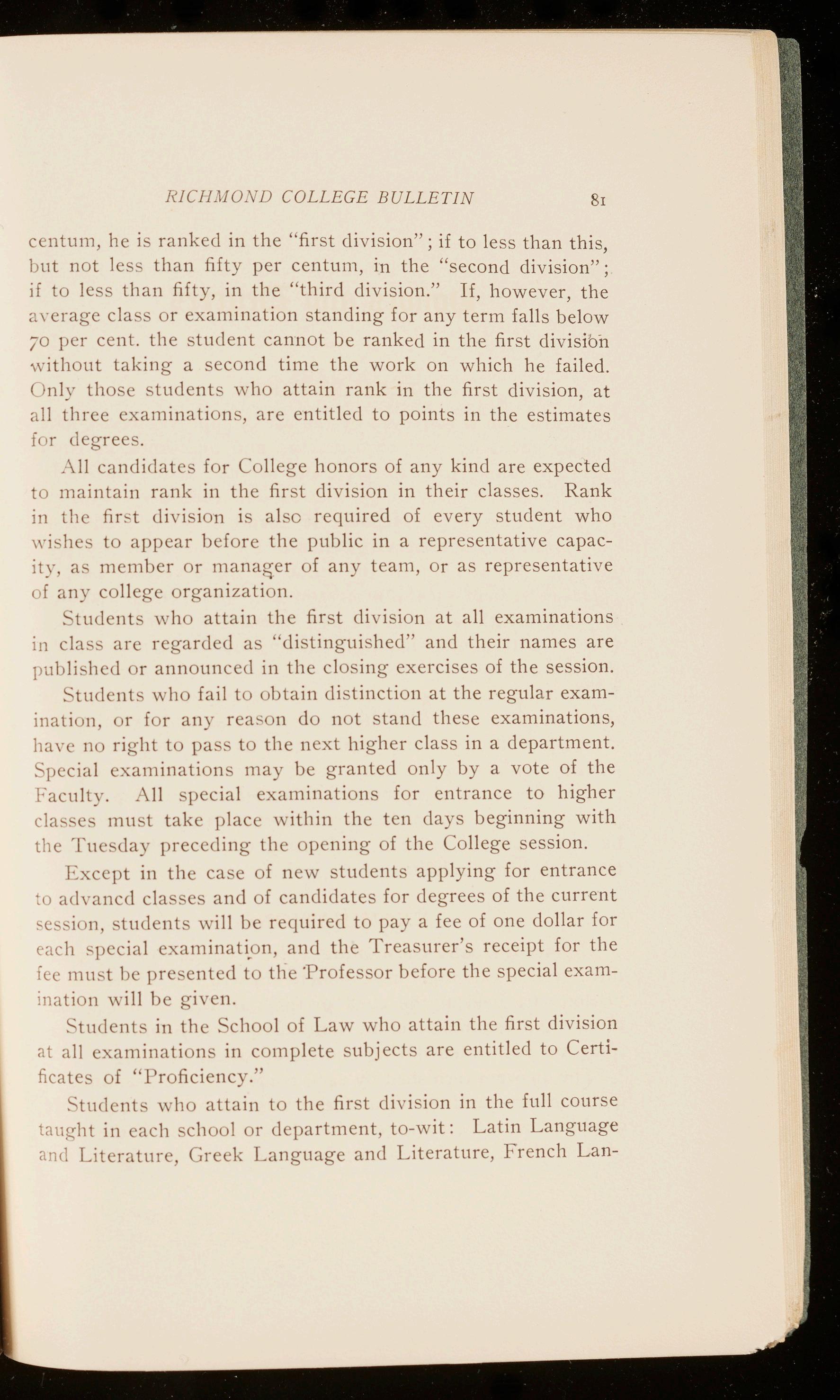
RICJlJ ,fOND COLLEGE BULLETIN
centum, he is ranked in the "first division"; if to less than this, but not les s than fifty per centum, in the "second division", if to le s than fifty, in the "third division," If, however, th~ aYerage cla s or examination standing for any term falls below 70 per cent. the student cannot be ranked in the first divisibi1 without taking a second time the work on which he failed. On ly those students who attain rank in the first division, at all three examinations, are entitled to points in the estimates for degrees.
All candidate for College honors of any kind are expected to maintain rank in the first division in their classes. Rank in the fir"t division is al o required of every student who wishes to appear before the public in a representative capacity, as member or mana~er of any team, or as representative o f any college organization.
tudents who attain the first division at all examinations in clas · are regarded as "distinguished" and their names are pu blished or announced in the closing exercises of the session.
Students who fail to obtain distinction at the regular examinat ion, or for any reason do not stand these examinations, ha \'C no right to pa s to the next higher class in a department. Specia l examinations may be granted only by a vote of the Facu lty. All pecial examinations for entrance to higher clas. es mu t take place within the ten clays beginning with the Tuesday preceding the ope ning of the College session.
Except in the case of new students applying for entrance to adYanc cl clas es and of candidates for degrees of the current sess ion, students will be required to pay a fee of one dollar for eac h spec ial examinati_on, and the Treasurer's receipt for the fee must be presented to the ·Professor before the special examina tion will be rriven.
Student· in the chool of Law who attain the first division at all examinations in complete subjects are entitled to Certificates of "Proficiency."
Student who attain to the fir t division in the full course taug ht in each sc h ool or department, to-wit: Latin Language and Literature, Greek Language and Literature, French Lan-
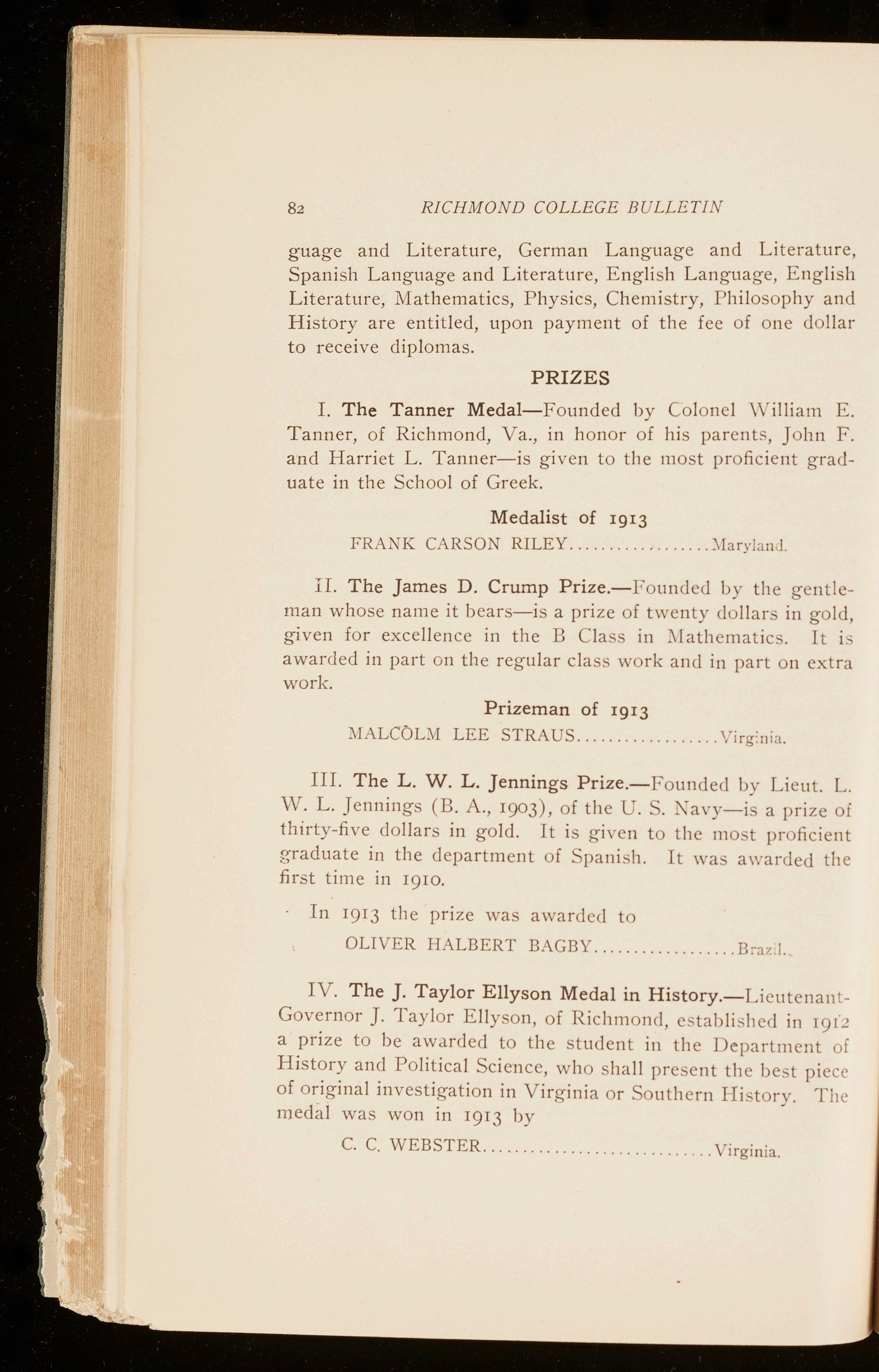
RICHMOND COLLEGE BULLETIN
guage and L iterat ur e, Germa n Language and Literature, Span ish La nguage a n d L iterature, Eng lish Language, Engl ish Li terature, Mathematics, P hys ics, Chemistry, Philosophy and History are e n tit led, u pon payment of the fee of one dollar to rece ive dip lomas .
I. The Tanner Medal- Founded by Colonel \Villiam E. Tanner, of Richmond, Va., in honor of his parents, John F. and Ha r riet L. Tanner- is given to the most proficient grad- uate in the School of Greek.
Medalist of 1913
FRANK CARSON RILEY .................. :\Iarylan L
iI. Th e Ja m es D . Crum p Pri z e.- Founded by the gentle- man whose name it bear -is a prize of twenty dollar- in gold, given for excellence in the B lass in :\lathernatic · It i..; awarded in part on the regular class work and in part on extra work.
Prizeman of 1913 :\IALCODI LEE STRAUS .................. \"irg:nia.
III. Th e L. W . L Jennings Pr ize.- Founc!ecl by Lieut. L. vV. L. Jennings (B. A., 1903), of the •a vy-is a prize of thirty-five dollars in gold. It i given to the most proficient graduate in the department of panish. It was a,\ ·arde d the first time in 1910.
In 1913 the prize was awarded to OLIVER HALBERT BAGBY ...... .. .. B:·az I.
IV. The J. Taylor Ellyson Me dal in Hi s tory - Lieutenan tGovernor J. Taylor E llyson, of Richmond, established in r9t2 a prize to be awarded to the student in the Department of History and Political Science, who shall pre ent the best pie ce of original investigation in Virginia or Southern History. The nJ.edal was won in 1913 by C. C. WEBSTER ............................ Virginia.
The Wightman Prize- For the best essay on some theme i n the fie ld of the n at ur al sc iences, offered by Dr. J . P. W ightma n (B. A., 1908), P h. D , of the Johns Hopkins Un iversity, was wo n by .
CLODIUS H. WILLIS .......... . ............ Virginia.
The Pollard Law Prize.- Offered by Hon. J ohn Garland Po ll a r d, fo r t h e best examination paper on the Virginia Code, was wo n by
HARRY LAMONT SNEAD ... . .. .. . . ... . .. .Virginia.
The profe siona l degree of Bachelor of Laws (LL. B.), and the academ ic degrees of Bache lor of Science (B. S.), Bache101 of Arts (B A.), and Master of Arts (M.A.), are conferred by the Trustee on recommendation from the Faculty . They cannot be gi\·en either in course or as honorary degrees. For Bachelor of Laws is required graduation on all the subjects included in the Law School, with some proficiency in genera l education.
Al l ubjects taught in the Academic Schools of the College are now cla tied under three uroups, viz . : (I) a Foreign Language Group; (II) a Scientific Group, and (III) an English-Philosophical Group. Students who attain the first div1. io n (i. e., make eighty per cent.) on all recitations and exam inations in any clas s, are entitled to the points set after that cla s in the groups printed below:

Latin-
Course A Course B
Greek5 ........... 5
Introductory ... ..... . ..... . .. 2
Cour se A ......... -+
French-
Course A . ... . ......... . ..... 3
Course C Course D Course B Course C ................ . ... 6 6 4 6
Course B • 5
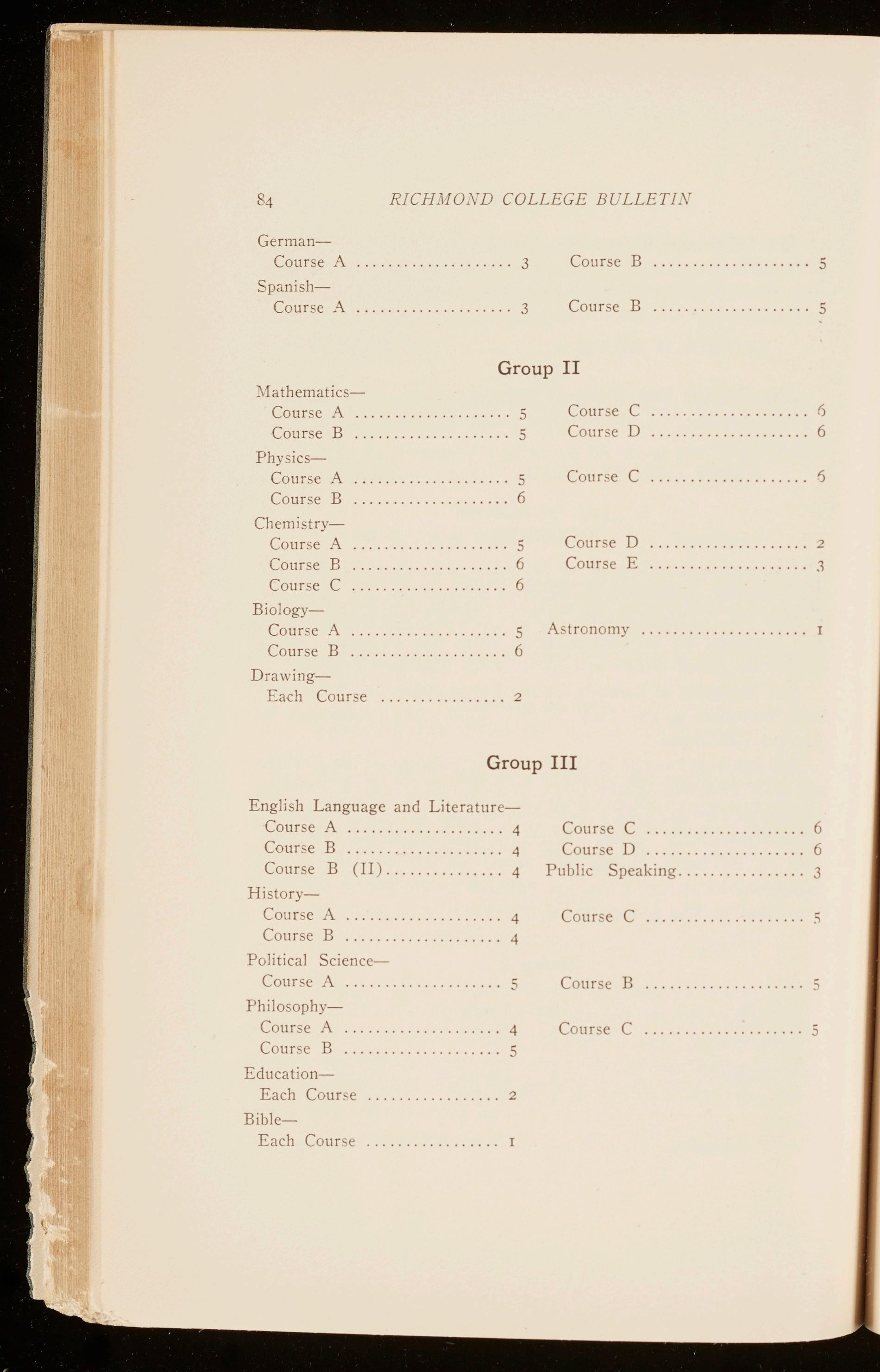

'~ For Bachelor of Science is required a total of seventy-six points. Of this total, sixteen points, including the A courses in French and German, must come Group I; thirty-eight points, including Mathematics B and the A Course in Physic s, Chemistry and Diology, must come from Group II, and ten point , including the A course in English, must come from Group III. The remaining twelve points may be made up from any or all of the groups. Not more than six points may be counted in Drawing.
,;,For Bachelor of Arts is required a total of seventy-six points, of which twenty points, including one diploma and either Latin , \ or Greek A, must come from GroupI; fifteen points, including l\Iathematics A and Physics A, or Chemistry A, or Biology A, from Group II; fifteen points, including the D course, or the B (II) course in Engli h, and not including the Bible course, from Group III. The remaining twenty-two points may come from any or all of the groups. andidates for any o f the degrees mentioned above are requirecl lo subm it to the Faculty eight n~onths before Commencement a written application for the degree sought, together with a statement of class-work already accomplished and that which remains unfinished.
The applicant for the degree of Master of Arts must preYiously have met all requirements for a B: A. degree. In addition to this, he mu t obtain from the Faculty, at the beginning of the se s ion in which he expects to take the KL A. degree, formal approval of his course of study, which shall const itute a full year o f work. This course must include at lea t two sen io r classes, neither of which shall have been offerecl for the B. A. degree. The most advanced class in each of the following clepartments counts as a senior: Latin, Greek, French, German, Engli h Language, English Literature, l\rathematics, Chemistry, Physics, History and Philosophy. X o part of the work offered for the l\I. A degree shall be done
* Students who matriculated prior to June II, 1913, have the choice of obtaining the degree under the requirements here prescribed or under the requirements of the year in which they matriculated.
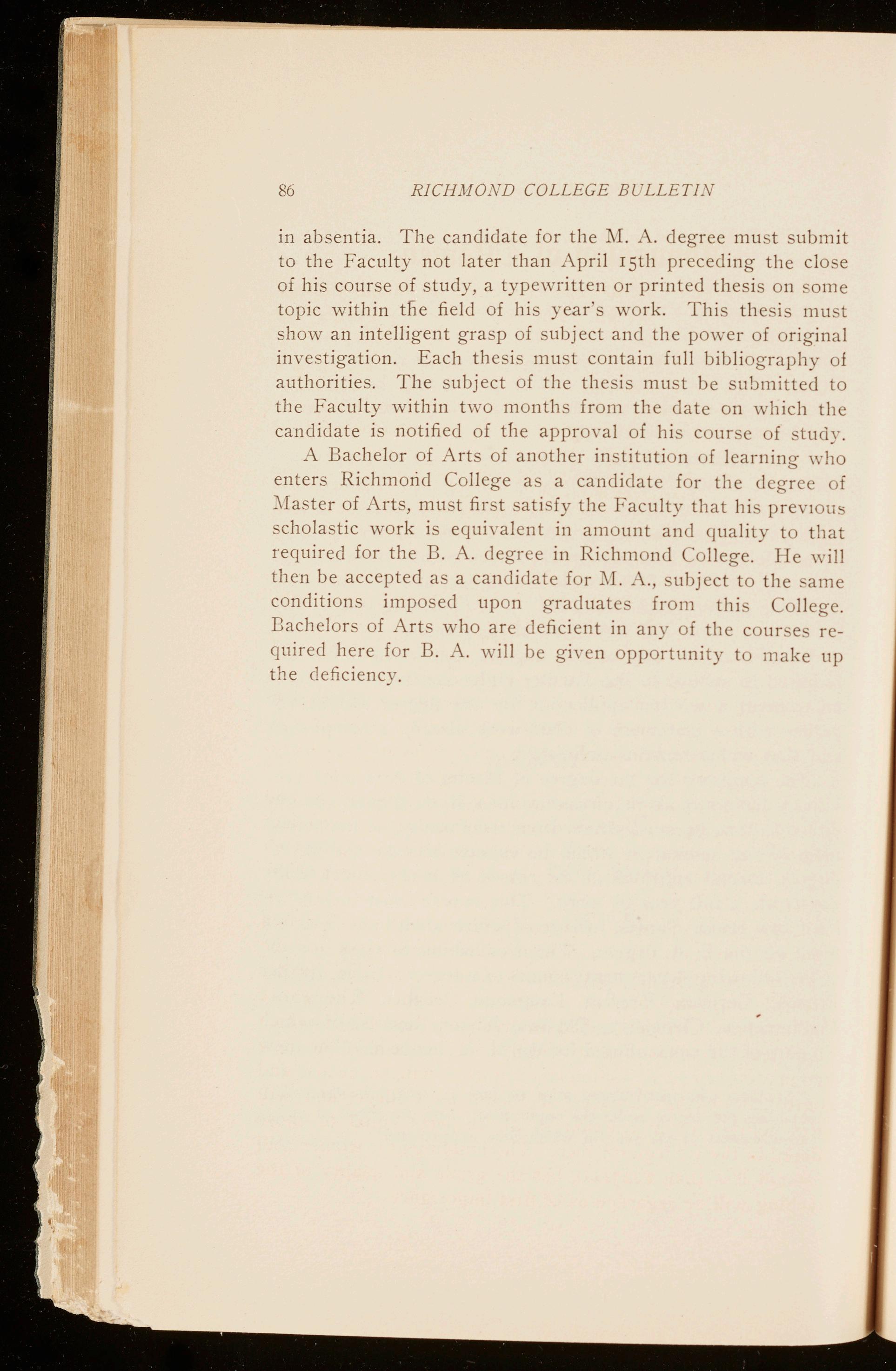
in absentia. The candidate for the l\I. A. degree must submit to the Faculty not later than April 15th preceding the close of his course of study, a typewritten or printed thesi on some topic within tfie field of his year' work. This thesis mu t show an intelligent grasp of subject and the power of original investigation. Each thesis must contain full bibliography of authorities. The ubject of the thesi mu t be ubmitted to the Faculty within t,Yo months from the date on which the candidate i notified of the approYal of his course of study. A Bachelor of Arts of another in titution of learning who enters Richmorid College a a candidate for the degree of :.\faster of Arts, must fir t atisfy the Faculty that his prev1ou · scholastic work is equiYalent in amount and quality to that required for the B. A. degree in Richmond allege. He will then be accepted as a candidate for :.\l. :\., subject to the ~ame conditions imposed upon graduates from this ollege. Dachelors of Art who are deficient in any of the cour es re- quired here for B. A. \\'ill be giyen opportunity to make up the deficiency.
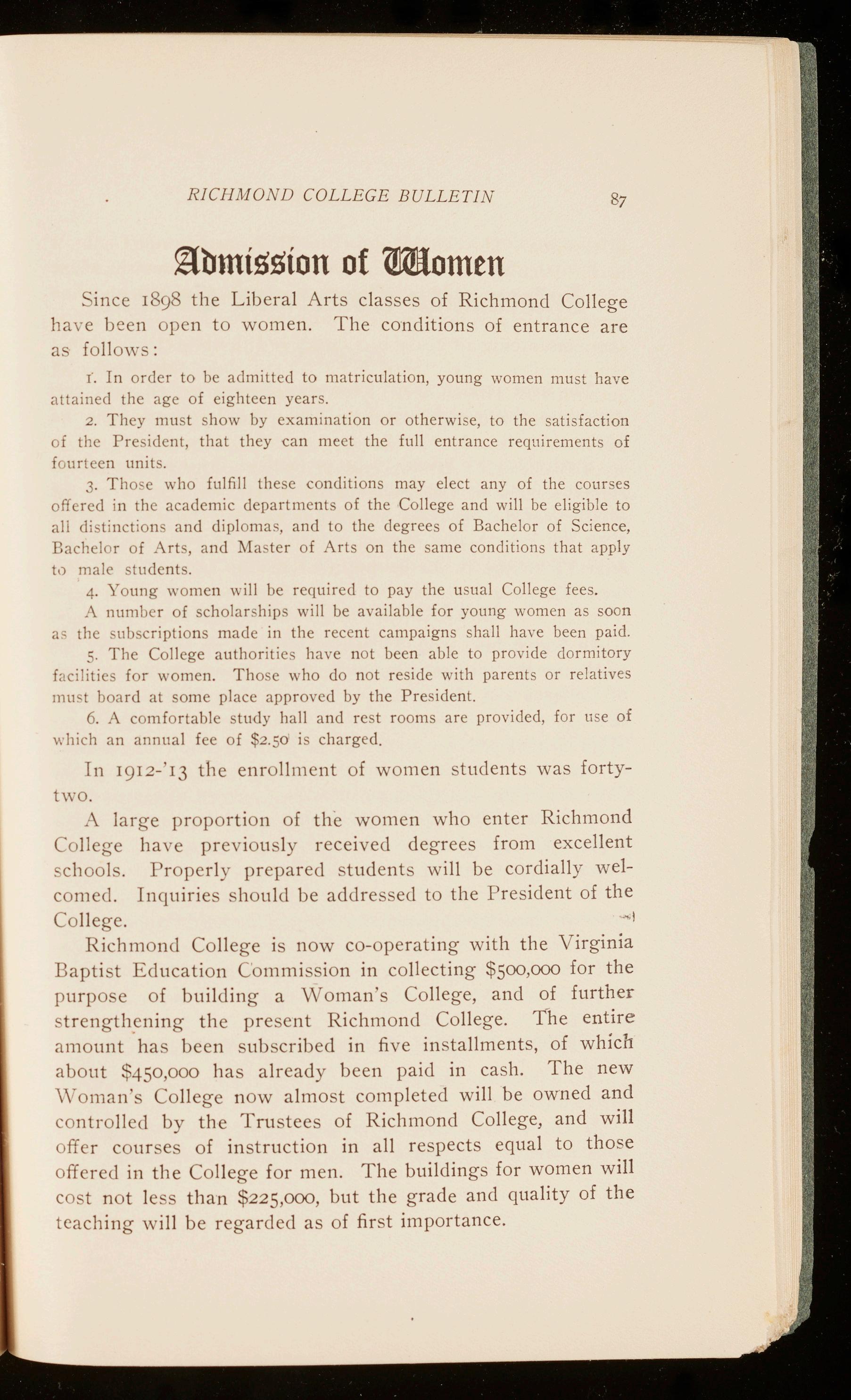
in ce 1898 the Liberal Arts cla sses of Richmond Colleo-e b haye been ope n to women. The conditions of entrance are as fo ll ow :
T. In order to be admitted to matr icul atio n, young women must have attained the age of eighteen years.
2. They must how by examination or otherwise, to the satisfaction of the President, that they can meet the full e ntrance requirements of fourt en units.
3. Tho,e who fulfill these co nditi o ns may elect any of the courses offered in the academic departments of the College and will be eligible to all distinctions and diplomas, and to the degrees of Bachelor of Science, Bachel o r of Arts, and Ma,ter of Arts on the same conditions that apply t,) male students.
4. Young women will be required to pay the u sua l College fees. /\ number of scholarships will be available for young women as soon a ;; the ,ubscriptio n s made in the recent campaigns shall ha, e been paid.
5. The College a uth orities have not been able to provide dormitory facilities for women. Th ose who do not r eside with parent or relatives must board at some place app r oved by the President.
6. A com fo rtahle s tudy hall a nd re t r oo m s are provided, for use of which an annua l fee of $2.50 is charg ed.
In 1 912-'13 the enrollment of women st udents was fortytwo
A large proportion of the women who enter Richm on d Co lle ge have previously received de g rees from excellent choo l . Properly prepared s tud e nt will be cordially welcomed. Inquiries s h ou ld be addres ed to the President of the Co lleg e. -1
Richmond College i now co- o p e rating with the Virginia Baptist Education Commission in collecting $500,000 for the purpo e o f building a 'vVo man 's College, and of further , trengthening the present Richm ond College. The entire amou nt ha , been subscribed in five in s tallments, of which about $450,000 has already been paid in ca s h. The new \Yornan 's olleo-e n o w almost completed will be owned and contro ll ed by the Tru tee s of Richm o nd College, and will offe r cour es of instruction in all re spec ts equal to those offered in the College for men. The buildings for women will co t not le s than $225,000, but the grade and quality of the teac hing will be regarded as of first importance.
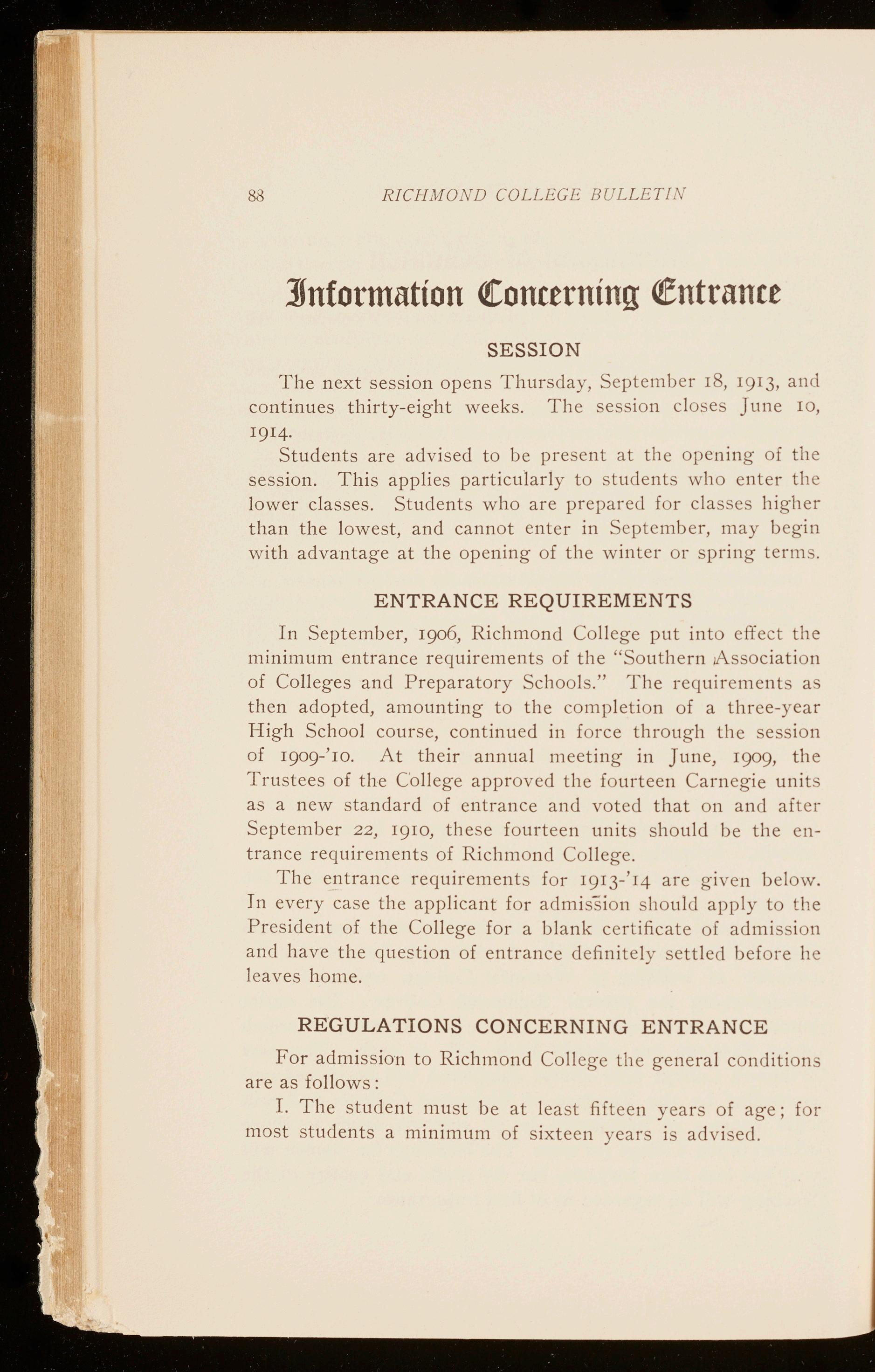
The next session opens Thursday, September 18, 1913, and continues th irty - eight weeks. The session closes June IO, 1914.
Stude n ts are advised to be present at the opening of the session. T h is applies particularly to students who enter th e lower classes. Students who are prepared for classes higher than the lowest, and cannot enter in September, may begin with advantage at the opening of the winter or spring terms.
In September, 1906, Richmond College put into effect the minimum entrance requirements of the "Southern Association of Co ll eges and Preparatory Schools." The requirements as then adopted, amounting to the completion of a three-year High Sc h oo l course, continued in force through the session of 1909-'10. At their annual meeting in June, 1909, the Trustees of the College approved the fourteen Carnegie units as a new standard of entrance and voted that on and after September 22, 1910, these fourteen units should be the entrance requirements of Richmond College.
The entrance requirements for 1913-'14 are given below. In every case the applicant for admission should apply to the President of the College for a blank certificate of admission and have the question of entrance definitely settled before he leaves home.
For adm ission to Richmond College the general conditions are as fo ll ows :
I. The student must be at least fifteen years of age; for most students a minimum of sixteen years is advised.
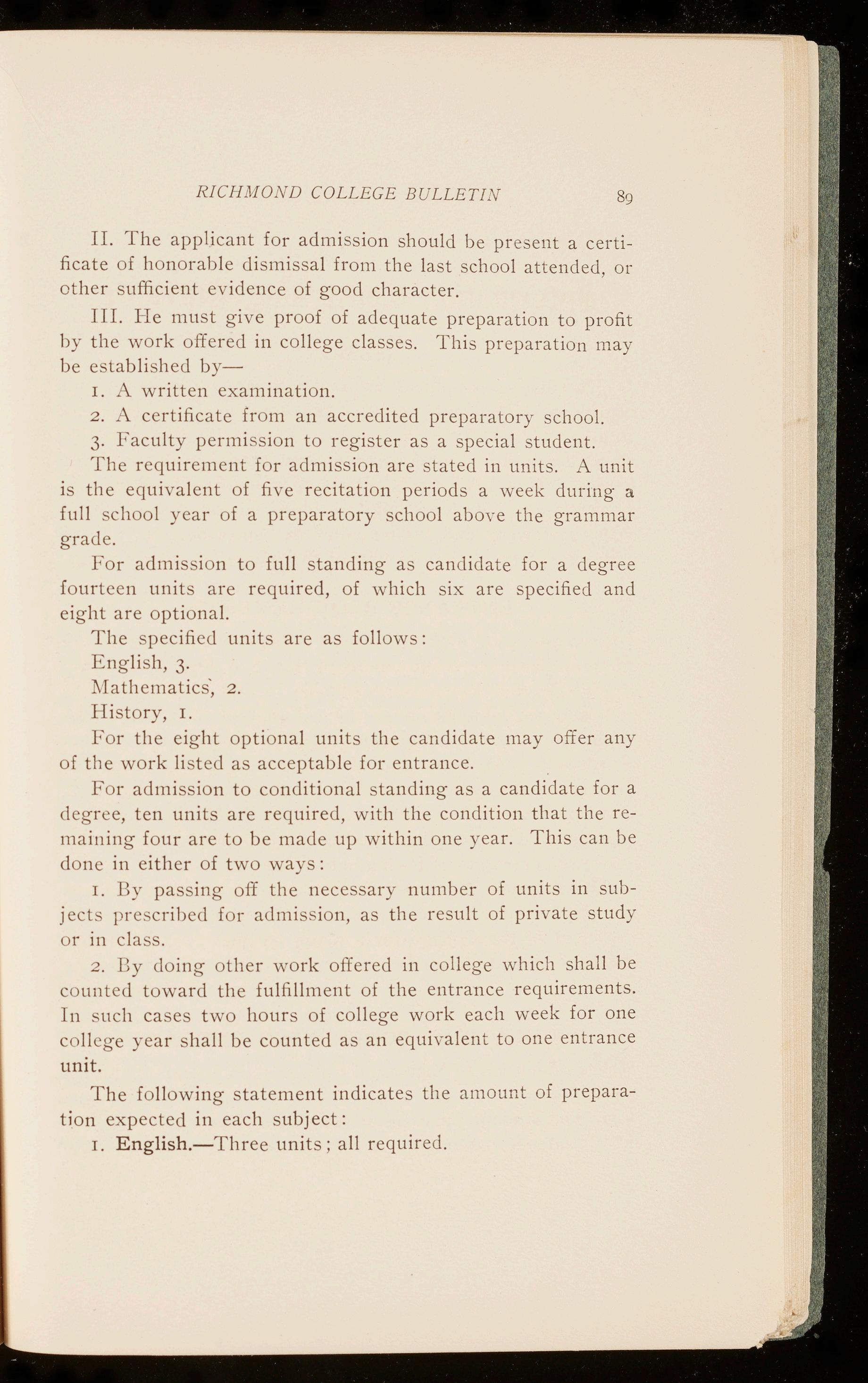
II. The applicant for admission should be present a certificate of honorab l e d ismissa l from the last school attended or ' other sufficient evidence of good character.
III. IIe must give proof of adequate preparation to profit by the work offered in college classes. This preparation may be established by-
I. A written examination.
2. A certificate from an accredited preparatory school. 3. Faculty permission to register as a special student.
The requirement for aclmi sion are stated in units. A unit is the equiva lent of five recitation periods a week during a full chool year of a preparatory school abo,·e the grammar grade .
For admission to full standing as candidate for a degree fourteen unit are required, of which six are specified and eight are optional.
The pecified units are as follows: English, 3.
1Iathematics: 2.
IIisto r y, I.
For the eight optional units the candidate may offer any of the work listed as acceptable for entrance.
For admission to conditional tancling as a candidate for a degree, ten units are required, with the condition that the remainincr four are to be made up within one year. This can be clone in either of two ways:
r. By passing off the necessary number of units in subjects prescribed for admission, as the result of private study or in class
2 By doing other work offered in college which shall be counted toward the fulfillment of the entrance requirements. In such cases two hours of college work each week for one college year shall be counted as an equi,·alent to one entrance unit.
The following statement indicates the amount of preparation expected in each subject:
I. Engl is h.- Three un its; all required.
The English requirements consist of two parts :
(a) English Grammar and Rhetor ic, including Gramma r , Analysis, Punctuation, Paragraph ing a n d Compos i tion.
(b) The reading course and the course in specia l study a n d practice adopted by the •Association of Colleges anJ Preparatory Schoo l s of the Southern States.
The following are the courses assigned by the Association for entrance requirements in Eng l ish:
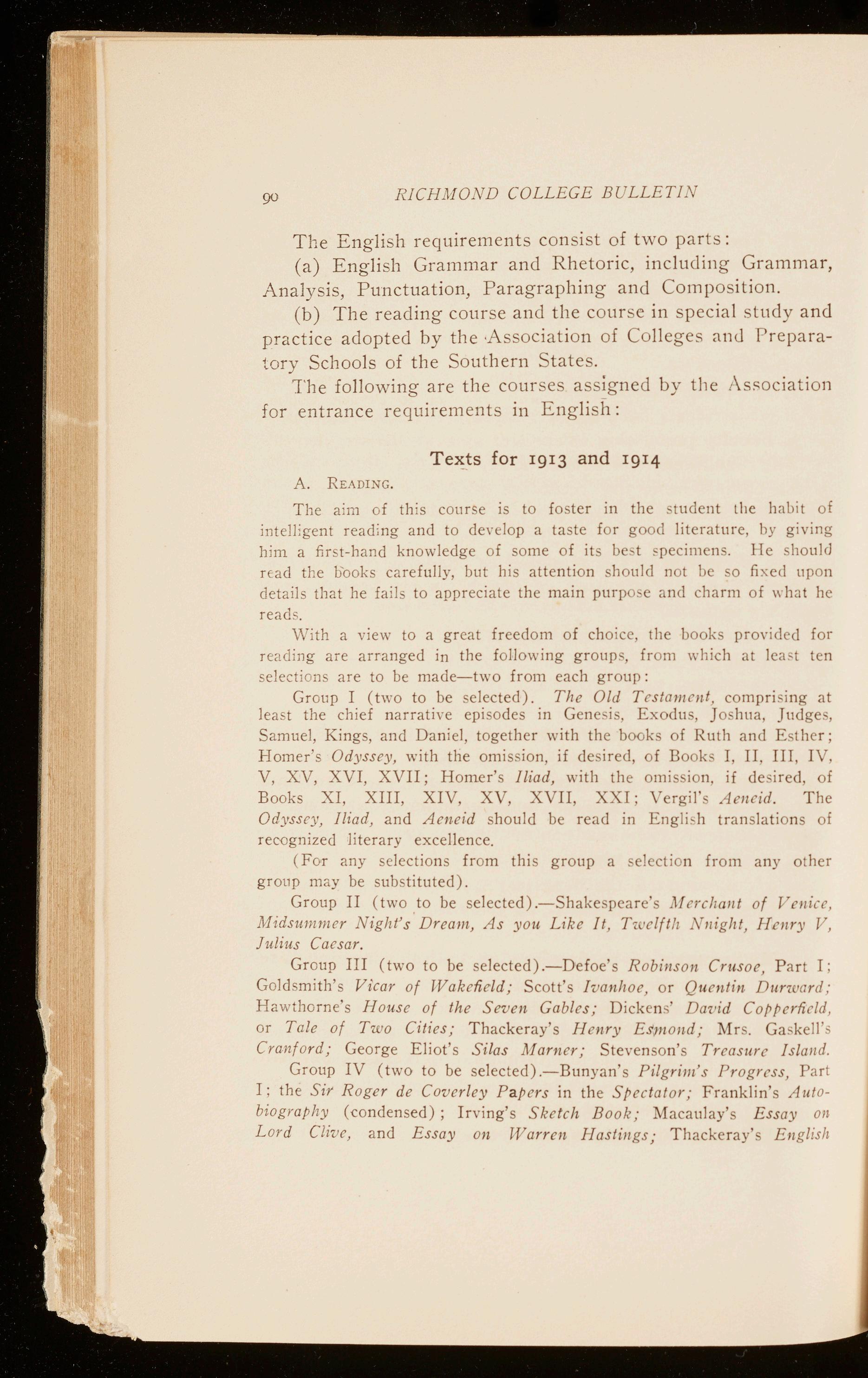
A. READING.
The aim of this course is to foster in the student Lhe habit of intelligent reading and to de\·elop a taste for go o d literature, by giving him a first-hand knowledge of some of its be,t ,pecimens. He should read the books carefully, but his attention should not be so fixed upon details that he fails to appreciate the main purpose and charm of what he read s
\Vith a view to a great freedom of choice, the books prO\·ided for reading are arranged in the following groups, from which at lea , t ten selecti o ns are to be made-two from each group:
Group I (two to be selected). The Old Tcsta111c11t, comprising at least the chief narrative episodes in Genesis, Exodus, Joshua, Judges, Samuel, Kings, and Daniel, together with the books of Ruth and Esther; Homer's Od31ssey, with the omission, if de ired, of Books I, II, III, IV, V, XV, XVI, XVII; Homer's Iliad, with the omission, if desired , of Books XI, XIII, XIV, XV, XVII, XXI; Vergil's Ae11cid. The Odyssc3 1 Iliad, and Aeneid should be read in English translation of recognized literary excellence.
(For any selections from this group a selection from any other group may be substituted).
Group II ( two to be selected) .-Shakespeare's AI crcha11t of Ven ice, Midsummer Night's Dream, As yoit Like It, Twelfth N11ight, Henry V, Julius Caesar.
Group III ( two to be selected) .-Defoe's Robinson Crnsoe, Pa r t I; Goldsmith's Vicar of TVakefield; Scott's Ivanhoe, or Q11entin Durward; Hawthorne's Hause of the Seven Gables; Dickens' Da·vid Copperfield , or Tale of Two Cities; Thackeray's Heury Es11wnd; Mrs. Gaskell' , Cranford; George Eliot's Silas .Marner; Stevenson's Treasllre lsla11d.
Group IV ( two to be selected) .-Bunyan's Pilgrim's Progress, Part I; the Sir Roger de Coverley P apers in the Spectator; Franklin's Autobiography (condensed); Irving's Sketch Book; Macaulay's Essay on Lord Clive, and Essay on Warren Hastings; Thackeray's English
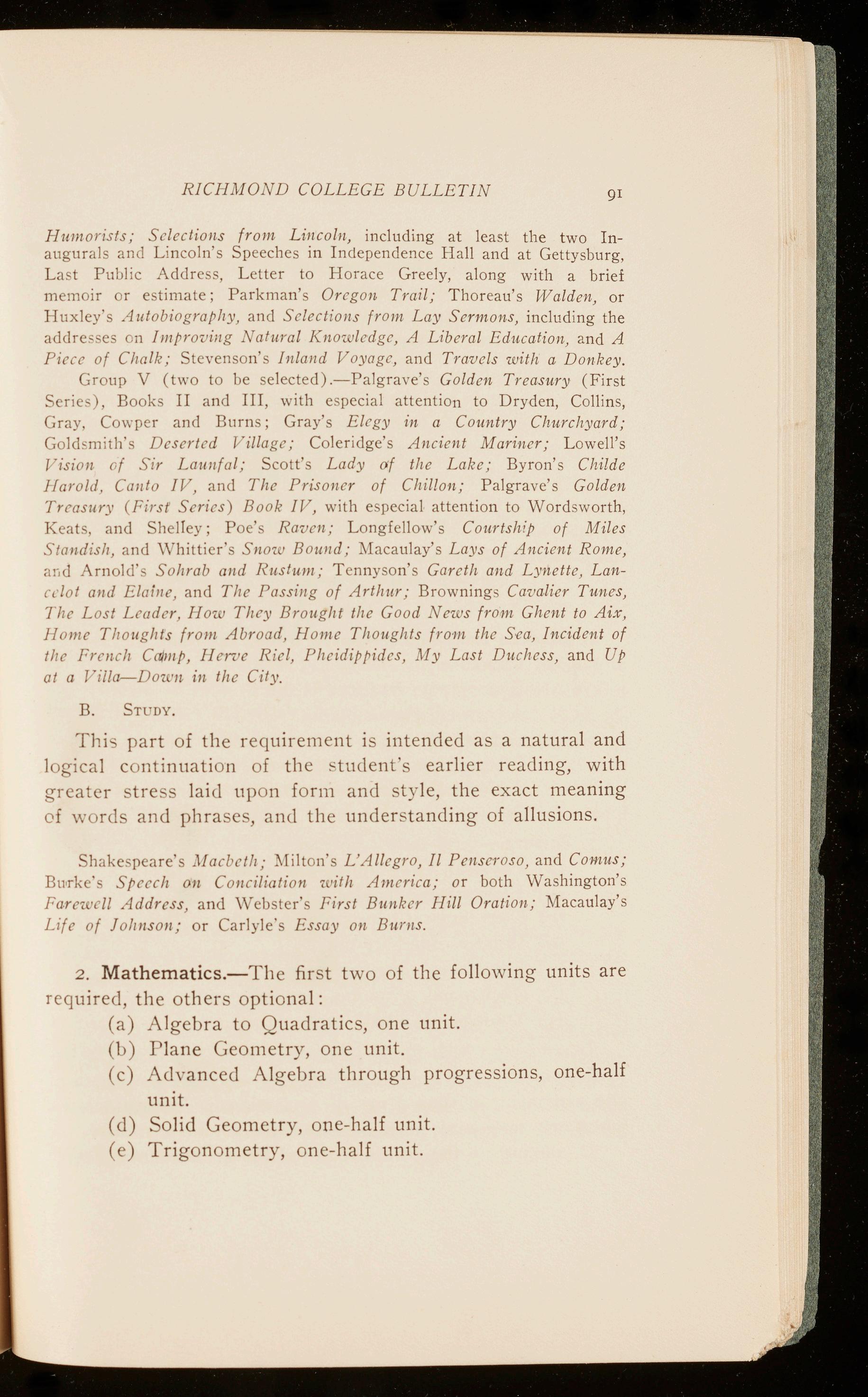
H1t111orists; Selections from Lincoln, including at least the two Inaugurals and Lincoln's Speeches in Independence Hall and at Gettysburg, La st Public Address, Letter to Horace Greely, along with a brief memoir or estimate; Parkman's Oregon Trail; Thoreau 's Walden, or Huxley's A11tobiogroph3 1 and Selectio11s from Lay Sermons, including the addresses on l111provi11gNatural Knowledge, A Liberal Ed11cation, and A Piae of Chalk; Stevenson's fnla11d Voyage, and Travels with a Donkey. Group V ( two to be se lect ed) .-Palgrave's Golden Treasury (First Series), Books II a nd III , with especial attention to Dryden, Collins, Gray, CO\\·per and Burns; Gray's Elegy in a Country Clmrchyard; Gold,mith's Deserted Village; Coleridge's Ancient Mariner; Lowell's Vision of Sir La1111fal; Scott's Lady af the Lake; Byron's Chi/de Jfarold, Canto IV, and The Prisoner of Chil/on; Palgrave's Golden Tr<'asury (First Series) Book IV, with especial attention to Wordsworth, Keats, and Shelley; Poe's Raven; L ongfellow's Courtship of Miles Sta11dish, and \Vhitticr's Snow Bound; Macaulay's Lays of Ancient Rome, ar,d Arnold's Sohrab and Rustu111; T en ny son's Gareth and L31nette, Lanrclol and Elaine, and The Passing of Arthur; Brownings Cavalier Tunes, The Lost Leader, How They Brought the Good News from Ghent to Aix, Home Thoughts from Abroad, Home Thoughts from the Sea, Incident of the Frrnch CaJmp, Herue Riel, Pheidippides, My Last Duchess, and Up at a T'i/l(J,--Down in the City.
B. STUDY.
This part of the r equ irement i s int ended as a natural and logical continuation of the ftudent's earlier reading, with greater s tre ss laid upon form and style, the exact meaning of word and phrases, and the under standing of allusions.
Shakespeare' Macbeth; }.filton's L'Allegro, fl Penseroso, and Camus; Burke's Speech on Co11ciliation with America; or both ·washington's Farewell Address, and \V ebster's First Bunker Hill Oration; Macaulay's Life of Johnson; or Carlyle's Essay on Bums.
2. Mathematics.-Th e first two of the following units are required, the other optional:
(a) Algebra to Quadratics, one unit.
(b) Plane Geometry, one unit.
( c) Advanced Algebra through progressions, one-half unit.
( cl) Solid Geometry, one-half unit.
( e) Trigonometry, one-half unit.

3. History.-One unit required; the others optional:
(a) Ancient History, one unil.
(b) l\leclieva l and modern European history, one unit.
(c) Englis h history, one unil.
(cl) American history, one unit.
4. Latin.- Four units, optional.
(a) Grammar and composition, one unit.
(b) Caesar, four books, one unit.
(c) Cicero, six orations, one unit.
(cl) Vergil, two books, and Kepos' lhe first ten Lives; or an amount equivalent lo the whole of tlie e in either Yergil or Kepos, one unil.
5. Greek.-Tw o units, optional:
(a) Grammar and composition, one unit.
(b) Xenophon's _\nabasis, four books, one unit.
6. Modern Languages.-Se\·en uni ls; optional :
(a) FrenchElcmenlary, one unit; Aclvancecl, two units.
(b) GermanElementary, one unit; Aclvancecl, two units.
(c) Spani h, one unit.
7. Science.-Fi\ ·e units; optional.
(a) Phy ical Geography, one unit.
(b) Elementary Physics, one unit.
(c) Elementary Chemistry, one unit.
(cl) Dotany, one-ha lf unil.
(e) Physiology, one-half unit.
(f) l\ l echanica l Drawing, one-half unit.
(g) Zoology, one-half unit.
In subjects which imply laboratory work, uch as Physics and Chemistry, two hours of laboratory work are estimated a the equivalent of one hour of recitation. The candidate'laboratory note-book must be submitted for inspection.
In making up the points required for an academic degree
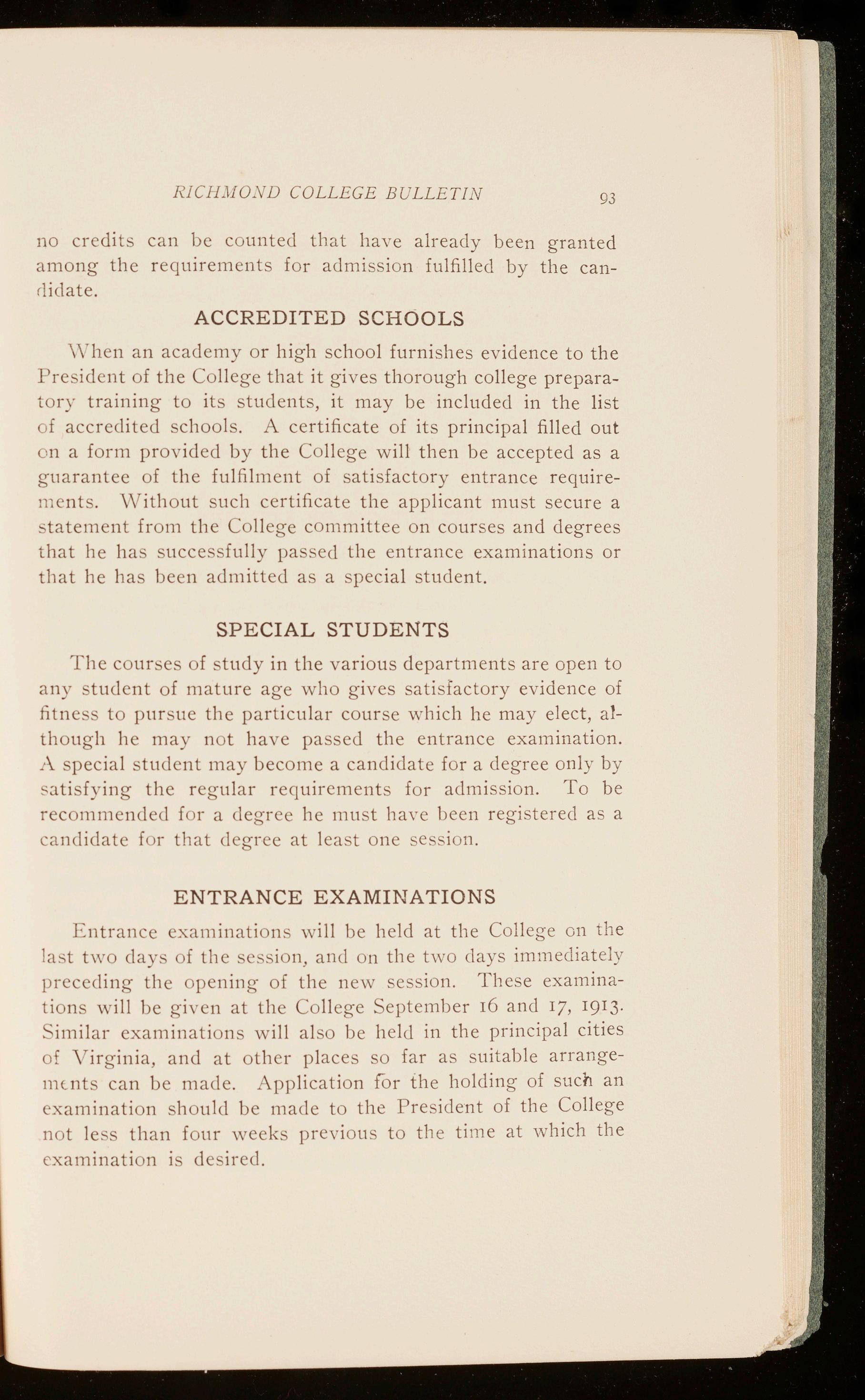
no credits can be counted that lia Ye already been granted among the requirements for admission fulfilled by the canrliclate.
\ \ ' hen an academy or high schoo l furnishes evidence to the President of the College that it gives thorough college preparatory training to its students, it may be included in the list f accrecliled schools. A certificate of its principal filled out o n a form prov id ed by the College will then be accepted as a guarantee of the fulfilment of satisfactory entrance requireme nts. vVithout such certificate the applicant must secure a statement from the College committee on courses and degrees that he ha s successfully pas eel the entrance examinations or that he has been admitted as a special student.
The courses of study in the various departments are open to any tudent of mature age who gives satisfactory evidence of fitne - lo pm ue the particu lar course which he may elect, although he may n o t h ave pa sed the entrance examination. A special s tudent may become a candidate for a degree only by sa tisfying the regular requirement s for admission. To be recommended for a degree he must haYe been regi stered as a candidate for that degree at le ast one session .
Entrance examinations will be held at the College on the last two days of the sess ion, and on the two days imm ediately preceding the ope ning of the new sessio n. These examinations will be given at the College eptember 16 and 17, 1913. Sim ilar examinations will also be held in the principal cities of Virginia, and at other places so far as suitable arrangemc.nt can be made. Application for the holding of such an examination sho uld be made to the President of the College not le ss than four weeks previous to the time at which the examination is desired.
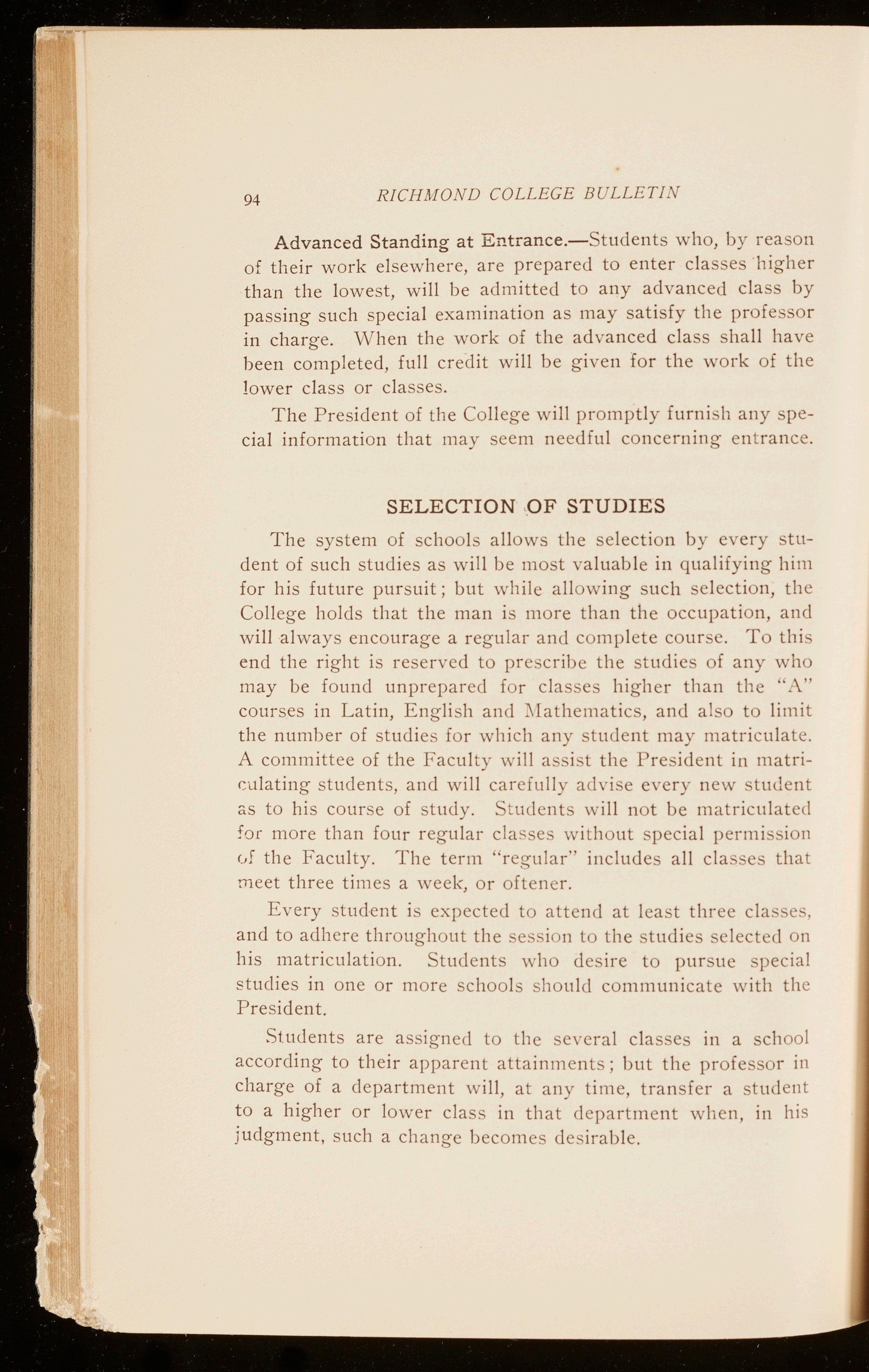
Advanced Standing at Entrance.-Students who, by reason of their work elsewhere, are prepared to enter classes higher than the lowest, will be admitted t o any advanced cla ss by passing such specia l examination as may satisfy the professor in charge. When the work of the ad va nced class sha ll have been completed, full credit wi ll be given for the work of the lower class or clas ses .
The President of the College will promptly furnish any pecial information that may seem needful concerning entra n ce.
The system of schools allows the selection by every student of such studies as will be most valuab le in qualifying him for his future pursuit; but while allowing such se lection, the College holds that the man is more than the occupation, and will always encourage a regul ar and comp lete course. To this end the right is reserved to prescribe the studies of any who may be found unprepared for classes higher than the "A" courses in Latin, English and :\Iathematics, and al o to limit the number of st udi es for which any tudent may matriculate. A committee of the vacuity will a s ist the President. in matric:ulating students, and will carefully advise every n ew stu<lent as to his course of study. S t udents wil l not be matriculated for more than four regular cla%es without specia l permi sion r.,f the Faculty. The term "regular'' includes all cla sses that meet three times a week, or oftener.
Every student is expected to at.tend at least three clas ses, and to adhere throughout the session lo the stud ies selected on his matriculation. Students who desire to pursue pecial studies in one or more schoo ls s hould communicate with th e President.
StuJents are assigned to the several classes in a scho ol according to their apparent attainment. ; but the professor in charge of a department will, at any lime, transfer a student to a higher or low er class in that department when, in his judgment, such a change becomes de irable.
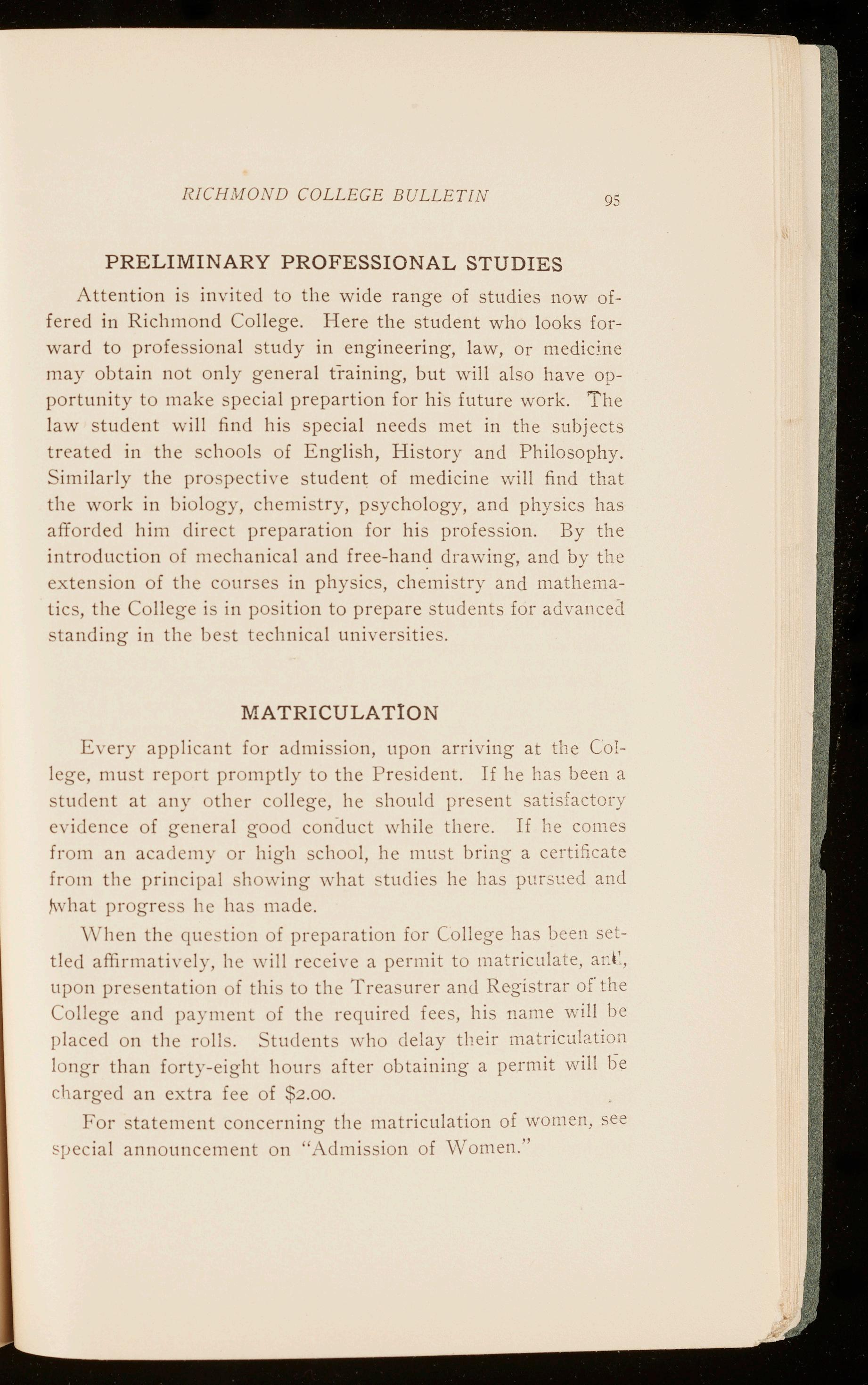
Atten ti on is in v ited to the wide range of stud ies now offered in Richmond College. Here the student who looks forwa r d to profes iona l study in eng ineering, law, or medicine may obtain not on ly genera l traini n g, but will also have opportunity to make special prepartion for his future work. The law tudent wi ll find h is specia l needs met in the subjects t r eated in the ch oo ls of Eng li sh, History and Philosophy . Sim ila rl y th e prospect ive s tu dent of med icine will find that the wo r k in bio logy, chemist r y, p ycho logy, and physics has afforded him d irect preparation for h is profession. By the i ntroduction of mechanical and free-hand drawing, and by the extension of the cour es in phy · ic , chemistry and mathematics, the Colleo-e is in position to prepare students for ad \·anceu. standino- in the best technical uni, ·ersities.
Every applicant for admis ion, upon arriving at the College, must rep o rt promptly to the President. If he has been a student at any other college, he should present satisfactory e\·idence of general good conduct while there. If he comes from an academy or high chool, he must bring a certificate from the principal showing \\ ·hat ,-tuclies he has purst:eJ and /what progress he ha · made.
\\ ' hen the que~tion of preparation for College has been settled affirmali\ ·ely, he will receive a permit to matricula te, ad'., upon presentation of this to the 1 reasurer and Registrar of the College ancl payment of the required fees, his name will be placed on the rolls. tuclents who delay their matricubtion lo ngr than forty-eight hours after obtaining a permit will 15e ch arged an extra fee of $2.00.
For statement concerning the matriculation of women, see ~pecial announcement on ".\dmi·sion of \\ 'ome n.''
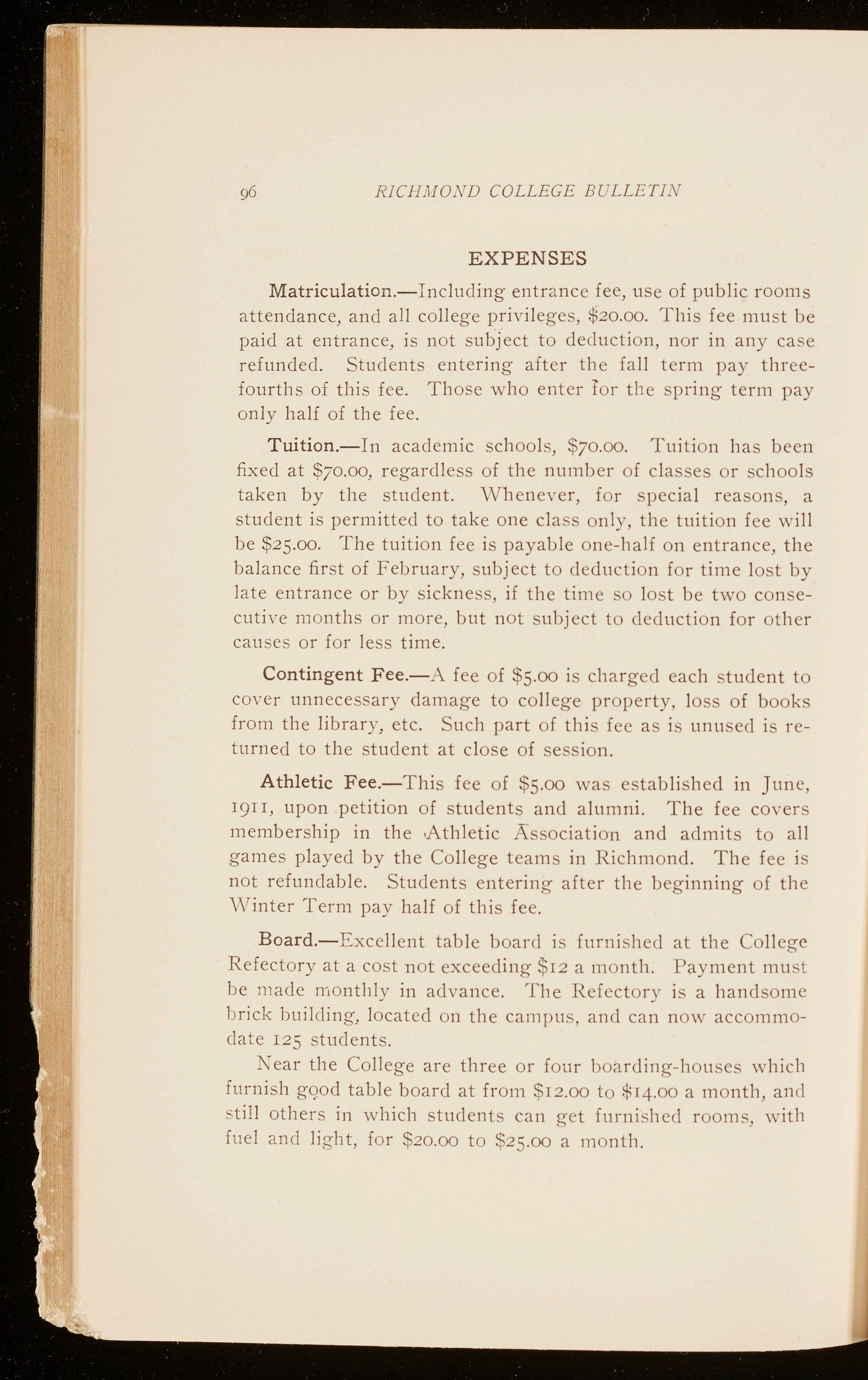
Matriculation.-Including entrance fee, use of public rooms attendance, and all college privileges, $20.00. This fee must be paid at entrance, is not subject to deduction, nor in any case refunded. Students ente rin g after the fall term pay threefourths of this fee. Those who enter Ior the spring term pay only half of the fee.
Tuition.-In academic schoo l , $70.00. Tuition has been fixed at $70.00, regardless of the number of c lasses or sc h oo l s taken by the student. \ Vh enever, for spec ia l reasons, a student is permitted to take one cla sonly, the tuition fee will be $25.00. The tuition fee is payable one-half on entrance, the balance first of February, subject to deduction for time lost by late entrance or by sickness, if the time so lo t be two consecutive months or more, but not subject to deduction for other causes or for less time.
Contingent Fee.- A fee of $5.00 is charged each student to cm·er unnecessary damage to college property, loss of book from the librar y, etc Suc h part of this fee as is unu eel is returned to the student at c lose of session.
Athletic Fee.- This fee of $5.00 was estab li shed in June, 1911, upon petition of st ud ents and alumni. The fee coYers membership in the ,Athle tic Associat ion and admits to a ll games played by the Co ll ege teams in Richmond. The fee is not refundable. Students entering after the beginning of the \\Tinter Term pay half of this fee.
Board.- Exce ll ent table board is furnished at the Co llege Refectory at a cost not exceed in g $12 a month. Payment must be made monthly in advance. The Refectory is a hand ome brick building, located on the campus, and can now accommodate 125 students.
Kear the College are three or four boarding-houses which furnish gqod table board at from $12.00 to $r4.oo a month, ancl sti!l others in which students can get furnished rooms, with fuel and light, for $20.00 to $25.00 a month.
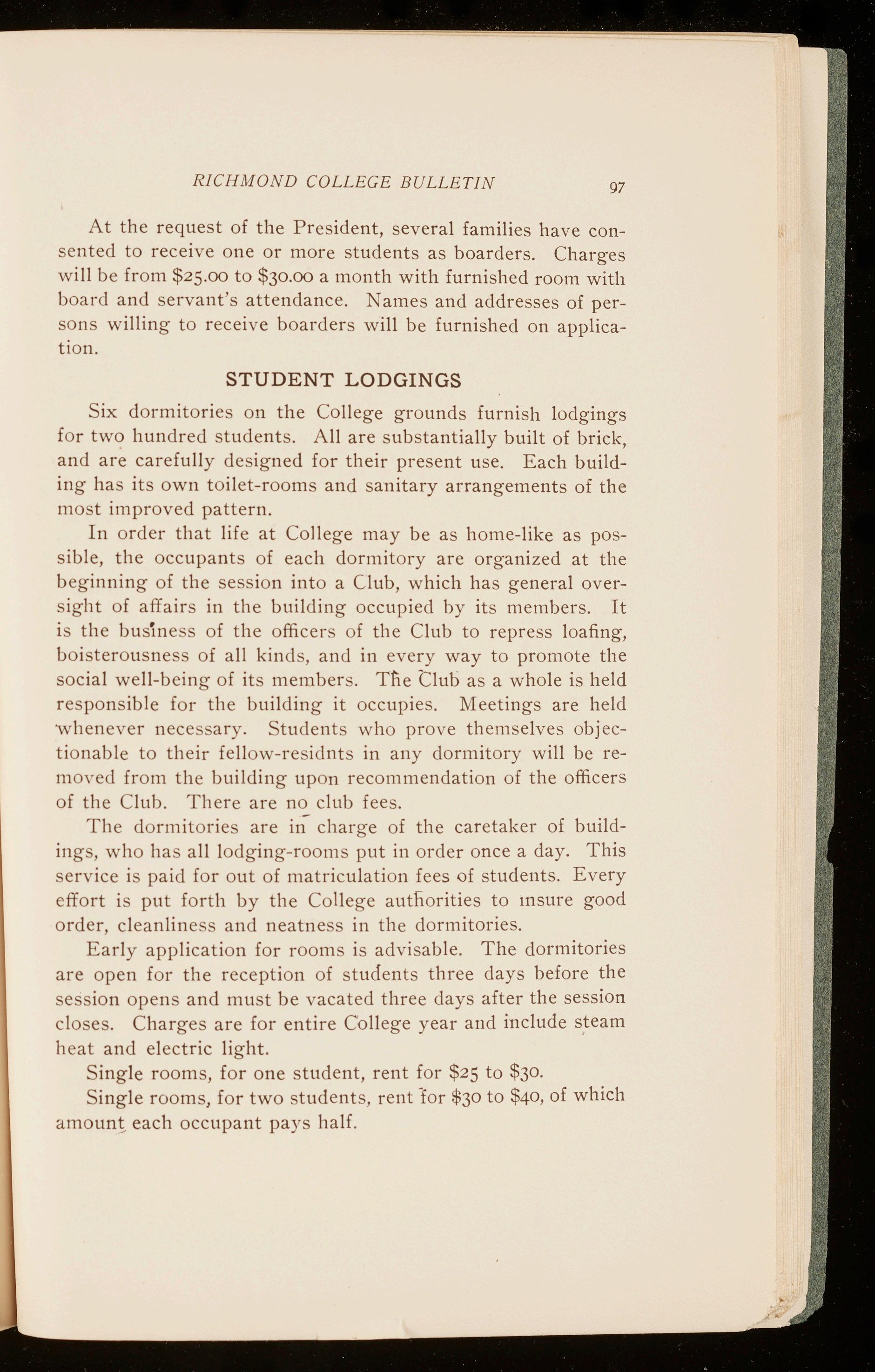
At the request of the President, several families have consented to receive one or more students as boarders. Charges will be from $25.00 to $30.00 a month with furnished room with board and servant's attendance. Na mes and addresses of persons willing to receive boarders will be furnished on application.
Six dormitories on the College grounds furnish lodgings for two hundred students. All are substantially built of brick, and are carefully designed for their present use. Each building has its own toilet-rooms and sanitary arrangements of the most improved pattern.
In order that life at College may be as home-like as possible, the occupants of each dormitory are organized at the beginning of the session into a Club, which has general oversight of affairs in the building occupied by its members. It is the busfoess of the officers of the Club to repress loafing, boisterousness of all kinds, and in every way to promote the social well-being of its members. Tne Club as a whole is held responsible for the building it occupies. Meetings are held whenever nece sary. Students who prove themselves objectionable to their fellow-residnts in any dormitory will be remoYed from the building upon recommendation of the officers of the Club. There are no club fees.
The dormitories are i1; charge of the caretaker of buildings, who has all lodging-rooms put in order once a day. This service is paid for out of matriculation fees of students. Every effort is put forth by the College autfiorities to msure good order, cleanline s and neatness in the dormitories.
Early app lication for rooms is advisable. The dormitories are open for the reception of students three days before the session opens and must be vacated three days after the session closes. Charges are for entire College year and include steam heat and electric light.
Single rooms, for one student, rent for $25 to $30.
Single rooms, for two tudents, rent for $30 to $40, of which amount each occupant pays half.
Double r ooms (bed -r oom and st udy), for tw o s tudent s, rent for $40 to $50, of which amount each occupa nt pays half.
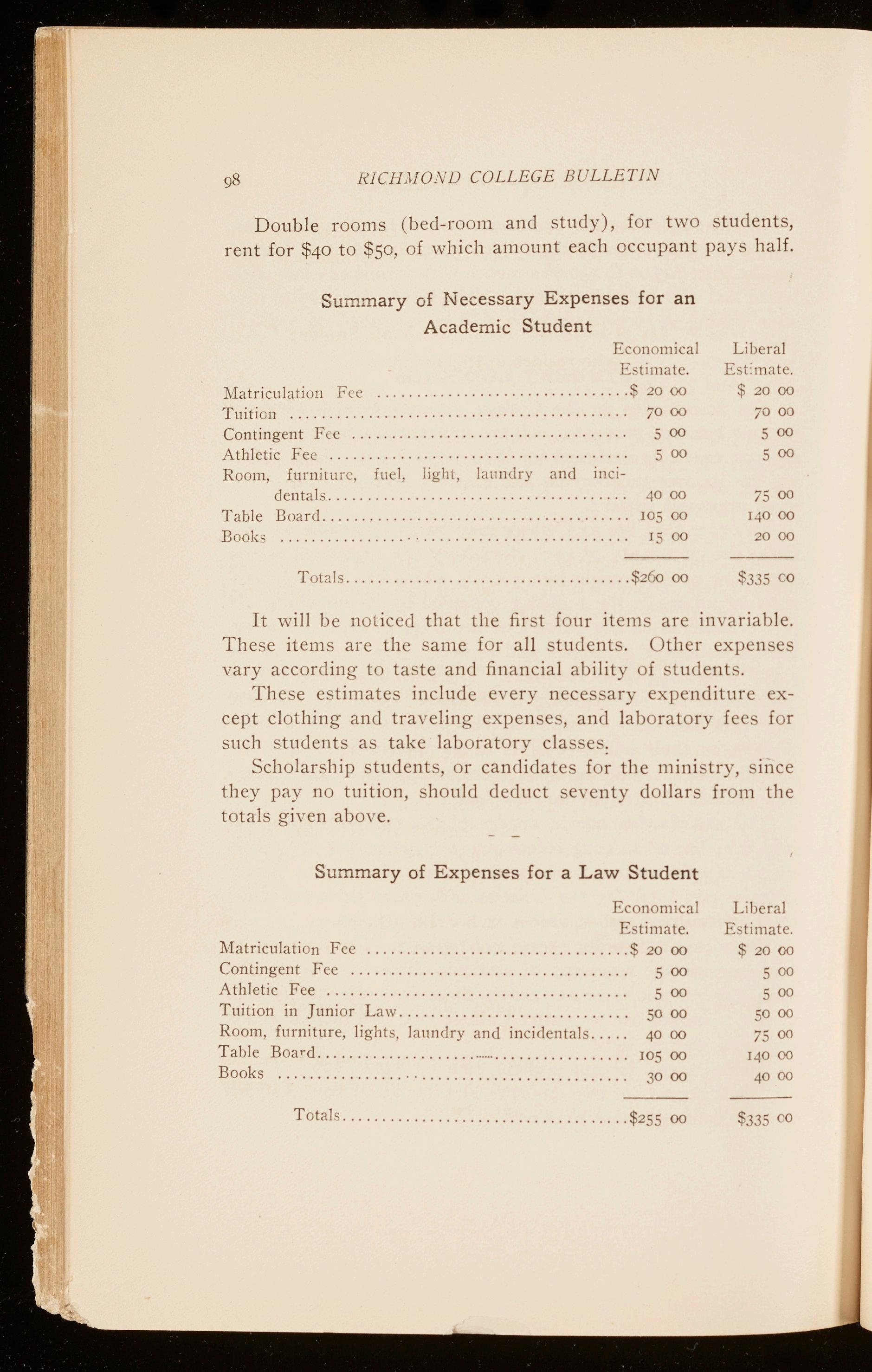
It will be not iced that the first four items are invariable. These it ems are the same for a ll st u dents. Othe r expenses vary according to taste a nd financial ability of st u de nt These estimates include eve r y n ecessary expend itur e except clothing and trave lin g expenses, and laborato r y fe es for suc h students as take laborato r y classes: Schola r ship students, or cand id ates for the ministry, rnce they pay no tuition, s h ou ld deduct seventy dollars from the totals g iven above.
Tuition in Jun ior Law
furniture, light s, laundry an d incidentals
Boa rd
Stude nt s in Senior Law should add twenty-five dollars to totals in fo r egoi ng table in orde r t o obtai n estimate of their expe n ses.
Summary of Expenses for an Academic Student who resides in Richmond
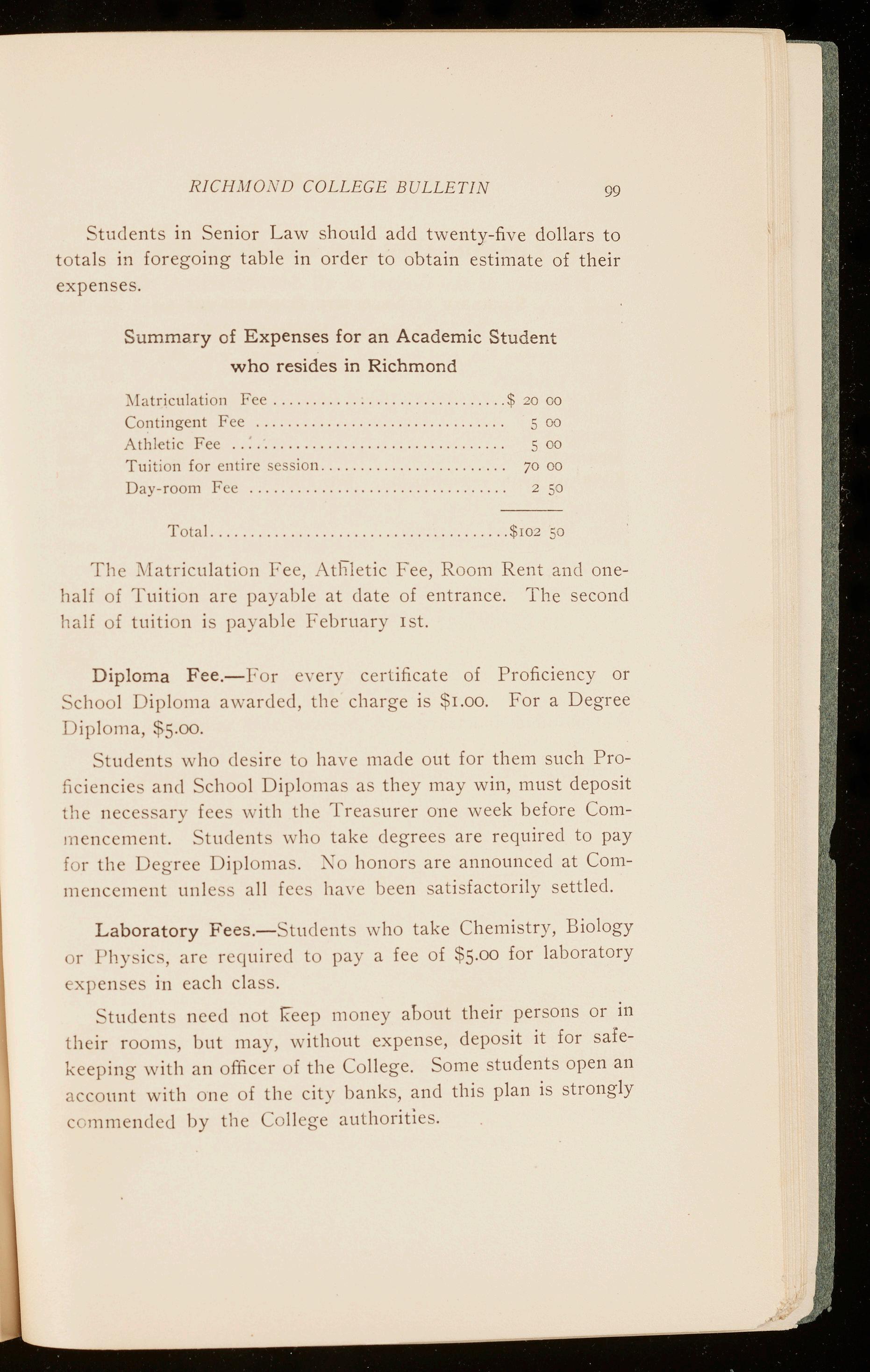
The :\latriculation Fee, Atfiletic Fee, Room Rent and onehalf of Tu i tion are payab le at elate of entrance. The second half of tuiti o n is payable February rst.
Diploma Fee.- For every certificate of Proficiency or choo l D i ploma awarded, the charge is $r.oo. For a Degree D iploma, S5.oo.
tudents wh o clesire to have made out for them such Proficie n cies a ncl Schoo l D iplomas as they may w in , must deposit the nece ssary fee s wit h the Treasurer one week before Commencement . tudent who take degrees are required to pay fo r the Degree Diploma . Xo honors a r e announced at Commencement unl ess al l fees ha, ·e been atisfactori ly sett l ed.
Laboratory Fees.- 't uclent s who take Chemistry, Biology or Phy ·ics, a r c requirccl t o pay a fee of $5.00 for la borato r y expe n ses in eac h clas
St u dents n eed n ot Keep money about their persons or in their rooms, but may, w ithout expense, deposit it for safekeeping w ith an office r of the College. Some students open an acco unt with o ne of th e city banks, and this plan is strong ly com mencled by the Col lege author it ies.
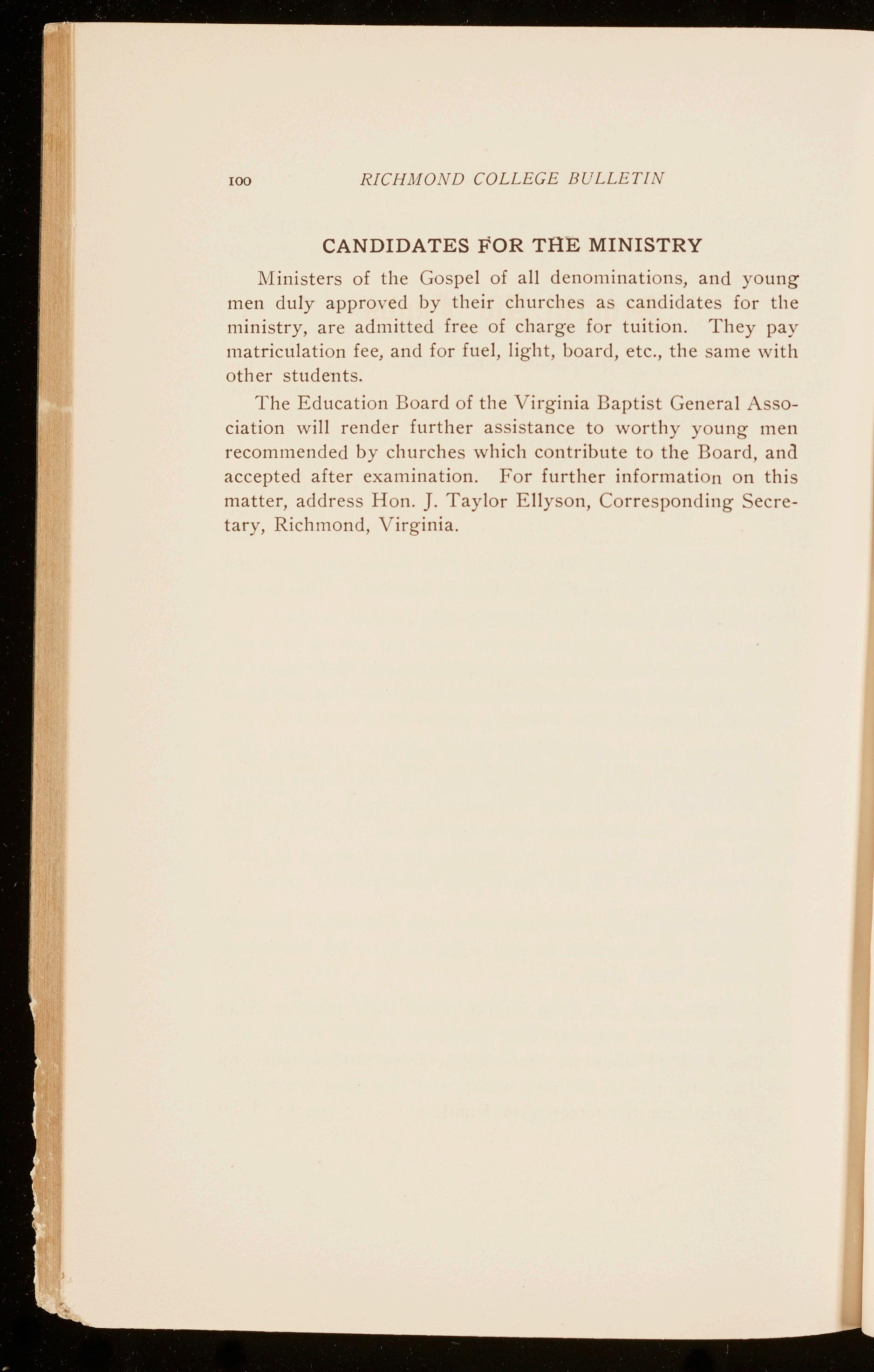
Ministers of the Gospel of a ll denominations, and young men du ly approved by their churches as candidates for the m i nistry, are admitted free of charge for tuition. They pay matricu lation fee, and for fuel, light, board, etc., the same with other students.
The Education Board of the Virginia Baptist Genera l Association will render further assistance to worthy young men recommended by churches which contribute to the Board, and accepted after examination. For further information on this matter, address Hon. J. Taylor E llyson, Corresponding Secretary, Richmond, Virginia.
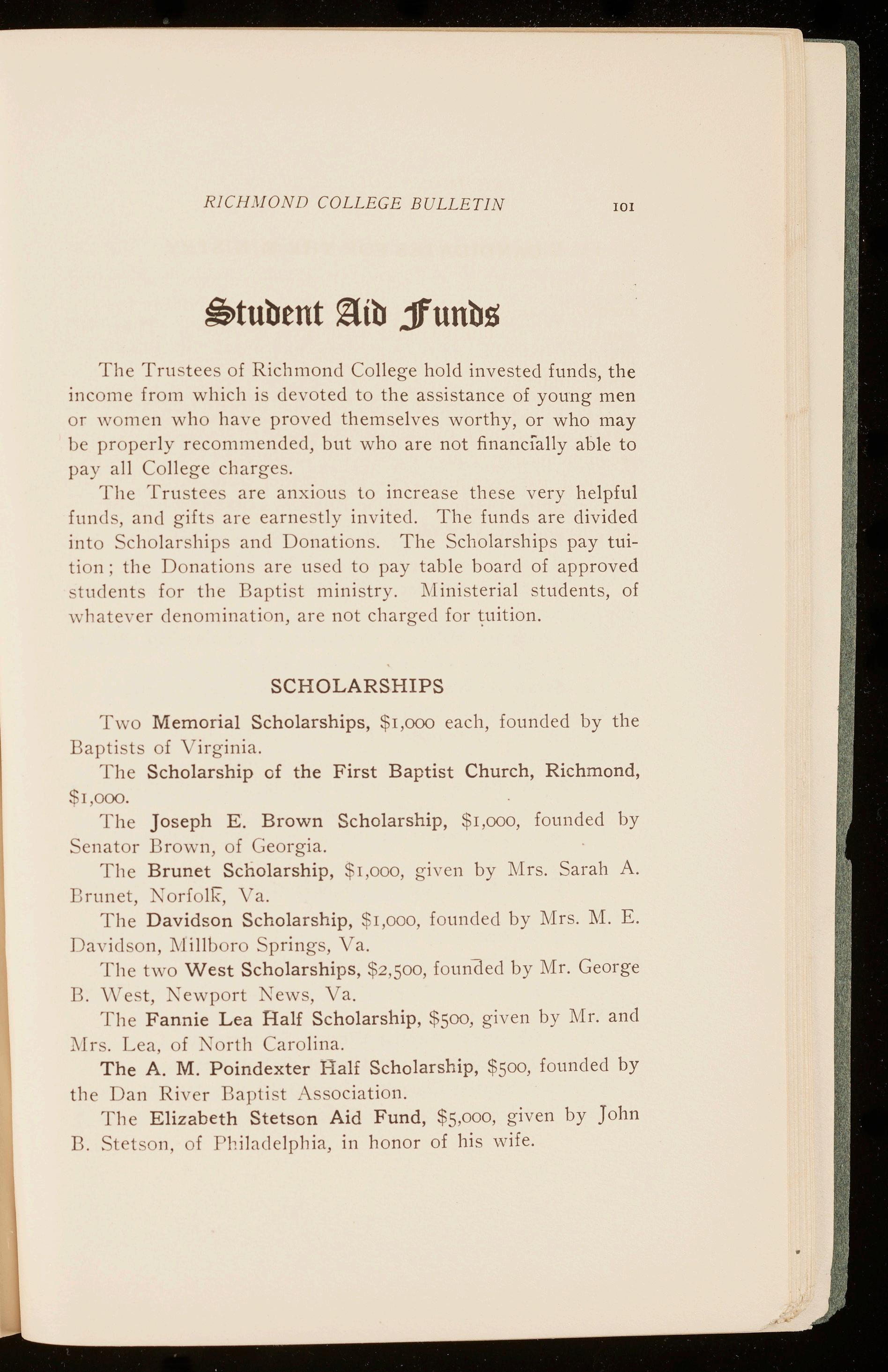
The Trustees of Richmond College hold invested funds, the income from which is devoted to the assistance of young men or wome n who hav e proved themselves worthy, or who may be properly rec omme nd ed, but who are not financfally able to pay a ll College charges.
The Trustees are anxious to incr ease these very helpful funds, a nd g ift s are earnest ly in vited. The fund s are divided into Sc h o lar sh i ps and Donations. The Scholarships pay tuition; t h e Donations are u sed to pay table b oa rd of approved student for the Baptist mini s tr y. 1\finisterial stu dent s, of whatever denomination, are n ot charged for tuition.
Two Memorial Scholarships, $1,000 each, founded by the Baptists of Virginia .
The Scholarship of the First Baptist Church, Richmond, $1,000.
The Joseph E. Brown Scholarship, $1,000, founded by Senator Brown, of Georgia.
The Brunet Sdiolarship, $1,000, given by Mrs. Sarah A. Drunet, N"orfo!K, Va.
The Davidson Scholarship , $1,000, founded by Mrs. M. E. Davidso n , l\ lillb oro Spri n gs, Va.
The two West Scholarships, $2,500, founaed by Mr. George B. \Vest, N"ewpo rt News, Va.
The Fannie Lea Ralf Scholarship, $500, given by Mr. and Mrs Lea, of North Caro lina
The A. M. Poindexter :A:alf Scholarship, $500, founded by the Da n River Baptist Associat io n.
The Elizabeth Stetson Aid Fund, $5,000, given by John B. Stetso n , of Phi lad elphi a, in honor of hi s wife.
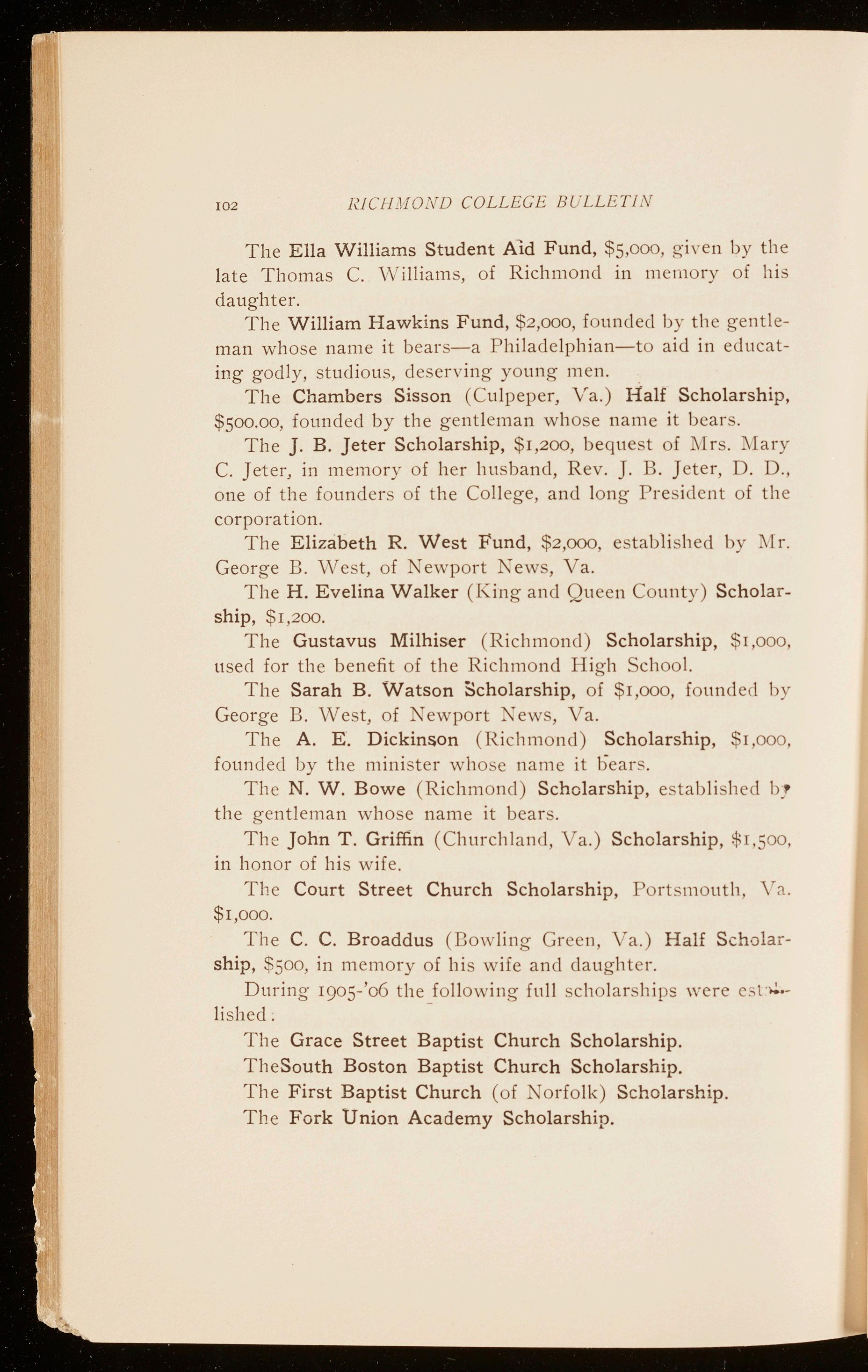
The Ella Williams Student Ald Fund, $5,000, g-i\·en by th e late Thomas C. \ Villiams, of Richmond in memory of his daughter.
The William Hawkins Fund, $2,000, founded by the gentleman whose name it bears-a Philadelphian-to aid in educating godly, stud ious, deserving young men.
The Chambers Sisson (Culpeper, Va.) Half Scholarship, $500.00, founded by the gentleman whose name it bears.
The J. B. Jeter Scholarship, $1,200, bequest of 1Irs. Mary C. Jeter, in memory of her husband, Rev J. B. Jeter , D. D., one of the founders of the College, and lon g President of th e corporati o n.
The Elizabeth R. West Fund, $2,000, established by 1Ir. George D. \Nest, of Newport News, Va.
The H. Evelina Walker (K ing and Queen County) Scholarship, $1,200.
The Gustavus Milhiser (Richmond) Scholarship, $1,000, used for the benefit of the Richmond High School.
The Sarah B. Watson Scholarship, of $1,000, founded by George B. West, of Newport rews, Va.
The A. E. Dickinson (R ichmond) Scholarship, $1,000, founded by the minister whose name it bear..
The N. W. Bowe (R ichm ond) Scholarship, established b,' the gentleman whose name it bears.
The John T. Griffin (Churchland, Va.) Scholarship, $1,500, in honor of his wife.
The Court Street Church Scholarship, Port mouth, Va. $1,000.
The C. C. Broaddus (Bowling Green, Va.) Half Schola rship, $500, in memory of hi s wife and daughter.
During 1905-'06 the following full scho la r hips \\·ere e::;t·.!,li shed.
The Grace Street Baptist Church Scholarship.
TheSouth Boston Baptist Church Scholarship.
The First Baptist Church (of orfo lk) Scholarship.
The Fork Union Academy Scholarship.

The George W. Riggan Scholarship, by friends m the Portsmouth Association.
The Samuel Thomas Dickinson Scholarship, by the alumnu s wh ose n ame it bears.
T h e I. B. Lake Scholarship, by the Uppervi ll e Baptist C hur c h , in honor of their pastor.
The James T. Borum Scholarship, by the gentleman whose name it bears.
The Joseph :Bryan Scholarship, founded by the donor for th e benefit of deserving st ud e nt s from Richmond.
In 1907 the following sc h o lars hip s were established:
The Tabernacle Baptist Church Scholarship.
The John Sharpe Eubank Scholarship.
The T. H. Ellett Scholarship .
In 1908 funds to cstab lis li sc h o lar sh ips were received as fo ll ows:
A Scholarship fou nd ed by l\Irs. Sarah B. Kiele\.
A Scholarship founded by Mrs. C. D. Goodwin, of Orange Cou nty.
A Scholarship fo un ded by the Pine Street Baptist Church of Richmond.
A Scholarship founded by his wife in honor of Ju dge Robert H. Bea le, of \ Vestmore land county.
A Special Scholarship founded by l\1r. J. J. Mo nt ague, of Richmond, t o be u se d at the option of the donor either in Richmond Co ll ege or in th e Richmond Academy.
The William Thomas Hudgins Scholarship, founded by Mr. T. A rchibald Cary, of Richm ond.
The Susan E . Starke Scholarship, founded by Mr. E. D. 'Starke, of Richmond, in h onor of his deceased wife.
A Scholarship of $1,000, founded by a lad y who prefers to be known as "A Friend of Christ ian Education."
During 1910 the scho lar s hip s named below were completed and are n o w available for use. In most cases the nomination to th e benefits is in th e hand s of th e donor during his lifetime :
!0 4

Th e Frances Ann Leiper Crouch Scholarship, fo un ded by D r . R. G. C r o u ch in h o n or of hi s w ife .
T h e Luther Wright George Scholarship, fo u nded by Mr. H. H. George, J r., in memory of hi s so n , w h o, at t h e time of hi s la m en ted deat h by acc ident, was a student in Ric h mond Co ll ege .
T h e Eva Baker Gwathmey Scholarship , founded by Mr Basi l M Gwa t hmey, of R ich mo n d
T h e Robert Eugene Lockett Scholarship , founded by h i s parents, Capt. E. F. and Mrs. Lucy Lockett, of Crewe, Va , to hono r t h e memory of their son, a former student of Richmond College.
A Scholarship established by :Hrs :l\lary E. vVinch and Mrs. Kate R. vYinch, of Richmond.
A Schola rshi p established by :i\fr. 'N. E. Harris, of Richmond.
A Sc ho lar sh ip established by Mr. P. A. Fore, of Richmond.
A Sch olarship established by l\lr. and Mrs. E. T. Ivey, of Newport 1\ ews, Va
A Spe c ial Schol arsh ip founded by Mr. R. L. Dames, o f Richmond.
A Schola rship founded by Mr. J. H Brin so n, of Hampton.
A Scholar sh ip founded by l\J r s . l\Iartha P. Tay lor, of 1\ ewport news, Va.
A Scnolar shi p founded by l\Ir. Skye V. Stra ley, of Princeton, \V. Va.
A Sch ola rship founded by l\Jr. John P. Branch, of Richmond, for the benefit of a student to be appointed by the stewards of Centenary :\Iethodist Episcopa l Church, Richmond, Va.
The John P . Bran ch Scho larshi p, founded by :\Ir. ?II. C. Branch, of Richmond.
The E. Carrington Cabell Scholarshi p, founded by Mr. H. L. Cabe ll , of Richmond, in honor of his brother, a distingu i shed a lumn u s of Ric h mond Co ll ege.
The William F. Harwood Scholarsh ip founded by Col. Jo hn S. Harwood and l\Ir. R. H. Harwood, in honor of tfieir fat h er .
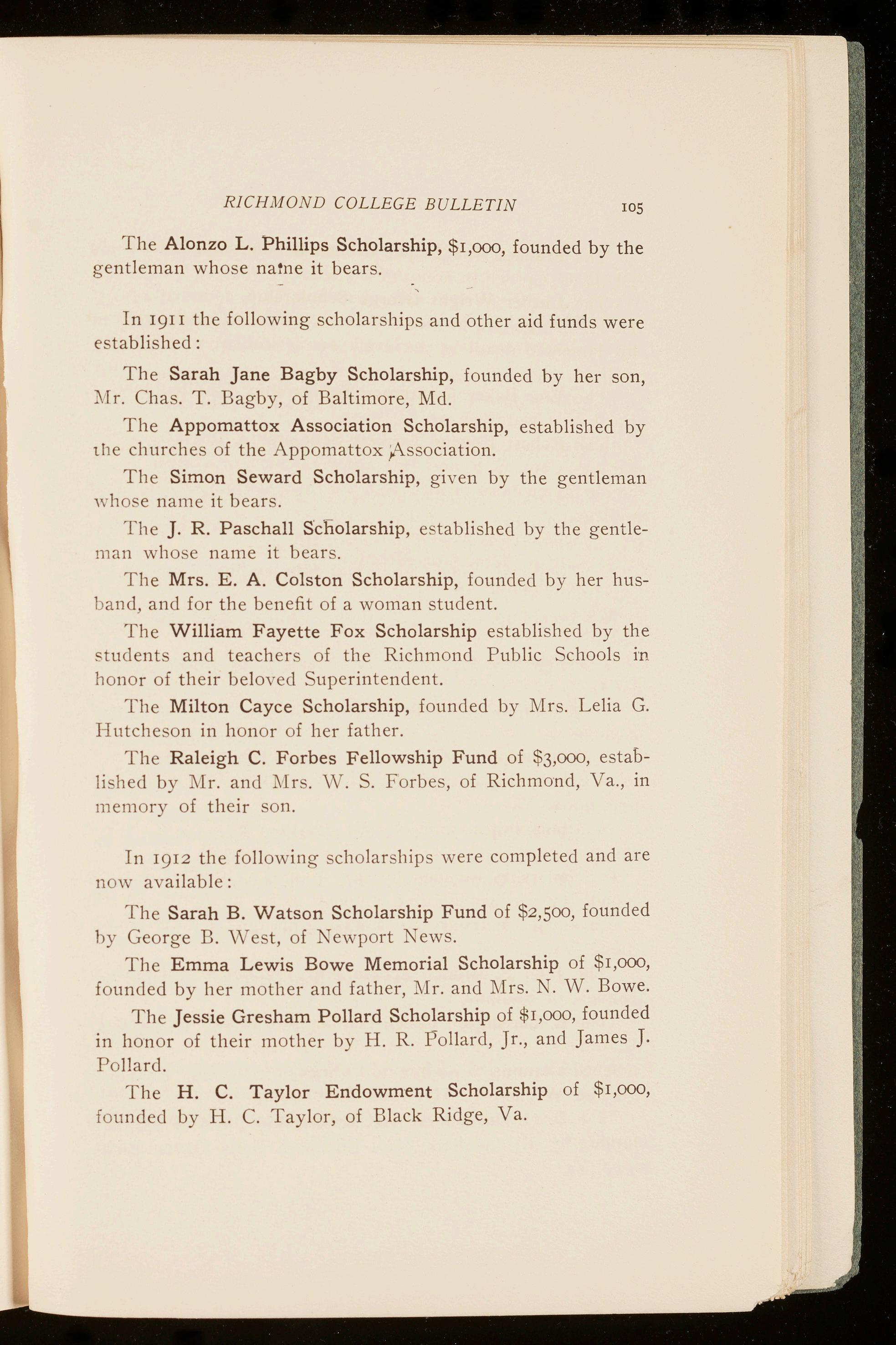
The Alonzo L. '.Phillips Scholarship, $1,000, founded by the ge ntleman who s e natne it bear s .
In 191 l the following scholarships and other aid funds were established:
The Sarah Jane Bagby Scholarship, founded by her son, l\ Ir . Cha s. T. Bagby, of Baltimore, Md.
The Appomattox Association Scholarship, established by 1lle churches of the Appomattox ;,Association.
The Simon Seward Scholarship, given by the gentleman whose n ame it b ea r s.
The J. R. Paschall Sdiolarship, estab li shed by the gentleman whose name it bears.
The Mrs. E. A. Colston Scholarship, founded b y her husband, and for the benefit of a woma n stude nt.
The William Fayette Fox Scholarship established by the students a nd teach e r s of the Richmond Public Schools m hono r of their beloved Superintendent.
The Milton Cayce Scholarship, founded by Mrs. Lelia G. Hutcheson in honor of her father.
The Raleigh C. Forbes Fellowship Fund of $3,000, established by M r. and l\Irs. W. S. Forbes, of Richmond, Va., in memory of their son.
In 1912 th e fo ll ow in g scholarsh ips were com pl eted and are now ava ilabl e:
The Sarah B. Watson Scholarship Fund o f $2,500, founded hy Geo r ge B. Wes t , of Newport News.
The Emma Lewis Bowe Memorial Scholarship of $1,000, founded by h er mother and father, M r. a nd l\Irs. N. W. Bowe.
The Jessie Gresham Pollard Scholarship of $1,000, founded in honor o f their mother by H. R. Pollard, Jr., and James J . Pollard
T he H. C. Taylor Endowment Scholarship of $1,000, founded by H. C. Taylor, of Black Ridge, Va.
ro6
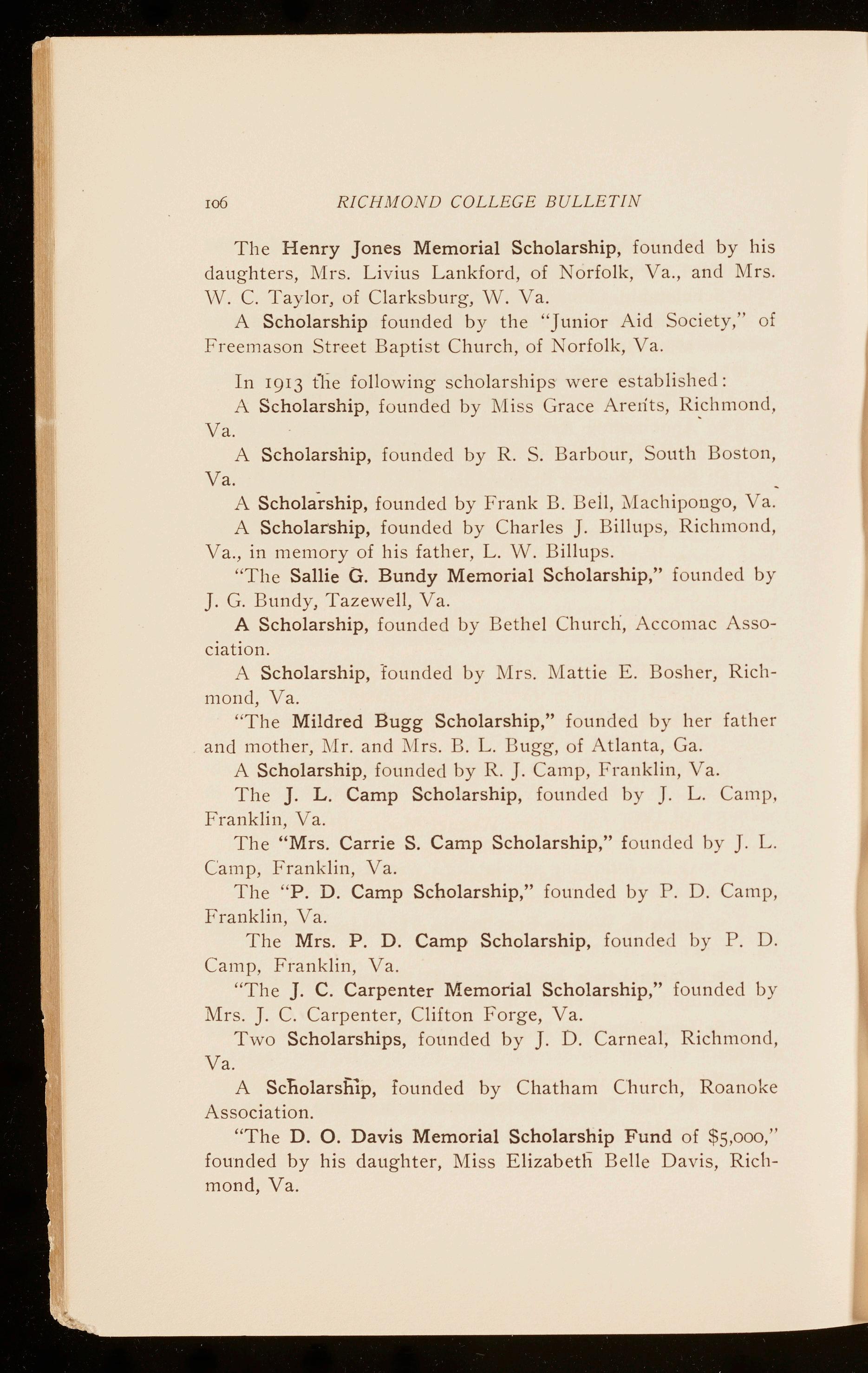
The Henry Jones Memorial Scholarship, founded by his daughters, Mrs . Li vius Lankford, of No rfolk , Va , and M r s. \V. C. Taylor, of Clarksburg, W Va.
A Scholarship founded by the "Ju ni or Aid Society," of Freemason Stree t Baptist C hur ch, of No rfolk , Va.
In 1913 tlie fo ll owing scho larsh ip s we r e established:
A Scholarship , founded by l\Iiss Grace Aredts, Richmond, Va.
A Scholarship, founded by R. S. Barbour, South Boston, Va.
A Scholarship, founded by Frank B. Bell, i\Iachipongo, Va.
A Scholarship, founded by C h ar les J. Billups, Richmond, Va., in memory of his father, L. 'vV. Bi llu ps.
"The Sallie G. Bundy Memorial Scholarship," fo un ded by J. G. B und y, Tazewell, Va.
A Scholarship, founded by Bethe l Church, Accomac Assoc iati on.
A Scholarship, rounded by Mrs. Mattie E. Bosher, Richmond, Va.
"T h e Mildred Bugg Scholarship," fou nd ed by h er father and mother, l\Ir. and l\Irs. B. L. B u gg, of Atlanta, Ga.
A Scholarship , founded by R. J. Camp, Franklin, Va.
The J. L. Camp Scholarship, founded by J. L. Camp, Frank lin , Va.
The "Mrs. Carrie S. Camp Scholarship," founded by J. L. Camp, Franklin, Va.
The "P. D. Camp Scholarship," founded by P. D. Camp, Franklin, Va.
The Mrs. P. D. Camp Scholarship, fou nd ed by P. D. Camp, Frank lin , Va.
"The J. C. Carpenter Memorial Scholarship ," founded by Mrs. J. C. Carpenter, Clifto n Forge, Va .
Two Scholarships, founded by J. D. Carnea l, Richmond, Va.
A Scnolarsii1p, founded by Chatham C hur ch, R oanoke Association.
"The D. 0. Davis Memorial Scholarship Fund of $5,000," founded by his dau ghter, Miss Elizabetn Be ll e Davis, Richmond, Va.

"The E. M. Foster Scholarship," founded by his wife, Mrs. J. Annie Foster, Richmond, Va.
A Scholarship, founded by Dr. Robert Frazer, Lahore, Va.
A Scholarship, founded by John T. Griffin, Churchland, Va.
"The Miss Hardinia M. Gwathmey Scholarship," by 0. 0. Gwathmey and Beulah Church, Hermon Association.
"The Clarence Gresham Memorial Scholarship," founded by Thomas Gresham, Richmond, Va.
A Scholarship, founded by E. A. Hartley, Petersburg, Va.
A Scholarship, founded by J. T. Jennings, Lynchburg, Va.
A Scholarship, founded by W. A. Julian, Cincinnati, 0.
"The Charles S. Jurgens Memorial Scholarship," founded by J. F. B. Jurgens, Richmond, Va.
"The Reps Jones Scholarship," founded by Reps Jones, La wrencesville, Va.
A Scholarship, founded by Thomas F. J e:ffress, Richmond, Va.
A Scholarship, founded by Egbert G. Leigh, Richmond, Va., in memory of his brother, Junius E. Leigh.
A Scholarship founded by Liberty Church, Appomattox Association.
A Scholarship, founded by l\Iill Swamp Church, Blackwater Association.
A Scholarship, founded by "\Varner Moore, Richmond, Va., in memory of his daughter Marie Jane Moore.
"The Rev. William Laws Memorial Scholarship" founded by W. H. Matthews, Assowoman, Va.
A Scholarship, founded by Thomas L. Moore, Richmond, Va. in memory of Dorothy A. Moore.
A Scholarship in honor of Dr. J. C. Riden, contributed by Monroe Baptist Church and L. H. Jenkins, of Richmond, Va.
A Scholarship, established by an Alumnus of the Class of 1871.
A Scholarship in Memory of Mrs. Mary Jordan Miller, founded by John B. Miller, Sperryville, Va., and Robert E. Miller vVood ville, Va.
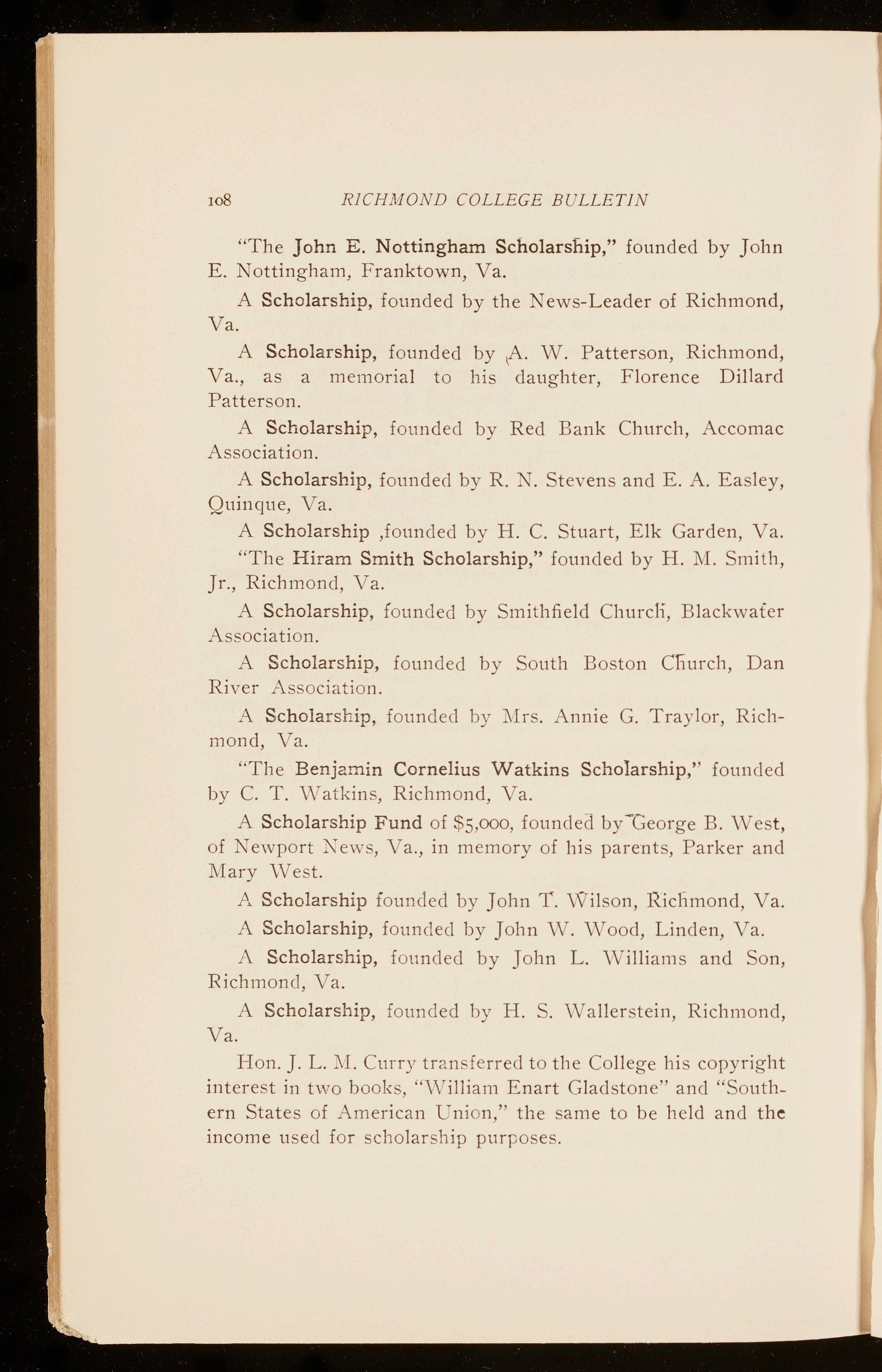
"The John E. Nottingham Scholarship," founded by John E. Nottingham, Franktown, Va.
A Scholarship, founded by the News-Leader of Richmond, Va.
A Scholarship, founded by \A. W. Patterson, Richmond, Va., as a memorial to his daughter, Florence Dillard Patterson.
A Scholarship, founded by Red Bank Church, Accomac Association.
A Scholarship, founde<l by R. N. Stevens and E. A. Easley, Quinque, Va.
A Scholarship ,founded by H. C. Stuart, Elk Garden, Va.
"The Hiram Smith Scholarship," founded by H. M. Smith, Jr., Richmond, Va.
A Scholarship, founded by Smithfield Churcli, Blackwater Association.
A Scholarship, founded by South Boston Cnurch, Dan River Association.
A Scholarship, founded by :Mrs. Annie G. Traylor, Richmond, Va.
"The Benjamin Cornelius Watkins Scholarship," founded by C. T. \i\Tatkins, Richmond, Va.
A Scholarship Fund of $5,000, foundecl by-George B. vVest, of Newport K ews, Va., in memory of his parents, Parker and Mary \Vest.
A Scholarship founded by John T. Vvilson, Ricfimond, Va.
A Scholarship, founded by John \iV. \i\Tood, Linden, Va.
A Scholarship, founded by John L. \Villiams and Son, Richmond, Va.
A Scholarship, founded by H. S. \Vallerstein, Richmond, Va.
Hon. J. L. M. Curry transferred to the College his copyright interest in two books, "\Villiam Enart Gladstone" and "Southern States of American Uni o n," the same to be held and the income used for scholarship purposes.
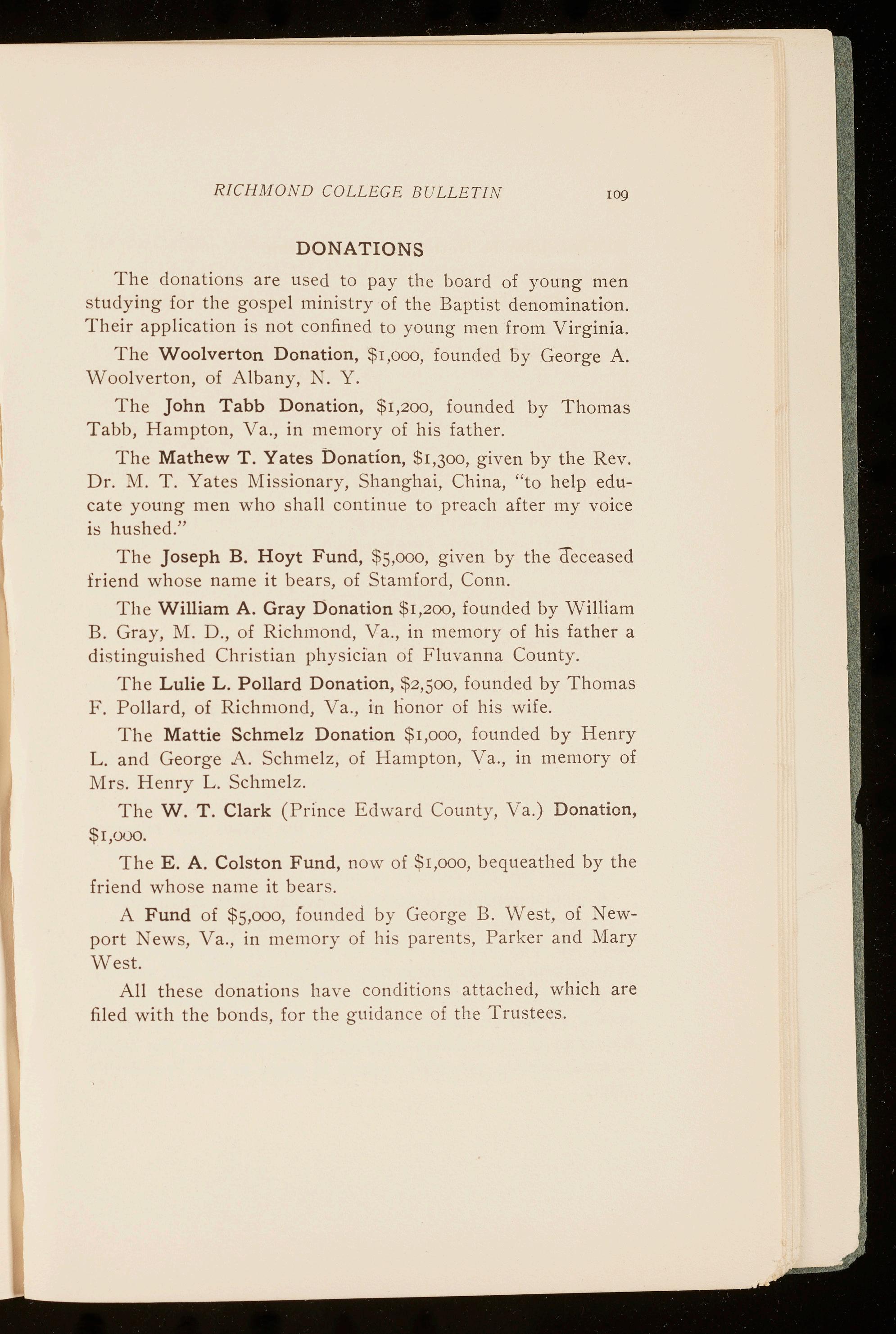
The donations are used to pay the board of young men studyi n g fo r the gospe l ministry of the Baptist denomination. Their application is not confined to young men from V irginia.
The Woolverton Donation, $1,000, founded by George A. Woolverton, of Albany, N. Y.
The John Tabb Donation, $1,200, founded by Thomas Tabb, Hampton, Va ., in memory of his father.
The Mathew T . Yates Donation, $1,300, given by the Rev. Dr. M. T. Yates Missio nar y, Shanghai, China, "to help educate young men who shall continue to preach after my vo ice is hushed."
The Joseph B. Hoyt Fund, $5,000, given by the deceased friend whose name it bears, of Stamford, Conn
The William A. Gray Donation $1,200, founded by William B. G ray, M. D., of Richmond, Va., in memory of his father a distinguished Christian physician of Fluvanna County.
The Lulie L. Pollard Donation, $2,500, founded by Thomas F . Po llard, of Richmond, Va., in honor of his wife.
T h e Mattie Schmelz Donation $1,000, founded by Henry L. and George A. Schmelz, of Hampton, Va., in memory of Mrs. Henry L. Schmelz.
The W. T. Clark (Prince Edward County, Va.) Donation , $1,000.
The E. A. Colston Fund, now of $1,000, bequeathed by the friend whose name it bear .
A Fund of $5,000, founded by George B. West, of Newport News, Va., in memory of his parent , Parker and Mary West.
A ll these donations have conditions attached, which are filed with the bonds, for the guidance of the Trustees.
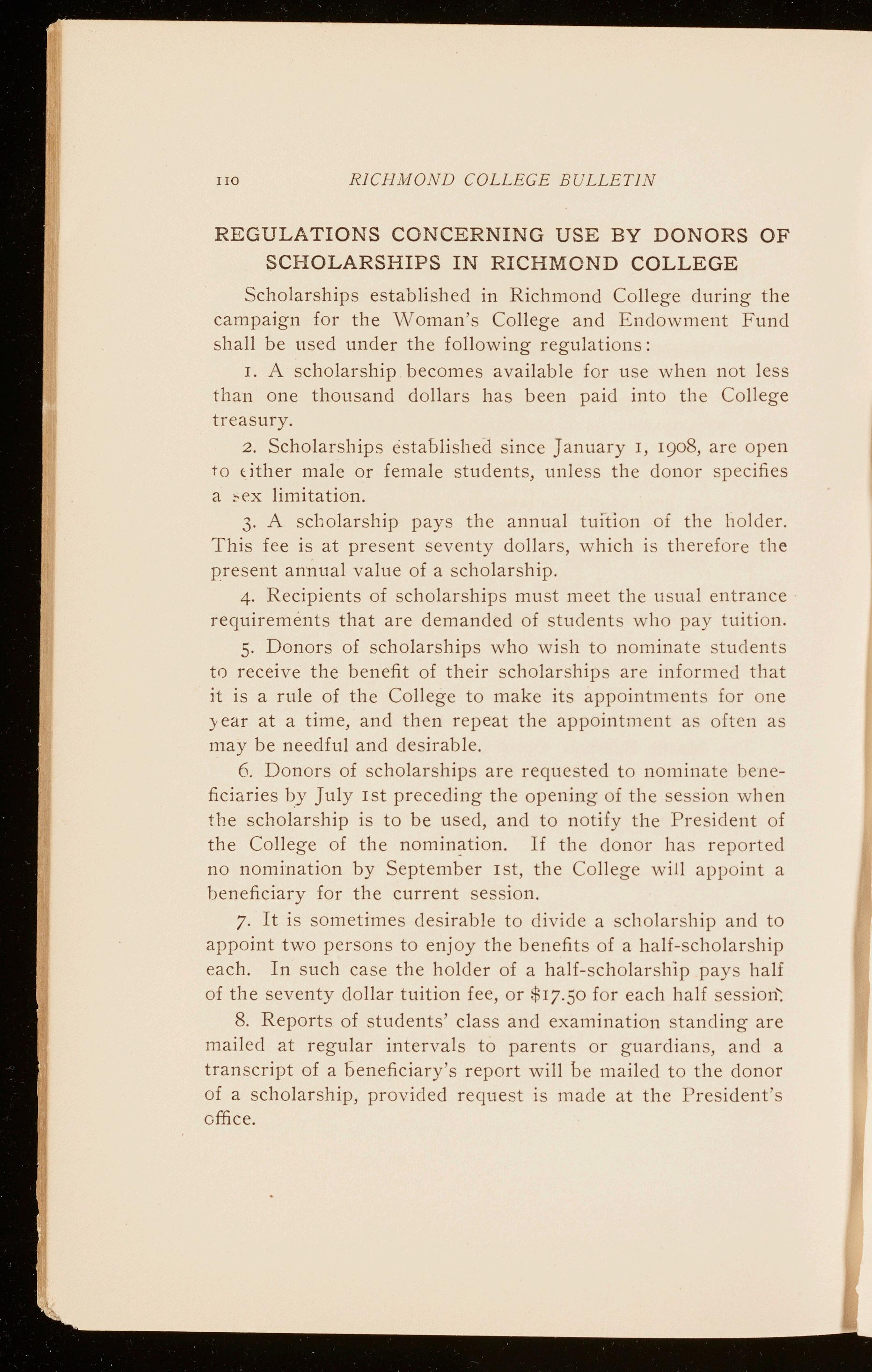
Scholarships established in Richmond College during the campaign for the \Voman 's College and Endowment Fund shall be u sed under the following regulations:
I. A scholarship becomes available for use when not l ess than one thousand dollars has been paid into the College treasury.
2. Scholarships establ ishecl since January 1, 1908, are open to lither male or female students, unless the donor specifies a ,-ex limitati o n.
3. A scho larsh ip pays the annual tuition of the h o lder. This fee is at present seventy dollars, which is therefore the present annual value of a scho larship
4. Recipients of scholarships must meet the u sua l entrance requirements that are demanded of students who pay tuition.
5. Donors of scholarships who wish to nominate s tudents t0 recei ve the benefit of their scho larships are informed that it is a rule of the College to make its appointments for on e year at a time, and then repeat the appointment as often as may be needful and desirable.
6. Donors of scholarships are requested to nominate beneficiaries by July 1st preceding the opening of these s io n when the scho l~rship is to be used, and to notify the President of the College of the nomin?,tion. If the donor has reported no nomination by September 1st, the Co ll ege will app o int a beneficiary for the current sess ion.
7. It is sometimes desirable to divide a scholarship and to appoint tw o persons to enjoy the benefits of a half-scholarship eac h. In such case the h o lder of a half- scho lar ship pays half of the seventy dollar tuition fee, or $17 .50 for each half session':
8. Reports of students' class and exam inati on stand ing are mailed at regular intervals to parents or guardians, and a transcript of a oenefic iar y's report will be mailed to the donor of a scholarship, provided reque st is made at the President's office.

The committee in charge has gene r al instructions, in making its award of all Aid Funds, to give the preference:
I. To applicants already at Co ll ege, who have mainta in ed a good standing, both in character and study.
II. To other fully prepared app licants who shall present satisfactory testimonials from the school last attended, or from other persons who have had opportunity to judge, certify ing to their health, attainments, habits of study and moral character.
III. To those of either class who give reasonable assurance that they will complete a course of study leading to one of the degrees of the College.
The recipient of aid are expected to prove, as students, not only aboYe censure in all respect , but actively helpful to the College by example and by earnest work.
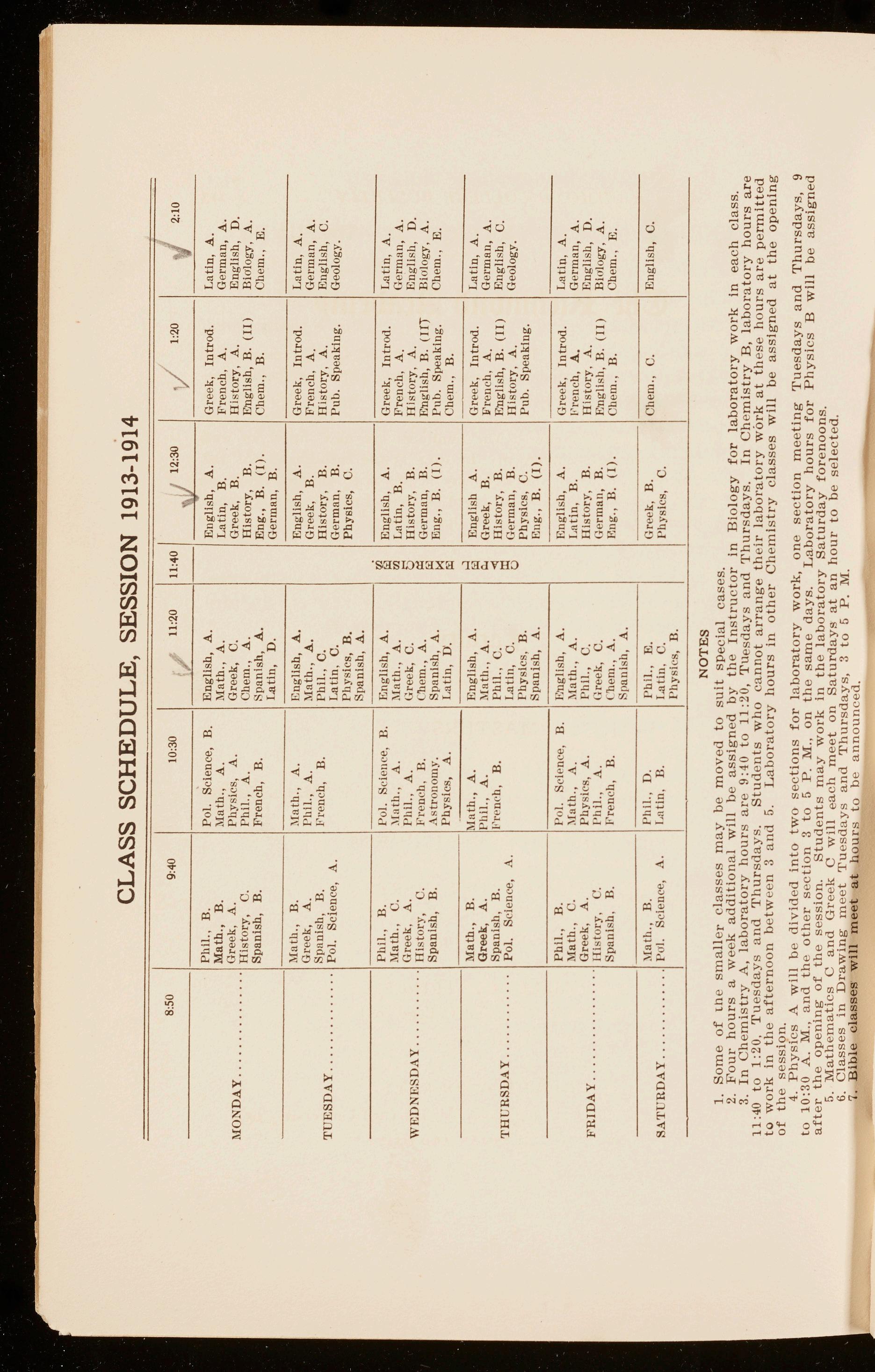
1913-1914 8:50 9:40 10:30 11:20 11: 4 0 ,J 12 : 30 1:20 / 2:10 ,. ,·
PhlL , B. P o l. S c i e nc e, B. Engllsh, A . English, A. Gr ee k, Jntrod . Lntln, A. Math., B. ~lath. , A . ~lath., A. Latin, B. Fr e nch , A . German, A. MONDAY . ..... . ........ Greek, A. Phy s i cs, A . Greek, C. Gr ee k, B. Hi s tory, A . Engli s h, D. Hist o ry, C. Phil., A. C hem., A. History, B. English, B (JI) Bi o logy , A . Spanish, B. French, B Spanis h , A. Eng., B. (1). C hem ., B. C h e m., E. Latin, D. German, B. M ath., B. ~lath., A. English, A . En g lish, A. Greek, In trod. L a tin , A. Greek, A. P!Jll., A . ~lath., A. Greek, B. French, A . German, A. Spnuisb, B. J i're u c b , B Phil. , C. Hist o ry, B Hi s tory , A. Engli s h, C. T UE SDAY .. ... , ... P ol. Science, A. Latin , C. Gerrnnn, B. Pub Sp ea king. Geology. Phy s i cs , B. Physics, c. Spanish, A. Phil. , B. Pol. Scienee , B. ~~nglish, A. English, A. Gr ee k, Introd. Latin , A. Math ., C . : \fath. , A. \.fnth.; , A. 00 Lntin, B. F'rench , A . German, A . WF.DN F.S DAY . . . . Greek. A. Phil., A. Greek, C . 8 Hi s t ory, B. Hist o ry , A. Engli ~ h, D. fli ~tory , c. French, B. ( 1 rn m., A . i,:: German, B. Engli s h, B. ( J!j Biology, A Spanish, B . \ st r onomy. Spanish, A. w Eng., B (I) , Pub . S1,en king. C h e m , E. ?< Phy sics , A. Latin, D . "' Chem., B. Math., B. ~lath., A Eng1ish, A. .Cl English A . Greek, lntrod. Latin , A. w Greek, A . Phil. , A. M at h ., A. 0., Greek, B. LJ~r e n c h , A Ge1·01an, A . Spanish, B. J 1' renrh, B . Pbl! , C. -"1 Hi s t o ry, B . En g lish, B. (II) F.ngllsb, C.
THURSDAY ............ Pol. S c ien ce , A. Latin, C. IIl Ge rman, B . Hi s t o ry , A . Geo l ogy. 0 Physics , B. Phy s i cs, C Pub. Speaking. Spanish, A. F.ng ., B. (I) . Phil., B . Pol. S cie n ce, B . l •:nglish, A . F.ngli s b, A. Greek, In trod. Latin, A Math ., c. ~!nth., A. ~!n t h. , A Lntin, B. l • 'rench, A. G e rman, A.
FRIDAY . . .. . ...• ... Greek, A. Physics, A. Phil., C. Hi s t o r y, B History, A. English, D H istory, C. l'hil. , A . r-: reek, C. Ge rman, B. English, B. ( II ) Bi o l ogy, A. Spanish, B. F'rencb, B. (11em., A. Flng., B. (I). Chem., B. Che m . , F. . Rpanlsb, A. .\f ath . , B Phil. , D Ph i l. , E. G r ee k , B C hem. , C. En g ll s h, C. SAT U RDAY . ..... . . Pal. S cie nce, A. Lntin, B. L ati n. C. Ph ysics, C. Physics, B. N O TES
1. Some of th e sma ll e r c l asses may be mov e d to su it special cases . 2 Four hours a week additional will be ass ign e d by th e In s tru c tor in Biology for laboratory work In each class 3. In C h e mistry A, l abo r a tor y hours are 9 :40 to ll :20, Tu esdays a nd Thursdays. In Chemistry B, lab o rato1 ·y hours are 11 : 40 t o 1:20. Tu es days and Thursdays. Stud e nts who can not a rr ange th e ir l abo r a t ory work at th e se hours are p e rmitt e d to work in the afte rn oon b e tw ee n 3 and 5. Laboratory hours in o th e r Chemistry c l asses will b e ass ign e d a t the op e nin g of th e sess ion.
4. Physics A will be divid e d int o two sect ion s for l abora tor y work, on e section m ee ting Tuesdays and Thursdays, 9 to 10:30 A. M ., and th e other section 3 to 5 P. M., on th e same d ays. L a bor a tory hour s for Physics B will b e assigned af t er th e opening of th e session. Students may work In the l aboratory Saturday forenoons. 5. Mathematics C and Greek C wi ll eac h m ee t on Saturdays a t an hour t o b e se l ected. 6. Classes in Drawing meet Tuesdays and Thursdays, 3 to 5 P. M. 7. Bible classes will m ee t at hour s to be an noun ced.
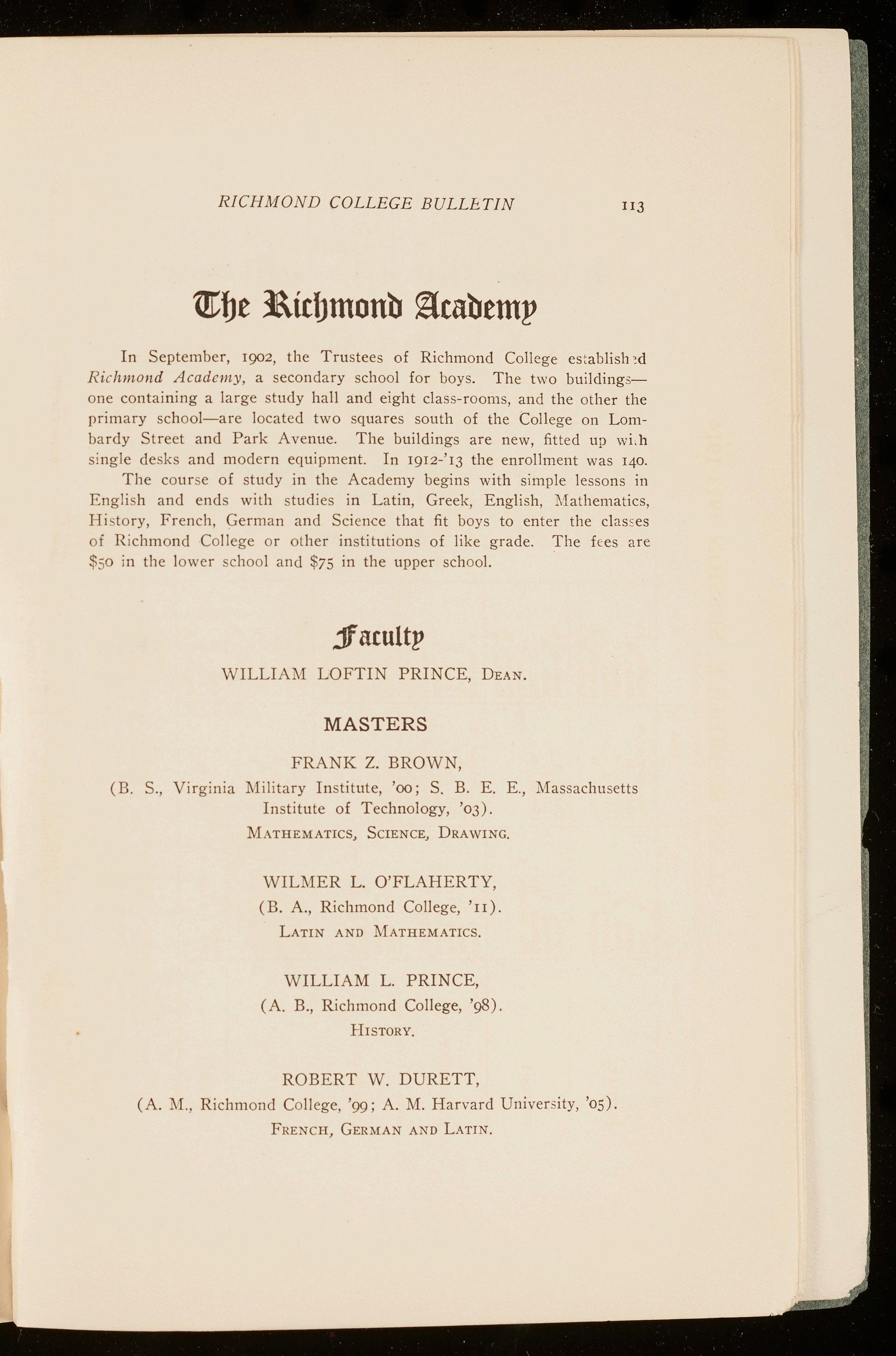
In September, 1902, the Tru stee s of Ri chmond College estab lish '.d Richmond Academy, a secondary school for boys. The two building sone containing a large study hall and eight class - rooms, and the other the primary schoo l-are located two squares south of the College on Lombardy Street and Park Avenue The buildings are new, fitted up w i h single desks and mod ern equipment. In 1912-'13 the enrollment was 140. The course of study in the Academy begins with simple lessons in English and ends with studies in Latin, Greek, English, :\fathematics, Hi story, French, German and Science that fit boys to enter the clas ses of Richmond College o r other institutions of like grade. The fees are $50 in the lower schoo l and $75 in the upper school.
WILLIAM LOFTIN PRINCE, DEAN.
FRANK Z. BROWN,
(B. S., Virginia l\Iilitary In stit ute, 'oo; S. B. E. E., Massachusetts In stitute of Technology, '03). MATHEMATICS,SCIENCE,DRAWING.
WILMER L. O'FLAHERTY, (B. A., Richmond College, 'rr). LATIN AND MATHEMATICS.
WILLIAM L. PRINCE, (A. B., Richmond College, 'gS). HISTORY.
ROBERT W. DURETT, (A. l\I. , Richm ond College, '99; A. M. Harvard Univer sity , '05). FRENCH, GERMANANDLATIN.
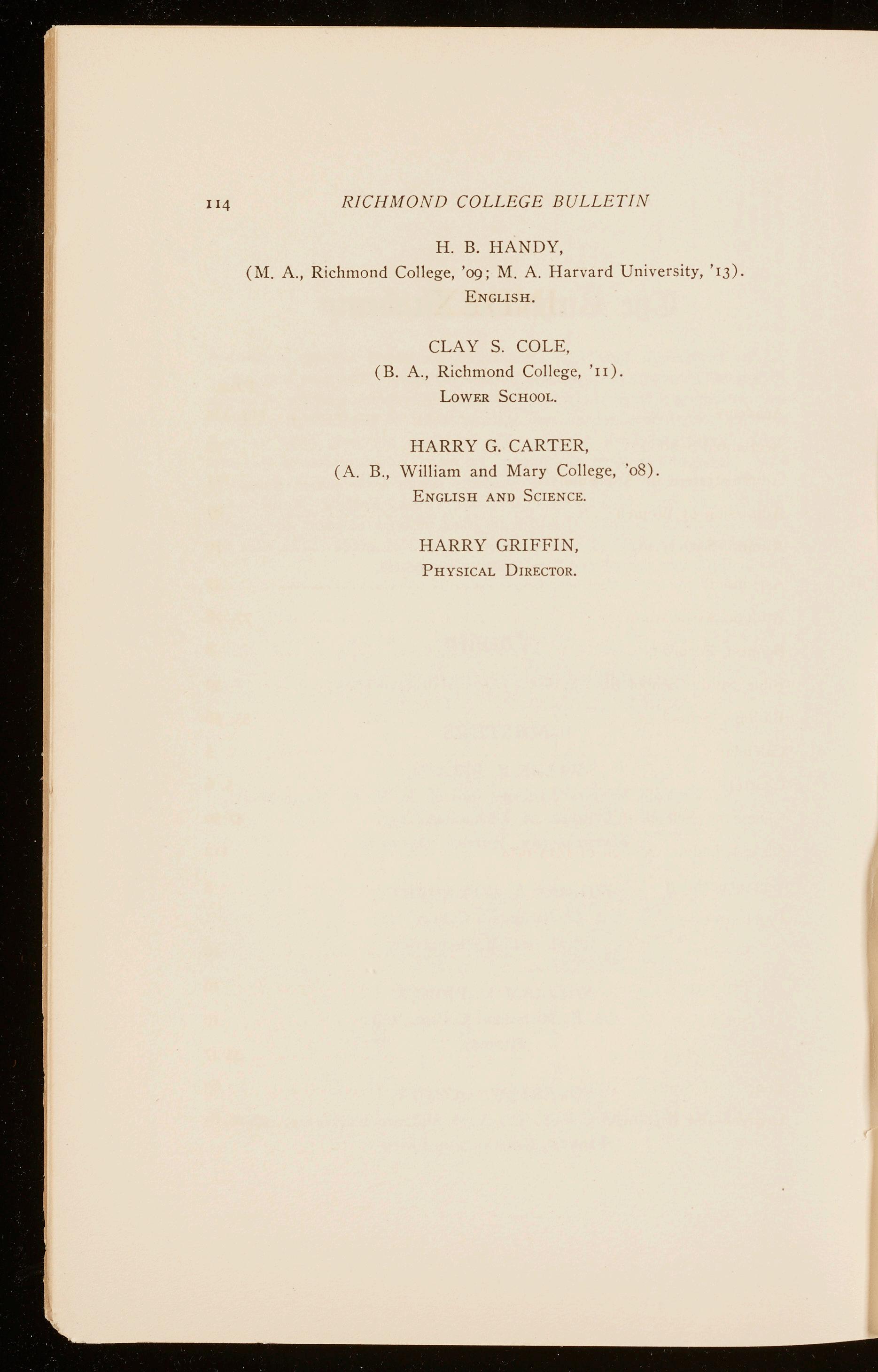
H.B. HANDY, (M. A., Richmond College, '09; M. A. Harvard University, '13).
ENGLISH.
CLAY S. COLE, (B. A., Richmond College, '11).
LOWER SCHOOL.
HARRY G. CARTER, (A. B., William and Mary College, ·08)
ENGLISH AND SCIENCE.
HARRY GRIFFIN, PHYSICAL DIRECTOR
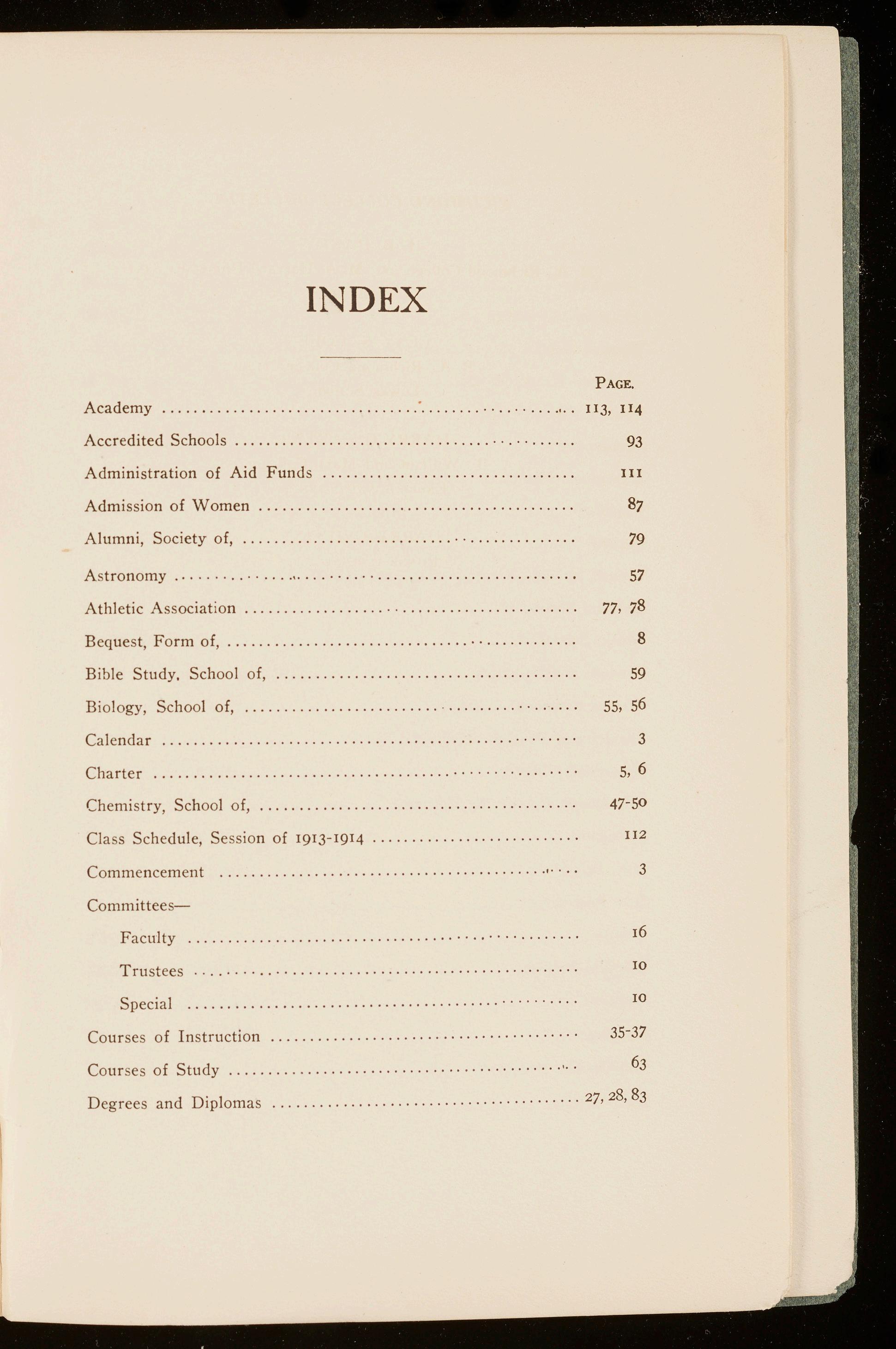
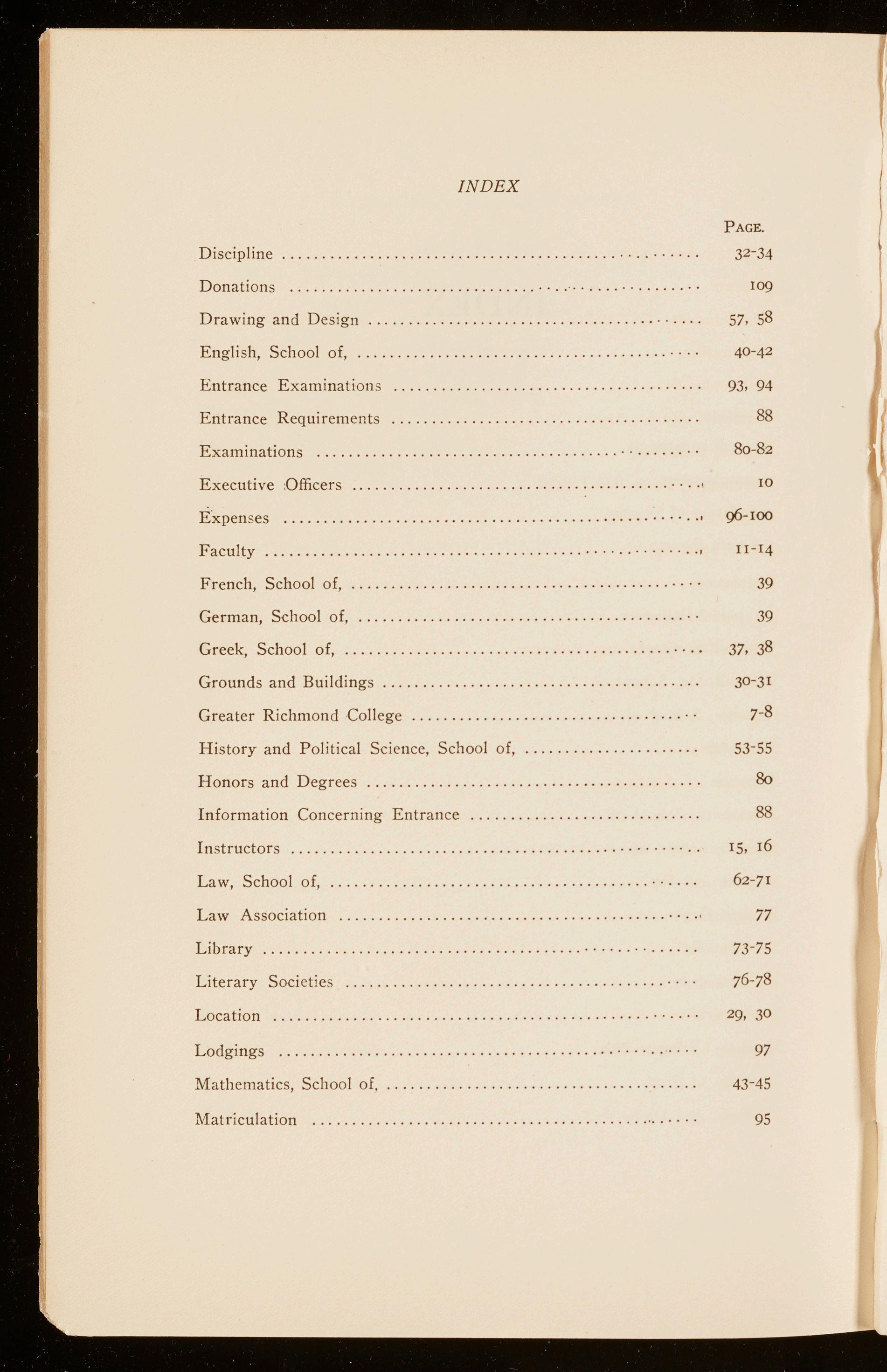
Mi
New Stude nts, Of Interest to,
Organization
Philosophy, School of,
Physical Culture, school of,
Physics, School of,
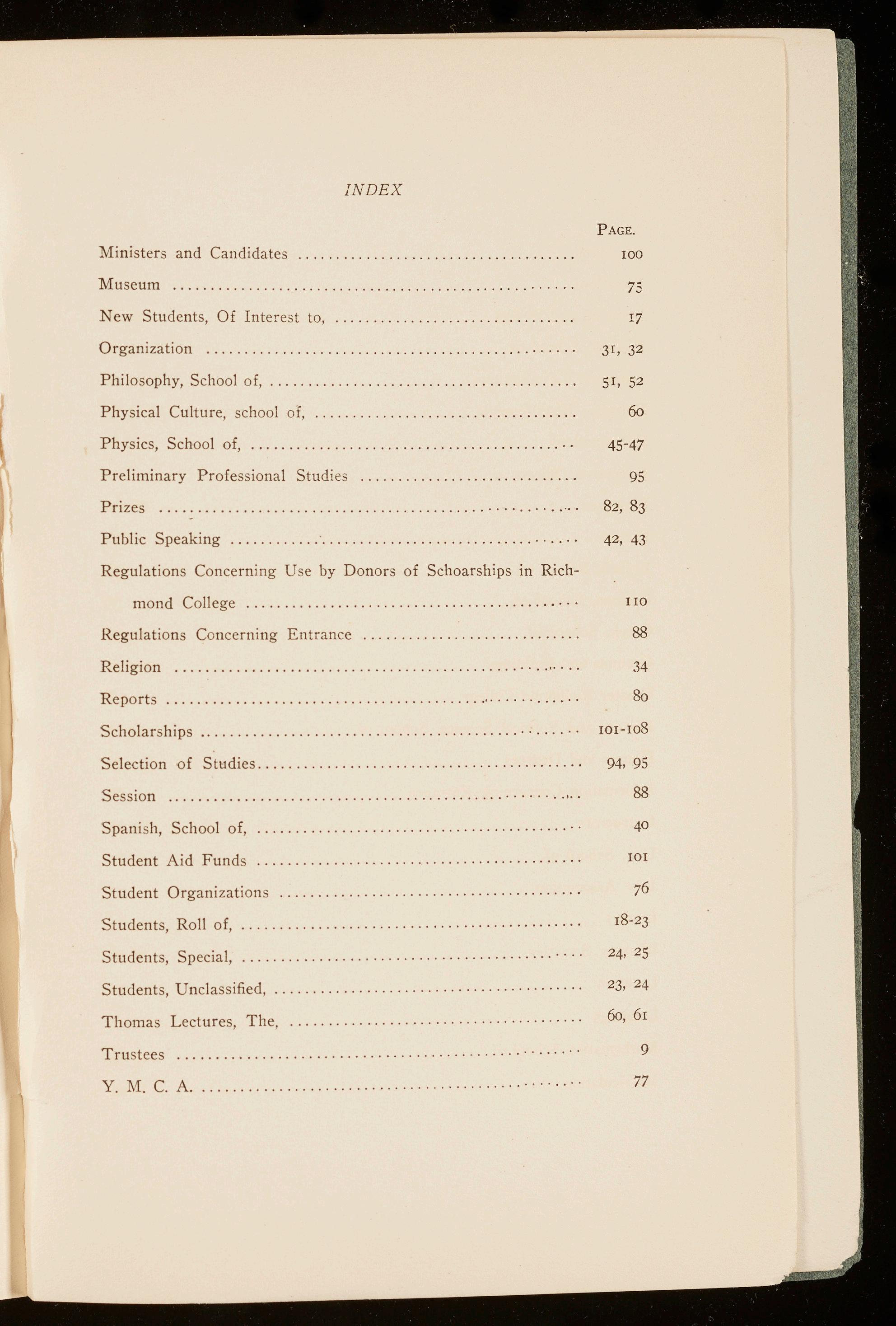
Regulations Concerning Use by Donors of Schoarships in R ichmond College
Students, Roll of,
Students, Special,
Thomas Lectures, The,
Trustees
